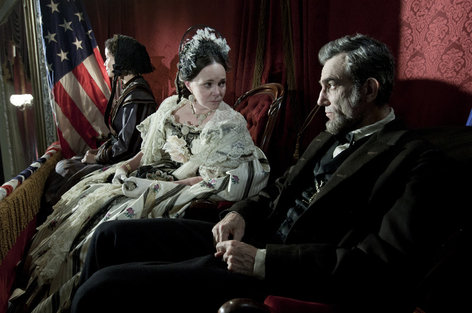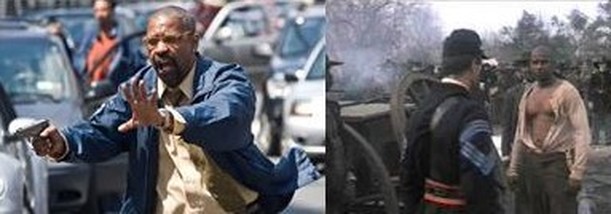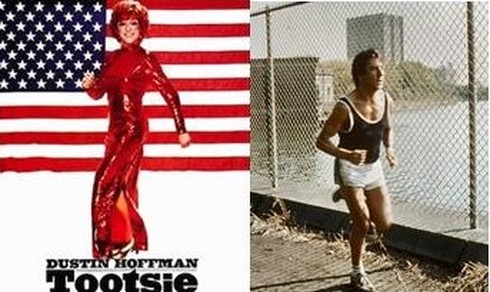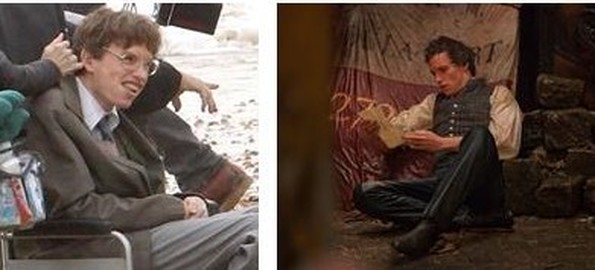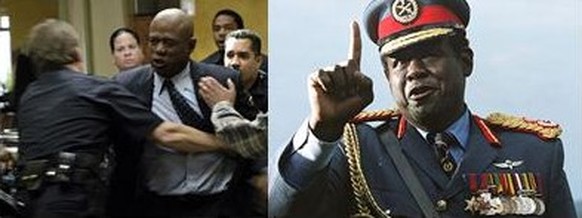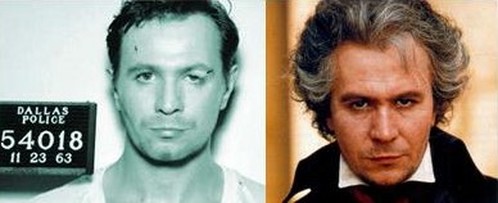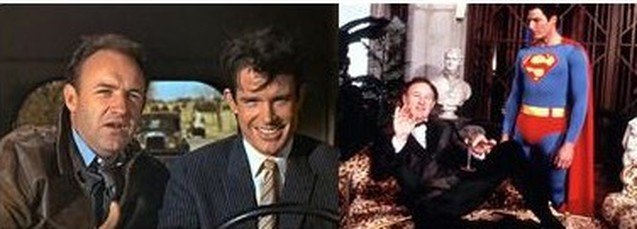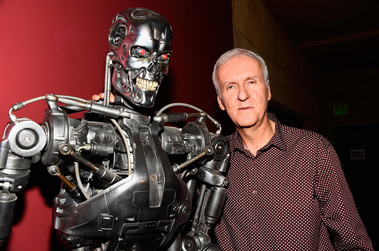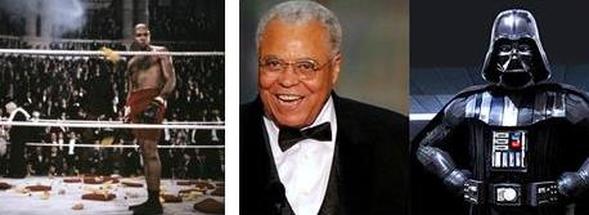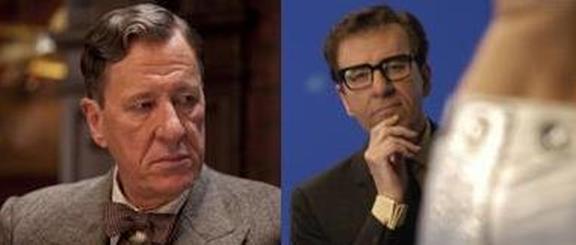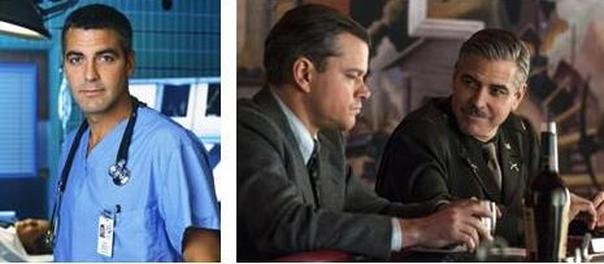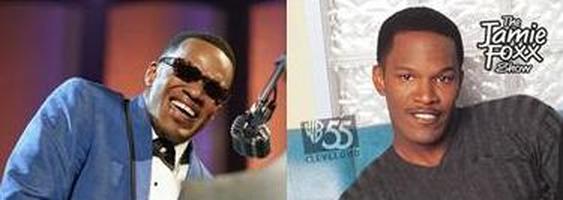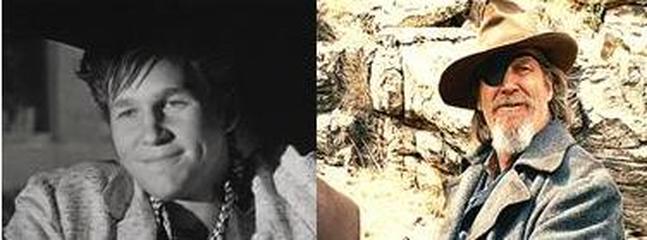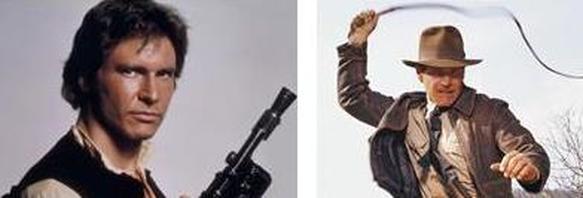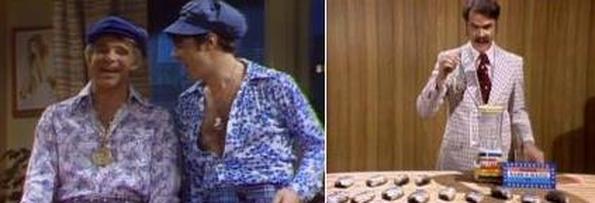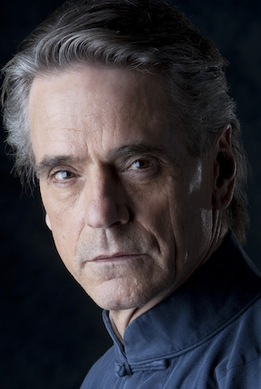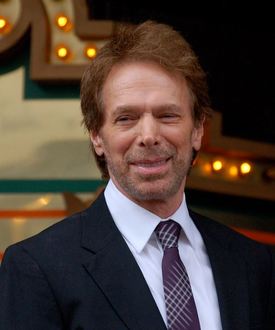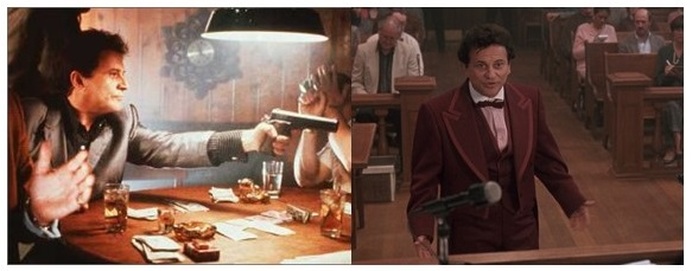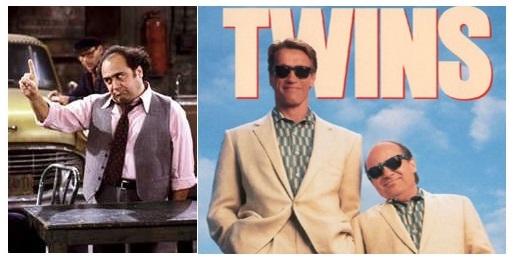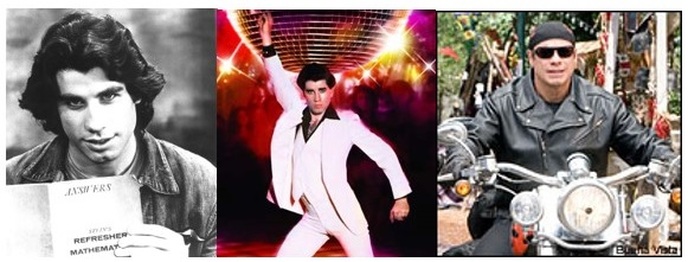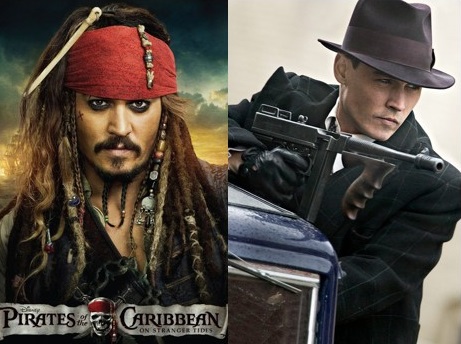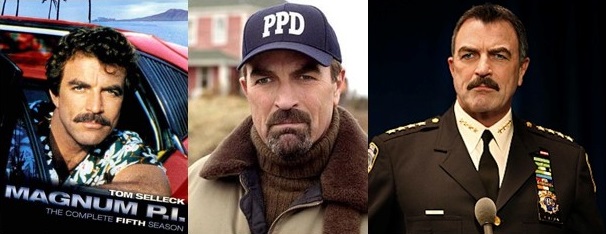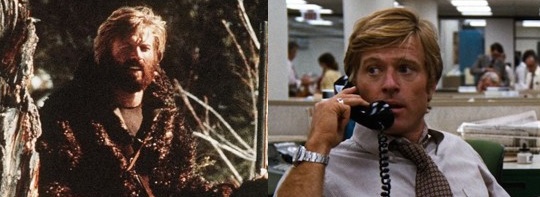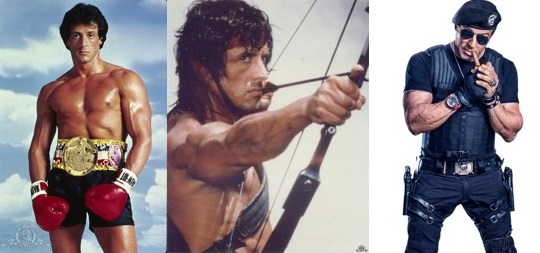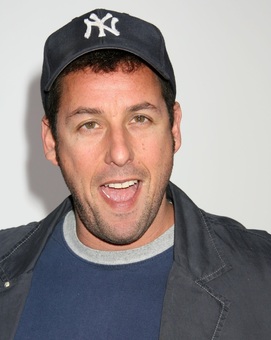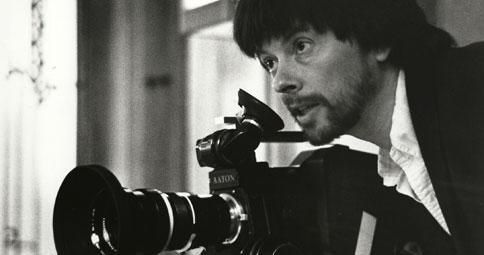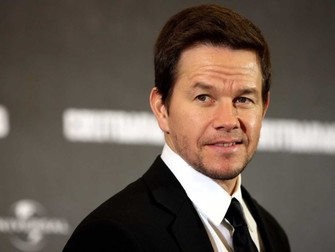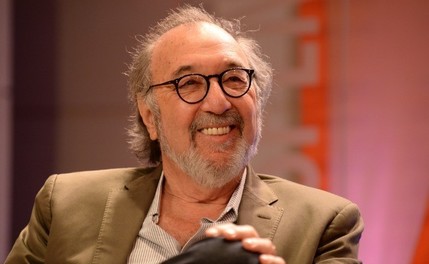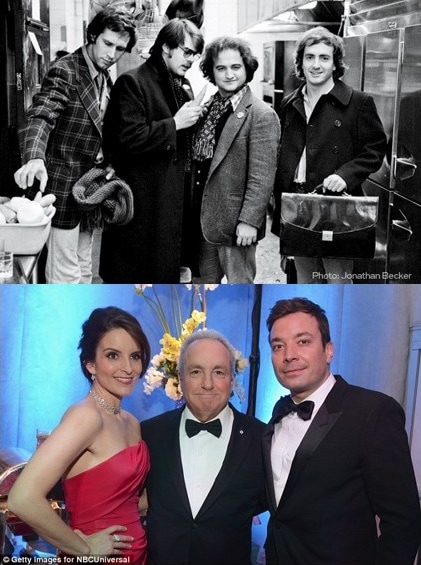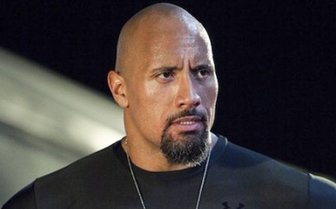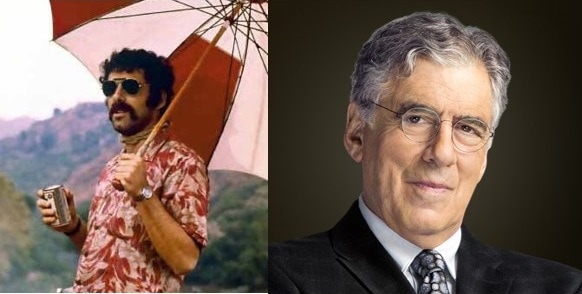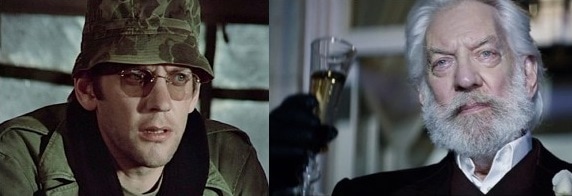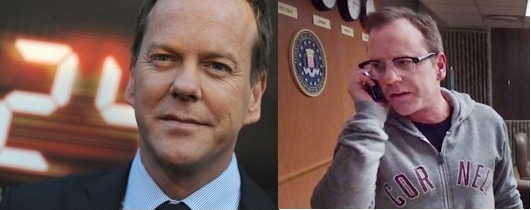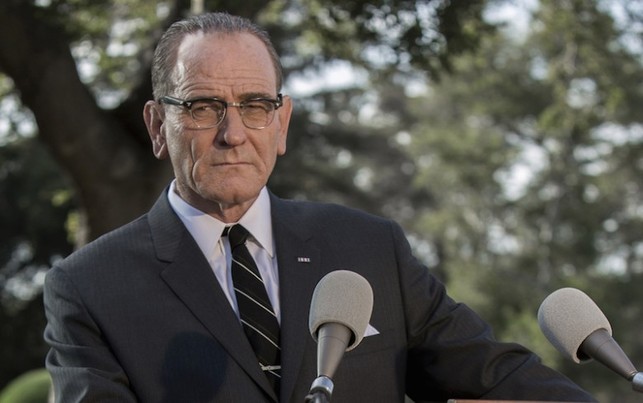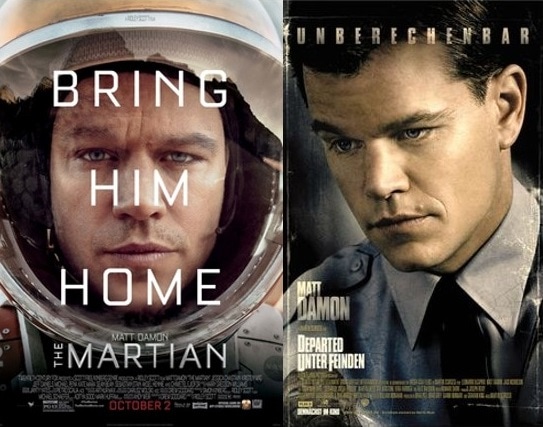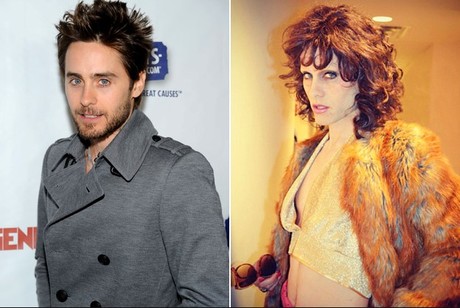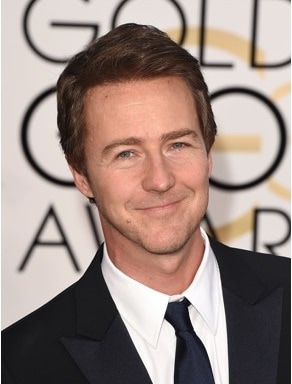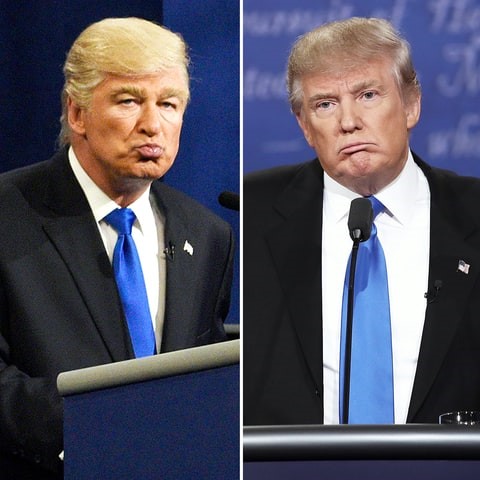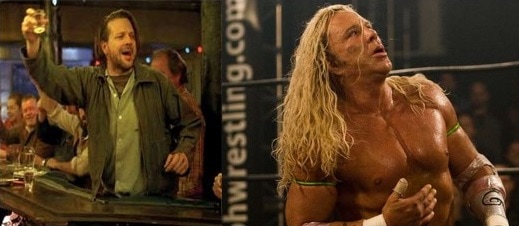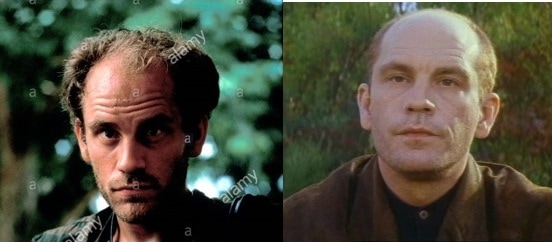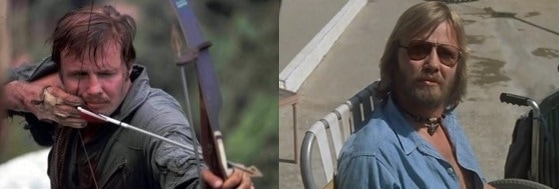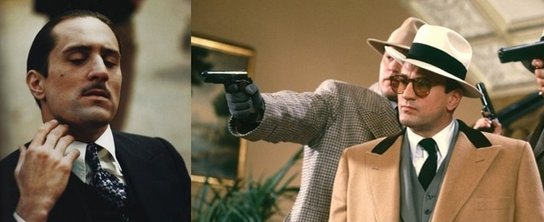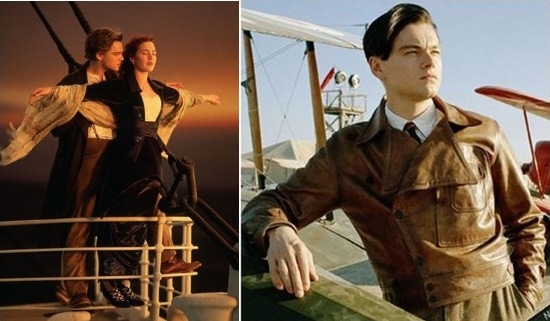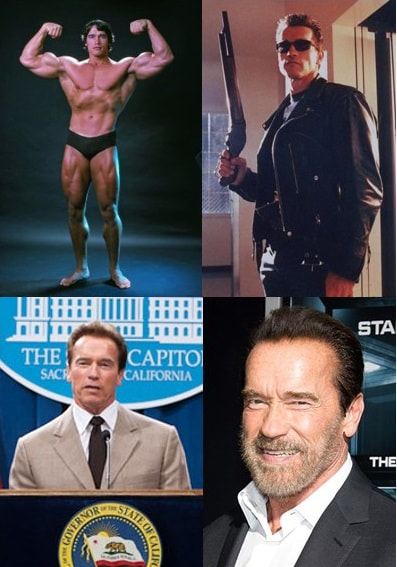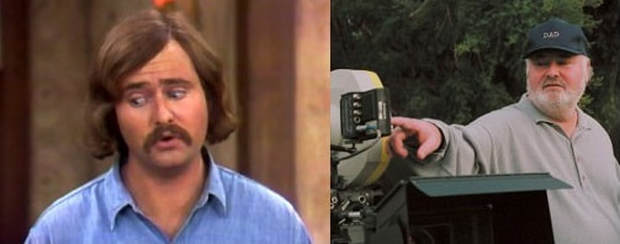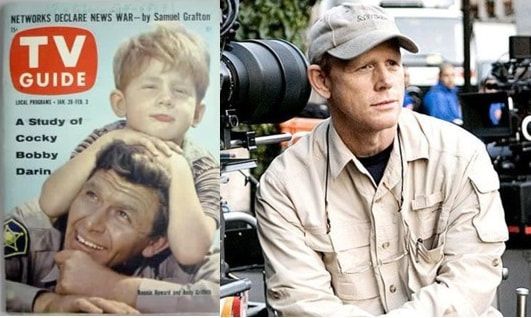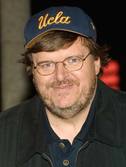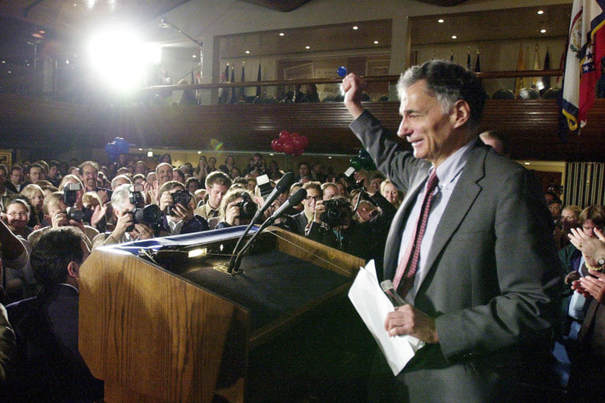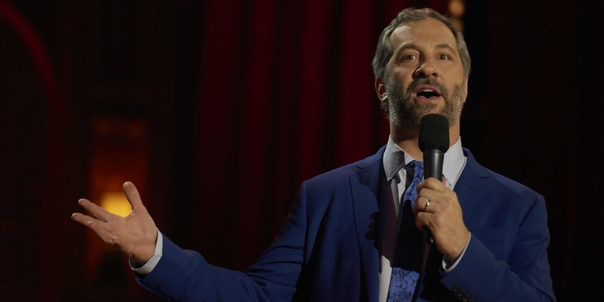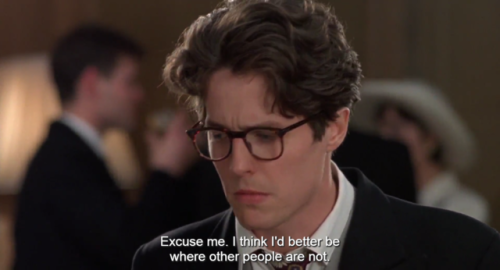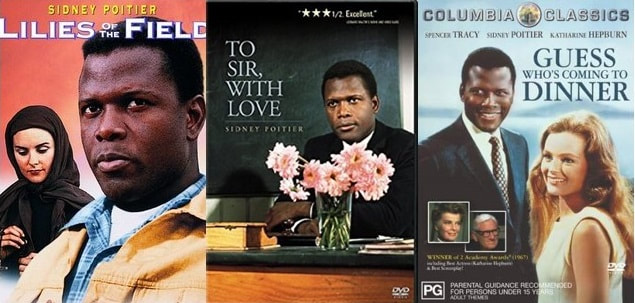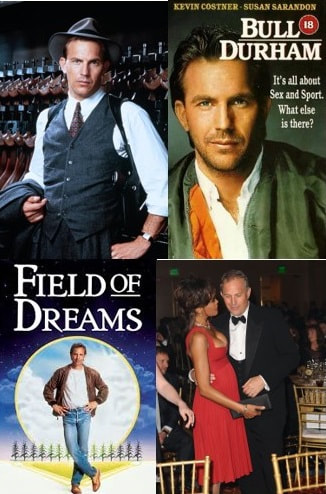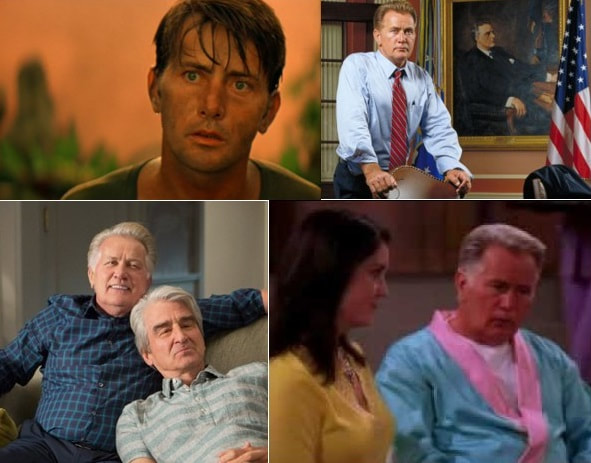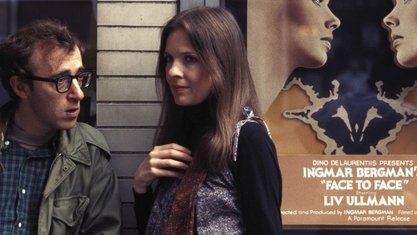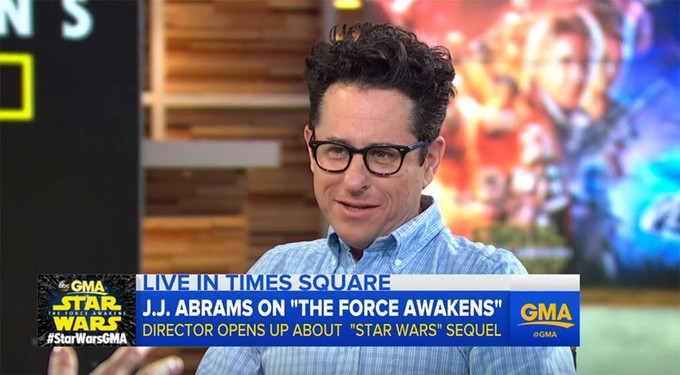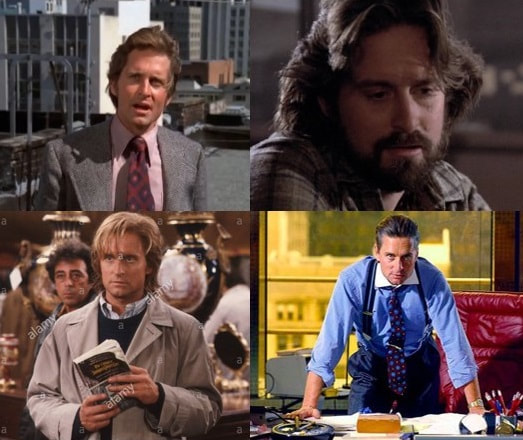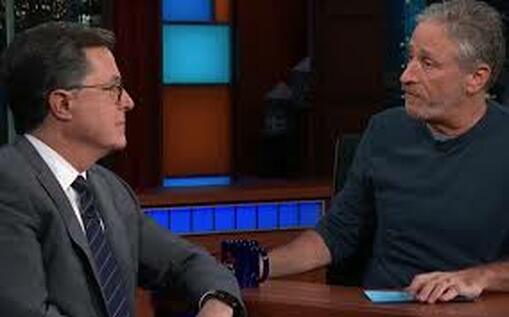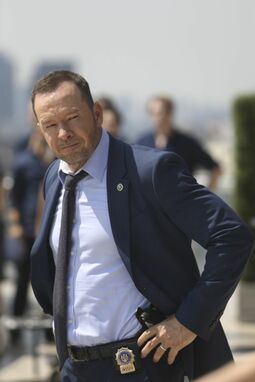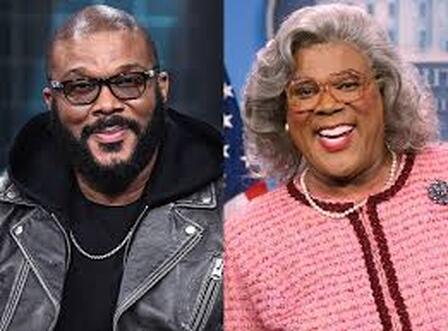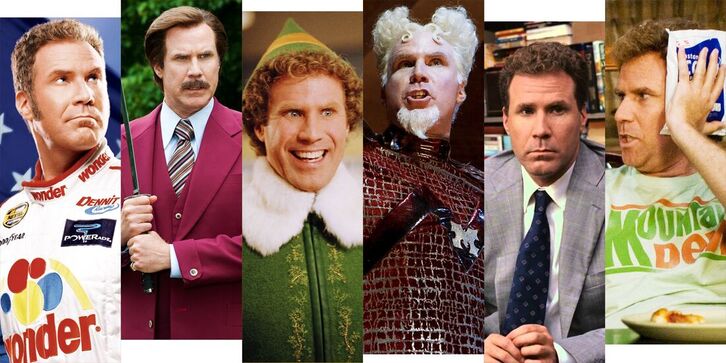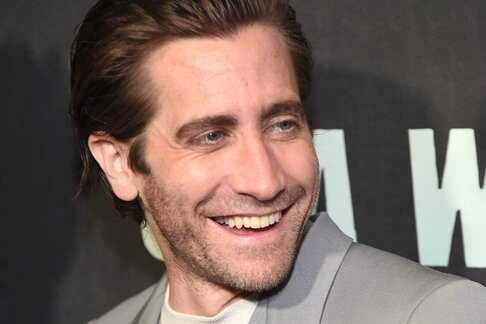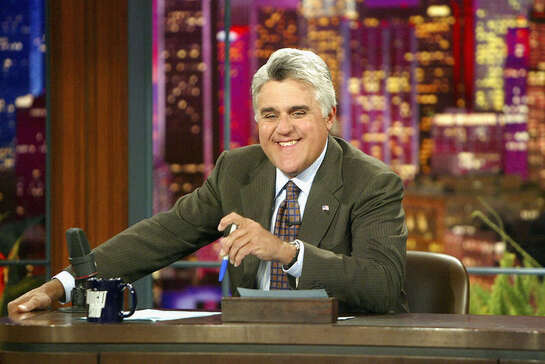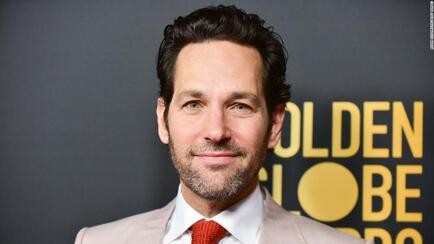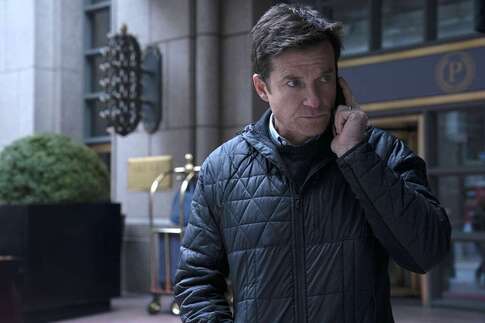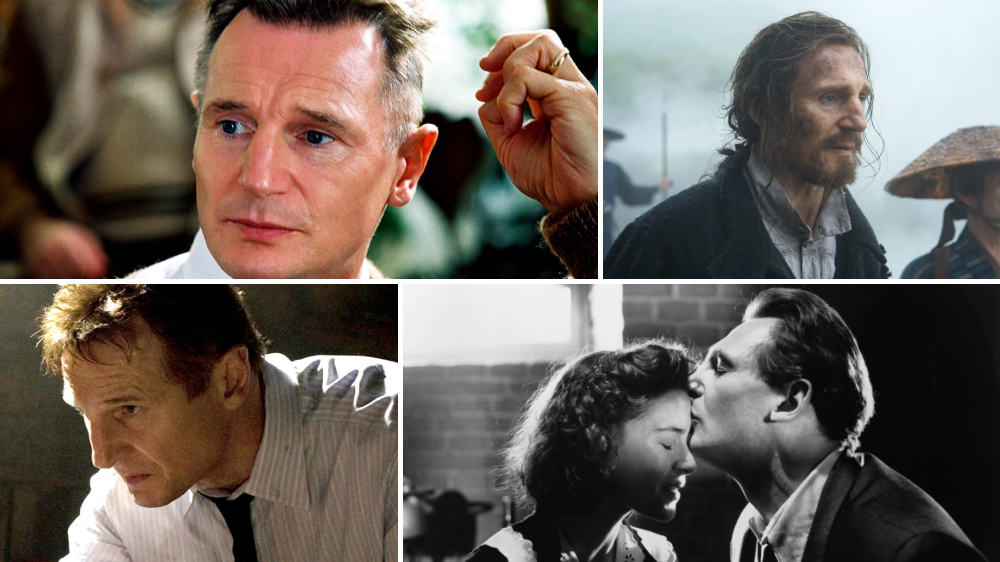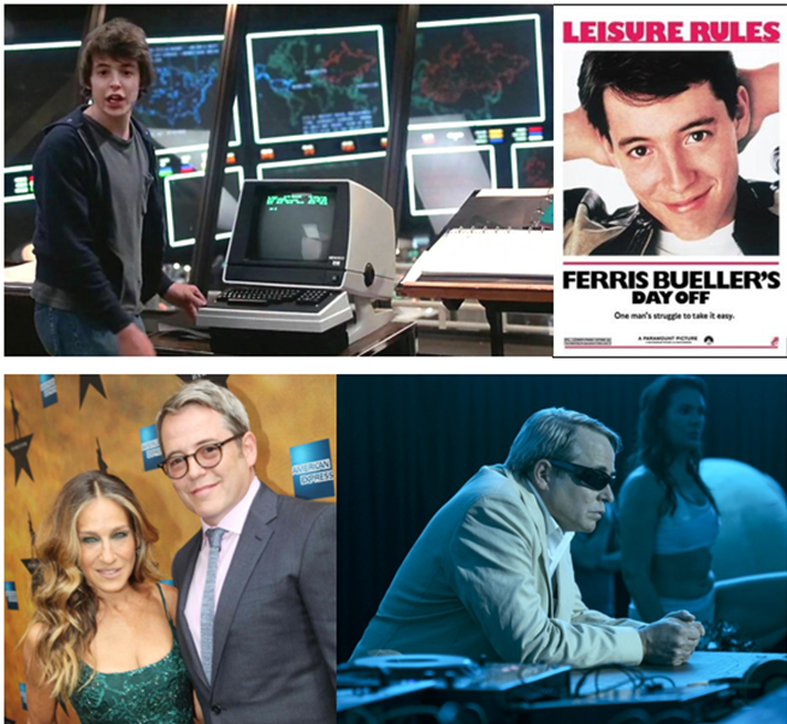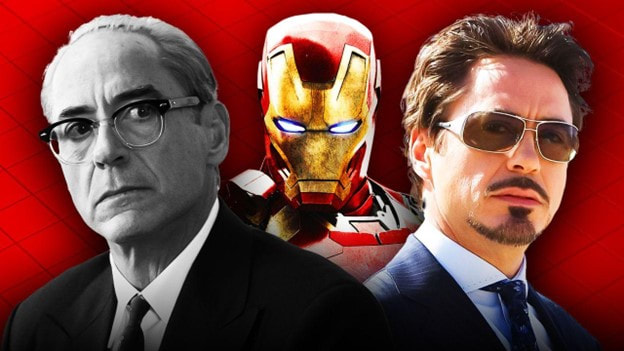Copyright © 2015 Bert N. Langford (Images may be subject to copyright. Please send feedback)
Welcome to Our Generation USA!
Popular Male Icons
Featured are those iconic influences who have made significant contributions to making Life in the United States what it is Today!
Jack Nicholson
- YouTube Video One Flew over the Cuckoo's Nest: You're not Crazy! (1975)
- YouTube Video of Jack Nicholson playing the piano in “Five Easy Pieces --Freeway Performance”
- YouTube Video: Jack Nicholson's Top 10 Acting Performances by WatchMojo
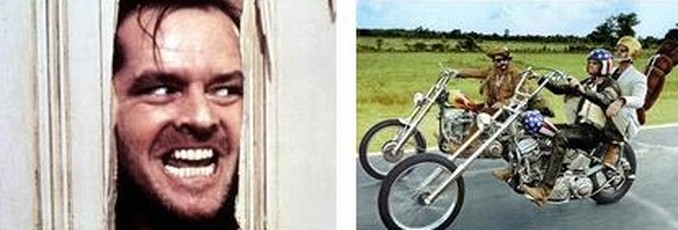
John Joseph "Jack" Nicholson (born April 22, 1937) is an American actor and filmmaker, having performed for nearly 60 years. He is known for playing a wide range of starring or supporting roles, including satirical comedy, romance and dark portrayals of excitable and psychopathic characters. In many of his films he played the "eternal outsider, the sardonic drifter", and someone who rebels against the social structure.
Nicholson's 12 Academy Award nominations make him the most nominated male actor in the Academy's history. Nicholson has won the Academy Award for Best Actor twice, one for the drama “One Flew Over the Cuckoo's Nest” (1975) and the other for the romantic comedy “As Good as It Gets” (1997).
He also won the Academy Award for Best Supporting Actor for the comedy-drama “Terms of Endearment” (1983). Nicholson is one of three male actors to win three Academy Awards.
Nicholson is one of only two actors to be nominated for an Academy Award for acting in every decade from the 1960s to the 2000s. He has won six Golden Globe Awards, and received the Kennedy Center Honor in 2001. In 1994, he became one of the youngest actors to be awarded the American Film Institute's Life Achievement Award.
Other films in which he has starred include:
Nicholson's 12 Academy Award nominations make him the most nominated male actor in the Academy's history. Nicholson has won the Academy Award for Best Actor twice, one for the drama “One Flew Over the Cuckoo's Nest” (1975) and the other for the romantic comedy “As Good as It Gets” (1997).
He also won the Academy Award for Best Supporting Actor for the comedy-drama “Terms of Endearment” (1983). Nicholson is one of three male actors to win three Academy Awards.
Nicholson is one of only two actors to be nominated for an Academy Award for acting in every decade from the 1960s to the 2000s. He has won six Golden Globe Awards, and received the Kennedy Center Honor in 2001. In 1994, he became one of the youngest actors to be awarded the American Film Institute's Life Achievement Award.
Other films in which he has starred include:
- “Easy Rider” (1969),
- “Five Easy Pieces” (1970),
- “The Last Detail” (1973),
- “Chinatown” (1974),
- “The Passenger” (1975),
- "Reds" (1981).
- “The Shining” (1980),
- “Batman” (1989),
- “The Departed” (2006).
- “A Few Good Men” (1992),
- “The Pledge” (2001),
- “About Schmidt” (2002).
- "The Bucket List" (2007)
Bruce Willis
YouTube Video of Die Hard (5/5) Movie CLIP - Happy Trails, Hans (1988) HD
Pictured: LEFT: Willis at the 2010 San Diego Comic-Con International (by Gage Skidmore); RIGHT: Poster of (the original) Die Hard movie (1988)
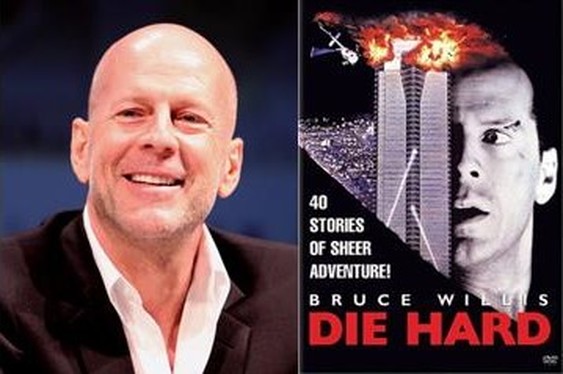
Walter Bruce Willis (born March 19, 1955), known professionally as Bruce Willis, is an American actor, producer, and singer. His career began on the Off-Broadway stage and then in television in the 1980s, most notably as David Addison in Moonlighting (1985–1989).
He is perhaps best known for his role of John McClane in the Die Hard series, (below) which were critical and financial successes.
He has appeared in over 60 films, including:
Films featuring Willis have grossed between US$2.64 billion and $3.05 billion at the North American box offices, making him the eighth highest-grossing actor in a leading role and 12th-highest including supporting roles.
He is a two-time Emmy Award winner, two-time Golden Globe Award winner, and has been nominated for a Saturn Award four times. He married actress Demi Moore in 1987 and they had three daughters, including Rumer, before their divorce in 2000. Since 2009, he has been married to model Emma Heming, with whom he has two daughters.
He is perhaps best known for his role of John McClane in the Die Hard series, (below) which were critical and financial successes.
- Die Hard (1988)
- Die Hard 2 (1990)
- Die Hard with a Vengeance (1995)
- Live Free or Die Hard (2007)
- A Good Day to Die Hard (2013)
He has appeared in over 60 films, including:
- Color of Night (1994),
- Pulp Fiction (1994),
- 12 Monkeys (1995),
- The Fifth Element (1997),
- Armageddon (1998),
- The Sixth Sense (1999),
- Unbreakable (2000),
- Sin City (2005), Red (2010),
- and The Expendables 2 (2012).
Films featuring Willis have grossed between US$2.64 billion and $3.05 billion at the North American box offices, making him the eighth highest-grossing actor in a leading role and 12th-highest including supporting roles.
He is a two-time Emmy Award winner, two-time Golden Globe Award winner, and has been nominated for a Saturn Award four times. He married actress Demi Moore in 1987 and they had three daughters, including Rumer, before their divorce in 2000. Since 2009, he has been married to model Emma Heming, with whom he has two daughters.
Al Pacino
YouTube Video of Top Ten Al Pacino Acting Performances by WatchMojo
Pictured: Al Pacino in LEFT: Serpico (1973); RIGHT: Godfather II (1974)

Alfredo James "Al" Pacino born April 25, 1940) is an American actor of stage and screen, filmmaker and screenwriter.
Often considered by audiences and commentators to be one of the greatest actors of all time, Pacino has had a career spanning more than fifty years, during which time he has received numerous accolades and honors both competitive and honorary, among them:
He is also one of few performers to have won a competitive Oscar, an Emmy and a Tony Award for acting, dubbed the "Triple Crown of Acting".
A method actor and former student of the Herbert Berghof Studio and the Actors Studio in New York City, where he was taught by Charlie Laughton and Lee Strasberg, Pacino made his feature film debut with a minor role in Me, Natalie (1969) and gained favorable notices for his lead role as a heroin addict in The Panic in Needle Park (1971).
He achieved international acclaim and recognition for his breakthrough role as Michael Corleone in Francis Ford Coppola's The Godfather (1972). He received his first Oscar nomination and would reprise the role in sequels Part II (1974) and Part III (1990). Pacino's performance as Corleone is now regarded as one of the greatest screen performances in film history.
Pacino received his first Best Actor Oscar nomination for Serpico (1973); he was also nominated for The Godfather Part II, Dog Day Afternoon (1975) and ...And Justice for All (1979) and won the award in 1993 for his performance as a blind Lieutenant Colonel in Scent of a Woman (1992).
For his performances in The Godfather, Dick Tracy (1990) and Glengarry Glen Ross (1992), Pacino was nominated for the Academy Award for Best Supporting Actor. Other notable roles include:
In addition to his work in film, Pacino has had an extensive career on stage and is a two-time Tony Award winner, in 1969 and 1977, for his performances in Does a Tiger Wear a Necktie? and The Basic Training of Pavlo Hummel respectively.
A lifelong fan of Shakespeare, Pacino directed and starred in Looking for Richard (1996), a documentary film about the play Richard III, a role which Pacino had earlier portrayed on-stage in 1977.
He has also acted as Shylock in a 2004 feature film adaptation and a 2010 production of The Merchant of Venice.
Having made his filmmaking debut with Looking for Richard, Pacino has also directed and starred in the independent film Chinese Coffee (2000) and the films Wilde Salomé (2011) and Salomé (2013) about the play Salomé by Oscar Wilde.
Since 1994, Pacino has been the joint president of the Actors Studio with Ellen Burstyn and Harvey Keitel. In 2016, he received the Kennedy Center Honor.
Click here for more about Al Pacino.
Often considered by audiences and commentators to be one of the greatest actors of all time, Pacino has had a career spanning more than fifty years, during which time he has received numerous accolades and honors both competitive and honorary, among them:
- an Academy Award,
- two Tony Awards,
- two Primetime Emmy Awards,
- a British Academy Film Award,
- four Golden Globe Awards,
- the Lifetime Achievement Award from the American Film Institute,
- the Golden Globe Cecil B. DeMille Award,
- and the National Medal of Arts.
He is also one of few performers to have won a competitive Oscar, an Emmy and a Tony Award for acting, dubbed the "Triple Crown of Acting".
A method actor and former student of the Herbert Berghof Studio and the Actors Studio in New York City, where he was taught by Charlie Laughton and Lee Strasberg, Pacino made his feature film debut with a minor role in Me, Natalie (1969) and gained favorable notices for his lead role as a heroin addict in The Panic in Needle Park (1971).
He achieved international acclaim and recognition for his breakthrough role as Michael Corleone in Francis Ford Coppola's The Godfather (1972). He received his first Oscar nomination and would reprise the role in sequels Part II (1974) and Part III (1990). Pacino's performance as Corleone is now regarded as one of the greatest screen performances in film history.
Pacino received his first Best Actor Oscar nomination for Serpico (1973); he was also nominated for The Godfather Part II, Dog Day Afternoon (1975) and ...And Justice for All (1979) and won the award in 1993 for his performance as a blind Lieutenant Colonel in Scent of a Woman (1992).
For his performances in The Godfather, Dick Tracy (1990) and Glengarry Glen Ross (1992), Pacino was nominated for the Academy Award for Best Supporting Actor. Other notable roles include:
- Tony Montana in Scarface (1983),
- Carlito Brigante in Carlito's Way (1993),
- Lieutenant Vincent Hanna in Heat (1995),
- Benjamin Ruggiero in Donnie Brasco (1997),
- Lowell Bergman in The Insider (1999)
- and Detective Will Dormer in Insomnia (2002). In television,
In addition to his work in film, Pacino has had an extensive career on stage and is a two-time Tony Award winner, in 1969 and 1977, for his performances in Does a Tiger Wear a Necktie? and The Basic Training of Pavlo Hummel respectively.
A lifelong fan of Shakespeare, Pacino directed and starred in Looking for Richard (1996), a documentary film about the play Richard III, a role which Pacino had earlier portrayed on-stage in 1977.
He has also acted as Shylock in a 2004 feature film adaptation and a 2010 production of The Merchant of Venice.
Having made his filmmaking debut with Looking for Richard, Pacino has also directed and starred in the independent film Chinese Coffee (2000) and the films Wilde Salomé (2011) and Salomé (2013) about the play Salomé by Oscar Wilde.
Since 1994, Pacino has been the joint president of the Actors Studio with Ellen Burstyn and Harvey Keitel. In 2016, he received the Kennedy Center Honor.
Click here for more about Al Pacino.
Anthony Hopkins
YouTube Video of Anthony Hopkins as "Hannibal Lector" from the Movie "Silence of the Lambs": Clarice (Jodie Foster*) Meets Hannibal.
*-Jodie Foster.
Pictured: Anthony Hopkins portraying LEFT: Alfred Hitchcock in the movie “Hitchcock” (2012); RIGHT: as Richard the Lionheart in “The Lion in Winter” (1968) (with Katharine Hepburn)
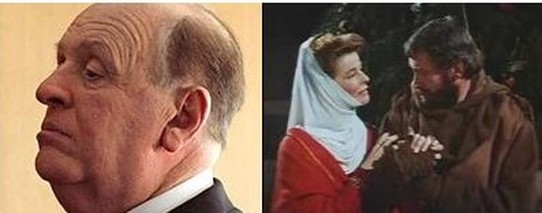
Sir Philip Anthony Hopkins is a Welsh actor of film, stage, and television, and a composer and painter. After graduating from the Royal Welsh College of Music & Drama in 1957, he trained at the Royal Academy of Dramatic Art in London, and was then spotted by Laurence Olivier who invited him to join the Royal National Theater. In 1968, he got his break in film in The Lion in Winter (playing Richard I The Lionhearted).
Considered to be one of the greatest living actors, Hopkins is well known for his portrayal of Hannibal Lecter in "The Silence of the Lambs" (1991), for which he won the Academy Award for Best Actor, its sequel "Hannibal" (2001) and the prequel Red Dragon (2002). Other notable films include "The Mask of Zorro" (1998), "The Bounty" (1984), "Meet Joe Black" (1998), The Elephant Man (1980), "Magic" (1978), "84 Charing Cross Road" (1987), Bram Stoker's "Dracula" (1992), "Legends of the Fall" (1994), "Thor" (2011), "The Remains of the Day" (1993), "Amistad" (1997), "Nixon" (1995), "The World's Fastest Indian" (2005), "Instinct" (1999), and "Fracture" (2007).
Along with his Academy Award, Hopkins has won three BAFTA Awards, two Emmys, and the Cecil B. DeMille Award. In 1993, he was knighted by Queen Elizabeth II for services to the arts. He received a star on the Hollywood Walk of Fame in 2003, and was made a Fellow of the British Academy of Film and Television Arts in 2008.
Considered to be one of the greatest living actors, Hopkins is well known for his portrayal of Hannibal Lecter in "The Silence of the Lambs" (1991), for which he won the Academy Award for Best Actor, its sequel "Hannibal" (2001) and the prequel Red Dragon (2002). Other notable films include "The Mask of Zorro" (1998), "The Bounty" (1984), "Meet Joe Black" (1998), The Elephant Man (1980), "Magic" (1978), "84 Charing Cross Road" (1987), Bram Stoker's "Dracula" (1992), "Legends of the Fall" (1994), "Thor" (2011), "The Remains of the Day" (1993), "Amistad" (1997), "Nixon" (1995), "The World's Fastest Indian" (2005), "Instinct" (1999), and "Fracture" (2007).
Along with his Academy Award, Hopkins has won three BAFTA Awards, two Emmys, and the Cecil B. DeMille Award. In 1993, he was knighted by Queen Elizabeth II for services to the arts. He received a star on the Hollywood Walk of Fame in 2003, and was made a Fellow of the British Academy of Film and Television Arts in 2008.
Ben Affleck
YouTube Video from Argo with Ben Affleck, Bryan Cranston, Taylor
Pictured: Ben Affleck with LEFT: co-star Matt Damon (who co-wrote the screenplay with Affleck) in “Good Will Hunting” (1997); RIGHT: who directed and acted in the Oscar-winning picture “Argo” (2012)
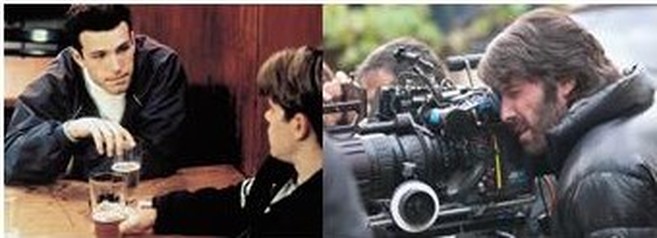
Benjamin Geza Affleck-Boldt (born August 15, 1972), better known as Ben Affleck, is an American actor and filmmaker. He began his career as a child actor, starring in the PBS educational series The Voyage of the Mimi (1984, 1988). He later appeared in Dazed and Confused (1993) and various Kevin Smith films including Chasing Amy (1997) and Dogma (1999).
Affleck gained fame when he and childhood friend Matt Damon won the Golden Globe and the Academy Award for Best Original Screenplay for Good Will Hunting (1997). He then starred in high-profile films including Armageddon (1998), Shakespeare in Love (1998), Pearl Harbor (2001),Changing Lanes (2002) and The Sum of All Fears (2002).
After a career downturn, during which he appeared in Daredevil and the much-derided Gigli (both 2003), Affleck received a Golden Globe nomination for his performance in Hollywoodland (2006). In 2014, he starred in the psychological thriller Gone Girl (2014). Affleck portrays Batman in Batman v Superman: Dawn of Justice (2016).
Affleck's directorial debut, Gone Baby Gone (2007), which he also wrote, was well received. He then directed, co-wrote, and starred in The Town (2010), which was named among the National Board of Review: Top Ten Films of the year. For the political thriller Argo (2012), which he directed and starred in, Affleck won the Golden Globe Award and BAFTA Award for Best Director, and the Academy Award, Golden Globe Award, and BAFTA Award for Best Picture.
Affleck is the co-founder of the Eastern Congo Initiative, a grant-making and advocacy-based nonprofit organization. He is also a stalwart member of the Democratic Party. His younger brother is actor Casey Affleck, with whom he has worked on several films including Good Will Hunting and Gone Baby Gone. Following high-profile relationships with Gwyneth Paltrow and Jennifer Lopez, Affleck married Jennifer Garner in 2005. Affleck has two daughters and a son with Garner, from whom he separated in June 2015.
Affleck gained fame when he and childhood friend Matt Damon won the Golden Globe and the Academy Award for Best Original Screenplay for Good Will Hunting (1997). He then starred in high-profile films including Armageddon (1998), Shakespeare in Love (1998), Pearl Harbor (2001),Changing Lanes (2002) and The Sum of All Fears (2002).
After a career downturn, during which he appeared in Daredevil and the much-derided Gigli (both 2003), Affleck received a Golden Globe nomination for his performance in Hollywoodland (2006). In 2014, he starred in the psychological thriller Gone Girl (2014). Affleck portrays Batman in Batman v Superman: Dawn of Justice (2016).
Affleck's directorial debut, Gone Baby Gone (2007), which he also wrote, was well received. He then directed, co-wrote, and starred in The Town (2010), which was named among the National Board of Review: Top Ten Films of the year. For the political thriller Argo (2012), which he directed and starred in, Affleck won the Golden Globe Award and BAFTA Award for Best Director, and the Academy Award, Golden Globe Award, and BAFTA Award for Best Picture.
Affleck is the co-founder of the Eastern Congo Initiative, a grant-making and advocacy-based nonprofit organization. He is also a stalwart member of the Democratic Party. His younger brother is actor Casey Affleck, with whom he has worked on several films including Good Will Hunting and Gone Baby Gone. Following high-profile relationships with Gwyneth Paltrow and Jennifer Lopez, Affleck married Jennifer Garner in 2005. Affleck has two daughters and a son with Garner, from whom he separated in June 2015.
Ben Kingsley
YouTube Video: Exodus: Gods and Kings* TRAILER 2 (2014) - Ben Kingsley, Ridley Scott Biblical Epic Movie HD
* -- "Exodus: Gods and Kings 2014 Movie
Pictured: Ben Kingsley in LEFT: in “Gandhi” (1982) as Mahoandas Gandhi; RIGHT: in Schindler’s List (1993)
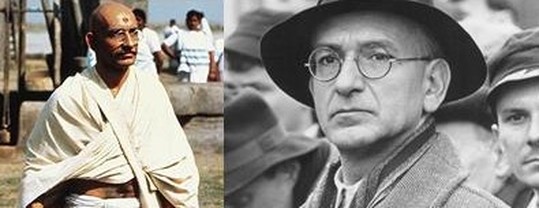
Sir Ben Kingsley (born Krishna Bhanji; 31 December 1943) is an English actor. In a career spanning over 40 years, he has won an Oscar, Grammy, BAFTA, two Golden Globes and Screen Actors Guild awards.
He is known for his starring role as Mohandas Gandhi in the 1982 film Gandhi, for which he won the Academy Award for Best Actor.
He is also known for his performances in the films Schindler's List (1993), Sexy Beast (2000), Lucky Number Slevin (2006), Shutter Island (2010), Prince of Persia: The Sands of Time (2010), Hugo (2011), and Iron Man 3 (2013).
Kingsley was made a Knight Bachelor in 2002. In 2010, he was awarded a star on the Hollywood Walk of Fame.
In 2013 he received the BAFTA Los Angeles Britannia Award for Worldwide Contribution to Filmed Entertainment.
He is known for his starring role as Mohandas Gandhi in the 1982 film Gandhi, for which he won the Academy Award for Best Actor.
He is also known for his performances in the films Schindler's List (1993), Sexy Beast (2000), Lucky Number Slevin (2006), Shutter Island (2010), Prince of Persia: The Sands of Time (2010), Hugo (2011), and Iron Man 3 (2013).
Kingsley was made a Knight Bachelor in 2002. In 2010, he was awarded a star on the Hollywood Walk of Fame.
In 2013 he received the BAFTA Los Angeles Britannia Award for Worldwide Contribution to Filmed Entertainment.
Brad Pitt
YouTube Video from "Thelma and Louise"* Featuring Brad Pitt
*-Thelma & Louise (1991)
Pictured: LEFT: Poster for “Troy” (2004): RIGHT: in “Mr. and Mrs. Smith” (2005)
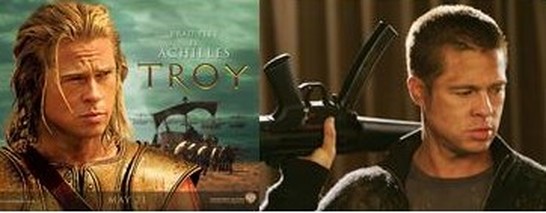
William Bradley "Brad" Pitt (born December 18, 1963) is an American actor and producer. He has received a Golden Globe Award, a Screen Actors Guild Award, and three Academy Award nominations in acting categories, and received three further Academy Award nominations, winning one, as producer under his own company Plan B Entertainment.
Pitt first gained recognition as a cowboy hitchhiker in the road movie Thelma & Louise (1991). His first leading roles in big-budget productions came with the dramas A River Runs Through It (1992) and Legends of the Fall (1994), and Interview with the Vampire (1994).
He gave critically acclaimed performances in the crime thriller Seven and the science fiction film 12 Monkeys (both 1995), the latter earning him a Golden Globe Award for Best Supporting Actor and an Academy Award nomination. Pitt starred in the cult film Fight Club (1999) and the major international hit Ocean's Eleven (2001) and its sequels, Ocean's Twelve (2004) and Ocean's Thirteen (2007).
His greatest commercial successes have been Troy (2004), Mr. & Mrs. Smith (2005), and World War Z (2013). Pitt received his second and third Academy Award nominations for his leading performances in The Curious Case of Benjamin Button (2008) and Moneyball (2011).
He produced The Departed (2006) and 12 Years a Slave (2013), both of which won the Academy Award for Best Picture, and also The Tree of Life, Moneyball, and The Big Short (2015), all of which garnered Best Picture nominations.
As a public figure, Pitt has been cited as one of the most influential and powerful people in the American entertainment industry, as well as the world's most attractive man, by various media outlets.
His personal life is also the subject of wide publicity. Divorced from actress Jennifer Aniston, to whom he was married for five years, he has been married to actress Angelina Jolie since 2014. They have six children together, three of whom were adopted internationally. In September 2016, Jolie filed for divorce from Pitt.
Pitt first gained recognition as a cowboy hitchhiker in the road movie Thelma & Louise (1991). His first leading roles in big-budget productions came with the dramas A River Runs Through It (1992) and Legends of the Fall (1994), and Interview with the Vampire (1994).
He gave critically acclaimed performances in the crime thriller Seven and the science fiction film 12 Monkeys (both 1995), the latter earning him a Golden Globe Award for Best Supporting Actor and an Academy Award nomination. Pitt starred in the cult film Fight Club (1999) and the major international hit Ocean's Eleven (2001) and its sequels, Ocean's Twelve (2004) and Ocean's Thirteen (2007).
His greatest commercial successes have been Troy (2004), Mr. & Mrs. Smith (2005), and World War Z (2013). Pitt received his second and third Academy Award nominations for his leading performances in The Curious Case of Benjamin Button (2008) and Moneyball (2011).
He produced The Departed (2006) and 12 Years a Slave (2013), both of which won the Academy Award for Best Picture, and also The Tree of Life, Moneyball, and The Big Short (2015), all of which garnered Best Picture nominations.
As a public figure, Pitt has been cited as one of the most influential and powerful people in the American entertainment industry, as well as the world's most attractive man, by various media outlets.
His personal life is also the subject of wide publicity. Divorced from actress Jennifer Aniston, to whom he was married for five years, he has been married to actress Angelina Jolie since 2014. They have six children together, three of whom were adopted internationally. In September 2016, Jolie filed for divorce from Pitt.
Bradley Cooper Pictured below: LEFT: In “Limitless (2011); RIGHT: in American Hustle (2013)
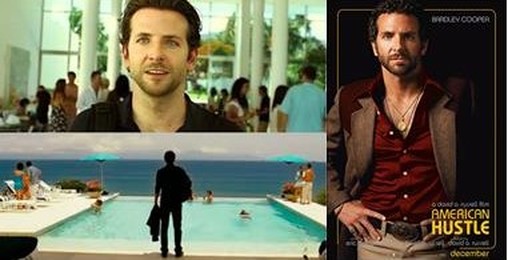
Bradley Charles Cooper (born January 5, 1975) is an American actor and filmmaker. He has been nominated for many awards, including four Academy Awards, two Grammy Awards, and a Tony Award.
Cooper appeared in Forbes Celebrity 100 on two occasions and Time's list of 100 most influential people in the world in 2015. His films have grossed $7.8 billion worldwide and he was named one of the world's highest-paid actors for three years.
Cooper enrolled in the MFA program at the Actors Studio at The New School in 2000. His career began in 1999 with a guest role in the television series Sex and the City.
Bradley made his film debut two years later in the comedy Wet Hot American Summer. He first gained recognition as Will Tippin in the spy-action television show Alias (2001–2006), and achieved minor success with a supporting part in the comedy film Wedding Crashers (2005).
Cooper's breakthrough role came in 2009 with The Hangover, a critically and commercially successful comedy, which spawned two sequels in 2011 and 2013.
Cooper's portrayal of a struggling writer in the thriller Limitless (2011) and a rookie police officer in the crime drama The Place Beyond the Pines (2012) drew praise from critics.
Cooper found greater success with the romantic comedy Silver Linings Playbook (2012), the black comedy crime film American Hustle (2013), and the war biopic American Sniper (2014), which he also produced.
For Cooper's work in these films, he was nominated for four Academy Awards, becoming the tenth actor to receive an Oscar nomination in three consecutive years.
In 2014, Cooper portrayed Joseph Merrick in a Broadway revival of The Elephant Man, garnering a nomination for the Tony Award for Best Actor in a Play. That year, he also voiced Rocket Raccoon in the Marvel Cinematic Universe.
In 2018, Cooper directed his first film with the musical romantic drama A Star Is Born, in which he also starred. He also contributed to its writing, production, and US Billboard 200 number one soundtrack. Its lead single "Shallow" topped the charts in seven countries and has been nominated for several awards.
Cooper's personal life is the subject of constant media attention. He was married to Jennifer Esposito from 2006 to 2007 and has been in a relationship with Irina Shayk since 2015, with whom he has a daughter. Cooper supports several organizations that help people fight cancer.
For more about Bradley Cooper, click here.
Cooper appeared in Forbes Celebrity 100 on two occasions and Time's list of 100 most influential people in the world in 2015. His films have grossed $7.8 billion worldwide and he was named one of the world's highest-paid actors for three years.
Cooper enrolled in the MFA program at the Actors Studio at The New School in 2000. His career began in 1999 with a guest role in the television series Sex and the City.
Bradley made his film debut two years later in the comedy Wet Hot American Summer. He first gained recognition as Will Tippin in the spy-action television show Alias (2001–2006), and achieved minor success with a supporting part in the comedy film Wedding Crashers (2005).
Cooper's breakthrough role came in 2009 with The Hangover, a critically and commercially successful comedy, which spawned two sequels in 2011 and 2013.
Cooper's portrayal of a struggling writer in the thriller Limitless (2011) and a rookie police officer in the crime drama The Place Beyond the Pines (2012) drew praise from critics.
Cooper found greater success with the romantic comedy Silver Linings Playbook (2012), the black comedy crime film American Hustle (2013), and the war biopic American Sniper (2014), which he also produced.
For Cooper's work in these films, he was nominated for four Academy Awards, becoming the tenth actor to receive an Oscar nomination in three consecutive years.
In 2014, Cooper portrayed Joseph Merrick in a Broadway revival of The Elephant Man, garnering a nomination for the Tony Award for Best Actor in a Play. That year, he also voiced Rocket Raccoon in the Marvel Cinematic Universe.
In 2018, Cooper directed his first film with the musical romantic drama A Star Is Born, in which he also starred. He also contributed to its writing, production, and US Billboard 200 number one soundtrack. Its lead single "Shallow" topped the charts in seven countries and has been nominated for several awards.
Cooper's personal life is the subject of constant media attention. He was married to Jennifer Esposito from 2006 to 2007 and has been in a relationship with Irina Shayk since 2015, with whom he has a daughter. Cooper supports several organizations that help people fight cancer.
For more about Bradley Cooper, click here.
Carl Reiner
YouTube Video of Carl Reiner and Mel Brooks as "The 2000 Year Old Man"- 1967
Pictured: Carl Reiner LEFT: with Mel Brooks in the Dick Van Dyke Show (CBS: 1961-1966); and in the 1966 movie “The Russians Are Coming, the Russians Are Coming”
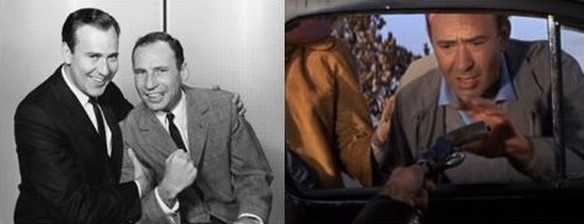
Carl Reiner (born March 20, 1922) is an American actor, director, producer, and writer of comedy whose career spans nearly seven decades.
During the early years of television comedy, from 1950 to 1957, he co-wrote and acted on Caesar's Hour and Your Show of Shows, starring comedian Sid Caesar.
In the 1960s Reiner was best known as the creator, producer, writer, and actor on The Dick Van Dyke Show. He also had great success as a film director and writer, and partnered with Steve Martin in the 1970s when Reiner co-wrote and/or directed some of Martin's most successful films, including 1979's The Jerk.
He did a comedy duo in the "2000 Year Old Man" with Mel Brooks, (see YouTube video above) and acted in films such as the The Russians Are Coming, the Russians Are Coming (1966) and the Ocean's Trilogy.
Reiner has won nine Emmy Awards and one Grammy Award during his career. He is the father of actor and director Rob Reiner and author Annie Reiner.
During the early years of television comedy, from 1950 to 1957, he co-wrote and acted on Caesar's Hour and Your Show of Shows, starring comedian Sid Caesar.
In the 1960s Reiner was best known as the creator, producer, writer, and actor on The Dick Van Dyke Show. He also had great success as a film director and writer, and partnered with Steve Martin in the 1970s when Reiner co-wrote and/or directed some of Martin's most successful films, including 1979's The Jerk.
He did a comedy duo in the "2000 Year Old Man" with Mel Brooks, (see YouTube video above) and acted in films such as the The Russians Are Coming, the Russians Are Coming (1966) and the Ocean's Trilogy.
Reiner has won nine Emmy Awards and one Grammy Award during his career. He is the father of actor and director Rob Reiner and author Annie Reiner.
Christian Bale
YouTube Video of Christian Bale in American Hustle: the Ultimate Comb-over
Pictured: Christian Bale in LEFT: American Hustle (2013), a role for which he had to gain 40 pounds; RIGHT: “The Fighter” (2010) .
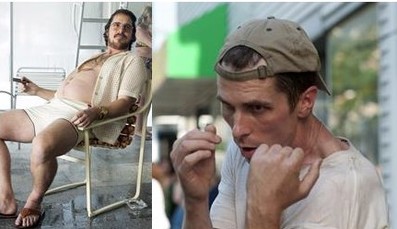
Christian Charles Philip Bale (born 30 January 1974) is an English actor. He has starred in both blockbuster films and smaller projects from independent producers and art houses.
Bale first caught the public eye at the age of 13, when he was cast in the starring role of Steven Spielberg's Empire of the Sun (1987). Based on the original story by J. G. Ballard, Bale played an English boy who is separated from his parents and subsequently finds himself lost in a Japanese internment camp during World War II.
In 2000, he garnered critical acclaim for his portrayal of serial killer Patrick Bateman in American Psycho (2000) He is known for going to great lengths to portray characters in films, notably for the psychological thriller The Machinist (2004), where he lost 63 pounds (28.5 kg) to play the role of Trevor Reznik.
Bale went on to receive greater commercial recognition and acclaim for his performance as Bruce Wayne/Batman in Christopher Nolan's Batman Begins (2005), The Dark Knight (2008) and The Dark Knight Rises (2012).
His portrayal of Dicky Eklund in the David O. Russell-directed biographical film The Fighter (2010), earned him widespread acclaim and a number of awards, including the Academy Award for Best Supporting Actor.
He has since gained further critical acclaim, as well as subsequent Academy Award, Screen Actors Guild Award and Golden Globe nominations for his roles in Russell's American Hustle and Adam McKay's The Big Short.
Bale first caught the public eye at the age of 13, when he was cast in the starring role of Steven Spielberg's Empire of the Sun (1987). Based on the original story by J. G. Ballard, Bale played an English boy who is separated from his parents and subsequently finds himself lost in a Japanese internment camp during World War II.
In 2000, he garnered critical acclaim for his portrayal of serial killer Patrick Bateman in American Psycho (2000) He is known for going to great lengths to portray characters in films, notably for the psychological thriller The Machinist (2004), where he lost 63 pounds (28.5 kg) to play the role of Trevor Reznik.
Bale went on to receive greater commercial recognition and acclaim for his performance as Bruce Wayne/Batman in Christopher Nolan's Batman Begins (2005), The Dark Knight (2008) and The Dark Knight Rises (2012).
His portrayal of Dicky Eklund in the David O. Russell-directed biographical film The Fighter (2010), earned him widespread acclaim and a number of awards, including the Academy Award for Best Supporting Actor.
He has since gained further critical acclaim, as well as subsequent Academy Award, Screen Actors Guild Award and Golden Globe nominations for his roles in Russell's American Hustle and Adam McKay's The Big Short.
Christopher Plummer
YouTube Video of Christopher Plummer In Beginners Clip - Fatherly Advice
Pictured: LEFT: With Julie Andrews in “The Sound of Music”; RIGHT: Christopher Plummer stars as Hal the father and Ewan McGregor stars as his son Oliver in Focus Features' Beginners (2011)
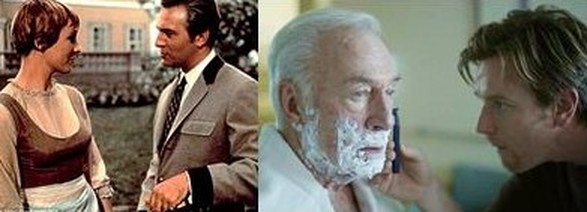
Arthur Christopher Orme Plummer (born December 13, 1929) is a Canadian theater, film and television actor. After making his film debut in 1958's Stage Struck, Plummer went on to a successful film career that has spanned over five decades.
Some of his most notable film performances include roles in films such as
He has notably portrayed several historical figures including Rudyard Kipling in The Man Who Would Be King (1975), Mike Wallace in The Insider (1999), and Leo Tolstoy in The Last Station (2009).
In a career that includes substantial roles in each of the dramatic arts, Plummer is probably best known to film audiences as the aristocratic widower Captain Georg von Trapp in the hit 1965 musical film The Sound of Music alongside Julie Andrews.
Plummer has also ventured into various television projects, including the miniseries The Thorn Birds.
Plummer has won numerous awards and accolades for his work, including an Academy Award, two Emmy Awards, two Tony Awards, a Golden Globe Award, a SAG Award, and a BAFTA Award.
With his win at the age of 82 in 2012 for Beginners, Plummer is the oldest actor ever to win an Academy Award.
Some of his most notable film performances include roles in films such as
- The Sound of Music (1965),
- Battle of Britain (1969),
- Waterloo (1970),
- The Return of the Pink Panther (1975),
- Murder by Decree (1979),
- Star Trek VI: The Undiscovered Country (1991),
- A Beautiful Mind (2001),
- Nicholas Nickleby (2002),
- The New World (2005),
- Inside Man (2006),
- Up (2009),
- The Imaginarium of Doctor Parnassus (2009),
- and The Girl with the Dragon Tattoo (2011).
He has notably portrayed several historical figures including Rudyard Kipling in The Man Who Would Be King (1975), Mike Wallace in The Insider (1999), and Leo Tolstoy in The Last Station (2009).
In a career that includes substantial roles in each of the dramatic arts, Plummer is probably best known to film audiences as the aristocratic widower Captain Georg von Trapp in the hit 1965 musical film The Sound of Music alongside Julie Andrews.
Plummer has also ventured into various television projects, including the miniseries The Thorn Birds.
Plummer has won numerous awards and accolades for his work, including an Academy Award, two Emmy Awards, two Tony Awards, a Golden Globe Award, a SAG Award, and a BAFTA Award.
With his win at the age of 82 in 2012 for Beginners, Plummer is the oldest actor ever to win an Academy Award.
Christopher Walken
YouTube Video of Walken from "The Deer Hunter": Russian Roulette Scene"
Pictured: Christopher Walken in LEFT: “Annie Hall” (1977) with Diane Keaton; RIGHT “The Deer Hunter” (1978) playing “Russian Roulette”

Ronald Walken (born March 31, 1943), known professionally as Christopher Walken, is an American actor. He has appeared in more than 100 films and television shows, including
Walken has received a number of awards and nominations during his career, including winning the Academy Award for Best Supporting Actor in 1978 for his portrayal of Nikanor "Nick" Chebotarevich in The Deer Hunter.
Walken's films have grossed more than $1 billion in the United States.
He has also played the lead in the Shakespeare plays Hamlet, Macbeth, Romeo and Juliet, and Coriolanus. He is a popular guest-host of Saturday Night Live, having hosted seven times as of April 2008.
His most notable roles on the show include record producer Bruce Dickinson in the "More Cowbell" sketch, as the double-entendre-named disgraced Confederate officer, Colonel Angus, and his multiple appearances as The Continental.
Walken debuted as a film director and scriptwriter with the short film Popcorn Shrimp in 2001. He also wrote and acted the main role in a play about his idol Elvis Presley titled Him, in 1995.
- The Deer Hunter,
- Annie Hall,
- The Prophecy trilogy,
- The Dogs of War,
- Brainstorm,
- The Dead Zone,
- A View to a Kill,
- True Romance,
- Pulp Fiction,
- Sleepy Hollow,
- Catch Me If You Can,
- Kill the Irishman,
- Hairspray,
- and Seven Psychopaths,
Walken has received a number of awards and nominations during his career, including winning the Academy Award for Best Supporting Actor in 1978 for his portrayal of Nikanor "Nick" Chebotarevich in The Deer Hunter.
Walken's films have grossed more than $1 billion in the United States.
He has also played the lead in the Shakespeare plays Hamlet, Macbeth, Romeo and Juliet, and Coriolanus. He is a popular guest-host of Saturday Night Live, having hosted seven times as of April 2008.
His most notable roles on the show include record producer Bruce Dickinson in the "More Cowbell" sketch, as the double-entendre-named disgraced Confederate officer, Colonel Angus, and his multiple appearances as The Continental.
Walken debuted as a film director and scriptwriter with the short film Popcorn Shrimp in 2001. He also wrote and acted the main role in a play about his idol Elvis Presley titled Him, in 1995.
Charlie Sheen
YouTube video featuring Charlie Sheen in the movie "Wall Street"
Pictured: Charlie Sheen in LEFT: the movie “Platoon” (1986); RIGHT: in an episode of Two and a Half Men (CBS: 2003-2015) with his real-life brother Emilio Estevez
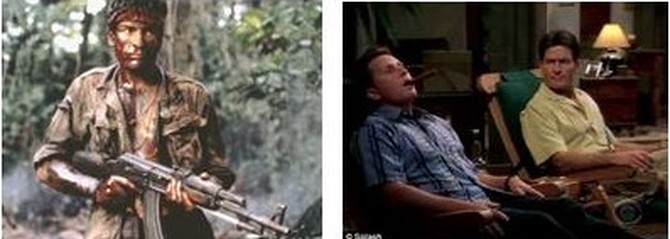
Carlos Irwin Estévez (born September 3, 1965), best known by his stage name Charlie Sheen, is an American actor.
Sheen rose to fame after a series of successful films such as:
In the 2000s, Sheen became best known for his television roles. He replaced Michael J. Fox in Spin City (ABC: 1996-2002) and his performance earned him a Golden Globe Award for Best Actor – Television Series Musical or Comedy.
Next, Sheen starred in Two and a Half Men which earned him several Golden Globe and Emmy Award nominations.
He most recently starred in the FX comedy series Anger Management, which concluded its 100-episode run in 2014. In 2010, Sheen was the highest paid actor on television and earned US $1.8 million per episode of Two and a Half Men.
Sheen's personal life has made headlines, including reports of alcohol and drug abuse and marital problems, as well as allegations of domestic violence. His contract for Two and a Half Men was terminated by CBS and Warner Bros. in March 2011. Sheen subsequently went on tour.
On November 17, 2015, Sheen publicly revealed that he was HIV positive, having been diagnosed about four years earlier.
Sheen rose to fame after a series of successful films such as:
- Platoon (1986),
- Wall Street (1987),
- Young Guns (1988),
- Eight Men Out (1988),
- Major League (1989),
- Hot Shots! (1991),
- and The Three Musketeers (1993).
In the 2000s, Sheen became best known for his television roles. He replaced Michael J. Fox in Spin City (ABC: 1996-2002) and his performance earned him a Golden Globe Award for Best Actor – Television Series Musical or Comedy.
Next, Sheen starred in Two and a Half Men which earned him several Golden Globe and Emmy Award nominations.
He most recently starred in the FX comedy series Anger Management, which concluded its 100-episode run in 2014. In 2010, Sheen was the highest paid actor on television and earned US $1.8 million per episode of Two and a Half Men.
Sheen's personal life has made headlines, including reports of alcohol and drug abuse and marital problems, as well as allegations of domestic violence. His contract for Two and a Half Men was terminated by CBS and Warner Bros. in March 2011. Sheen subsequently went on tour.
On November 17, 2015, Sheen publicly revealed that he was HIV positive, having been diagnosed about four years earlier.
Clint Eastwood
YouTube Video from "Gran Torino"
YouTube Video: Top 10 Clint Eastwood Movies by WatchMojo
Pictured: Clint Eastwood LEFT: in his first starring role as “Rowdy Yates” on CBS: Rawhide (1959-1966); RIGHT: as “Dirty Harry” from the movie of the same name (1971).
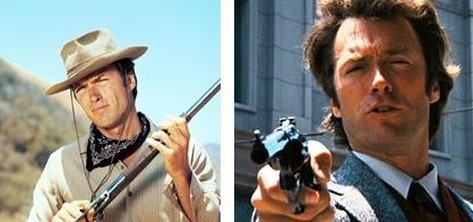
Clint Eastwood (born Clinton Eastwood, Jr.; May 31, 1930) is an American actor, film director, producer, musician, and political figure. He rose to international fame with his role as the Man with No Name in Sergio Leone's Dollars trilogy of spaghetti Westerns during the 1960s, and as antihero cop Harry Callahan in the five Dirty Harry films throughout the 1970s and 1980s. These roles, among others, have made him an enduring cultural icon of masculinity.
For his work in the Western film Unforgiven (1992) and the sports drama Million Dollar Baby (2004), Eastwood won Academy Awards for Best Director and Best Picture, as well as receiving nominations for Best Actor.
His greatest commercial successes have been the adventure comedy Every Which Way But Loose (1978) and its sequel, the action comedy Any Which Way You Can (1980), after adjustment for inflation.
Other popular films include the,
In addition to directing many of his own star vehicles, Eastwood has also directed films in which he did not appear, such as the.
The war drama biopic American Sniper (2014) set box office records for the biggest January release ever and was also the biggest opening ever for an Eastwood film.
He received considerable critical praise in France for several films, including some that weren't well received in the United States. He has been awarded two of France's highest honors: in 1994 he became a recipient of the Commandeur of the Ordre des Arts et des Lettres and in 2007 he was awarded the Légion d'honneur medal.
In 2000, he was awarded the Italian Venice Film Festival Golden Lion for lifetime achievement.
Since 1967, Eastwood has run his own production company, Malpaso, which has produced all except four of his American films. From 1986-88, he served as mayor of Carmel-by-the-Sea, California, a non-partisan office.
Click here for more about Clint Eastwood.
For his work in the Western film Unforgiven (1992) and the sports drama Million Dollar Baby (2004), Eastwood won Academy Awards for Best Director and Best Picture, as well as receiving nominations for Best Actor.
His greatest commercial successes have been the adventure comedy Every Which Way But Loose (1978) and its sequel, the action comedy Any Which Way You Can (1980), after adjustment for inflation.
Other popular films include the,
- Western Hang 'Em High (1968),
- psychological thriller Play Misty for Me (1971),
- crime film Thunderbolt and Lightfoot (1974),
- Western The Outlaw Josey Wales (1976),
- prison film Escape from Alcatraz (1979),
- action film Firefox (1982),
- suspense thriller Tightrope (1984),
- Western Pale Rider (1985),
- war film Heartbreak Ridge (1986),
- action thriller In the Line of Fire (1993),
- romantic drama The Bridges of Madison County (1995),
- drama Gran Torino (2008).
In addition to directing many of his own star vehicles, Eastwood has also directed films in which he did not appear, such as the.
- mystery drama Mystic River (2003),
- war film Letters from Iwo Jima (2006), for which he received Academy Award nominations,
- drama Changeling (2008).
- The 2016 movie Sully
The war drama biopic American Sniper (2014) set box office records for the biggest January release ever and was also the biggest opening ever for an Eastwood film.
He received considerable critical praise in France for several films, including some that weren't well received in the United States. He has been awarded two of France's highest honors: in 1994 he became a recipient of the Commandeur of the Ordre des Arts et des Lettres and in 2007 he was awarded the Légion d'honneur medal.
In 2000, he was awarded the Italian Venice Film Festival Golden Lion for lifetime achievement.
Since 1967, Eastwood has run his own production company, Malpaso, which has produced all except four of his American films. From 1986-88, he served as mayor of Carmel-by-the-Sea, California, a non-partisan office.
Click here for more about Clint Eastwood.
The Coen Brothers
YouTube Video from The Big Lebowski - Best Quotes
Pictured: Coen Brothers Movies from Left to Right: John Goodman as Walter Sobchak in "The Big Lebowski" (1998), George Clooney in “Hail Caesar!” (2016), Frances McDormand in "Fargo (1996)
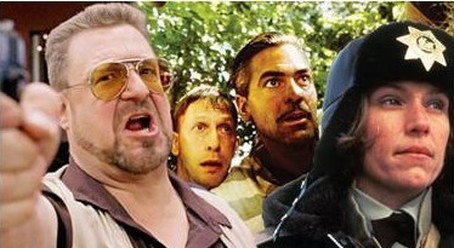
Joel David Coen (born November 29, 1954) and Ethan Jesse Coen (born September 21, 1957), collectively referred to as the Coen Brothers, are American filmmakers. They have directed more than 15 films together, that are often characterized as being "genre-busting", having covered comedy, crime, the Western, horror, thriller, gangster, drama, romance, adventure, and features of neo-noir.
Their films include
The brothers write, direct, and produce their films jointly, although until The Ladykillers (2004), Joel received sole credit for directing and Ethan for producing. They often alternate top billing for their screenplays while sharing film credits for editor under the alias Roderick Jaynes.
They have been nominated for thirteen Academy Awards together, plus one individual nomination for each, winning Best Original Screenplay for Fargo and Best Picture, Best Director and Best Adapted Screenplay for No Country for Old Men.
They have written a number of films neither of the brothers directed. These films include the biographical war drama Unbroken (2014), and the historical drama thriller Bridge of Spies (2015), as well as more obscure and unsuccessful comedy films such as Crimewave (1985), The Naked Man (1998), and Gambit (2012).
Ethan is also a writer of short stories, theater, and poetry.
Click here for more about the Coen Brothers.
Their films include
- Blood Simple (1984),
- Raising Arizona (1987),
- Miller's Crossing (1990),
- Barton Fink (1991),
- Fargo (1996),
- The Big Lebowski (1998),
- O Brother, Where Art Thou? (2000),
- No Country for Old Men (2007),
- Burn After Reading (2008),
- A Serious Man (2009),
- True Grit (2010),
- Inside Llewyn Davis (2013),
- and Hail, Caesar! (2016).
The brothers write, direct, and produce their films jointly, although until The Ladykillers (2004), Joel received sole credit for directing and Ethan for producing. They often alternate top billing for their screenplays while sharing film credits for editor under the alias Roderick Jaynes.
They have been nominated for thirteen Academy Awards together, plus one individual nomination for each, winning Best Original Screenplay for Fargo and Best Picture, Best Director and Best Adapted Screenplay for No Country for Old Men.
They have written a number of films neither of the brothers directed. These films include the biographical war drama Unbroken (2014), and the historical drama thriller Bridge of Spies (2015), as well as more obscure and unsuccessful comedy films such as Crimewave (1985), The Naked Man (1998), and Gambit (2012).
Ethan is also a writer of short stories, theater, and poetry.
Click here for more about the Coen Brothers.
Colin Firth
YouTube Video of Colin Firth from the movie "The King's Speech" including Geoffrey Rush*
*-Geoffrey Rush
Pictured: Colin Firth as LEFT: King George VI in “The King’s Speech” (2010); RIGHT: With Julianne Moore in “The Single Man” (2009)
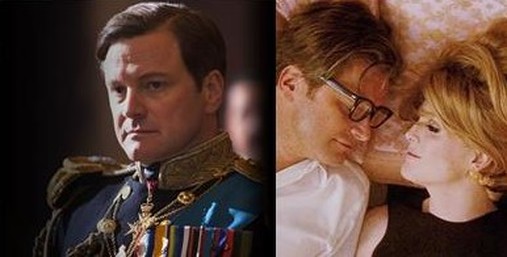
Colin Andrew Firth (born 10 September 1960) is an English actor. His films have grossed more than $3 billion from 42 releases worldwide.
He has received an Academy Award, a Golden Globe Award, two British Academy Film Awards and three Screen Actors Guild Awards, as well as the Volpi Cup.
His most notable and acclaimed role to date has been his 2010 portrayal of King George VI in The King's Speech, a performance that earned him an Oscar and multiple worldwide best actor awards.
Identified in the late 1980s with the "Brit Pack" of rising, young British actors, it was not until Firth's portrayal of Mr. Darcy in the 1995 television adaptation of Jane Austen's Pride and Prejudice that he received more widespread attention.
This led to roles in films such as The English Patient, Bridget Jones's Diary (for which he was nominated for a BAFTA), Shakespeare in Love and Love Actually. In 2009 he received widespread critical acclaim for his leading role in A Single Man, for which Firth gained his first Academy Award nomination, and won a BAFTA Award.
He starred in the action spy comedy Kingsman: The Secret Service in 2014, which was a commercial success and received generally positive reviews.
In 2011, Firth received a star on the Hollywood Walk of Fame and was also selected as one of the Time 100.
He was awarded an honorary degree from the University of Winchester in 2007, and was made a Freeman of the City of London in 2012. Firth has campaigned for the rights of indigenous tribal peoples and is a member of Survival International. He has also campaigned on issues of asylum seekers and refugees' rights and the environment. Firth commissioned and is credited as a co-author on a scientific paper on a study into the differences in brain structure between people of differing political orientations.
Click here for more about Colin Firth.
He has received an Academy Award, a Golden Globe Award, two British Academy Film Awards and three Screen Actors Guild Awards, as well as the Volpi Cup.
His most notable and acclaimed role to date has been his 2010 portrayal of King George VI in The King's Speech, a performance that earned him an Oscar and multiple worldwide best actor awards.
Identified in the late 1980s with the "Brit Pack" of rising, young British actors, it was not until Firth's portrayal of Mr. Darcy in the 1995 television adaptation of Jane Austen's Pride and Prejudice that he received more widespread attention.
This led to roles in films such as The English Patient, Bridget Jones's Diary (for which he was nominated for a BAFTA), Shakespeare in Love and Love Actually. In 2009 he received widespread critical acclaim for his leading role in A Single Man, for which Firth gained his first Academy Award nomination, and won a BAFTA Award.
He starred in the action spy comedy Kingsman: The Secret Service in 2014, which was a commercial success and received generally positive reviews.
In 2011, Firth received a star on the Hollywood Walk of Fame and was also selected as one of the Time 100.
He was awarded an honorary degree from the University of Winchester in 2007, and was made a Freeman of the City of London in 2012. Firth has campaigned for the rights of indigenous tribal peoples and is a member of Survival International. He has also campaigned on issues of asylum seekers and refugees' rights and the environment. Firth commissioned and is credited as a co-author on a scientific paper on a study into the differences in brain structure between people of differing political orientations.
Click here for more about Colin Firth.
Daniel Day-Lewis
YouTube Video of Daniel Day-Lewis Top 10 Performances
Pictured: Daniel Day-Lewis in the Movie "Lincoln" (2012) with co-star Sally Fields
Sir Daniel Michael Blake Day-Lewis (born 29 April 1957) is an English actor. He holds both British and Irish citizenship. Born and raised in London, he excelled on stage at the National Youth Theatre, before being accepted at the Bristol Old Vic Theatre School, which he attended for three years. Despite his traditional actor training at the Bristol Old Vic, he is considered to be a method actor, known for his constant devotion to and research of his roles.
He often remains completely in character for the duration of the shooting schedules of his films, even to the point of adversely affecting his health. He is one of the most selective actors in the film industry, having starred in only five films since 1998, with as many as five years between roles.
Day-Lewis is one of the most acclaimed actors of his generation and has earned numerous awards, including three Academy Awards for Best Actor for his performances in My Left Foot (1989), There Will Be Blood (2007) and Lincoln (2012), making him the only male actor in history to have three wins in the lead actor category and one of only three male actors to win three Oscars.
He was also Oscar nominated in this category for In the Name of the Father (1993) and Gangs of New York (2002). He has also won four BAFTA Awards for Best Actor, three Screen Actors Guild Awards and two Golden Globe Awards. In November 2012, Time named Day-Lewis the "World's Greatest Actor."
In June 2014, he received a knighthood at Buckingham Palace for services to drama.
Click here for more about Daniel Day-Lewis.
He often remains completely in character for the duration of the shooting schedules of his films, even to the point of adversely affecting his health. He is one of the most selective actors in the film industry, having starred in only five films since 1998, with as many as five years between roles.
Day-Lewis is one of the most acclaimed actors of his generation and has earned numerous awards, including three Academy Awards for Best Actor for his performances in My Left Foot (1989), There Will Be Blood (2007) and Lincoln (2012), making him the only male actor in history to have three wins in the lead actor category and one of only three male actors to win three Oscars.
He was also Oscar nominated in this category for In the Name of the Father (1993) and Gangs of New York (2002). He has also won four BAFTA Awards for Best Actor, three Screen Actors Guild Awards and two Golden Globe Awards. In November 2012, Time named Day-Lewis the "World's Greatest Actor."
In June 2014, he received a knighthood at Buckingham Palace for services to drama.
Click here for more about Daniel Day-Lewis.
Denzel Washington
YouTube Video of Denzel Washington in "Training Day": Alonzo - Best Scene
Pictured: Denzel Washington in LEFT: “The Taking of Pelham 123” (2009); RIGHT: in “Glory” (1989)
Denzel Hayes Washington, Jr. (born December 28, 1954) is an American actor and filmmaker. He has received three Golden Globe awards, a Tony Award, and two Academy Awards: Best Supporting Actor for the historical war drama film Glory (1989) and Best Actor for his role as a corrupt cop in the crime thriller Training Day (2001).
Washington has received much critical acclaim for his film work since the 1990s, including his portrayals of real-life figures such as South African anti-apartheid activist Steve Biko in Cry Freedom (1987), Muslim minister and human rights activist Malcolm X in Malcolm X (1992), boxer Rubin "Hurricane" Carter in The Hurricane (1999), football coach Herman Boone in Remember the Titans (2000), poet and educator Melvin B. Tolson in The Great Debaters (2007), and drug kingpin Frank Lucas in American Gangster (2007).
He has been a featured actor in the films produced by Jerry Bruckheimer and has been a frequent collaborator of directors Spike Lee and the late Tony Scott.
In 2016 he was selected as the recipient for the Cecil B. DeMille Lifetime Achievement Award at the 73rd Golden Globe Awards.
Click here for more about Denzil Washington.
Washington has received much critical acclaim for his film work since the 1990s, including his portrayals of real-life figures such as South African anti-apartheid activist Steve Biko in Cry Freedom (1987), Muslim minister and human rights activist Malcolm X in Malcolm X (1992), boxer Rubin "Hurricane" Carter in The Hurricane (1999), football coach Herman Boone in Remember the Titans (2000), poet and educator Melvin B. Tolson in The Great Debaters (2007), and drug kingpin Frank Lucas in American Gangster (2007).
He has been a featured actor in the films produced by Jerry Bruckheimer and has been a frequent collaborator of directors Spike Lee and the late Tony Scott.
In 2016 he was selected as the recipient for the Cecil B. DeMille Lifetime Achievement Award at the 73rd Golden Globe Awards.
Click here for more about Denzil Washington.
Don Cheadle
Featured in a YouTube Video from the movie "Crash" (2004)
Pictured: Don Cheadle LEFT: as DEA Agent Montel Gordon (Don Cheadle) in Traffic (2000); RIGHT: in Hotel Rwanda (2004)
Donald Frank "Don" Cheadle, Jr. born November 29, 1964) is an American actor, writer, producer, and director. He had an early role in Hamburger Hill (1987), before building his career in the 1990s with performances in Devil in a Blue Dress (1995), Rosewood (1997) and Boogie Nights (1997).
He started a collaboration with director Steven Soderbergh that resulted in the films, Out of Sight (1998), Traffic (2000) and Ocean's Eleven (2001). Other films include The Rat Pack (1998), Things Behind the Sun (2001), Swordfish (2001), Crash (2004), Ocean's Twelve (2004), Ocean's Thirteen (2007), Reign Over Me (2007), Talk to Me (2007), Traitor (2008) and The Guard.
He plays the superhero War Machine in the Marvel Cinematic Universe and has appeared in Iron Man 2 (2010), Iron Man 3 (2013) and Avengers: Age of Ultron (2015). He will reprise his role in Captain America: Civil War in 2016.
In 2004, Cheadle earned critical acclaim for his lead role as Rwandan hotel manager Paul Rusesabagina in the genocide drama film Hotel Rwanda, which was set during the Rwandan Genocide which earned him a nomination for an Academy Award for Best Actor. He stars as Marty Kaan on the Showtime sitcom House of Lies, for which he most recently won a Golden Globe Award in 2013.
He also campaigns for the end of genocide in Darfur, Sudan, and co-authored, with John Prendergast, a book concerning the issue entitled Not On Our Watch: The Mission to End Genocide in Darfur and Beyond.
Along with George Clooney, Brad Pitt, Matt Damon, David Pressman, and Jerry Weintraub, Cheadle co-founded the Not On Our Watch Project, an organization focusing global attention and resources to stop and prevent mass atrocities.
In 2010, Cheadle was named U.N. Environment Program Goodwill Ambassador.
Click here for more about Don Cheadle.
He started a collaboration with director Steven Soderbergh that resulted in the films, Out of Sight (1998), Traffic (2000) and Ocean's Eleven (2001). Other films include The Rat Pack (1998), Things Behind the Sun (2001), Swordfish (2001), Crash (2004), Ocean's Twelve (2004), Ocean's Thirteen (2007), Reign Over Me (2007), Talk to Me (2007), Traitor (2008) and The Guard.
He plays the superhero War Machine in the Marvel Cinematic Universe and has appeared in Iron Man 2 (2010), Iron Man 3 (2013) and Avengers: Age of Ultron (2015). He will reprise his role in Captain America: Civil War in 2016.
In 2004, Cheadle earned critical acclaim for his lead role as Rwandan hotel manager Paul Rusesabagina in the genocide drama film Hotel Rwanda, which was set during the Rwandan Genocide which earned him a nomination for an Academy Award for Best Actor. He stars as Marty Kaan on the Showtime sitcom House of Lies, for which he most recently won a Golden Globe Award in 2013.
He also campaigns for the end of genocide in Darfur, Sudan, and co-authored, with John Prendergast, a book concerning the issue entitled Not On Our Watch: The Mission to End Genocide in Darfur and Beyond.
Along with George Clooney, Brad Pitt, Matt Damon, David Pressman, and Jerry Weintraub, Cheadle co-founded the Not On Our Watch Project, an organization focusing global attention and resources to stop and prevent mass atrocities.
In 2010, Cheadle was named U.N. Environment Program Goodwill Ambassador.
Click here for more about Don Cheadle.
Dustin Hoffman
YouTube Video: The Graduate (1967) - "Mrs. Robinson, you're trying to seduce me Aren't you?"
YouTube Video from "Little Big Man": "You Go Down There"
YouTube Video of the best of "Rain Man"
Pictured: Dustin Hoffman in LEFT: Tootsie (1982) and RIGHT: Marathon Man (1976)
Dustin Lee Hoffman (born August 8, 1937) is an American actor and director with a career in film, television, and theater since 1960. He has been known for his versatile portrayals of antiheroes and vulnerable characters.
He won the Academy Award for Best Actor in 1980 (for Kramer vs. Kramer) and 1989 (for Rain Man).
He first drew critical praise for starring in the play Eh?, for which he won a Theatre World Award and a Drama Desk Award.
This was soon followed by his breakthrough 1967 film role as Benjamin Braddock, the title character, in The Graduate.
Since then, Hoffman's career has largely been focused on cinema, with sporadic returns to television and the stage. His subsequent notable films include,
Aside from his two Academy award wins, Hoffman has been nominated for seven Academy Awards, plus thirteen Golden Globes, winning six (including an honorary one) and has won four BAFTAs, three Drama Desk Awards, a Genie Award, and an Emmy Award.
Hoffman received the AFI Life Achievement Award in 1999, and the Kennedy Center Honors in 2012.
Hoffman made his directorial debut in 2012, with Quartet.
Click here for more about Dustin Hoffman.
He won the Academy Award for Best Actor in 1980 (for Kramer vs. Kramer) and 1989 (for Rain Man).
He first drew critical praise for starring in the play Eh?, for which he won a Theatre World Award and a Drama Desk Award.
This was soon followed by his breakthrough 1967 film role as Benjamin Braddock, the title character, in The Graduate.
Since then, Hoffman's career has largely been focused on cinema, with sporadic returns to television and the stage. His subsequent notable films include,
- Midnight Cowboy,
- Little Big Man,
- Straw Dogs,
- Papillon,
- Lenny,
- Marathon Man,
- All the President's Men,
- Kramer vs. Kramer,
- Tootsie,
- Rain Man,
- Hook,
- and Wag the Dog.
Aside from his two Academy award wins, Hoffman has been nominated for seven Academy Awards, plus thirteen Golden Globes, winning six (including an honorary one) and has won four BAFTAs, three Drama Desk Awards, a Genie Award, and an Emmy Award.
Hoffman received the AFI Life Achievement Award in 1999, and the Kennedy Center Honors in 2012.
Hoffman made his directorial debut in 2012, with Quartet.
Click here for more about Dustin Hoffman.
Eddie Redmayne
YouTube Video of The Theory of Everything Official Trailer #1 (2014) - Eddie Redmayne as Stephen Hawking
Pictured: Eddie Redmayne LEFT: Portraying Stephen Hawking in the Movie “The Theory of Everything” (2014): RIGHT: as Marius Pontmercy in "Les Misérables" (2012 film)
Edward John David "Eddie" Redmayne, born January 6, 1982) is an English actor, model and singer.
Brought up in Westminster, Redmayne attended Eton College and began his professional acting career as a youth in London theater before making his screen debut in 1998 with guest appearances on television.
He made his feature film debut in 2006 with Like Minds and The Good Shepherd and went on to appear in films such as,
For his performance in the Broadway play Red (2010), he won the Tony Award for Best Performance by a Featured Actor in a Play.
Redmayne received recognition in 2011 for portraying filmmaker Colin Clark in My Week with Marilyn, which garnered him a BAFTA Rising Star Award nomination.
He received further recognition for his role as Marius Pontmercy in Tom Hooper's 2012 adaptation of Victor Hugo's French novel Les Misérables (2012).
In 2014, he received critical acclaim for his performance as Stephen Hawking in The Theory of Everything, for which he won the Academy, BAFTA, Golden Globe, and SAG Award for Best Actor.
The following year, he received further critical acclaim for his portrayal of Lili Elbe, one of the first known recipients of sex reassignment surgery, in The Danish Girl. For his performance, he garnered nominations for his second Academy, BAFTA, Golden Globe, and SAG Award for Best Actor.
Redmayne is also known for his panned performance in the 2015 space opera Jupiter Ascending and is set to appear in the upcoming adaption of J. K. Rowling's fantasy book Fantastic Beasts and Where to Find Them (2016), which is set in the fictional universe of Harry Potter.
Since 2014, Redmayne has been married to public relations executive Hannah Bagshawe, with whom he is expecting his first child in June 2016.
Click here for more about Eddie Redmayne.
Brought up in Westminster, Redmayne attended Eton College and began his professional acting career as a youth in London theater before making his screen debut in 1998 with guest appearances on television.
He made his feature film debut in 2006 with Like Minds and The Good Shepherd and went on to appear in films such as,
- Savage Grace (2007),
- Elizabeth: The Golden Age (2007),
- The Other Boleyn Girl (2008),
- and Black Death (2010).
For his performance in the Broadway play Red (2010), he won the Tony Award for Best Performance by a Featured Actor in a Play.
Redmayne received recognition in 2011 for portraying filmmaker Colin Clark in My Week with Marilyn, which garnered him a BAFTA Rising Star Award nomination.
He received further recognition for his role as Marius Pontmercy in Tom Hooper's 2012 adaptation of Victor Hugo's French novel Les Misérables (2012).
In 2014, he received critical acclaim for his performance as Stephen Hawking in The Theory of Everything, for which he won the Academy, BAFTA, Golden Globe, and SAG Award for Best Actor.
The following year, he received further critical acclaim for his portrayal of Lili Elbe, one of the first known recipients of sex reassignment surgery, in The Danish Girl. For his performance, he garnered nominations for his second Academy, BAFTA, Golden Globe, and SAG Award for Best Actor.
Redmayne is also known for his panned performance in the 2015 space opera Jupiter Ascending and is set to appear in the upcoming adaption of J. K. Rowling's fantasy book Fantastic Beasts and Where to Find Them (2016), which is set in the fictional universe of Harry Potter.
Since 2014, Redmayne has been married to public relations executive Hannah Bagshawe, with whom he is expecting his first child in June 2016.
Click here for more about Eddie Redmayne.
Forest Whitaker
YouTube of Forest Whitaker as Idi Amin in "The Last King of Scotland"
Pictured: Forest Whitaker in LEFT: "The Shield" (TV FX: 2002-2008) and RIGHT: as Idi Amin in the movie "The Last King of Scotland" (Movie 2006)
Forest Steven Whitaker III (born July 15, 1961) is an American actor, director, and producer.
He has earned a reputation for intensive character study work for films such as Bird, Platoon, Ghost Dog: The Way of the Samurai and Lee Daniels' The Butler, for his work in independent films and for his recurring role as LAPD Internal Affairs Lieutenant Jon Kavanaugh on the Emmy Award-winning television series The Shield.
Whitaker won the Academy Award, British Academy Film Award, Golden Globe Award, National Board of Review Award, Screen Actors Guild Award, and various critics groups awards for his performance as Ugandan dictator Idi Amin in the 2006 film The Last King of Scotland.
Click here for more about Forest Whitaker.
He has earned a reputation for intensive character study work for films such as Bird, Platoon, Ghost Dog: The Way of the Samurai and Lee Daniels' The Butler, for his work in independent films and for his recurring role as LAPD Internal Affairs Lieutenant Jon Kavanaugh on the Emmy Award-winning television series The Shield.
Whitaker won the Academy Award, British Academy Film Award, Golden Globe Award, National Board of Review Award, Screen Actors Guild Award, and various critics groups awards for his performance as Ugandan dictator Idi Amin in the 2006 film The Last King of Scotland.
Click here for more about Forest Whitaker.
Gary Oldman
YouTube Video in the Movie "Air Force One" - A scene from Air Force One where Ivan Korshunov (Gary Oldman) talks to the First Lady and First Daughter.
Pictured: Gary Oldman LEFT: mug shot as Lee Harvey Oswald from 'JFK' movie; RIGHT: as Count Dracula in Bram Stoker's Dracula
Gary Leonard Oldman (born 21 March 1958) is an English actor, filmmaker, musician and author.
Renowned for his "big" acting style, Oldman is one of the most celebrated thespians of his generation, with a diverse career encompassing theatre, film and television.
Oldman began acting on stage in 1979, and gained his first starring film role in Meantime (1983). He continued to lead an acclaimed theater career, during which he performed at London's Royal Court and was a member of the Royal Shakespeare Company, with credits including,
Oldman's portrayals of Sid Vicious and Joe Orton, in the biographical films Sid and Nancy (1986) and Prick Up Your Ears (1987) respectively, prompted critic Roger Ebert to declare him "the best young British actor around"; the latter brought Oldman a BAFTA Award nomination.
Roles as a football firm leader in The Firm (1989) and the titular Rosencrantz in Rosencrantz & Guildenstern Are Dead (1990) further increased his renown within British film.
Oldman went on to achieve international recognition as an Irish American gangster in State of Grace (1990), Lee Harvey Oswald in JFK (1991), and Count Dracula in Bram Stoker's Dracula (1992), which earned him the Saturn Award for Best Actor.
Emerging as a popular portrayer of villains, Oldman starred as corrupt DEA agent Norman Stansfield in Léon: The Professional (1994), as well as the antagonists of films such as True Romance (1993), The Fifth Element (1997), Air Force One (1997), and The Contender (2000), for which he garnered a Screen Actors Guild Award nomination; Oldman meanwhile played Ludwig van Beethoven in Immortal Beloved (1994).
In the 21st century, he is known for his roles as Sirius Black in the Harry Potter series; James Gordon in The Dark Knight Trilogy; George Smiley in Tinker Tailor Soldier Spy (2011), which brought Academy and BAFTA Award nominations for Best Actor; and a human leader in Dawn of the Planet of the Apes (2014).
Oldman also voiced the villain Lord Shen in Kung Fu Panda 2 (2011).
As of 2016, motion pictures in which Oldman has starred have grossed over $10.6 billion.
Outside of acting in film, he wrote and directed the double BAFTA Award-winning, Palme d'Or -nominated Nil by Mouth (1997); made an Emmy Award-nominated guest appearance in the Friends two-part episode "The One with Monica and Chandler's Wedding" (2001); featured in music videos by artists including David Bowie, Guns N' Roses and Annie Lennox; and provided the voice of Viktor Reznov in the Call of Duty video game series.
Click here for more about Gary Oldman.
Renowned for his "big" acting style, Oldman is one of the most celebrated thespians of his generation, with a diverse career encompassing theatre, film and television.
Oldman began acting on stage in 1979, and gained his first starring film role in Meantime (1983). He continued to lead an acclaimed theater career, during which he performed at London's Royal Court and was a member of the Royal Shakespeare Company, with credits including,
- The Massacre at Paris (1980),
- Entertaining Mr Sloane (1983),
- Saved (1983),
- Women Beware Women (1986),
- The Country Wife (1987)
- and Hamlet (1987).
Oldman's portrayals of Sid Vicious and Joe Orton, in the biographical films Sid and Nancy (1986) and Prick Up Your Ears (1987) respectively, prompted critic Roger Ebert to declare him "the best young British actor around"; the latter brought Oldman a BAFTA Award nomination.
Roles as a football firm leader in The Firm (1989) and the titular Rosencrantz in Rosencrantz & Guildenstern Are Dead (1990) further increased his renown within British film.
Oldman went on to achieve international recognition as an Irish American gangster in State of Grace (1990), Lee Harvey Oswald in JFK (1991), and Count Dracula in Bram Stoker's Dracula (1992), which earned him the Saturn Award for Best Actor.
Emerging as a popular portrayer of villains, Oldman starred as corrupt DEA agent Norman Stansfield in Léon: The Professional (1994), as well as the antagonists of films such as True Romance (1993), The Fifth Element (1997), Air Force One (1997), and The Contender (2000), for which he garnered a Screen Actors Guild Award nomination; Oldman meanwhile played Ludwig van Beethoven in Immortal Beloved (1994).
In the 21st century, he is known for his roles as Sirius Black in the Harry Potter series; James Gordon in The Dark Knight Trilogy; George Smiley in Tinker Tailor Soldier Spy (2011), which brought Academy and BAFTA Award nominations for Best Actor; and a human leader in Dawn of the Planet of the Apes (2014).
Oldman also voiced the villain Lord Shen in Kung Fu Panda 2 (2011).
As of 2016, motion pictures in which Oldman has starred have grossed over $10.6 billion.
Outside of acting in film, he wrote and directed the double BAFTA Award-winning, Palme d'Or -nominated Nil by Mouth (1997); made an Emmy Award-nominated guest appearance in the Friends two-part episode "The One with Monica and Chandler's Wedding" (2001); featured in music videos by artists including David Bowie, Guns N' Roses and Annie Lennox; and provided the voice of Viktor Reznov in the Call of Duty video game series.
Click here for more about Gary Oldman.
Gene Hackman
YouTube Video: The French Connection car chase
Pictured: Gene Hackman in LEFT: (Pictured with Warren Beatty) as Buck Barrow in the 1967 Movie "Bonnie and Clyde"; RIGHT: as the villain Lex Luther in the 1978 movie "Superman" (played by Christopher Reeve)
Eugene Allen "Gene" Hackman (born January 30, 1930) is an American retired actor and novelist.
In a career spanning five decades, Hackman has been nominated for five Academy Awards, winning two for best actor in The French Connection and best supporting actor in Unforgiven. In addition, Hackman has won three Golden Globes and two BAFTAs.
He first came to fame in 1967 with his performance as Buck Barrow in Bonnie and Clyde.
His major subsequent films include,
On July 7, 2004, Hackman gave a rare interview to Larry King, in which Hackman announced that he had no future film projects lined up and believed his acting career was over. In 2008, while promoting his third novel, Hackman confirmed that he had retired from acting. When asked during a GQ interview in 2011 if he would ever come out of retirement to do one more film, Hackman said he might consider it "if I could do it in my own house, maybe, without them disturbing anything and just one or two people."
Together with undersea archaeologist Daniel Lenihan, Hackman has written three historical fiction novels: Wake of the Perdido Star (1999), a sea adventure of the 19th century; Justice for None (2004), a Depression-era tale of murder; and Escape from Andersonville (2008) about a prison escape during the Civil War. His first solo effort, a story of love and revenge set in the Old West titled Payback at Morning Peak, was released in 2011. A police thriller, Pursuit, followed in 2013.
Click here for more about Gene Hackman.
In a career spanning five decades, Hackman has been nominated for five Academy Awards, winning two for best actor in The French Connection and best supporting actor in Unforgiven. In addition, Hackman has won three Golden Globes and two BAFTAs.
He first came to fame in 1967 with his performance as Buck Barrow in Bonnie and Clyde.
His major subsequent films include,
- The French Connection (1971)
- French Connection II (1975)
- The Poseidon Adventure (1972);
- The Conversation (1974);
- Superman (1978);
- Hoosiers (1986);
- Mississippi Burning (1988);
- Unforgiven (1992);
- The Firm (1993);
- Crimson Tide (1995);
- Get Shorty (1995);
- The Birdcage (1996);
- Enemy of the State (1998);
- Behind Enemy Lines (2001);
- and The Royal Tenenbaums (2001).
On July 7, 2004, Hackman gave a rare interview to Larry King, in which Hackman announced that he had no future film projects lined up and believed his acting career was over. In 2008, while promoting his third novel, Hackman confirmed that he had retired from acting. When asked during a GQ interview in 2011 if he would ever come out of retirement to do one more film, Hackman said he might consider it "if I could do it in my own house, maybe, without them disturbing anything and just one or two people."
Together with undersea archaeologist Daniel Lenihan, Hackman has written three historical fiction novels: Wake of the Perdido Star (1999), a sea adventure of the 19th century; Justice for None (2004), a Depression-era tale of murder; and Escape from Andersonville (2008) about a prison escape during the Civil War. His first solo effort, a story of love and revenge set in the Old West titled Payback at Morning Peak, was released in 2011. A police thriller, Pursuit, followed in 2013.
Click here for more about Gene Hackman.
James Cameron
YouTube Video: James Cameron, the director of "Titanic" and "Avatar," has made history by traveling seven miles to the deepest point on Earth in a specially-designed submarine called Deepsea Challenger. WSJ's Gautam Naik reports.
James Francis Cameron (born August 16, 1954) is a Canadian filmmaker, director, producer, screenwriter, inventor, engineer, philanthropist, and deep-sea explorer.
He first found major success with the science fiction action film The Terminator (1984). He then became a popular Hollywood director and was hired to write and direct Aliens (1986); three years later he followed up with The Abyss (1989).
He found further critical acclaim for his use of special effects in Terminator 2: Judgment Day (1991).
After his film True Lies (1994) Cameron took on his biggest film at the time, Titanic (1997), which earned him Academy Awards for Best Picture, Best Director and Film Editing.
After Titanic, Cameron began a project that took almost 10 years to make: his science-fiction epic Avatar (2009), which was in particular a landmark for 3D technology, and for which he received nominations for the same three Academy Awards.
In the time between making Titanic and Avatar, Cameron spent several years creating many documentary films (specifically underwater documentaries) and co-developed the digital 3D Fusion Camera System. Described by a biographer as part scientist and part artist, Cameron has also contributed to underwater filming and remote vehicle technologies.
On March 26, 2012, Cameron reached the bottom of the Mariana Trench, the deepest part of the ocean, in the Deepsea Challenger submersible. He is the first person to do this in a solo descent, and is only the third person to do so ever.
In total, Cameron's directorial efforts have grossed approximately US$2 billion in North America and US$6 billion worldwide.
Not adjusted for inflation, Cameron's Titanic and Avatar are the two highest-grossing films of all time at $2.19 billion and $2.78 billion respectively.
Cameron also holds the achievement of having directed two of the three films in history to gross over $2 billion worldwide.
In March 2011, he was named Hollywood's top earner by Vanity Fair, with estimated 2010 earnings of $257 million.
In October 2013, a new species of frog Pristimantis jamescameroni from Venezuela was named after him in recognition of his efforts in environmental awareness, in addition to his public promotion of veganism.
Click here for more about James Cameron.
He first found major success with the science fiction action film The Terminator (1984). He then became a popular Hollywood director and was hired to write and direct Aliens (1986); three years later he followed up with The Abyss (1989).
He found further critical acclaim for his use of special effects in Terminator 2: Judgment Day (1991).
After his film True Lies (1994) Cameron took on his biggest film at the time, Titanic (1997), which earned him Academy Awards for Best Picture, Best Director and Film Editing.
After Titanic, Cameron began a project that took almost 10 years to make: his science-fiction epic Avatar (2009), which was in particular a landmark for 3D technology, and for which he received nominations for the same three Academy Awards.
In the time between making Titanic and Avatar, Cameron spent several years creating many documentary films (specifically underwater documentaries) and co-developed the digital 3D Fusion Camera System. Described by a biographer as part scientist and part artist, Cameron has also contributed to underwater filming and remote vehicle technologies.
On March 26, 2012, Cameron reached the bottom of the Mariana Trench, the deepest part of the ocean, in the Deepsea Challenger submersible. He is the first person to do this in a solo descent, and is only the third person to do so ever.
In total, Cameron's directorial efforts have grossed approximately US$2 billion in North America and US$6 billion worldwide.
Not adjusted for inflation, Cameron's Titanic and Avatar are the two highest-grossing films of all time at $2.19 billion and $2.78 billion respectively.
Cameron also holds the achievement of having directed two of the three films in history to gross over $2 billion worldwide.
In March 2011, he was named Hollywood's top earner by Vanity Fair, with estimated 2010 earnings of $257 million.
In October 2013, a new species of frog Pristimantis jamescameroni from Venezuela was named after him in recognition of his efforts in environmental awareness, in addition to his public promotion of veganism.
Click here for more about James Cameron.
James Earl Jones
YouTube Video: James Earl Jones Accepts The Voice Arts™ Icon Award
Pictured: James Earl Jones in LEFT: in "The Great White Hope (1970)" Movie; RIGHT: With “Darth Vadar” for which he provided the voice-overs in the “Star Wars” Movies
James Earl Jones (born January 17, 1931) is an American actor who in a career spanning more than 60 years has become known as "one of America's most distinguished and versatile" actors and "one of the greatest actors in American history."
Since his Broadway debut in 1957, Jones has won many awards, including a Tony Award and Golden Globe Award for his role in The Great White Hope.
Jones has won three Emmy Awards, including two in the same year in 1991, and he also earned an Academy Award nomination for Best Actor in a Leading Role in the film version of The Great White Hope.
He is also known for his voice roles as Darth Vader in the Star Wars film series and Mufasa in Disney's The Lion King as well as many other film, stage, and television roles.
As a child Jones had a stutter. In his episode of Biography, he said he overcame the affliction through poetry, public speaking, and acting, although it lasted for several years. A pre-med major in college, he went on to serve in the United States Army during the Korean War before pursuing a career in acting.
On November 12, 2011, he received an Honorary Academy Award.
Click here for more about James Earl Jones.
Since his Broadway debut in 1957, Jones has won many awards, including a Tony Award and Golden Globe Award for his role in The Great White Hope.
Jones has won three Emmy Awards, including two in the same year in 1991, and he also earned an Academy Award nomination for Best Actor in a Leading Role in the film version of The Great White Hope.
He is also known for his voice roles as Darth Vader in the Star Wars film series and Mufasa in Disney's The Lion King as well as many other film, stage, and television roles.
As a child Jones had a stutter. In his episode of Biography, he said he overcame the affliction through poetry, public speaking, and acting, although it lasted for several years. A pre-med major in college, he went on to serve in the United States Army during the Korean War before pursuing a career in acting.
On November 12, 2011, he received an Honorary Academy Award.
Click here for more about James Earl Jones.
Geoffrey Rush
YouTube Video of Geoffrey Rush as Peter Sellers
Pictured: Geoffrey Rush in LEFT: “Shine (1996) and RIGHT: as Peter Sellers in “The Life and Death of Peter Sellers” (HBO: 2004)
Geoffrey Roy Rush (born 6 July 1951) is an Australian actor and film producer. He is the youngest of the few people who have won the "Triple Crown of Acting": the Academy Award, the Primetime Emmy Award, and the Tony Award. He has won one Academy Award for acting (from four nominations), three British Academy Film Awards (from five nominations), two Golden Globe Awards and four Screen Actors Guild Awards.
He is also the first actor to win the Academy Award, BAFTA Award, Critics’ Choice Movie Award, Golden Globe Award, Screen Actors Guild Award for a single performance in film for his performance in Shine (1996).
Rush made his breakthrough movie performance in 1996 with Shine, for which he won the Academy Award for Best Actor.
In 1998, he appeared in three major films: Les Misérables, Elizabeth, and Shakespeare in Love for which he received his second Academy Award nomination as Academy Award for Best Supporting Actor.
In 1999, Rush took the lead role as Steven Price in the horror film House on Haunted Hill. In 2000, he received his third Academy Award nomination, for Quills, in which he played the Marquis de Sade and his role as the voice of Bunyip Bluegum in The Magic Pudding.
Rush's career continued at a fast pace, with nine films released from 2001 to 2003. He starred in the film Pirates of the Caribbean: The Curse of the Black Pearl, as Captain Hector Barbossa, also appearing in its sequels, Dead Man's Chest, At World's End and On Stranger Tides.
Rush reprised his character's voice for the enhancements at the Pirates of the Caribbean attractions at Disneyland and the Magic Kingdom theme parks, which involved an Audio-Animatronic with Rush's likeness being installed (including one at Tokyo Disneyland). He also voiced Nigel the pelican in Finding Nemo.
Rush played actor Peter Sellers in the television film The Life and Death of Peter Sellers. For this performance, he won an Emmy Award for Outstanding Lead Actor in a Miniseries or a Movie, a SAG Award for Best Performance by an Actor in a Television Movie or Miniseries, and a Golden Globe Award for Best Actor in a Miniseries or Motion Picture made for Television. In 2005, he starred in Steven Spielberg's Munich as Ephraim, a Mossad agent.
In 2010, Rush played speech therapist Lionel Logue in The King's Speech, a part that earned him a BAFTA and nominations for the Academy Awards and Golden Globe Awards for Best Supporting Actor.
Rush returned as Captain Hector Barbossa in Pirates of the Caribbean: On Stranger Tides, starring Johnny Depp, in 2011. Rush is also preparing for a film version of The Drowsy Chaperone, an award-winning stage musical. In addition, he voiced the alien Tomar-Re in the film adaptation of the Green Lantern comic book series.
Click here for more about Geoffrey Rush.
He is also the first actor to win the Academy Award, BAFTA Award, Critics’ Choice Movie Award, Golden Globe Award, Screen Actors Guild Award for a single performance in film for his performance in Shine (1996).
Rush made his breakthrough movie performance in 1996 with Shine, for which he won the Academy Award for Best Actor.
In 1998, he appeared in three major films: Les Misérables, Elizabeth, and Shakespeare in Love for which he received his second Academy Award nomination as Academy Award for Best Supporting Actor.
In 1999, Rush took the lead role as Steven Price in the horror film House on Haunted Hill. In 2000, he received his third Academy Award nomination, for Quills, in which he played the Marquis de Sade and his role as the voice of Bunyip Bluegum in The Magic Pudding.
Rush's career continued at a fast pace, with nine films released from 2001 to 2003. He starred in the film Pirates of the Caribbean: The Curse of the Black Pearl, as Captain Hector Barbossa, also appearing in its sequels, Dead Man's Chest, At World's End and On Stranger Tides.
Rush reprised his character's voice for the enhancements at the Pirates of the Caribbean attractions at Disneyland and the Magic Kingdom theme parks, which involved an Audio-Animatronic with Rush's likeness being installed (including one at Tokyo Disneyland). He also voiced Nigel the pelican in Finding Nemo.
Rush played actor Peter Sellers in the television film The Life and Death of Peter Sellers. For this performance, he won an Emmy Award for Outstanding Lead Actor in a Miniseries or a Movie, a SAG Award for Best Performance by an Actor in a Television Movie or Miniseries, and a Golden Globe Award for Best Actor in a Miniseries or Motion Picture made for Television. In 2005, he starred in Steven Spielberg's Munich as Ephraim, a Mossad agent.
In 2010, Rush played speech therapist Lionel Logue in The King's Speech, a part that earned him a BAFTA and nominations for the Academy Awards and Golden Globe Awards for Best Supporting Actor.
Rush returned as Captain Hector Barbossa in Pirates of the Caribbean: On Stranger Tides, starring Johnny Depp, in 2011. Rush is also preparing for a film version of The Drowsy Chaperone, an award-winning stage musical. In addition, he voiced the alien Tomar-Re in the film adaptation of the Green Lantern comic book series.
Click here for more about Geoffrey Rush.
George Clooney
YouTube Video of George Clooney in the Movie "Syriana"
Pictured: George Clooney LEFT: as Dr. Douglas "Doug" Rossin in the TV Series “ER” (NBC: 1994-2009) : RIGHT: with Matt Damon in the movie “The Monuments Men” (2014), which Clooney also directed.
George Timothy Clooney (born May 6, 1961) is an American actor, screenwriter, producer, director, and activist. He has received three Golden Globe Awards for his work as an actor and two Academy Awards, one for acting and the other for producing.
Clooney made his acting debut on television in 1978, and later gained wide recognition in his role as Dr. Doug Ross on the long-running medical drama "ER" from 1994 to 1999, for which he received two Primetime Emmy Award nominations.
While working on ER, he began attracting a variety of leading roles in films, including the superhero film Batman & Robin (1997) and the crime comedy Out of Sight (1998), in which he first worked with director Steven Soderbergh, who would become a long-time collaborator. In 1999, he took the lead role in Three Kings, a well-received war satire set during the Gulf War.
In 2001, Clooney's fame widened with the release of his biggest commercial success, the heist comedy Ocean's Eleven, the first of the film trilogy, a remake of the 1960 film with Frank Sinatra as Danny Ocean.
He made his directorial debut a year later with the biographical spy comedy Confessions of a Dangerous Mind, and has since directed the historical drama Good Night, and Good Luck (2005), the sports comedy Leatherheads (2008), the political drama The Ides of March (2011), and the war film The Monuments Men (2014).
Clooney won an Academy Award for Best Supporting Actor for the Middle East thriller Syriana (2005), and subsequently earned Best Actor nominations for the legal thriller Michael Clayton (2007) and the comedy-dramas Up in the Air (2009) and The Descendants (2011).
In 2013, he received the Academy Award for Best Picture for producing the political thriller Argo. He is the only person who has been nominated for Academy Awards in six different categories.
In 2009, Clooney was included in Time's annual Time 100 as one of the "Most Influential People in the World".
He is also noted for his political activism, and has served as one of the United Nations Messengers of Peace since January 31, 2008.
His humanitarian work includes his advocacy of finding a resolution for the Darfur conflict, raising funds for the 2010 Haiti earthquake, Armenian Genocide recognition, 2004 Tsunami, and 9/11 victims, and creating documentaries such as Sand and Sorrow to raise awareness about international crises.
He is also a member of the Council on Foreign Relations.
Click here for more about George Clooney.
Clooney made his acting debut on television in 1978, and later gained wide recognition in his role as Dr. Doug Ross on the long-running medical drama "ER" from 1994 to 1999, for which he received two Primetime Emmy Award nominations.
While working on ER, he began attracting a variety of leading roles in films, including the superhero film Batman & Robin (1997) and the crime comedy Out of Sight (1998), in which he first worked with director Steven Soderbergh, who would become a long-time collaborator. In 1999, he took the lead role in Three Kings, a well-received war satire set during the Gulf War.
In 2001, Clooney's fame widened with the release of his biggest commercial success, the heist comedy Ocean's Eleven, the first of the film trilogy, a remake of the 1960 film with Frank Sinatra as Danny Ocean.
He made his directorial debut a year later with the biographical spy comedy Confessions of a Dangerous Mind, and has since directed the historical drama Good Night, and Good Luck (2005), the sports comedy Leatherheads (2008), the political drama The Ides of March (2011), and the war film The Monuments Men (2014).
Clooney won an Academy Award for Best Supporting Actor for the Middle East thriller Syriana (2005), and subsequently earned Best Actor nominations for the legal thriller Michael Clayton (2007) and the comedy-dramas Up in the Air (2009) and The Descendants (2011).
In 2013, he received the Academy Award for Best Picture for producing the political thriller Argo. He is the only person who has been nominated for Academy Awards in six different categories.
In 2009, Clooney was included in Time's annual Time 100 as one of the "Most Influential People in the World".
He is also noted for his political activism, and has served as one of the United Nations Messengers of Peace since January 31, 2008.
His humanitarian work includes his advocacy of finding a resolution for the Darfur conflict, raising funds for the 2010 Haiti earthquake, Armenian Genocide recognition, 2004 Tsunami, and 9/11 victims, and creating documentaries such as Sand and Sorrow to raise awareness about international crises.
He is also a member of the Council on Foreign Relations.
Click here for more about George Clooney.
Jamie Foxx
YouTube Video of Jamie Foxx in "Collateral" (2004)
Pictured: Jamie Foxx: LEFT: as Ray Charles in “Ray” (2004); RIGHT: in “The Jamie Foxx Show” (WB: 1996-2001)
Eric Marlon Bishop (born December 13, 1967), known professionally by his stage name Jamie Foxx, is an American actor, singer, and comedian. He won an Academy Award for Best Actor, BAFTA Award for Best Actor in a Leading Role, and Golden Globe Award for Best Actor in a Musical or Comedy, for his work in the 2004 biographical film Ray.
The same year, he was nominated for the Academy Award for Best Supporting Actor for his role in the action film Collateral.
Other prominent acting roles include the title role in the film Django Unchained (2012), the supervillain Electro in The Amazing Spider-Man 2 (2014) and William Stacks in the 2014 version of Annie.
Foxx also starred in the 1990-1994 sketch comedy show In Living Color and his own television show from 1996 to 2001, the sitcom The Jamie Foxx Show, in which he played Jamie King Jr.
Foxx is also a Grammy Award-winning musician, producing four albums which have charted highly on the US Billboard 200: Unpredictable (2005), which topped the chart, Intuition (2008), Best Night of My Life (2010), and Hollywood: A Story of a Dozen Roses (2015).
Click here for more about Jamie Foxx.
The same year, he was nominated for the Academy Award for Best Supporting Actor for his role in the action film Collateral.
Other prominent acting roles include the title role in the film Django Unchained (2012), the supervillain Electro in The Amazing Spider-Man 2 (2014) and William Stacks in the 2014 version of Annie.
Foxx also starred in the 1990-1994 sketch comedy show In Living Color and his own television show from 1996 to 2001, the sitcom The Jamie Foxx Show, in which he played Jamie King Jr.
Foxx is also a Grammy Award-winning musician, producing four albums which have charted highly on the US Billboard 200: Unpredictable (2005), which topped the chart, Intuition (2008), Best Night of My Life (2010), and Hollywood: A Story of a Dozen Roses (2015).
Click here for more about Jamie Foxx.
Jeff Bridges
YouTube Video: Top 10 Jeff Bridges Performances by WatchMojo
YouTube Video: The Untold Truth Of Jeff Bridges
Pictured: Jeff Bridges in LEFT: “The Last Picture Show” (1971); RIGHT: “True Grit” (2010)
Jeffrey Leon "Jeff" Bridges (born December 4, 1949) is an American actor, singer and producer.
He comes from a prominent acting family, and appeared on the television series Sea Hunt (1958–60), with his father, Lloyd Bridges and brother, Beau Bridges.
He won the Academy Award for Best Actor for his role as Otis "Bad" Blake in the 2009 film Crazy Heart, and earned Academy Award nominations for his roles in The Last Picture Show (1971), Thunderbolt and Lightfoot (1974), Starman (1984), The Contender (2000) and True Grit (2010).
His other films include:
Music:
Referring to his career as an actor and his passion for music, Bridges says, "I dug what an actor did, but it took me a while to feel it, to truly appreciate the craft and the preparation. Plus, I was still playing music a lot, and I guess I had a hard time choosing: was I an actor or a musician, or could I be both?"
Bridges studied piano at a young age, strongly encouraged by his mother. While working on the 1980 film Heaven's Gate, he often played guitar with his costar, singer/songwriter Kris Kristofferson, between takes.
His character in Crazy Heart, Bad Blake, was later based partly on Kristofferson. He released his debut album Be Here Soon on January 1, 2000. In 2005, Bridges, known as "The Dude" in the film The Big Lebowski, showed up at a Lebowski Fest in Los Angeles singing and playing the film's theme song written by Bob Dylan, "Man in Me".
On January 15, 2010, Bridges performed the song "I Don't Know" from Crazy Heart on The Tonight Show with Conan O'Brien.
In the film The Contender, in which he co-starred, Bridges recorded a version of Johnny Cash's standard "Ring of Fire" with Kim Carnes that played over the pivotal opening credits.
In February 2010, he was among the nearly 80 musicians to sing on the charity-single remake of We Are the World. On October 24, 2010, Bridges appeared at Neil Young's annual Bridge School Benefit concert and played a set with singer-songwriter Neko Case.
On April 19, 2011, Country Music Television announced that Bridges had signed a recording contract with Blue Note Records/EMI Music Group. He worked with producer T-Bone Burnett and released his second album, Jeff Bridges, on August 16, 2011.
On November 5, 2011, Bridges played Austin City Limits in support of this album. In 2015, Jeff Bridges released an ambient/spoken-word album entitled Sleeping Tapes. All proceeds from the album go directly to Bridges' charity No Kid Hungry.
Bridges plays many guitars, including the Gretsch Chet Atkins Country Gentlemen Model G6122-1959.
Humanitarian efforts:
In 1984, Bridges and other entertainment industry leaders founded the End Hunger Network aimed at encouraging, stimulating and supporting action to end childhood hunger. He supports President Obama's initiative to End Childhood Hunger by 2015. In November 2010, Bridges became spokesman for the No Kid Hungry campaign of the organization Share our Strength. Its goal is to present and undertake a state-by-state strategy to end childhood hunger in the United States by 2015.
Bridges also supports environmental causes and organizations such as the Amazon Conservation Team.
Click here for more about Jeff Bridges.
He comes from a prominent acting family, and appeared on the television series Sea Hunt (1958–60), with his father, Lloyd Bridges and brother, Beau Bridges.
He won the Academy Award for Best Actor for his role as Otis "Bad" Blake in the 2009 film Crazy Heart, and earned Academy Award nominations for his roles in The Last Picture Show (1971), Thunderbolt and Lightfoot (1974), Starman (1984), The Contender (2000) and True Grit (2010).
His other films include:
- Tron (1982),
- Jagged Edge (1985),
- The Fabulous Baker Boys (1989),
- The Fisher King (1991),
- Fearless (1993),
- The Big Lebowski (1998),
- Seabiscuit (2003),
- Iron Man (2008),
- Tron: Legacy (2010) and
- The Giver (2014).
Music:
Referring to his career as an actor and his passion for music, Bridges says, "I dug what an actor did, but it took me a while to feel it, to truly appreciate the craft and the preparation. Plus, I was still playing music a lot, and I guess I had a hard time choosing: was I an actor or a musician, or could I be both?"
Bridges studied piano at a young age, strongly encouraged by his mother. While working on the 1980 film Heaven's Gate, he often played guitar with his costar, singer/songwriter Kris Kristofferson, between takes.
His character in Crazy Heart, Bad Blake, was later based partly on Kristofferson. He released his debut album Be Here Soon on January 1, 2000. In 2005, Bridges, known as "The Dude" in the film The Big Lebowski, showed up at a Lebowski Fest in Los Angeles singing and playing the film's theme song written by Bob Dylan, "Man in Me".
On January 15, 2010, Bridges performed the song "I Don't Know" from Crazy Heart on The Tonight Show with Conan O'Brien.
In the film The Contender, in which he co-starred, Bridges recorded a version of Johnny Cash's standard "Ring of Fire" with Kim Carnes that played over the pivotal opening credits.
In February 2010, he was among the nearly 80 musicians to sing on the charity-single remake of We Are the World. On October 24, 2010, Bridges appeared at Neil Young's annual Bridge School Benefit concert and played a set with singer-songwriter Neko Case.
On April 19, 2011, Country Music Television announced that Bridges had signed a recording contract with Blue Note Records/EMI Music Group. He worked with producer T-Bone Burnett and released his second album, Jeff Bridges, on August 16, 2011.
On November 5, 2011, Bridges played Austin City Limits in support of this album. In 2015, Jeff Bridges released an ambient/spoken-word album entitled Sleeping Tapes. All proceeds from the album go directly to Bridges' charity No Kid Hungry.
Bridges plays many guitars, including the Gretsch Chet Atkins Country Gentlemen Model G6122-1959.
Humanitarian efforts:
In 1984, Bridges and other entertainment industry leaders founded the End Hunger Network aimed at encouraging, stimulating and supporting action to end childhood hunger. He supports President Obama's initiative to End Childhood Hunger by 2015. In November 2010, Bridges became spokesman for the No Kid Hungry campaign of the organization Share our Strength. Its goal is to present and undertake a state-by-state strategy to end childhood hunger in the United States by 2015.
Bridges also supports environmental causes and organizations such as the Amazon Conservation Team.
Click here for more about Jeff Bridges.
Harrison Ford
YouTube Video of Harrison Ford in Star Wars (1977)
Pictured: Harrison Ford as LEFT: “Han Solo” in the original “Star Wars” (1977); RIGHT: “Indiana Jones” in “Raiders of the Lost Ark” (1981)
Harrison Ford (born July 13, 1942) is an American actor and film producer. He gained worldwide fame for his starring roles as Han Solo in the original Star Wars epic space opera trilogy and the title character of the Indiana Jones film series. Ford is also known for his roles as Rick Deckard in the neo-noir dystopian science fiction film Blade Runner (1982), John Book in the thriller Witness (1985), and Jack Ryan in the action films Patriot Games (1992) and Clear and Present Danger (1994).
Most recently, Ford reprised his role of Han Solo in Star Wars: The Force Awakens (2015).
His career has spanned six decades and includes roles in several Hollywood blockbusters; including,
Seven of his films have been inducted into the National Film Registry:
In 1997, Ford was ranked No. 1 in Empire's "The Top 100 Movie Stars of All Time" list. The U.S. domestic box-office grosses of Ford's films total over US$4.7 billion, with worldwide grosses surpassing $6 billion, making Ford the highest-grossing U.S. domestic box-office star. When adjusted for inflation, Ford has appeared in five of the top thirty highest-grossing movies of the U.S. box office, the most for any actress/actor.
Ford is married to actress Calista Flockhart, who is known for playing the title role in the comedy-drama series Ally McBeal.
In Ford's early career, casting director and fledgling producer Fred Roos championed the young Ford, and secured him an audition with George Lucas for the role of Bob Falfa, which Ford went on to play in American Graffiti (1973). Ford's relationship with Lucas would profoundly affect his career later on. After director Francis Ford Coppola's film The Godfather was a success, he hired Ford to expand his office and gave him small roles in his next two films, The Conversation (1974) and Apocalypse Now (1979); in the latter film he played an army officer named "G. Lucas".
Star Wars:
Harrison Ford's previous work in American Graffiti eventually landed him his first starring film role, when he was hired by Lucas to read lines for actors auditioning for parts in his then-upcoming film Star Wars (1977). Lucas was eventually won over by Ford's performance during these line reads and cast him as Han Solo.Star Wars became one of the most successful movies of all time and established Ford as a superstar.
He went on to star in the similarly successful Star Wars sequels, The Empire Strikes Back (1980) and Return of the Jedi (1983), as well as the Star Wars Holiday Special (1978).
Ford wanted Lucas to kill off Han Solo at the end of Return of the Jedi, saying, "That would have given the whole film a bottom," but Lucas refused. However, in an interview in 2015, Ford admitted that "he was wrong" to want his character killed off.
Ford reprised the role of Han Solo in the sequel Star Wars: The Force Awakens (2015). During filming on June 11, 2014, Ford suffered what is said to be a fractured ankle, when a hydraulic door fell on him. He was rushed to the hospital for treatment. Ford's son Ben released details on his father's injury, saying that his ankle would likely need a plate and screws, and that filming could be altered slightly with the crew needing to shoot Ford from the waist up for a short time until he recovers.
Ford made his return to filming in mid-August, after a two-month layoff as he recovered from his injury. Ford's character was killed off in The Force Awakens; however, it was subsequently announced, via a casting call, that Ford would return in some capacity as Han Solo in Episode VIII.
In February 2016, when the cast for Episode VIII was confirmed, it has indicated that Ford won't reprise his role in the film. When Ford was asked if his character could come back in "some form", he replied, "Anything is possible in space."
A Han Solo spin-off movie is scheduled to be made, but Ford is not involved in the production. The Daily Mail reported that Ford was paid £16 million plus a 0.5% share of the revenue to appear in The Force Awakens. In the original 1977 film, Ford was paid $10,000.
Indiana Jones:
Ford's status as a leading actor was solidified when he starred as globe-trotting archeologist Indiana Jones in the film Raiders of the Lost Ark (1981), a collaboration between George Lucas and Steven Spielberg. Though Spielberg was interested in casting Ford from the start, Lucas was not, due to having already worked with the actor in American Graffiti and Star Wars, but he eventually relented after Tom Selleck was unable to accept.
Ford went on to star in the prequel Indiana Jones and the Temple of Doom (1984) and the sequel Indiana Jones and the Last Crusade (1989). He returned to the role yet again for a 1993 episode of the television series The Young Indiana Jones Chronicles, and even later for the fourth film Indiana Jones and the Kingdom of the Crystal Skull (2008). On March 15, 2016 Walt Disney Studios announced that Ford will appear in the fifth film due for a release in July 2019.
Other film work:
Ford has been in other films, including Heroes (1977), Force 10 from Navarone (1978), and Hanover Street (1979).
Ford also co-starred alongside Gene Wilder in the buddy-Western The Frisco Kid (1979), playing a bank robber with a heart of gold. He then starred as Rick Deckard in Ridley Scott's cult sci-fi classic Blade Runner (1982), and in a number of dramatic-action films: Peter Weir's Witness (1985) and The Mosquito Coast (1986), and Roman Polanski's Frantic (1988).
The 1990s brought Ford the role of Jack Ryan in Tom Clancy's Patriot Games (1992) and Clear and Present Danger (1994), as well as leading roles in:
Ford also played straight dramatic roles, including an adulterous husband in both Presumed Innocent (1990) and What Lies Beneath (2000), and a recovering amnesiac in Mike Nichols' Regarding Henry (1991).
Many of Ford's major film roles came to him by default through unusual circumstances: he won the role of Han Solo while reading lines for other actors, was cast as Indiana Jones because Tom Selleck was not available, and took the role of Jack Ryan supposedly due to Alec Baldwin's fee demands, although Baldwin disputes this (Baldwin had previously played the role in The Hunt for Red October).
In 2008, Ford enjoyed success with the release of Indiana Jones and the Kingdom of the Crystal Skull, another Lucas/Spielberg collaboration. The film received generally positive reviews and was the second highest-grossing film worldwide in 2008. He later said he would like to star in another sequel, "...if it didn't take another 20 years to digest."
Other 2008 work included Crossing Over, directed by Wayne Kramer. In the film, he plays an immigrations officer, working alongside Ashley Judd and Ray Liotta.
He also narrated a feature documentary film about the Dalai Lama entitled Dalai Lama Renaissance.
Ford filmed the medical drama Extraordinary Measures in 2009 in Portland, Oregon. Released January 22, 2010, the film also starred Brendan Fraser and Alan Ruck.
Also in 2010, he co-starred in the film Morning Glory, along with Patrick Wilson, Rachel McAdams, and Diane Keaton.
In July 2011, Ford starred alongside Daniel Craig and Olivia Wilde in the science fiction Western film Cowboys & Aliens. To promote the film, Ford appeared at the San Diego Comic-Con International and, apparently surprised by the warm welcome, told the audience, "I just wanted to make a living as an actor. I didn't know about this."
In 2011, Ford starred in Japanese commercials advertising the video game Uncharted 3: Drake's Deception for the PlayStation 3. In 2013, Ford co-starred in the corporate espionage thriller Paranoia, with Liam Hemsworth and Gary Oldman, and directed by Robert Luketic, as well as Ender's Game, 42, and Anchorman 2: The Legend Continues.
On February 26, 2015, Alcon Entertainment announced Ford would reprise his role as Rick Deckard in the sequel to Blade Runner.
Click here for more about Harrison Ford.
Most recently, Ford reprised his role of Han Solo in Star Wars: The Force Awakens (2015).
His career has spanned six decades and includes roles in several Hollywood blockbusters; including,
- The epic war film Apocalypse Now (1979),
- the legal drama Presumed Innocent (1990),
- the action film The Fugitive (1993),
- the political action thriller Air Force One (1997)
- and the psychological thriller What Lies Beneath (2000).
Seven of his films have been inducted into the National Film Registry:
- American Graffiti (1973),
- The Conversation (1974),
- Star Wars (1977),
- The Empire Strikes Back (1980),
- Raiders of the Lost Ark (1981)
- and Blade Runner.
In 1997, Ford was ranked No. 1 in Empire's "The Top 100 Movie Stars of All Time" list. The U.S. domestic box-office grosses of Ford's films total over US$4.7 billion, with worldwide grosses surpassing $6 billion, making Ford the highest-grossing U.S. domestic box-office star. When adjusted for inflation, Ford has appeared in five of the top thirty highest-grossing movies of the U.S. box office, the most for any actress/actor.
Ford is married to actress Calista Flockhart, who is known for playing the title role in the comedy-drama series Ally McBeal.
In Ford's early career, casting director and fledgling producer Fred Roos championed the young Ford, and secured him an audition with George Lucas for the role of Bob Falfa, which Ford went on to play in American Graffiti (1973). Ford's relationship with Lucas would profoundly affect his career later on. After director Francis Ford Coppola's film The Godfather was a success, he hired Ford to expand his office and gave him small roles in his next two films, The Conversation (1974) and Apocalypse Now (1979); in the latter film he played an army officer named "G. Lucas".
Star Wars:
Harrison Ford's previous work in American Graffiti eventually landed him his first starring film role, when he was hired by Lucas to read lines for actors auditioning for parts in his then-upcoming film Star Wars (1977). Lucas was eventually won over by Ford's performance during these line reads and cast him as Han Solo.Star Wars became one of the most successful movies of all time and established Ford as a superstar.
He went on to star in the similarly successful Star Wars sequels, The Empire Strikes Back (1980) and Return of the Jedi (1983), as well as the Star Wars Holiday Special (1978).
Ford wanted Lucas to kill off Han Solo at the end of Return of the Jedi, saying, "That would have given the whole film a bottom," but Lucas refused. However, in an interview in 2015, Ford admitted that "he was wrong" to want his character killed off.
Ford reprised the role of Han Solo in the sequel Star Wars: The Force Awakens (2015). During filming on June 11, 2014, Ford suffered what is said to be a fractured ankle, when a hydraulic door fell on him. He was rushed to the hospital for treatment. Ford's son Ben released details on his father's injury, saying that his ankle would likely need a plate and screws, and that filming could be altered slightly with the crew needing to shoot Ford from the waist up for a short time until he recovers.
Ford made his return to filming in mid-August, after a two-month layoff as he recovered from his injury. Ford's character was killed off in The Force Awakens; however, it was subsequently announced, via a casting call, that Ford would return in some capacity as Han Solo in Episode VIII.
In February 2016, when the cast for Episode VIII was confirmed, it has indicated that Ford won't reprise his role in the film. When Ford was asked if his character could come back in "some form", he replied, "Anything is possible in space."
A Han Solo spin-off movie is scheduled to be made, but Ford is not involved in the production. The Daily Mail reported that Ford was paid £16 million plus a 0.5% share of the revenue to appear in The Force Awakens. In the original 1977 film, Ford was paid $10,000.
Indiana Jones:
Ford's status as a leading actor was solidified when he starred as globe-trotting archeologist Indiana Jones in the film Raiders of the Lost Ark (1981), a collaboration between George Lucas and Steven Spielberg. Though Spielberg was interested in casting Ford from the start, Lucas was not, due to having already worked with the actor in American Graffiti and Star Wars, but he eventually relented after Tom Selleck was unable to accept.
Ford went on to star in the prequel Indiana Jones and the Temple of Doom (1984) and the sequel Indiana Jones and the Last Crusade (1989). He returned to the role yet again for a 1993 episode of the television series The Young Indiana Jones Chronicles, and even later for the fourth film Indiana Jones and the Kingdom of the Crystal Skull (2008). On March 15, 2016 Walt Disney Studios announced that Ford will appear in the fifth film due for a release in July 2019.
Other film work:
Ford has been in other films, including Heroes (1977), Force 10 from Navarone (1978), and Hanover Street (1979).
Ford also co-starred alongside Gene Wilder in the buddy-Western The Frisco Kid (1979), playing a bank robber with a heart of gold. He then starred as Rick Deckard in Ridley Scott's cult sci-fi classic Blade Runner (1982), and in a number of dramatic-action films: Peter Weir's Witness (1985) and The Mosquito Coast (1986), and Roman Polanski's Frantic (1988).
The 1990s brought Ford the role of Jack Ryan in Tom Clancy's Patriot Games (1992) and Clear and Present Danger (1994), as well as leading roles in:
- Alan Pakula's Presumed Innocent (1990) and The Devil's Own (1997),
- Andrew Davis' The Fugitive (1993),
- Sydney Pollack's remake of Sabrina (1995), and
- Wolfgang Petersen's Air Force One (1997).
Ford also played straight dramatic roles, including an adulterous husband in both Presumed Innocent (1990) and What Lies Beneath (2000), and a recovering amnesiac in Mike Nichols' Regarding Henry (1991).
Many of Ford's major film roles came to him by default through unusual circumstances: he won the role of Han Solo while reading lines for other actors, was cast as Indiana Jones because Tom Selleck was not available, and took the role of Jack Ryan supposedly due to Alec Baldwin's fee demands, although Baldwin disputes this (Baldwin had previously played the role in The Hunt for Red October).
In 2008, Ford enjoyed success with the release of Indiana Jones and the Kingdom of the Crystal Skull, another Lucas/Spielberg collaboration. The film received generally positive reviews and was the second highest-grossing film worldwide in 2008. He later said he would like to star in another sequel, "...if it didn't take another 20 years to digest."
Other 2008 work included Crossing Over, directed by Wayne Kramer. In the film, he plays an immigrations officer, working alongside Ashley Judd and Ray Liotta.
He also narrated a feature documentary film about the Dalai Lama entitled Dalai Lama Renaissance.
Ford filmed the medical drama Extraordinary Measures in 2009 in Portland, Oregon. Released January 22, 2010, the film also starred Brendan Fraser and Alan Ruck.
Also in 2010, he co-starred in the film Morning Glory, along with Patrick Wilson, Rachel McAdams, and Diane Keaton.
In July 2011, Ford starred alongside Daniel Craig and Olivia Wilde in the science fiction Western film Cowboys & Aliens. To promote the film, Ford appeared at the San Diego Comic-Con International and, apparently surprised by the warm welcome, told the audience, "I just wanted to make a living as an actor. I didn't know about this."
In 2011, Ford starred in Japanese commercials advertising the video game Uncharted 3: Drake's Deception for the PlayStation 3. In 2013, Ford co-starred in the corporate espionage thriller Paranoia, with Liam Hemsworth and Gary Oldman, and directed by Robert Luketic, as well as Ender's Game, 42, and Anchorman 2: The Legend Continues.
On February 26, 2015, Alcon Entertainment announced Ford would reprise his role as Rick Deckard in the sequel to Blade Runner.
Click here for more about Harrison Ford.
Dan Akroyd
YouTube Video of Dan Akroyd in the Movie "Blues Brothers" - Soul man
Pictured: Dan Akroyd in two Saturday Night Live comedy sketches: LEFT: with Steve Martin as “Two Wild and Crazy Guys”; RIGHT: advertising the “Bass-O-Matic” sketch
Daniel Edward "Dan" Aykroyd, (born July 1, 1952) is a Canadian-American actor, comedian, screenwriter, and musician. He is known for being an original member of the "Not Ready for Prime Time Players" on Saturday Night Live (1975–79), as Elwood Blues of The Blues Brothers (with John Belushi), and as Ray Stantz in Ghostbusters (1984) and Ghostbusters II (1989).
He is also an entrepreneur, having co-founded the music venue chain House of Blues in 1992, and the vodka brand Crystal Head Vodka in 2007.
In 1990, he was nominated for the Academy Award for Best Supporting Actor for his work in the 1989 film Driving Miss Daisy.
Click here for more about Dan Akroyd.
He is also an entrepreneur, having co-founded the music venue chain House of Blues in 1992, and the vodka brand Crystal Head Vodka in 2007.
In 1990, he was nominated for the Academy Award for Best Supporting Actor for his work in the 1989 film Driving Miss Daisy.
Click here for more about Dan Akroyd.
Jeremy Irons
YouTube Video of Jeremy Irons as Claus von Bülow in "Reversal of Fortune"
Pictured: Irons in 2014
Jeremy John Irons (born 19 September 1948)is an English actor. After receiving classical training at the Bristol Old Vic Theatre School, Irons began his acting career on stage in 1969, and has since appeared in many West End theater productions including,
In 1984, Irons made his Broadway debut in Tom Stoppard's The Real Thing and received a Tony Award for Best Actor.
Irons' first major film role came in the 1981 romantic drama The French Lieutenant's Woman, for which he received a BAFTA nomination for Best Actor.
After starring in such film dramas as Moonlighting (1982), Betrayal (1983) and The Mission (1986), he gained critical acclaim for portraying twin gynecologists in David Cronenberg's psychological thriller Dead Ringers (1988). In 1990, Irons played accused murderer Claus von Bülow in Reversal of Fortune, and took home multiple awards, including an Academy Award for Best Actor.
Other notable films have included
Irons has also made several notable appearances on TV:
Irons is one of the few actors who won the "Triple Crown of Acting", winning an Academy Award (for film), an Emmy Award (television) and a Tony Award (for theater).
In October 2011, he was nominated Goodwill Ambassador of the Food and Agriculture Organization of the United Nations.
Click heer for more about Jeremy Irons.
- The Winter's Tale,
- Macbeth,
- Much Ado About Nothing,
- The Taming of the Shrew,
- Godspell,
- Richard II,
- and Embers.
In 1984, Irons made his Broadway debut in Tom Stoppard's The Real Thing and received a Tony Award for Best Actor.
Irons' first major film role came in the 1981 romantic drama The French Lieutenant's Woman, for which he received a BAFTA nomination for Best Actor.
After starring in such film dramas as Moonlighting (1982), Betrayal (1983) and The Mission (1986), he gained critical acclaim for portraying twin gynecologists in David Cronenberg's psychological thriller Dead Ringers (1988). In 1990, Irons played accused murderer Claus von Bülow in Reversal of Fortune, and took home multiple awards, including an Academy Award for Best Actor.
Other notable films have included
- Steven Soderbergh's mystery thriller Kafka (1991),
- the period drama The House of the Spirits (1993),
- the romantic drama M. Butterfly (1993),
- the voice of Scar in Disney's The Lion King (1994),
- Simon Gruber in the action film Die Hard with a Vengeance (1995),
- the drama Lolita (1997),
- Musketeer Aramis in The Man in the Iron Mask (1998),
- the action adventure Dungeons & Dragons (2000),
- the drama The Merchant of Venice (2004),
- the drama Being Julia (2004),
- the epic historical drama Kingdom of Heaven (2005),
- the fantasy-adventure Eragon (2006),
- the Western Appaloosa (2008),
- and the indie drama Margin Call (2011).
Irons has also made several notable appearances on TV:
- He earned his first Golden Globe Award nomination for his breakout role in the ITV series Brideshead Revisited (1981).
- In 2005, Irons starred opposite Helen Mirren in the historical miniseries Elizabeth I, for which he received a Golden Globe Award and an Emmy Award for Best Supporting Actor.
- From 2011 to 2013 he starred as Pope Alexander VI in the Showtime historical series The Borgias.
Irons is one of the few actors who won the "Triple Crown of Acting", winning an Academy Award (for film), an Emmy Award (television) and a Tony Award (for theater).
In October 2011, he was nominated Goodwill Ambassador of the Food and Agriculture Organization of the United Nations.
Click heer for more about Jeremy Irons.
Jerry Bruckheimer
YouTube Video: A Conversation with Jerry Bruckheimer - Producers Guild of America
Pictured: Bruckheimer at a ceremony to receive a star on the Hollywood Walk of Fame in June 2013
(The role of a Producer for Television and Movies)
Jerome Leon "Jerry" Bruckheimer (born September 21, 1943) is an American film and television producer.
He has been active in the genres of action, drama, and science fiction. His best known television series are
At one point, three of his TV series ranked among the top 10 in the U.S. ratings—a unique feat in television.
Some of his best-known films include
He also serves as a Director at ZeniMax Media.
Many of his films were produced by Disney and Paramount, while many of his television series were co-produced by Warner Bros. and CBS Television Studios.
In July 2003, Bruckheimer was honored by Variety magazine as the first producer in Hollywood history to produce the top two highest-grossing films of a single weekend, Pirates of the Caribbean: The Curse of the Black Pearl and Bad Boys II.
Click here for more about Jerry Bruckheimer.
He has been active in the genres of action, drama, and science fiction. His best known television series are
- CSI: Crime Scene Investigation,
- CSI: Miami,
- CSI: NY,
- Without a Trace,
- Cold Case,
- and the U.S. version of The Amazing Race.
At one point, three of his TV series ranked among the top 10 in the U.S. ratings—a unique feat in television.
Some of his best-known films include
- Beverly Hills Cop,
- Flashdance,
- Top Gun,
- The Rock,
- Con Air,
- Armageddon,
- Bad Boys,
- Enemy of the State,
- Black Hawk Down,
- Pearl Harbor,
- Pirates of the Caribbean,
- and the National Treasure franchise.
He also serves as a Director at ZeniMax Media.
Many of his films were produced by Disney and Paramount, while many of his television series were co-produced by Warner Bros. and CBS Television Studios.
In July 2003, Bruckheimer was honored by Variety magazine as the first producer in Hollywood history to produce the top two highest-grossing films of a single weekend, Pirates of the Caribbean: The Curse of the Black Pearl and Bad Boys II.
Click here for more about Jerry Bruckheimer.
Joe Pesci
YouTube Video: Joe Pesci In Raging Bull - Beating Up Scene
Pictured: Joe Pesci as LEFT: Tommy DeVito in Goodfellas (1990); RIGHT: as Vincent LaGuardia “Vinny” Gambini in My Cousin Vinny (1992)
Joseph Frank "Joe" Pesci is an Italian-American actor, comedian and musician, known for playing tough, volatile characters, in a variety of genres. He is best known for a trio of Martin Scorsese films in which he co-starred with Robert De Niro: Raging Bull (1980), Goodfellas (1990), and Casino (1995).
Pesci was nominated for the Academy Award for Best Supporting Actor for his role in Raging Bull, and later won the award for his role as psychopathic mobster Tommy DeVito (based on Thomas DeSimone) in Goodfellas.
Pesci has starred in a number of other high-profile films, including,
He announced his retirement from acting in 1999, and since then he has appeared only occasionally in films, including a cameo appearance in the 2006 spy thriller The Good Shepherd, directed by De Niro.
Background:
Pesci was born on February 9, 1943, in Newark, New Jersey. His mother, Mary (née Mesce), worked part-time as a barber, and his father, Angelo Pesci, was a forklift driver for General Motors, and a bartender. Pesci, of Italian descent, was raised in Belleville, New Jersey, and attended Belleville High School. By the time Pesci was five years old, he was appearing in plays in New York. At age 10, he was a regular on a television variety show called Startime Kids which also featured Connie Francis.
Pesci was childhood friends with singers Frankie Valli and Tommy DeVito, and in 1959, at age 16, he helped introduce them to singer and songwriter Bob Gaudio, which led to the formation of the band The Four Seasons.
In 1979, Pesci got a telephone call from Martin Scorsese and Robert De Niro, who were impressed with his performance in The Death Collector and asked him to co-star in Scorsese's Raging Bull as Joey LaMotta. Pesci won the BAFTA Film Award for Newcomer to Leading Film Roles in 1981 and was nominated for an Academy Award for Best Supporting Actor. Over the next few years, Pesci appeared in several smaller films, including Dear Mr. Wonderful (1982), Easy Money (1983) and Eureka (1983).
In 1984, he was cast in Once Upon a Time in America, again appearing alongside De Niro. Next year he starred as private detective Rocky Nelson in the short-lived television comedy series Half Nelson.
In 1988, Pesci appeared in the Michael Jackson musical anthology film Moonwalker, in the film's sixth and longest segment, "Smooth Criminal". He played the antagonist, crime boss Frankie "Mr. Big" LiDeo (an anagram for one of the film's producers and longtime Jackson manager Frank DiLeo, with whom Pesci would later act in Goodfellas).
He appeared as Leo Getz in the Lethal Weapon sequels, released in 1989, 1992 and 1998.
In 1990, he reunited with Scorsese and De Niro for Goodfellas, where he played mobster Tommy DeVito, based on real-life mobster Thomas DeSimone. (Tommy DeVito is also the name of Pesci's old acquaintance from Belleville, New Jersey and a member of The Four Seasons, but, contrary to popular belief, the naming is coincidental.
Old friend Frank Vincent also appears in the film; Pesci's character kills Vincent's character in a rage in one of the most well-remembered scenes in the film after the Vincent character contemptuously tells him to "go home and get your [shoe] shine box." Pesci received the Academy Award for Best Supporting Actor for the role, which he accepted with one of the shortest speeches in Oscar history, saying simply, "It's my privilege. Thank you," before leaving the stage.
Pesci also co-starred in the blockbuster Home Alone in 1990, playing Harry Lime, one of two bumbling burglars (along with good friend Daniel Stern) who attempt to burgle the house of the young character played by Macaulay Culkin. In the film's climactic scene, Pesci accidentally bit one of Culkin's fingers, giving him a scar. Two years later, Pesci reprised his role in the sequel Home Alone 2: Lost in New York.
Pesci played David Ferrie in 1991's JFK. In 1992 he appeared as the title character in the comedy My Cousin Vinny.
In 1992, Pesci spearheaded the cast of The Public Eye as Leon "Bernzy" Bernstein, a photographer. His performance in the film, a departure from his usual characters, was critically acclaimed.
Pesci hosted sketch comedy show Saturday Night Live on October 10, 1992, while doing publicity for My Cousin Vinny. During his monologue, he restored a picture of Pope John Paul II, which had been torn by Sinéad O'Connor on the previous broadcast; he then tore up a photo of O'Connor, which was met with huge applause.
Pesci had a small role in 1993's A Bronx Tale.
In 1995, Pesci had his third and so far final collaboration with Scorsese and De Niro in the film Casino, playing Nicky Santoro, based on real-life Mob enforcer Anthony Spilotro.
He was the original choice to play Myron Larabee, the stressed-out postman in Jingle All the Way opposite Arnold Schwarzenegger in 1996, but the part was ultimately given to Sinbad, whose physical size was more comparable to Schwarzenegger's.
He had starring roles in several other films including Man on Fire (1987), The Super (1991), Jimmy Hollywood (1994), With Honors (also 1994) and Gone Fishin' (1997).
In 1999, Pesci announced his retirement from acting to pursue a musical career and to enjoy life away from the camera. He returned to acting when he did a cameo in De Niro's 2006 film The Good Shepherd. He starred in the 2010 brothel drama Love Ranch, alongside Helen Mirren.
Pesci also appears in the 2016 music documentary Jimmy Scott: I Go Back Home in which he is filmed recording The Folks Who Live on the Hill from Scott's forthcoming posthumous album I Go Back Home.
Media depictions: Pesci is a character in the 2005 musical Jersey Boys, which tells the story of The Four Seasons, due to his involvement in the band's formation. He is similarly a character in the musical's 2014 film adaptation. In the film, the Joe Pesci character asks "Funny how?", a quote from a famous line of dialogue Pesci had in Goodfellas.
Click here for more about Joe Pesci.
Pesci was nominated for the Academy Award for Best Supporting Actor for his role in Raging Bull, and later won the award for his role as psychopathic mobster Tommy DeVito (based on Thomas DeSimone) in Goodfellas.
Pesci has starred in a number of other high-profile films, including,
- Easy Money (1983),
- Once Upon a Time in America (1984),
- Lethal Weapon 2 (1989),
- Home Alone (1990),
- JFK (1991),
- My Cousin Vinny (1992),
- Lethal Weapon 3 (1992),
- Home Alone 2: Lost in New York (1992),
- A Bronx Tale (1993),
- and Lethal Weapon 4 (1998).
He announced his retirement from acting in 1999, and since then he has appeared only occasionally in films, including a cameo appearance in the 2006 spy thriller The Good Shepherd, directed by De Niro.
Background:
Pesci was born on February 9, 1943, in Newark, New Jersey. His mother, Mary (née Mesce), worked part-time as a barber, and his father, Angelo Pesci, was a forklift driver for General Motors, and a bartender. Pesci, of Italian descent, was raised in Belleville, New Jersey, and attended Belleville High School. By the time Pesci was five years old, he was appearing in plays in New York. At age 10, he was a regular on a television variety show called Startime Kids which also featured Connie Francis.
Pesci was childhood friends with singers Frankie Valli and Tommy DeVito, and in 1959, at age 16, he helped introduce them to singer and songwriter Bob Gaudio, which led to the formation of the band The Four Seasons.
In 1979, Pesci got a telephone call from Martin Scorsese and Robert De Niro, who were impressed with his performance in The Death Collector and asked him to co-star in Scorsese's Raging Bull as Joey LaMotta. Pesci won the BAFTA Film Award for Newcomer to Leading Film Roles in 1981 and was nominated for an Academy Award for Best Supporting Actor. Over the next few years, Pesci appeared in several smaller films, including Dear Mr. Wonderful (1982), Easy Money (1983) and Eureka (1983).
In 1984, he was cast in Once Upon a Time in America, again appearing alongside De Niro. Next year he starred as private detective Rocky Nelson in the short-lived television comedy series Half Nelson.
In 1988, Pesci appeared in the Michael Jackson musical anthology film Moonwalker, in the film's sixth and longest segment, "Smooth Criminal". He played the antagonist, crime boss Frankie "Mr. Big" LiDeo (an anagram for one of the film's producers and longtime Jackson manager Frank DiLeo, with whom Pesci would later act in Goodfellas).
He appeared as Leo Getz in the Lethal Weapon sequels, released in 1989, 1992 and 1998.
In 1990, he reunited with Scorsese and De Niro for Goodfellas, where he played mobster Tommy DeVito, based on real-life mobster Thomas DeSimone. (Tommy DeVito is also the name of Pesci's old acquaintance from Belleville, New Jersey and a member of The Four Seasons, but, contrary to popular belief, the naming is coincidental.
Old friend Frank Vincent also appears in the film; Pesci's character kills Vincent's character in a rage in one of the most well-remembered scenes in the film after the Vincent character contemptuously tells him to "go home and get your [shoe] shine box." Pesci received the Academy Award for Best Supporting Actor for the role, which he accepted with one of the shortest speeches in Oscar history, saying simply, "It's my privilege. Thank you," before leaving the stage.
Pesci also co-starred in the blockbuster Home Alone in 1990, playing Harry Lime, one of two bumbling burglars (along with good friend Daniel Stern) who attempt to burgle the house of the young character played by Macaulay Culkin. In the film's climactic scene, Pesci accidentally bit one of Culkin's fingers, giving him a scar. Two years later, Pesci reprised his role in the sequel Home Alone 2: Lost in New York.
Pesci played David Ferrie in 1991's JFK. In 1992 he appeared as the title character in the comedy My Cousin Vinny.
In 1992, Pesci spearheaded the cast of The Public Eye as Leon "Bernzy" Bernstein, a photographer. His performance in the film, a departure from his usual characters, was critically acclaimed.
Pesci hosted sketch comedy show Saturday Night Live on October 10, 1992, while doing publicity for My Cousin Vinny. During his monologue, he restored a picture of Pope John Paul II, which had been torn by Sinéad O'Connor on the previous broadcast; he then tore up a photo of O'Connor, which was met with huge applause.
Pesci had a small role in 1993's A Bronx Tale.
In 1995, Pesci had his third and so far final collaboration with Scorsese and De Niro in the film Casino, playing Nicky Santoro, based on real-life Mob enforcer Anthony Spilotro.
He was the original choice to play Myron Larabee, the stressed-out postman in Jingle All the Way opposite Arnold Schwarzenegger in 1996, but the part was ultimately given to Sinbad, whose physical size was more comparable to Schwarzenegger's.
He had starring roles in several other films including Man on Fire (1987), The Super (1991), Jimmy Hollywood (1994), With Honors (also 1994) and Gone Fishin' (1997).
In 1999, Pesci announced his retirement from acting to pursue a musical career and to enjoy life away from the camera. He returned to acting when he did a cameo in De Niro's 2006 film The Good Shepherd. He starred in the 2010 brothel drama Love Ranch, alongside Helen Mirren.
Pesci also appears in the 2016 music documentary Jimmy Scott: I Go Back Home in which he is filmed recording The Folks Who Live on the Hill from Scott's forthcoming posthumous album I Go Back Home.
Media depictions: Pesci is a character in the 2005 musical Jersey Boys, which tells the story of The Four Seasons, due to his involvement in the band's formation. He is similarly a character in the musical's 2014 film adaptation. In the film, the Joe Pesci character asks "Funny how?", a quote from a famous line of dialogue Pesci had in Goodfellas.
Click here for more about Joe Pesci.
Danny DeVito
YouTube Video: In "Taxi", Louie (Danny DeVito) bumps into an Old Lady
Pictured: Danny DeVito in LEFT: Taxi Sitcom (ABC: 1978-1983); RIGHT: with Arnold Schwarzenegger in the movie “Twins” (1988)
Daniel Michael "Danny" DeVito (born November 17, 1944) is an American actor, comedian, producer and director. He gained prominence for his portrayal of the taxi dispatcher Louie De Palma in Taxi (1978–1983) which won him a Golden Globe and an Emmy.
A major film star, he is known for his roles in,
DeVito and Michael Shamberg founded Jersey Films. Soon afterwards, Stacey Sher became an equal partner.
The production company is known for films such as Pulp Fiction, Garden State, and Freedom Writers.
DeVito also owns Jersey Television, which produced the Comedy Central series Reno 911!. DeVito and wife Rhea Perlman starred together in his 1996 film Matilda, based on Roald Dahl's children's novel.
He currently stars as Frank Reynolds on the FXX sitcom It's Always Sunny in Philadelphia.
He directs, produces and appears in graphic, short, horror films for his Internet venture The Blood Factory.
DeVito was also one of the producers nominated for an Academy Award for Best Picture for Erin Brockovich.
Click here for more about Danny DeVito.
A major film star, he is known for his roles in,
- Tin Men,
- Throw Momma from the Train,
- One Flew Over the Cuckoo's Nest,
- Ruthless People,
- Man on the Moon,
- Terms of Endearment,
- Romancing the Stone,
- Twins,
- Batman Returns,
- Other People's Money,
- Get Shorty,
- and L.A. Confidential
- and for his voice-over in such films as Space Jam, Hercules and The Lorax.
DeVito and Michael Shamberg founded Jersey Films. Soon afterwards, Stacey Sher became an equal partner.
The production company is known for films such as Pulp Fiction, Garden State, and Freedom Writers.
DeVito also owns Jersey Television, which produced the Comedy Central series Reno 911!. DeVito and wife Rhea Perlman starred together in his 1996 film Matilda, based on Roald Dahl's children's novel.
He currently stars as Frank Reynolds on the FXX sitcom It's Always Sunny in Philadelphia.
He directs, produces and appears in graphic, short, horror films for his Internet venture The Blood Factory.
DeVito was also one of the producers nominated for an Academy Award for Best Picture for Erin Brockovich.
Click here for more about Danny DeVito.
Tom Hanks
- YouTube Video: Top 10 Tom Hanks Performances
- YouTube Video of Tom Hanks in Forrest Gump
- YouTube Video of Tom Hanks in "Philadelphia"
Thomas Jeffrey Hanks (born July 9, 1956) is an American actor and filmmaker. Known for both his comedic and dramatic roles, he is one of the most popular and recognizable film stars worldwide, and is regarded as an American cultural icon.
Hanks' films have grossed more than $4.9 billion in North America and more than $9.96 billion worldwide, making him the fourth-highest-grossing actor in North America. He has received numerous honors including:
Hanks made his breakthrough with leading roles in a series of comedy films which received positive media attention, such as:
Hanks won two consecutive Academy Awards for Best Actor for starring as a gay lawyer suffering from AIDS in Philadelphia (1993) and the title character in Forrest Gump (1994).
Hanks collaborated with film director Steven Spielberg on five films:
He has also frequently collaborated with film directors Ron Howard, Nora Ephron, and Robert Zemeckis.
Hanks' other films include:
In 1998, Hanks launched his production company Playtone which has an exclusive television development deal with HBO.
Early life and family:
Hanks was born in Concord, California, on July 9, 1956, to hospital worker Janet Marylyn (née Frager) and itinerant cook Amos "Bud" Hanks. His mother was from a Portuguese family; their surname was originally "Fraga". His father had English ancestry, and through his line, Hanks is a distant cousin of President Abraham Lincoln and children's host Fred Rogers, whom he played.
His parents divorced in 1960. Their three oldest children:
In his childhood, Hanks' family moved often; by the age of 10, he had lived in 10 different houses.
While Hanks' family religious history was Catholic and Mormon, one journalist characterized Hanks' teenage self as being a "Bible-toting evangelical" for several years.
In school, he was unpopular with students and teachers alike, later telling Rolling Stone magazine, "I was a geek, a spaz. I was horribly, painfully, terribly shy. At the same time, I was the guy who'd yell out funny captions during filmstrips. But I didn't get into trouble.
I was always a real good kid and pretty responsible." Hanks acted in school plays, including South Pacific, while attending Skyline High School in Oakland, California.
Having grown up in the Bay Area, Hanks says that some of his first movie memories was seeing movies in the Alameda Theatre in Alameda, California. Hanks studied theater at Chabot College in Hayward, California, and transferred to California State University, Sacramento after two years.
During a 2001 interview with sportscaster Bob Costas, Hanks was asked whether he would rather have an Oscar or a Heisman Trophy. He replied he would rather win a Heisman by playing halfback for the California Golden Bears.
He told New York magazine in 1986, "Acting classes looked like the best place for a guy who liked to make a lot of noise and be rather flamboyant. I spent a lot of time going to plays. I wouldn't take dates with me. I'd just drive to a theater, buy myself a ticket, sit in the seat and read the program, and then get into the play completely. I spent a lot of time like that, seeing Brecht, Tennessee Williams, Ibsen, and all that."
During his years studying theater, Hanks met Vincent Dowling, head of the Great Lakes Theater Festival in Cleveland, Ohio. At Dowling's suggestion, Hanks became an intern at the festival. His internship stretched into a three-year experience that covered most aspects of theater production, including lighting, set design, and stage management, prompting Hanks to drop out of college.
During the same time, Hanks won the Cleveland Critics Circle Award for Best Actor for his 1978 performance as Proteus in Shakespeare's The Two Gentlemen of Verona, one of the few times he played a villain. In 2010, Time magazine named Hanks one of the "Top 10 College Dropouts".
Career:
See also:
1980s: Early work
In 1979, Hanks moved to New York City, where he made his film debut in the low-budget slasher film He Knows You're Alone (1980) and landed a starring role in the television movie Mazes and Monsters.
Early that year, he was cast as the lead, Callimaco, in the Riverside Shakespeare Company's production of Niccolò Machiavelli's The Mandrake, directed by Daniel Southern.
The following year, Hanks landed one of the lead roles, that of character Kip Wilson, on the ABC television pilot of Bosom Buddies. He and Peter Scolari played a pair of young advertising men forced to dress as women so they could live in an inexpensive all-female hotel.
Hanks had previously partnered with Scolari on the 1970s game show Make Me Laugh. After landing the role, Hanks moved to Los Angeles. Bosom Buddies ran for two seasons, and, although the ratings were never strong, television critics gave the program high marks. "The first day I saw him on the set," co-producer Ian Praiser told Rolling Stone, "I thought, 'Too bad he won't be in television for long.' I knew he'd be a movie star in two years."
Hanks made a guest appearance on a 1982 episode of Happy Days ("A Case of Revenge", in which he played a disgruntled former classmate of Fonzie) where he met writers Lowell Ganz and Babaloo Mandel who were also writing the film Splash (1984), a romantic comedy fantasy about a mermaid who falls in love with a human, to be directed by former Happy Days star Ron Howard.
Ganz and Mandel suggested Howard consider Hanks for the film. At first, Howard considered Hanks for the role of the main character's wisecracking brother, a role that eventually went to John Candy.
Instead, Hanks landed the lead role in Splash, which went on to become a surprise box office hit, grossing more than US$69 million.
He also had a sizable hit with the sex comedy Bachelor Party, also in 1984. In 1983–84, Hanks made three guest appearances on Family Ties as Elyse Keaton's alcoholic brother Ned Donnelly.
With Nothing in Common (1986)—a story of a young man alienated from his father (played by Jackie Gleason)—Hanks began to extend himself from comedic roles to dramatic roles.
In an interview with Rolling Stone magazine, Hanks commented on his experience: "It changed my desires about working in movies. Part of it was the nature of the material, what we were trying to say. But besides that, it focused on people's relationships. The story was about a guy and his father, unlike, say, The Money Pit, where the story is really about a guy and his house."
In 1987, he had signed an agreement with The Walt Disney Studios where he had starred to a talent pool in an acting/producing pact. After a few more flops and a moderate success with the comedy Dragnet, Hanks' stature in the film industry rose.
The broad success of the fantasy comedy Big (1988) established Hanks as a major Hollywood talent, both as a box office draw and within the industry as an actor. For his performance in the film, Hanks earned his first nomination for the Academy Award for Best Actor. Big was followed later that year by Punchline, in which he and Sally Field co-starred as struggling comedians.
Hanks then suffered a run of box-office underperformers:
1989's Turner & Hooch was Hanks' only financially successful film of the period.
1990s: Established star
Hanks climbed back to the top again with his portrayal of a washed-up baseball legend turned manager in A League of Their Own (1992).
Hanks has said his acting in earlier roles was not great, but that he subsequently improved. In an interview with Vanity Fair, Hanks noted his "modern era of moviemaking ... because enough self-discovery has gone on ... My work has become less pretentiously fake and over the top".
This "modern era" began in 1993 for Hanks, first with Sleepless in Seattle and then with Philadelphia. The former was a blockbuster success about a widower who finds true love over the radio airwaves. Richard Schickel of TIME called his performance "charming", and most critics agreed that Hanks' portrayal ensured him a place among the premier romantic-comedy stars of his generation.
In Philadelphia, he played a gay lawyer with AIDS who sues his firm for discrimination. Hanks lost 35 pounds (16 kg) and thinned his hair in order to appear sickly for the role.
In a review for People, Leah Rozen stated, "Above all, credit for Philadelphia's success belongs to Hanks, who makes sure that he plays a character, not a saint. He is flat-out terrific, giving a deeply felt, carefully nuanced performance that deserves an Oscar."
Hanks won the 1993 Academy Award for Best Actor for his role in Philadelphia. During his acceptance speech, he revealed that his high school drama teacher Rawley Farnsworth and former classmate John Gilkerson, two people with whom he was close, were gay.
Hanks followed Philadelphia with the 1994 hit Forrest Gump which grossed a worldwide total of over $600 million at the box office. Hanks remarked: "When I read the script for Gump, I saw it as one of those kind of grand, hopeful movies that the audience can go to and feel ... some hope for their lot and their position in life ... I got that from the movies a hundred million times when I was a kid. I still do."
Hanks won his second Best Actor Academy Award for his role in Forrest Gump, becoming only the second actor to have accomplished the feat of winning consecutive Best Actor Oscars. (Spencer Tracy was the first, winning in 1937–38. Hanks and Tracy were the same age at the time they received their Academy Awards: 37 for the first and 38 for the second.)
Hanks' next role as astronaut and commander Jim Lovell in the 1995 film Apollo 13 reunited him with Ron Howard. Critics generally applauded the film and the performances of the entire cast, which included actors Kevin Bacon, Bill Paxton, Gary Sinise, Ed Harris, and Kathleen Quinlan.
The movie also earned nine Academy Award nominations, winning two. Later that year, Hanks starred in Disney/Pixar's CGI-animated hit film Toy Story as the voice of Sheriff Woody.
Hanks made his directing debut with his 1996 film That Thing You Do! about a 1960s pop group, also playing the role of a music producer. Hanks and producer Gary Goetzman went on to create Playtone, a record and film production company named after the record company in the film.
Hanks then executive produced, co-wrote, and co-directed the HBO docudrama From the Earth to the Moon. The 12-part series chronicled the space program from its inception, through the familiar flights of Neil Armstrong and Jim Lovell, to the personal feelings surrounding the reality of Moon landings. The Emmy Award–winning project was, at $68 million (equivalent to $122 million in 2022), one of the most expensive ventures undertaken for television.
In 1998, Hanks' next project was no less expensive. For Saving Private Ryan, he teamed up with Steven Spielberg to make a film about a search through war-torn France after D-Day to bring back a soldier. It earned the praise and respect of the film community, critics, and the general public. It was labeled one of the finest war films ever made and earned Spielberg his second Academy Award for direction, and Hanks another Best Actor nomination.
Later that year, Hanks re-teamed with his Sleepless in Seattle co-star Meg Ryan for You've Got Mail, a remake of 1940's The Shop Around the Corner. In 1999, Hanks starred in an adaptation of the Stephen King novel The Green Mile. He also returned as the voice of Woody in Toy Story 2, the sequel to Toy Story.
2000s:
In 2000, Hanks starred in Robert Zemeckis's Cast Away, for which he received a Golden Globe Award win for Best Actor and an Academy Award nomination for his portrayal of a marooned FedEx systems analyst.
Famed critic Roger Ebert of The Chicago Sun-Times wrote of Hanks' performance "Hanks proves here again what an effective actor he is, never straining for an effect, always persuasive even in this unlikely situation, winning our sympathy with his eyes and his body language when there's no one else on the screen."
In 2001, Hanks helped direct and produce the Emmy Award-winning HBO miniseries Band of Brothers. He also appeared in the September 11 television special America: A Tribute to Heroes and the documentary Rescued From the Closet.
He then teamed up with American Beauty director Sam Mendes for the adaptation of Max Allan Collins's and Richard Piers Rayner's DC Comics graphic novel Road to Perdition, in which he played an anti-hero role as a hitman on the run with his son.
That same year, Hanks collaborated once again with director Spielberg, starring opposite Leonardo DiCaprio in the hit biographical crime drama Catch Me If You Can, based on the true story of Frank Abagnale, Jr.
The same year, Hanks and his wife Rita Wilson produced the hit movie My Big Fat Greek Wedding. In August 2007, he along with co-producers Rita Wilson and Gary Goetzman, and writer and star Nia Vardalos, initiated a legal action against the production company Gold Circle Films for their share of profits from the movie.
At the age of 45, Hanks became the youngest-ever recipient of the American Film Institute's Life Achievement Award on June 12, 2002.
In 2004, he appeared in three films:
In a USA Weekend interview, Hanks discussed how he chooses projects: "[Since] A League of Their Own, it can't be just another movie for me. It has to get me going somehow ... There has to be some all-encompassing desire or feeling about wanting to do that particular movie. I'd like to assume that I'm willing to go down any avenue in order to do it right".
In August 2005, Hanks was voted in as vice president of the Academy of Motion Picture Arts and Sciences.
Hanks next starred in the highly anticipated film The Da Vinci Code, based on the bestselling novel by Dan Brown. The film was released May 19, 2006, in the U.S., and grossed over US$750 million worldwide.
He followed the film with Ken Burns's 2007 documentary The War. For the documentary, Hanks did voice work, reading excerpts from World War II-era columns by Al McIntosh.
In 2006, Hanks topped a 1,500-strong list of "most trusted celebrities" compiled by Forbes magazine.
Hanks also produced the animated children's movie The Ant Bully in 2006.
Hanks next appeared in a cameo role as himself in The Simpsons Movie, in which he appeared in an advertisement claiming that the U.S. government has lost its credibility and is hence buying some of his. He also made an appearance in the credits, expressing a desire to be left alone when he is out in public.
Later in 2006, Hanks produced the British film Starter for Ten, a comedy based on working-class students attempting to win on University Challenge.
In 2007, Hanks starred in Mike Nichols's film Charlie Wilson's War (written by screenwriter Aaron Sorkin) in which he played Democratic Texas Congressman Charles Wilson. The film opened on December 21, 2007, and Hanks received a Golden Globe nomination.
In the comedy-drama film The Great Buck Howard (2008), Hanks played the on-screen father of a young man (played by Hanks' real-life son Colin) who chooses to work as road manager for a fading mentalist (John Malkovich).
His character was less than thrilled about his son's career decision. In the same year, he executive produced the musical comedy Mamma Mia and the miniseries John Adams.
Hanks' next endeavor, released on May 15, 2009, was a film adaptation of Angels & Demons, based on the novel of the same name by Dan Brown.
Its April 11, 2007, announcement revealed that Hanks would reprise his role as Robert Langdon, and that he would reportedly receive the highest salary ever for an actor. The following day he made his 10th appearance on NBC's Saturday Night Live, impersonating himself for the Celebrity Jeopardy sketch.
Hanks produced the Spike Jonze film Where The Wild Things Are, based on the children's book by Maurice Sendak in 2009.
2010s:
In 2010, Hanks reprised his voice role of Woody in Toy Story 3 after he, Tim Allen, and John Ratzenberger were invited to a movie theater to see a complete story reel of the movie.
The film went on to become the first animated film to gross a worldwide total of over $1 billion as well as the highest-grossing animated film at the time. He was also executive producer of the miniseries The Pacific.
In 2011, he directed and starred opposite Julia Roberts in the title role in the romantic comedy Larry Crowne. The movie received poor reviews, with only 35% of the 175 Rotten Tomatoes reviews giving it high ratings.
Also in 2011, he starred in the drama film Extremely Loud and Incredibly Close.
In 2012, he voiced the character Cleveland Carr for a web series he created titled Electric City. He also starred in the Wachowskis-directed film adaptation of the novel of the same name, Cloud Atlas, and was executive producer of the miniseries Game Change.
In 2013, Hanks starred in two critically acclaimed films--Captain Phillips and Saving Mr. Banks--which each earned him praise, including nominations for the BAFTA Award for Best Actor in a Leading Role and the Golden Globe Award for Best Actor – Motion Picture Drama for the former role.
In Captain Phillips, he starred as Captain Richard Phillips with Barkhad Abdi, which was based on the Maersk Alabama hijacking.
In Saving Mr. Banks, co-starring Emma Thompson and directed by John Lee Hancock, he played Walt Disney, being the first actor to portray Disney in a mainstream film.
That same year, Hanks made his Broadway debut, starring in Nora Ephron's Lucky Guy, for which he was nominated for the Tony Award for Best Actor in a Play.
In 2014, Hanks' short story "Alan Bean Plus Four" was published in the October 27 issue of The New Yorker. Revolving around four friends who make a voyage to the moon, the short story is titled after the Apollo 12 astronaut Alan Bean. Slate magazine's Katy Waldman found his first published short story "mediocre", writing that "Hanks' shopworn ideas about technology might have yet sung if they hadn't been wrapped in too-clever lit mag-ese".
In an interview with The New Yorker, Hanks said he has always been fascinated by space. He told the magazine that he built plastic models of rockets when he was a child and watched live broadcasts of space missions back in the 1960s.
In March 2015, Hanks appeared in the Carly Rae Jepsen music video for "I Really Like You", lip-syncing most of the song's lyrics as he goes through his daily routine.
His next film was the Steven Spielberg-directed historical drama Bridge of Spies, in which he played lawyer James B. Donovan who negotiated for the release of pilot Francis Gary Powers by the Soviet Union in exchange for KGB spy Rudolf Abel. It was released in October 2015 to a positive reception.
In April 2016, Hanks starred as Alan Clay in the comedy-drama A Hologram for the King, an adaptation of the 2012 novel of the same name. It is the second time he was directed by Tom Tykwer after Cloud Atlas in 2012.
Hanks starred as airline captain Chesley Sullenberger in Clint Eastwood's Sully, which was released in September 2016.
He next reprised his role as Robert Langdon in Inferno (2016), and co-starred alongside Emma Watson in the 2017 science fiction drama The Circle.
He voiced David S. Pumpkins in The David S. Pumpkins Halloween Special, which aired October 28, 2017, on NBC, a character he had portrayed in episodes of Saturday Night Live.
Hanks reprised his voice role as Sheriff Woody in Pixar's Toy Story 4, which was released on June 21, 2019.
Later that year, Hanks portrayed Fred Rogers in Marielle Heller's biographical film A Beautiful Day in the Neighborhood for which he was nominated for his first Academy Award for Best Supporting Actor. The film was released on November 22, 2019, by Sony Pictures.
2020s:
On April 11, 2020, Hanks made his first television appearance since his COVID-19 diagnosis by hosting Saturday Night Live. Hanks delivered an opening monologue via his house but did not appear in any of the sketches. This is the first episode of SNL to debut after the show's hiatus due to the COVID-19 pandemic; it features different sketches filmed remotely from the cast members' homes.
This is also a first in SNL history, for the show to be made up entirely of prerecorded content before airing, and the second to not be filmed at Studio 8H.
Hanks had two films released in 2020:
Film critic David Rooney of The Hollywood Reporter praised Hanks' performance in his review writing, "Hanks has built a career out of playing thoroughly decent men, so his casting here is entirely to type. But the soulfulness and sorrow, the innate compassion that ripple through his characterization make this an enormously pleasurable performance to watch, with new depths of both kindness and regret that keep revealing themselves."
In 2021, Hanks starred in the science fiction drama Finch, directed by Miguel Sapochnik, and released by Apple TV+. On March 2, 2022, Connor Ratliff appeared as a guest on Late Night With Seth Meyers, where he revealed that Hanks would at last be interviewed for the season three finale of Ratliff's podcast Dead Eyes.
The conversation between Hanks and Ratliff took place 22 years after Ratliff was about to begin filming an episode of Band of Brothers, when he was subsequently fired, allegedly because Hanks believed Ratliff had "dead eyes". The 90 minute interview was hailed as a momentous achievement in podcasting, a "rare show that gives you a perfect conclusion", "surprisingly funny and empathetic", and an event Paul Scheer called "thrilling".
Hanks had three films released in 2022:
In 2023, Hanks appeared in Wes Anderson's Asteroid City, their first collaboration. First announced in July 2021, he starred alongside:
The film premiered at the 2023 Cannes Film Festival to mixed reviews, and was released in June 2023.
HBO confirmed in January 2013 that it was developing a third World War II miniseries based on the book Masters of the Air by Donald L. Miller with Hanks and Spielberg to follow Band of Brothers and The Pacific. NME reported in March 2017 that production was progressing under the working title The Mighty Eighth.
On October 11, 2019, it was announced that the series would keep the title from the book and that the miniseries would stream on Apple TV+ due to budget constraints at HBO. Masters of the Air was expected to cost $200 million with a duration of at least eight hours. The series premiered on January 26, 2024.
Upcoming:
Hanks is also appearing in In the Garden of Beasts, an adaptation of the 2011 non fiction book from director Joe Wright about American diplomat William Dodd.
In February 2022, it was announced that Hanks will star in the feature adaptation of Here, a graphic novel by Richard McGuire, directed by Robert Zemeckis.
Personal life
Hanks married American actress Samantha Lewes (1952–2002) in 1978. They had one son, actor Colin (b. 1977), and one daughter, Elizabeth (b. 1982). Hanks and Lewes divorced in 1987. Lewes died in 2002 at the age of 49 from bone cancer.
In 1981, Hanks met actress Rita Wilson on the set of TV comedy Bosom Buddies (1980–1982). They were reunited in 1985 on the set of Volunteers. Wilson is of Greek and Bulgarian descent, and a member of the Greek Orthodox Church. Before marrying her, Hanks converted to her faith.
Hanks and Wilson married in 1988 and have two sons. The older, Chet, released a rap song in 2011 and had recurring roles in Empire and Shameless. Their younger, Truman, was born in 1995, and portrayed the younger version of his father's character in A Man Called Otto (2022). Hanks lives with his family in Los Angeles, California, and Ketchum, Idaho.
Hanks actively attends church. He said, "I must say that when I go to church—and I do go to church—I ponder the mystery. I meditate on the 'why?' of 'why people are as they are' and 'why bad things happen to good people,' and 'why good things happen to bad people' [...] The mystery is what I think is, almost, the grand unifying theory of all mankind."
In October 2013, Hanks said he has Type 2 diabetes.
Despite being a fan of the Oakland Athletics and the Raiders when they were based in Oakland, Hanks stated in April 2017 he would boycott the NFL for two years after the Raiders filed for relocation to Las Vegas.
Since 1984, Hanks has been an avid fan of the English Premier League club Aston Villa.
In November 2019, shortly before the release of A Beautiful Day in the Neighborhood, a drama film in which Hanks portrays Fred Rogers, he learned through Ancestry.com that he and Rogers were sixth cousins, both descendants of Johannes Meffert (1732–1795), who was born in Schöneck, Hesse, Germany (then part of the Holy Roman Empire) and immigrated to the United States in the 18th century, settling in Kentucky and changing his last name to Mefford.
Hanks is also a distant relative of the 16th US president, Abraham Lincoln. Hanks narrated the 2011 television program Killing Lincoln.
On December 27, 2019, the President of Greece, Prokopis Pavlopoulos, signed an honorary naturalization order for Hanks and his family, citing their "exceptional services to Greece", thus making him and his immediate family Greek citizens. Hanks, along with Wilson and their children, were conferred honorary citizenship for their role in bringing global attention and appealing for aid after a devastating wildfire that ripped through the seaside village of Mati, near Athens, in July 2018, which killed more than 100 people.
Greece's Interior Minister Takis Theodorikakos said Hanks "showed real interest in the people who suffered from the fire in Mati and promoted this issue in the global media".
On July 26, 2020, the Prime Minister of Greece, Kyriakos Mitsotakis, accompanied with his wife, handed over Greek passports to both Hanks and Wilson.
Political views and activism:
Hanks has donated to many Democratic politicians, and during the 2008 United States presidential election uploaded a video to his MySpace account endorsing Barack Obama.
He also narrated a 2012 documentary, The Road We've Traveled, created by Obama for America. In 2016, Hanks endorsed former Secretary of State Hillary Clinton in the 2016 presidential election.
Hanks was outspoken about his opposition to the 2008 Proposition 8, an amendment to the California constitution that defined marriage as a union only between a man and a woman. Hanks and others raised over US$44 million to campaign against the proposition.
While premiering a TV series in January 2009, Hanks called supporters of Proposition 8 "un-American" and criticized LDS Church members, who were major proponents of the bill, for their views on marriage and role in supporting the bill. About a week later, he apologized for the remark, saying that nothing is more American than voting one's conscience.
A proponent of environmentalism, Hanks is an investor in electric vehicles and owns a Toyota RAV4 EV and the first production AC Propulsion eBox. He was a lessee of an EV1 before it was recalled, as chronicled in the documentary Who Killed the Electric Car? He was on the waiting list for an Aptera 2 Series.
Hanks serves as campaign chair of the Hidden Heroes Campaign of the Elizabeth Dole Foundation. The stated mission of the campaign is to inspire a national movement to more effectively support the military and veteran caregivers.
In 2004, while touring the White House, Hanks learned that the press corps did not have a coffee pot, and shortly thereafter he donated an espresso machine. He again donated new machines in 2010 and 2017. His 2017 donation was accompanied by a note that read "To the White House Press Corps, Keep up the good fight for Truth, Justice, and the American Way. Especially for the truth part."
He endorsed former Vice President Joe Biden in the 2020 presidential election.
Other activities:
A supporter of NASA's crewed space program, Hanks said he originally wanted to be an astronaut. Hanks is a member of the National Space Society, serving on the Board of governors of the nonprofit educational space advocacy organization founded by Wernher von Braun.
He also produced the HBO miniseries From the Earth to the Moon about the Apollo program to send astronauts to the Moon. In addition, Hanks co-wrote and co-produced Magnificent Desolation: Walking on the Moon 3D, an IMAX film about the Moon landings.
Hanks provided the voice-over for the premiere of the show Passport to the Universe at the Rose Center for Earth and Space in the Hayden Planetarium at the American Museum of Natural History in New York.
In 2006, the Space Foundation awarded Hanks the Douglas S. Morrow Public Outreach Award, given annually to an individual or organization that has made significant contributions to public awareness of space programs.
In June 2006, Hanks was inducted as an honorary member of the United States Army Rangers Hall of Fame for his accurate portrayal of a captain in the movie Saving Private Ryan; Hanks, who was unable to attend the induction ceremony, was the first actor to receive such an honor.
In addition to his role in Saving Private Ryan, Hanks was cited:
Hanks is a collector of manual typewriters and uses them almost daily. In August 2014, Hanks released Hanx Writer, an iOS app meant to emulate the experience of using a typewriter; within days the free app reached number one on the App Store.
After contracting and recovering from a COVID-19 infection early in the pandemic, Hanks and his wife donated their blood antibodies for virus research.
Hanks is an ordained minister, and on March 24, 2022, CBS News reported that he had recently officiated a wedding in Pittsburgh.
Bibliography:
Hanks wrote a collection of short stories inspired by his typewriter collection, Uncommon Type, which was published in 2017.The Making of Another Major Motion Picture Masterpiece, his debut novel, was published in May 2023.
Legacy:
Hanks is often compared to James Stewart, and has also frequently been referred to as "America's Dad".
In 2013, when he was starring in Nora Ephron's Lucky Guy on Broadway, he had crowds of 300 fans waiting for a glimpse of him after every performance. This is the highest number of expectant fans post-show of any Broadway performance.
Hanks is ranked as the fifth-highest all-time box office star in North America, with a total gross of over $4.9 billion at the North American box office, an average of $100.8 million per film. Worldwide, his films have grossed over $9.96 billion.
Asteroid 12818 Tomhanks is named after him.
In 2003, Hanks was voted Number 3 in Channel 4's countdown of the 100 Greatest Movie Stars of All Time, and he is number 22 on VH1's list of the "200 Greatest Pop Culture Icons of All Time". He was included on Forbes' list of the top ten most powerful celebrities in the world, in 2000, 2002, and 2003.
Hanks was the guest on BBC Radio 4's Desert Island Discs on May 8, 2016; his chosen favorite song, book and luxury item were:
Hanks was interviewed five times on WHYY-FM by Terry Gross on the radio show Fresh Air in Philadelphia. Topics included two segments on his lead role in Captain Phillips, a movie about the real life story of a ship's captain hijacked by Somali pirates. Two interviews are about the 12 part miniseries From Earth to the Moon, for which Hanks was executive producer and which was nominated for 17 Emmy Awards. The last interview segment comprises anecdotes shared by Hanks about his acting career.
Double-click on any of the following blue hyperlinks for more about Tom Hanks:
Filmography
Main article: List of Tom Hanks filmography and performances
Awards and Honors
Main article: List of awards and nominations received by Tom Hanks
See also:
Hanks' films have grossed more than $4.9 billion in North America and more than $9.96 billion worldwide, making him the fourth-highest-grossing actor in North America. He has received numerous honors including:
- the AFI Life Achievement Award in 2002,
- the Kennedy Center Honor in 2014,
- the Presidential Medal of Freedom and the French Legion of Honor both in 2016,
- as well as the Golden Globe Cecil B. DeMille Award in 2020.
Hanks made his breakthrough with leading roles in a series of comedy films which received positive media attention, such as:
- Splash (1984),
- The Money Pit (1986),
- Big (1988),
- and A League of Their Own (1992).
Hanks won two consecutive Academy Awards for Best Actor for starring as a gay lawyer suffering from AIDS in Philadelphia (1993) and the title character in Forrest Gump (1994).
Hanks collaborated with film director Steven Spielberg on five films:
- Saving Private Ryan (1998),
- Catch Me If You Can (2002),
- The Terminal (2004),
- Bridge of Spies (2015),
- and The Post (2017),
- as well as the HBO miniseries:
- Band of Brothers (2001)
- and The Pacific (2010),
- which launched him as a director, producer, and screenwriter.
He has also frequently collaborated with film directors Ron Howard, Nora Ephron, and Robert Zemeckis.
Hanks' other films include:
- the romantic comedies Sleepless in Seattle (1993) and You've Got Mail (1998);
- the dramas:
- Apollo 13 (1995),
- The Green Mile (1999),
- Cast Away (2000),
- Road to Perdition (2002)
- and Cloud Atlas (2012);
- and the biographical dramas:
- Charlie Wilson's War (2007),
- Captain Phillips (2013),
- Saving Mr. Banks (2013),
- Sully (2016),
- A Beautiful Day in the Neighborhood (2019),
- News of the World (2020)
- and Elvis (2022).
- He has also appeared:
- as the title character in the Robert Langdon film series,
- and voiced Sheriff Woody in the Toy Story film series (1995–2019).
- Hanks directed:
- the comedy That Thing You Do! (1996),
- followed by the romantic comedy Larry Crowne (2011),
- both of which he acted in.
In 1998, Hanks launched his production company Playtone which has an exclusive television development deal with HBO.
- For his work on television, Hanks has also won seven Primetime Emmy Awards for his work as a producer of various limited series and television movies, including:
- From the Earth to the Moon (1998),
- Band of Brothers (2001),
- John Adams (2008),
- The Pacific (2010),
- Game Change (2012),
- and Olive Kitteridge (2015).
- He made his Broadway debut in Nora Ephron's Lucky Guy (2013) earning a Tony Award for Best Actor in a Play nomination.
Early life and family:
Hanks was born in Concord, California, on July 9, 1956, to hospital worker Janet Marylyn (née Frager) and itinerant cook Amos "Bud" Hanks. His mother was from a Portuguese family; their surname was originally "Fraga". His father had English ancestry, and through his line, Hanks is a distant cousin of President Abraham Lincoln and children's host Fred Rogers, whom he played.
His parents divorced in 1960. Their three oldest children:
- Sandra (later Sandra Hanks Benoiton, a writer),
- Larry (who became an entomology professor at the University of Illinois Urbana-Champaign),
- and Tom, went with their father, while the youngest, Jim (who also became an actor and filmmaker), remained with their mother in Red Bluff, California.
In his childhood, Hanks' family moved often; by the age of 10, he had lived in 10 different houses.
While Hanks' family religious history was Catholic and Mormon, one journalist characterized Hanks' teenage self as being a "Bible-toting evangelical" for several years.
In school, he was unpopular with students and teachers alike, later telling Rolling Stone magazine, "I was a geek, a spaz. I was horribly, painfully, terribly shy. At the same time, I was the guy who'd yell out funny captions during filmstrips. But I didn't get into trouble.
I was always a real good kid and pretty responsible." Hanks acted in school plays, including South Pacific, while attending Skyline High School in Oakland, California.
Having grown up in the Bay Area, Hanks says that some of his first movie memories was seeing movies in the Alameda Theatre in Alameda, California. Hanks studied theater at Chabot College in Hayward, California, and transferred to California State University, Sacramento after two years.
During a 2001 interview with sportscaster Bob Costas, Hanks was asked whether he would rather have an Oscar or a Heisman Trophy. He replied he would rather win a Heisman by playing halfback for the California Golden Bears.
He told New York magazine in 1986, "Acting classes looked like the best place for a guy who liked to make a lot of noise and be rather flamboyant. I spent a lot of time going to plays. I wouldn't take dates with me. I'd just drive to a theater, buy myself a ticket, sit in the seat and read the program, and then get into the play completely. I spent a lot of time like that, seeing Brecht, Tennessee Williams, Ibsen, and all that."
During his years studying theater, Hanks met Vincent Dowling, head of the Great Lakes Theater Festival in Cleveland, Ohio. At Dowling's suggestion, Hanks became an intern at the festival. His internship stretched into a three-year experience that covered most aspects of theater production, including lighting, set design, and stage management, prompting Hanks to drop out of college.
During the same time, Hanks won the Cleveland Critics Circle Award for Best Actor for his 1978 performance as Proteus in Shakespeare's The Two Gentlemen of Verona, one of the few times he played a villain. In 2010, Time magazine named Hanks one of the "Top 10 College Dropouts".
Career:
See also:
1980s: Early work
In 1979, Hanks moved to New York City, where he made his film debut in the low-budget slasher film He Knows You're Alone (1980) and landed a starring role in the television movie Mazes and Monsters.
Early that year, he was cast as the lead, Callimaco, in the Riverside Shakespeare Company's production of Niccolò Machiavelli's The Mandrake, directed by Daniel Southern.
The following year, Hanks landed one of the lead roles, that of character Kip Wilson, on the ABC television pilot of Bosom Buddies. He and Peter Scolari played a pair of young advertising men forced to dress as women so they could live in an inexpensive all-female hotel.
Hanks had previously partnered with Scolari on the 1970s game show Make Me Laugh. After landing the role, Hanks moved to Los Angeles. Bosom Buddies ran for two seasons, and, although the ratings were never strong, television critics gave the program high marks. "The first day I saw him on the set," co-producer Ian Praiser told Rolling Stone, "I thought, 'Too bad he won't be in television for long.' I knew he'd be a movie star in two years."
Hanks made a guest appearance on a 1982 episode of Happy Days ("A Case of Revenge", in which he played a disgruntled former classmate of Fonzie) where he met writers Lowell Ganz and Babaloo Mandel who were also writing the film Splash (1984), a romantic comedy fantasy about a mermaid who falls in love with a human, to be directed by former Happy Days star Ron Howard.
Ganz and Mandel suggested Howard consider Hanks for the film. At first, Howard considered Hanks for the role of the main character's wisecracking brother, a role that eventually went to John Candy.
Instead, Hanks landed the lead role in Splash, which went on to become a surprise box office hit, grossing more than US$69 million.
He also had a sizable hit with the sex comedy Bachelor Party, also in 1984. In 1983–84, Hanks made three guest appearances on Family Ties as Elyse Keaton's alcoholic brother Ned Donnelly.
With Nothing in Common (1986)—a story of a young man alienated from his father (played by Jackie Gleason)—Hanks began to extend himself from comedic roles to dramatic roles.
In an interview with Rolling Stone magazine, Hanks commented on his experience: "It changed my desires about working in movies. Part of it was the nature of the material, what we were trying to say. But besides that, it focused on people's relationships. The story was about a guy and his father, unlike, say, The Money Pit, where the story is really about a guy and his house."
In 1987, he had signed an agreement with The Walt Disney Studios where he had starred to a talent pool in an acting/producing pact. After a few more flops and a moderate success with the comedy Dragnet, Hanks' stature in the film industry rose.
The broad success of the fantasy comedy Big (1988) established Hanks as a major Hollywood talent, both as a box office draw and within the industry as an actor. For his performance in the film, Hanks earned his first nomination for the Academy Award for Best Actor. Big was followed later that year by Punchline, in which he and Sally Field co-starred as struggling comedians.
Hanks then suffered a run of box-office underperformers:
- The 'Burbs (1989),
- Joe Versus the Volcano (1990),
- and The Bonfire of the Vanities (1990).
- In the last, he portrayed a greedy Wall Street figure who gets enmeshed in a hit-and-run accident.
1989's Turner & Hooch was Hanks' only financially successful film of the period.
1990s: Established star
Hanks climbed back to the top again with his portrayal of a washed-up baseball legend turned manager in A League of Their Own (1992).
Hanks has said his acting in earlier roles was not great, but that he subsequently improved. In an interview with Vanity Fair, Hanks noted his "modern era of moviemaking ... because enough self-discovery has gone on ... My work has become less pretentiously fake and over the top".
This "modern era" began in 1993 for Hanks, first with Sleepless in Seattle and then with Philadelphia. The former was a blockbuster success about a widower who finds true love over the radio airwaves. Richard Schickel of TIME called his performance "charming", and most critics agreed that Hanks' portrayal ensured him a place among the premier romantic-comedy stars of his generation.
In Philadelphia, he played a gay lawyer with AIDS who sues his firm for discrimination. Hanks lost 35 pounds (16 kg) and thinned his hair in order to appear sickly for the role.
In a review for People, Leah Rozen stated, "Above all, credit for Philadelphia's success belongs to Hanks, who makes sure that he plays a character, not a saint. He is flat-out terrific, giving a deeply felt, carefully nuanced performance that deserves an Oscar."
Hanks won the 1993 Academy Award for Best Actor for his role in Philadelphia. During his acceptance speech, he revealed that his high school drama teacher Rawley Farnsworth and former classmate John Gilkerson, two people with whom he was close, were gay.
Hanks followed Philadelphia with the 1994 hit Forrest Gump which grossed a worldwide total of over $600 million at the box office. Hanks remarked: "When I read the script for Gump, I saw it as one of those kind of grand, hopeful movies that the audience can go to and feel ... some hope for their lot and their position in life ... I got that from the movies a hundred million times when I was a kid. I still do."
Hanks won his second Best Actor Academy Award for his role in Forrest Gump, becoming only the second actor to have accomplished the feat of winning consecutive Best Actor Oscars. (Spencer Tracy was the first, winning in 1937–38. Hanks and Tracy were the same age at the time they received their Academy Awards: 37 for the first and 38 for the second.)
Hanks' next role as astronaut and commander Jim Lovell in the 1995 film Apollo 13 reunited him with Ron Howard. Critics generally applauded the film and the performances of the entire cast, which included actors Kevin Bacon, Bill Paxton, Gary Sinise, Ed Harris, and Kathleen Quinlan.
The movie also earned nine Academy Award nominations, winning two. Later that year, Hanks starred in Disney/Pixar's CGI-animated hit film Toy Story as the voice of Sheriff Woody.
Hanks made his directing debut with his 1996 film That Thing You Do! about a 1960s pop group, also playing the role of a music producer. Hanks and producer Gary Goetzman went on to create Playtone, a record and film production company named after the record company in the film.
Hanks then executive produced, co-wrote, and co-directed the HBO docudrama From the Earth to the Moon. The 12-part series chronicled the space program from its inception, through the familiar flights of Neil Armstrong and Jim Lovell, to the personal feelings surrounding the reality of Moon landings. The Emmy Award–winning project was, at $68 million (equivalent to $122 million in 2022), one of the most expensive ventures undertaken for television.
In 1998, Hanks' next project was no less expensive. For Saving Private Ryan, he teamed up with Steven Spielberg to make a film about a search through war-torn France after D-Day to bring back a soldier. It earned the praise and respect of the film community, critics, and the general public. It was labeled one of the finest war films ever made and earned Spielberg his second Academy Award for direction, and Hanks another Best Actor nomination.
Later that year, Hanks re-teamed with his Sleepless in Seattle co-star Meg Ryan for You've Got Mail, a remake of 1940's The Shop Around the Corner. In 1999, Hanks starred in an adaptation of the Stephen King novel The Green Mile. He also returned as the voice of Woody in Toy Story 2, the sequel to Toy Story.
2000s:
In 2000, Hanks starred in Robert Zemeckis's Cast Away, for which he received a Golden Globe Award win for Best Actor and an Academy Award nomination for his portrayal of a marooned FedEx systems analyst.
Famed critic Roger Ebert of The Chicago Sun-Times wrote of Hanks' performance "Hanks proves here again what an effective actor he is, never straining for an effect, always persuasive even in this unlikely situation, winning our sympathy with his eyes and his body language when there's no one else on the screen."
In 2001, Hanks helped direct and produce the Emmy Award-winning HBO miniseries Band of Brothers. He also appeared in the September 11 television special America: A Tribute to Heroes and the documentary Rescued From the Closet.
He then teamed up with American Beauty director Sam Mendes for the adaptation of Max Allan Collins's and Richard Piers Rayner's DC Comics graphic novel Road to Perdition, in which he played an anti-hero role as a hitman on the run with his son.
That same year, Hanks collaborated once again with director Spielberg, starring opposite Leonardo DiCaprio in the hit biographical crime drama Catch Me If You Can, based on the true story of Frank Abagnale, Jr.
The same year, Hanks and his wife Rita Wilson produced the hit movie My Big Fat Greek Wedding. In August 2007, he along with co-producers Rita Wilson and Gary Goetzman, and writer and star Nia Vardalos, initiated a legal action against the production company Gold Circle Films for their share of profits from the movie.
At the age of 45, Hanks became the youngest-ever recipient of the American Film Institute's Life Achievement Award on June 12, 2002.
In 2004, he appeared in three films:
- The Coen brothers' The Ladykillers,
- another Spielberg film, The Terminal,
- and The Polar Express, a family film from Zemeckis for which Hanks played multiple motion capture roles.
In a USA Weekend interview, Hanks discussed how he chooses projects: "[Since] A League of Their Own, it can't be just another movie for me. It has to get me going somehow ... There has to be some all-encompassing desire or feeling about wanting to do that particular movie. I'd like to assume that I'm willing to go down any avenue in order to do it right".
In August 2005, Hanks was voted in as vice president of the Academy of Motion Picture Arts and Sciences.
Hanks next starred in the highly anticipated film The Da Vinci Code, based on the bestselling novel by Dan Brown. The film was released May 19, 2006, in the U.S., and grossed over US$750 million worldwide.
He followed the film with Ken Burns's 2007 documentary The War. For the documentary, Hanks did voice work, reading excerpts from World War II-era columns by Al McIntosh.
In 2006, Hanks topped a 1,500-strong list of "most trusted celebrities" compiled by Forbes magazine.
Hanks also produced the animated children's movie The Ant Bully in 2006.
Hanks next appeared in a cameo role as himself in The Simpsons Movie, in which he appeared in an advertisement claiming that the U.S. government has lost its credibility and is hence buying some of his. He also made an appearance in the credits, expressing a desire to be left alone when he is out in public.
Later in 2006, Hanks produced the British film Starter for Ten, a comedy based on working-class students attempting to win on University Challenge.
In 2007, Hanks starred in Mike Nichols's film Charlie Wilson's War (written by screenwriter Aaron Sorkin) in which he played Democratic Texas Congressman Charles Wilson. The film opened on December 21, 2007, and Hanks received a Golden Globe nomination.
In the comedy-drama film The Great Buck Howard (2008), Hanks played the on-screen father of a young man (played by Hanks' real-life son Colin) who chooses to work as road manager for a fading mentalist (John Malkovich).
His character was less than thrilled about his son's career decision. In the same year, he executive produced the musical comedy Mamma Mia and the miniseries John Adams.
Hanks' next endeavor, released on May 15, 2009, was a film adaptation of Angels & Demons, based on the novel of the same name by Dan Brown.
Its April 11, 2007, announcement revealed that Hanks would reprise his role as Robert Langdon, and that he would reportedly receive the highest salary ever for an actor. The following day he made his 10th appearance on NBC's Saturday Night Live, impersonating himself for the Celebrity Jeopardy sketch.
Hanks produced the Spike Jonze film Where The Wild Things Are, based on the children's book by Maurice Sendak in 2009.
2010s:
In 2010, Hanks reprised his voice role of Woody in Toy Story 3 after he, Tim Allen, and John Ratzenberger were invited to a movie theater to see a complete story reel of the movie.
The film went on to become the first animated film to gross a worldwide total of over $1 billion as well as the highest-grossing animated film at the time. He was also executive producer of the miniseries The Pacific.
In 2011, he directed and starred opposite Julia Roberts in the title role in the romantic comedy Larry Crowne. The movie received poor reviews, with only 35% of the 175 Rotten Tomatoes reviews giving it high ratings.
Also in 2011, he starred in the drama film Extremely Loud and Incredibly Close.
In 2012, he voiced the character Cleveland Carr for a web series he created titled Electric City. He also starred in the Wachowskis-directed film adaptation of the novel of the same name, Cloud Atlas, and was executive producer of the miniseries Game Change.
In 2013, Hanks starred in two critically acclaimed films--Captain Phillips and Saving Mr. Banks--which each earned him praise, including nominations for the BAFTA Award for Best Actor in a Leading Role and the Golden Globe Award for Best Actor – Motion Picture Drama for the former role.
In Captain Phillips, he starred as Captain Richard Phillips with Barkhad Abdi, which was based on the Maersk Alabama hijacking.
In Saving Mr. Banks, co-starring Emma Thompson and directed by John Lee Hancock, he played Walt Disney, being the first actor to portray Disney in a mainstream film.
That same year, Hanks made his Broadway debut, starring in Nora Ephron's Lucky Guy, for which he was nominated for the Tony Award for Best Actor in a Play.
In 2014, Hanks' short story "Alan Bean Plus Four" was published in the October 27 issue of The New Yorker. Revolving around four friends who make a voyage to the moon, the short story is titled after the Apollo 12 astronaut Alan Bean. Slate magazine's Katy Waldman found his first published short story "mediocre", writing that "Hanks' shopworn ideas about technology might have yet sung if they hadn't been wrapped in too-clever lit mag-ese".
In an interview with The New Yorker, Hanks said he has always been fascinated by space. He told the magazine that he built plastic models of rockets when he was a child and watched live broadcasts of space missions back in the 1960s.
In March 2015, Hanks appeared in the Carly Rae Jepsen music video for "I Really Like You", lip-syncing most of the song's lyrics as he goes through his daily routine.
His next film was the Steven Spielberg-directed historical drama Bridge of Spies, in which he played lawyer James B. Donovan who negotiated for the release of pilot Francis Gary Powers by the Soviet Union in exchange for KGB spy Rudolf Abel. It was released in October 2015 to a positive reception.
In April 2016, Hanks starred as Alan Clay in the comedy-drama A Hologram for the King, an adaptation of the 2012 novel of the same name. It is the second time he was directed by Tom Tykwer after Cloud Atlas in 2012.
Hanks starred as airline captain Chesley Sullenberger in Clint Eastwood's Sully, which was released in September 2016.
He next reprised his role as Robert Langdon in Inferno (2016), and co-starred alongside Emma Watson in the 2017 science fiction drama The Circle.
He voiced David S. Pumpkins in The David S. Pumpkins Halloween Special, which aired October 28, 2017, on NBC, a character he had portrayed in episodes of Saturday Night Live.
Hanks reprised his voice role as Sheriff Woody in Pixar's Toy Story 4, which was released on June 21, 2019.
Later that year, Hanks portrayed Fred Rogers in Marielle Heller's biographical film A Beautiful Day in the Neighborhood for which he was nominated for his first Academy Award for Best Supporting Actor. The film was released on November 22, 2019, by Sony Pictures.
2020s:
On April 11, 2020, Hanks made his first television appearance since his COVID-19 diagnosis by hosting Saturday Night Live. Hanks delivered an opening monologue via his house but did not appear in any of the sketches. This is the first episode of SNL to debut after the show's hiatus due to the COVID-19 pandemic; it features different sketches filmed remotely from the cast members' homes.
This is also a first in SNL history, for the show to be made up entirely of prerecorded content before airing, and the second to not be filmed at Studio 8H.
Hanks had two films released in 2020:
- In July 2020, Hanks starred in Greyhound, a war film which he also wrote the screenplay for. Initially set to be theatrically released in June 2020 by Sony Pictures, due to the COVID-19 pandemic, distribution rights to the film were bought by Apple TV+, where it was released in July 2020.
- Later that year, Hanks starred in the western drama film News of the World, re-teaming with director Paul Greengrass, which was released on December 23, 2020.
Film critic David Rooney of The Hollywood Reporter praised Hanks' performance in his review writing, "Hanks has built a career out of playing thoroughly decent men, so his casting here is entirely to type. But the soulfulness and sorrow, the innate compassion that ripple through his characterization make this an enormously pleasurable performance to watch, with new depths of both kindness and regret that keep revealing themselves."
In 2021, Hanks starred in the science fiction drama Finch, directed by Miguel Sapochnik, and released by Apple TV+. On March 2, 2022, Connor Ratliff appeared as a guest on Late Night With Seth Meyers, where he revealed that Hanks would at last be interviewed for the season three finale of Ratliff's podcast Dead Eyes.
The conversation between Hanks and Ratliff took place 22 years after Ratliff was about to begin filming an episode of Band of Brothers, when he was subsequently fired, allegedly because Hanks believed Ratliff had "dead eyes". The 90 minute interview was hailed as a momentous achievement in podcasting, a "rare show that gives you a perfect conclusion", "surprisingly funny and empathetic", and an event Paul Scheer called "thrilling".
Hanks had three films released in 2022:
- He first starred as Tom Parker, the sole manager of Elvis Presley, in Elvis, directed by Baz Luhrmann. Shooting commenced in the beginning of 2020 in Queensland, Australia, and the film was released in June 2022.
- Hanks next film was portraying Geppetto in Walt Disney Studios' live-action adaptation of Pinocchio. His involvement in the film, which was directed by his longtime collaborator Zemeckis, was officially confirmed in December 2020, and released on September 8, 2022, by Disney+.
- Hanks' final film of the year was A Man Called Otto, an English-language remake of the Swedish film A Man Called Ove. It was released by Sony Pictures in December 2022.
In 2023, Hanks appeared in Wes Anderson's Asteroid City, their first collaboration. First announced in July 2021, he starred alongside:
The film premiered at the 2023 Cannes Film Festival to mixed reviews, and was released in June 2023.
HBO confirmed in January 2013 that it was developing a third World War II miniseries based on the book Masters of the Air by Donald L. Miller with Hanks and Spielberg to follow Band of Brothers and The Pacific. NME reported in March 2017 that production was progressing under the working title The Mighty Eighth.
On October 11, 2019, it was announced that the series would keep the title from the book and that the miniseries would stream on Apple TV+ due to budget constraints at HBO. Masters of the Air was expected to cost $200 million with a duration of at least eight hours. The series premiered on January 26, 2024.
Upcoming:
Hanks is also appearing in In the Garden of Beasts, an adaptation of the 2011 non fiction book from director Joe Wright about American diplomat William Dodd.
In February 2022, it was announced that Hanks will star in the feature adaptation of Here, a graphic novel by Richard McGuire, directed by Robert Zemeckis.
Personal life
Hanks married American actress Samantha Lewes (1952–2002) in 1978. They had one son, actor Colin (b. 1977), and one daughter, Elizabeth (b. 1982). Hanks and Lewes divorced in 1987. Lewes died in 2002 at the age of 49 from bone cancer.
In 1981, Hanks met actress Rita Wilson on the set of TV comedy Bosom Buddies (1980–1982). They were reunited in 1985 on the set of Volunteers. Wilson is of Greek and Bulgarian descent, and a member of the Greek Orthodox Church. Before marrying her, Hanks converted to her faith.
Hanks and Wilson married in 1988 and have two sons. The older, Chet, released a rap song in 2011 and had recurring roles in Empire and Shameless. Their younger, Truman, was born in 1995, and portrayed the younger version of his father's character in A Man Called Otto (2022). Hanks lives with his family in Los Angeles, California, and Ketchum, Idaho.
Hanks actively attends church. He said, "I must say that when I go to church—and I do go to church—I ponder the mystery. I meditate on the 'why?' of 'why people are as they are' and 'why bad things happen to good people,' and 'why good things happen to bad people' [...] The mystery is what I think is, almost, the grand unifying theory of all mankind."
In October 2013, Hanks said he has Type 2 diabetes.
Despite being a fan of the Oakland Athletics and the Raiders when they were based in Oakland, Hanks stated in April 2017 he would boycott the NFL for two years after the Raiders filed for relocation to Las Vegas.
Since 1984, Hanks has been an avid fan of the English Premier League club Aston Villa.
In November 2019, shortly before the release of A Beautiful Day in the Neighborhood, a drama film in which Hanks portrays Fred Rogers, he learned through Ancestry.com that he and Rogers were sixth cousins, both descendants of Johannes Meffert (1732–1795), who was born in Schöneck, Hesse, Germany (then part of the Holy Roman Empire) and immigrated to the United States in the 18th century, settling in Kentucky and changing his last name to Mefford.
Hanks is also a distant relative of the 16th US president, Abraham Lincoln. Hanks narrated the 2011 television program Killing Lincoln.
On December 27, 2019, the President of Greece, Prokopis Pavlopoulos, signed an honorary naturalization order for Hanks and his family, citing their "exceptional services to Greece", thus making him and his immediate family Greek citizens. Hanks, along with Wilson and their children, were conferred honorary citizenship for their role in bringing global attention and appealing for aid after a devastating wildfire that ripped through the seaside village of Mati, near Athens, in July 2018, which killed more than 100 people.
Greece's Interior Minister Takis Theodorikakos said Hanks "showed real interest in the people who suffered from the fire in Mati and promoted this issue in the global media".
On July 26, 2020, the Prime Minister of Greece, Kyriakos Mitsotakis, accompanied with his wife, handed over Greek passports to both Hanks and Wilson.
Political views and activism:
Hanks has donated to many Democratic politicians, and during the 2008 United States presidential election uploaded a video to his MySpace account endorsing Barack Obama.
He also narrated a 2012 documentary, The Road We've Traveled, created by Obama for America. In 2016, Hanks endorsed former Secretary of State Hillary Clinton in the 2016 presidential election.
Hanks was outspoken about his opposition to the 2008 Proposition 8, an amendment to the California constitution that defined marriage as a union only between a man and a woman. Hanks and others raised over US$44 million to campaign against the proposition.
While premiering a TV series in January 2009, Hanks called supporters of Proposition 8 "un-American" and criticized LDS Church members, who were major proponents of the bill, for their views on marriage and role in supporting the bill. About a week later, he apologized for the remark, saying that nothing is more American than voting one's conscience.
A proponent of environmentalism, Hanks is an investor in electric vehicles and owns a Toyota RAV4 EV and the first production AC Propulsion eBox. He was a lessee of an EV1 before it was recalled, as chronicled in the documentary Who Killed the Electric Car? He was on the waiting list for an Aptera 2 Series.
Hanks serves as campaign chair of the Hidden Heroes Campaign of the Elizabeth Dole Foundation. The stated mission of the campaign is to inspire a national movement to more effectively support the military and veteran caregivers.
In 2004, while touring the White House, Hanks learned that the press corps did not have a coffee pot, and shortly thereafter he donated an espresso machine. He again donated new machines in 2010 and 2017. His 2017 donation was accompanied by a note that read "To the White House Press Corps, Keep up the good fight for Truth, Justice, and the American Way. Especially for the truth part."
He endorsed former Vice President Joe Biden in the 2020 presidential election.
Other activities:
A supporter of NASA's crewed space program, Hanks said he originally wanted to be an astronaut. Hanks is a member of the National Space Society, serving on the Board of governors of the nonprofit educational space advocacy organization founded by Wernher von Braun.
He also produced the HBO miniseries From the Earth to the Moon about the Apollo program to send astronauts to the Moon. In addition, Hanks co-wrote and co-produced Magnificent Desolation: Walking on the Moon 3D, an IMAX film about the Moon landings.
Hanks provided the voice-over for the premiere of the show Passport to the Universe at the Rose Center for Earth and Space in the Hayden Planetarium at the American Museum of Natural History in New York.
In 2006, the Space Foundation awarded Hanks the Douglas S. Morrow Public Outreach Award, given annually to an individual or organization that has made significant contributions to public awareness of space programs.
In June 2006, Hanks was inducted as an honorary member of the United States Army Rangers Hall of Fame for his accurate portrayal of a captain in the movie Saving Private Ryan; Hanks, who was unable to attend the induction ceremony, was the first actor to receive such an honor.
In addition to his role in Saving Private Ryan, Hanks was cited:
- for serving as the national spokesperson for the World War II Memorial Campaign,
- for being the honorary chairperson of the D-Day Museum Capital Campaign,
- and for his role in writing and helping to produce the Emmy Award-winning miniseries, Band of Brothers.
- On March 10, 2008, Hanks was on hand at the Rock and Roll Hall of Fame to induct The Dave Clark Five.
Hanks is a collector of manual typewriters and uses them almost daily. In August 2014, Hanks released Hanx Writer, an iOS app meant to emulate the experience of using a typewriter; within days the free app reached number one on the App Store.
After contracting and recovering from a COVID-19 infection early in the pandemic, Hanks and his wife donated their blood antibodies for virus research.
Hanks is an ordained minister, and on March 24, 2022, CBS News reported that he had recently officiated a wedding in Pittsburgh.
Bibliography:
Hanks wrote a collection of short stories inspired by his typewriter collection, Uncommon Type, which was published in 2017.The Making of Another Major Motion Picture Masterpiece, his debut novel, was published in May 2023.
Legacy:
Hanks is often compared to James Stewart, and has also frequently been referred to as "America's Dad".
In 2013, when he was starring in Nora Ephron's Lucky Guy on Broadway, he had crowds of 300 fans waiting for a glimpse of him after every performance. This is the highest number of expectant fans post-show of any Broadway performance.
Hanks is ranked as the fifth-highest all-time box office star in North America, with a total gross of over $4.9 billion at the North American box office, an average of $100.8 million per film. Worldwide, his films have grossed over $9.96 billion.
Asteroid 12818 Tomhanks is named after him.
In 2003, Hanks was voted Number 3 in Channel 4's countdown of the 100 Greatest Movie Stars of All Time, and he is number 22 on VH1's list of the "200 Greatest Pop Culture Icons of All Time". He was included on Forbes' list of the top ten most powerful celebrities in the world, in 2000, 2002, and 2003.
Hanks was the guest on BBC Radio 4's Desert Island Discs on May 8, 2016; his chosen favorite song, book and luxury item were:
- Richard Strauss' Also sprach Zarathustra by the Vienna Philharmonic,
- A World Lit Only by Fire by William Manchester,
- and a Hermes 3000 typewriter and paper.
Hanks was interviewed five times on WHYY-FM by Terry Gross on the radio show Fresh Air in Philadelphia. Topics included two segments on his lead role in Captain Phillips, a movie about the real life story of a ship's captain hijacked by Somali pirates. Two interviews are about the 12 part miniseries From Earth to the Moon, for which Hanks was executive producer and which was nominated for 17 Emmy Awards. The last interview segment comprises anecdotes shared by Hanks about his acting career.
Double-click on any of the following blue hyperlinks for more about Tom Hanks:
Filmography
Main article: List of Tom Hanks filmography and performances
Awards and Honors
Main article: List of awards and nominations received by Tom Hanks
See also:
- Tom Hanks at IMDb
- Tom Hanks at Rotten Tomatoes
- Tom Hanks at the TCM Movie Database
- Tom Hanks at the Internet Broadway Database
- Archive of five Interviews of Hanks by Terry Gross on Fresh Air
- Appearances on C-SPAN
John Travolta
YouTube Video: Top 10 John Travolta Performances
Pictured: John Travolta L-R: in “Welcome Back Kotter” (ABC: 1975-1979); “Saturday Night Fever” (1977); and “Wild Hogs” (2007)
John Joseph Travolta (born February 18, 1954) is an American actor, dancer, and singer. Travolta first became known in the 1970s, after appearing on the television series Welcome Back, Kotter (1975–1979) and starring in the box office successes Saturday Night Fever (1977) and Grease (1978).
His acting career declined through the 1980s, but enjoyed a resurgence in the 1990s with his role in Pulp Fiction (1994), and he has since starred in films such as Face/Off (1997), Swordfish (2001), Wild Hogs and Hairspray (both 2007).
Travolta was nominated for the Academy Award for Best Actor for performances in Saturday Night Fever and Pulp Fiction. He won his only Golden Globe award for Best Actor in a Motion Picture - Musical or Comedy for his performance in Get Shorty and has received a total of six nominations, the most recent being in 2008.
In 2016, Travolta received his first two Emmy Awards as producer and actor for his portrayal of lawyer Robert Shapiro in the first season, subtitled "The People v. O.J. Simpson", of FX true crime anthology series American Crime Story. In 2014, he received the IIFA Award for Outstanding Achievement in International Cinema.
Click here for more about John Travolta.
His acting career declined through the 1980s, but enjoyed a resurgence in the 1990s with his role in Pulp Fiction (1994), and he has since starred in films such as Face/Off (1997), Swordfish (2001), Wild Hogs and Hairspray (both 2007).
Travolta was nominated for the Academy Award for Best Actor for performances in Saturday Night Fever and Pulp Fiction. He won his only Golden Globe award for Best Actor in a Motion Picture - Musical or Comedy for his performance in Get Shorty and has received a total of six nominations, the most recent being in 2008.
In 2016, Travolta received his first two Emmy Awards as producer and actor for his portrayal of lawyer Robert Shapiro in the first season, subtitled "The People v. O.J. Simpson", of FX true crime anthology series American Crime Story. In 2014, he received the IIFA Award for Outstanding Achievement in International Cinema.
Click here for more about John Travolta.
Johnny Depp
YouTube Video: "Top 10 Johnny Depp Performances"
Pictured: Johnny Depp LEFT: in the "Pirates of the Caribbean" Franchise; RIGHT: as John Dillinger in "Public Enemies" (2009)
John Christopher "Johnny" Depp II (born June 9, 1963) is an American actor, producer, and musician. He has won the Golden Globe Award and Screen Actors Guild Award for Best Actor. He rose to prominence on the 1980s television series 21 Jump Street, becoming a teen idol.
Depp has taken on challenging and "larger-than-life" roles, starting with a supporting role in Oliver Stone's Vietnam War film Platoon in 1986, then playing the title character in the romantic dark fantasy Edward Scissorhands (1990).
He later found box office success in:
He has collaborated on eight films with director and friend Tim Burton.
Depp is regarded as one of the world's biggest film stars. He has gained worldwide critical acclaim for his portrayals of such people as:
Films featuring Depp have grossed over $3.1 billion at the United States box office and over $7.6 billion worldwide. His most commercially successful films are:
Depp has been nominated for major acting awards, including three nominations for Academy Award for Best Actor. Depp won the Golden Globe Award for Best Actor – Motion Picture Musical or Comedy for Sweeney Todd: The Demon Barber of Fleet Street and the Screen Actors Guild Award for Outstanding Performance by a Male Actor in a Leading Role for Pirates of the Caribbean: The Curse of the Black Pearl.
He has been listed in the 2012 Guinness World Records as the highest paid actor, with earnings of $75 million.
Depp was inducted as a Disney Legend in 2015.
Click here for more about Johnny Depp.
Depp has taken on challenging and "larger-than-life" roles, starting with a supporting role in Oliver Stone's Vietnam War film Platoon in 1986, then playing the title character in the romantic dark fantasy Edward Scissorhands (1990).
He later found box office success in:
- the fantasy adventure film Sleepy Hollow (1999),
- the fantasy swashbuckler film Pirates of the Caribbean: The Curse of the Black Pearl (2003) and its sequels,
- the musical adventure film Charlie and the Chocolate Factory (2005),
- the fantasy film Alice in Wonderland (2010)
- and voicing the title character in the animated action comedy western Rango (2011).
He has collaborated on eight films with director and friend Tim Burton.
Depp is regarded as one of the world's biggest film stars. He has gained worldwide critical acclaim for his portrayals of such people as:
- screenwriter-director Ed Wood in Ed Wood,
- undercover FBI agent Joseph D. Pistone in Donnie Brasco,
- "gonzo" journalist Hunter S. Thompson in Fear and Loathing in Las Vegas,
- cocaine kingpin George Jung in Blow,
- author J. M. Barrie in Finding Neverland,
- the Depression-era outlaw John Dillinger in Michael Mann's Public Enemies,
- and the Boston gangster James "Whitey" Bulger in Black Mass.
Films featuring Depp have grossed over $3.1 billion at the United States box office and over $7.6 billion worldwide. His most commercially successful films are:
- the Pirates of the Caribbean films, which have grossed $3 billion;
- Alice in Wonderland which grossed $1 billion;
- Charlie and the Chocolate Factory which grossed $474 million;
- and The Tourist which grossed $278 million worldwide.
Depp has been nominated for major acting awards, including three nominations for Academy Award for Best Actor. Depp won the Golden Globe Award for Best Actor – Motion Picture Musical or Comedy for Sweeney Todd: The Demon Barber of Fleet Street and the Screen Actors Guild Award for Outstanding Performance by a Male Actor in a Leading Role for Pirates of the Caribbean: The Curse of the Black Pearl.
He has been listed in the 2012 Guinness World Records as the highest paid actor, with earnings of $75 million.
Depp was inducted as a Disney Legend in 2015.
Click here for more about Johnny Depp.
Tom Selleck
YouTube Video: Tom Selleck on Blue Bloods
Pictured: Tom Selleck in three of his TV Roles (L-R): Magnum P.I., Jesse Stone Made-for-TV movies; and Blue Bloods.
Thomas William Selleck (born January 29, 1945) is an American actor and film producer. He is best known for his starring role as the Hawaii-based private investigator Thomas Magnum in the television series Magnum, P.I. (CBS: 1980–1988).
He also has played Police Chief Jesse Stone in a series of made-for-TV movies based on Robert B. Parker novels. Since 2010, he has also been a primary cast member as NYPD Commissioner Frank Reagan in the drama Blue Bloods on CBS. [For more about Blue Bloods as featured on this website, click here.]
Selleck has appeared in more than 50 film and television roles since Magnum, P.I., including Three Men and a Baby, Quigley Down Under, Mr. Baseball, and Lassiter.
Selleck also appeared as Dr. Richard Burke on Friends and as A.J. Cooper on the TV series Las Vegas.
Selleck's first TV appearance was as a college senior on The Dating Game in 1965, and again in 1967. Soon after, he appeared in commercials for products such as Pepsi-Cola.
He began his career with bit parts in smaller movies, including Myra Breckinridge, Coma, and The Seven Minutes. He also appeared in number of TV series, mini-series and TV movies.
Selleck also had a recurring role in the 1970s as "too good to be true" private investigator Lance White in The Rockford Files. Lance was very trusting and always lucky, much to the annoyance of Jim Rockford, the show's star private eye played by James Garner. White would frequently say to Rockford, "Don't worry, Jim; clues will turn up," and then a clue would just turn up, much to Rockford's consternation, for whom obtaining clues required hard work and hard knocks.
Selleck, an accessible but relatively untested actor, spent years receiving little interest from the entertainment industry. His big break came when he was cast in the lead role as Thomas Magnum in Magnum, P.I..
Selleck starred in the 1979 TV movie Concrete Cowboys with Jerry Reed. He starred in a number of film roles during and after Magnum; among the most notable were as an acrophobic police detective in Runaway; as a stand-in father in Three Men and a Baby; and as an American 19th century sharpshooter in the Australian western Quigley Down Under, a role and film that he considers one of his best.
Other leading roles include:
Selleck is an avid outdoorsman, marksman and firearms collector. These interests led him to leading-man cowboy roles in Western films, starting with his role as cowboy and frontier marshal Orrin Sackett in the 1979 film The Sacketts, opposite Sam Elliott, Jeff Osterhage, and Western legends Glenn Ford and Ben Johnson.
He followed The Sacketts with The Shadow Riders in 1982, then portraying a cat burglar in 1930s London in Lassiter in 1984. Quigley Down Under is probably one of his best known Western films, although he also won a "Western Heritage Award" for his 1997 role in Last Stand at Saber River.
His last two cowboy roles to date were in the 2001 TNT movie Crossfire Trail (based on a Louis L'Amour novel of the same name), and the 2003 motion picture Monte Walsh.
He most recently appeared in the film Killers, along with Katherine Heigl and Ashton Kutcher.
Click here for more about Tom Selleck.
He also has played Police Chief Jesse Stone in a series of made-for-TV movies based on Robert B. Parker novels. Since 2010, he has also been a primary cast member as NYPD Commissioner Frank Reagan in the drama Blue Bloods on CBS. [For more about Blue Bloods as featured on this website, click here.]
Selleck has appeared in more than 50 film and television roles since Magnum, P.I., including Three Men and a Baby, Quigley Down Under, Mr. Baseball, and Lassiter.
Selleck also appeared as Dr. Richard Burke on Friends and as A.J. Cooper on the TV series Las Vegas.
Selleck's first TV appearance was as a college senior on The Dating Game in 1965, and again in 1967. Soon after, he appeared in commercials for products such as Pepsi-Cola.
He began his career with bit parts in smaller movies, including Myra Breckinridge, Coma, and The Seven Minutes. He also appeared in number of TV series, mini-series and TV movies.
Selleck also had a recurring role in the 1970s as "too good to be true" private investigator Lance White in The Rockford Files. Lance was very trusting and always lucky, much to the annoyance of Jim Rockford, the show's star private eye played by James Garner. White would frequently say to Rockford, "Don't worry, Jim; clues will turn up," and then a clue would just turn up, much to Rockford's consternation, for whom obtaining clues required hard work and hard knocks.
Selleck, an accessible but relatively untested actor, spent years receiving little interest from the entertainment industry. His big break came when he was cast in the lead role as Thomas Magnum in Magnum, P.I..
Selleck starred in the 1979 TV movie Concrete Cowboys with Jerry Reed. He starred in a number of film roles during and after Magnum; among the most notable were as an acrophobic police detective in Runaway; as a stand-in father in Three Men and a Baby; and as an American 19th century sharpshooter in the Australian western Quigley Down Under, a role and film that he considers one of his best.
Other leading roles include:
- Three Men and a Little Lady;
- High Road to China;
- Lassiter;
- Her Alibi;
- An Innocent Man;
- Folks!;
- Christoper Columbus: The Discovery;
- Mr. Baseball;
- In & Out;
- and The Love Letter.
Selleck is an avid outdoorsman, marksman and firearms collector. These interests led him to leading-man cowboy roles in Western films, starting with his role as cowboy and frontier marshal Orrin Sackett in the 1979 film The Sacketts, opposite Sam Elliott, Jeff Osterhage, and Western legends Glenn Ford and Ben Johnson.
He followed The Sacketts with The Shadow Riders in 1982, then portraying a cat burglar in 1930s London in Lassiter in 1984. Quigley Down Under is probably one of his best known Western films, although he also won a "Western Heritage Award" for his 1997 role in Last Stand at Saber River.
His last two cowboy roles to date were in the 2001 TNT movie Crossfire Trail (based on a Louis L'Amour novel of the same name), and the 2003 motion picture Monte Walsh.
He most recently appeared in the film Killers, along with Katherine Heigl and Ashton Kutcher.
Click here for more about Tom Selleck.
Robert Redford including his founding of the Sundance Institute which is committed to the growth of independent artists
- YouTube Video: Robert Redford in the Natural - Batting Practice (The Natural" (1984)
- YouTube Video: Butch Cassidy and the Sundance Kid (1969) - Off the CliffScene (3/5) | Movieclips
- YouTube Video also with Paul Newman and Robert Redford In "The Sting"
Charles Robert Redford Jr. (born August 18, 1936), better known as Robert Redford, is an American actor, director, producer, businessman, environmentalist, and philanthropist. Redford is the founder of the Sundance Film Festival.
Redford's career began in 1960 as a guest star on numerous TV programs, including: The Untouchables, Perry Mason, Alfred Hitchcock Presents, and The Twilight Zone, among others. He earned an Emmy nomination as Best Supporting Actor for his performance in The Voice of Charlie Pont (1962). His greatest Broadway success was as the stuffy newlywed husband of Elizabeth Ashley in Neil Simon's Barefoot in the Park (1963).
Redford made his film debut in War Hunt (1962). His role in Inside Daisy Clover (1965) won him a Golden Globe for best new star. He starred in Butch Cassidy and the Sundance Kid (1969), which was a huge success and made him a major star.
In 1972, he had a critical and box office hit with Jeremiah Johnson (1972), and in 1973 had the greatest hit of his career, the blockbuster crime caper The Sting, for which he was nominated for an Academy Award. The popular and acclaimed All the President's Men (1976) was a landmark film for Redford.
The first film that Redford directed, Ordinary People (1980), was one of the most critically and publicly acclaimed films of the decade, winning four Oscars, and in the same year, he starred in Brubaker (1980).
He starred in Out of Africa (1985), which was an enormous critical and box office success, and won seven Oscars including Best Picture, proving to be his greatest success of the decade. He released his third film as a director, A River Runs Through It, in 1992.
Redford won the 1980 Academy Award for Best Director in 1981 for directing Ordinary People. He was previously nominated 1973 Best Actor in 1974 for his performance in The Sting, and went on to receive Best Director and Best Picture nominations in 1995 for Quiz Show.
He won a second Academy Award for Lifetime Achievement in 2002. In 2010, he was made a chevalier of the Légion d'Honneur. He has won BAFTA, Directors Guild of America, Golden Globe, and Screen Actors Guild Awards.
In April 2014, Time Magazine included Redford in their annual TIME 100 as one of the "Most Influential People in the World", declaring him the "Godfather of Indie Film".
Click here for more about Robert Redford.
___________________________________________________________________________
Sundance Institute
Sundance Institute is a non-profit organization founded by Robert Redford committed to the growth of independent artists. The institute is driven by its programs that discover and support independent filmmakers, theatre artists and composers from all over the world.
At the core of the programs is the goal to introduce audiences to the artists' new work, aided by the institute's labs, granting and mentorship programs that take place throughout the year in the United States and internationally.
The institute has offices in Park City, Los Angeles, and New York City, and provides creative and financial support to emerging and aspiring:
The programs of Sundance Institute include the Sundance Film Festival, which is critically acclaimed. It promotes independent filmmakers, storytellers, and composers.
The Sundance Institute's founding staff, assembled in the spring of 1980, included Executive Director Sterling Van Wagenen, director of film development programs Jenny Walz Selby, and director of development Jon Lear. Frank Daniel was secured as artistic director
This staff produced the first Filmmakers Lab in June 1981, which fortuitously followed the Academy Awards at which Ordinary People (the directorial debut of Robert Redford) won numerous awards, including Best Picture.
Michelle Satter joined the staff in June 1981 and subsequently opened up the Los Angeles office of the institute.
The Sundance Institute's 1981 founding Board of trustees included:
The first six listed were also members of the executive committee. In 2010, Keri Putnam was named Executive Director.
In 1985, the Sundance Institute assumed management of the fledgling United States Film Festival, which had been experiencing financial problems. The institute hired Tony Safford from the AFI Kennedy Center program as managing director and renamed the festival.
The institute started off with its Feature Film Program and Film Music Program (revived later in 1994) in the 1980s, then went on to include other programs such as:
At the U.S. Film Festival, after Sundance Institute took over in 1985, there were 85 films shown at two theatres in Park City with a staff of 13. In January 2017 at the present-day Sundance Film Festival, 181 films were shown at nine Park City theatres with a staff of 224 and 71,600 attendees.
Sundance Institute Programs:
Feature Film Program:
For three weeks each June in Sundance, Utah, Directors Lab Fellows rehearse, shoot and edit four to six scenes from their screenplays under the mentorship of accomplished directors, editors, cinematographers and actors who serve as Creative Advisors.
In addition to the creative support offered through Labs and workshops, Sundance Institute helps independent filmmakers complete their work through various grants and fellowships.
Many of these opportunities are designated for filmmakers selected to participate in the institute's Feature Film Program.
Film Music Program:
The Sundance Institute Composers Lab, held every summer at the Skywalker Sound studio in Marin County, California, aims to enhance the role of music in independent film.
Composers Lab Alumni include:
Composers Lab Advisors in 2017 include:
The Music Cafe is a night club venue for rock, singer-songwriters, folk, country, and hip hop on Main Street in Park City during the Sundance Film Festival. Music Cafe daytime programming, produced by ASCAP, has featured such artists as:
Native American and Indigenous Film Program:
The Native American and Indigenous Film Program facilitates the participation of Native and Indigenous artists in the institute's artistic development programs and the Sundance Film Festival.
To date, the Initiative has facilitated the participation of many Native artists into the Sundance Film Festival, the Independent Producers Conference, and the institute's Feature Film Program.
In 2008 the Initiative expanded its focus to include outreach to documentarians, theatre artists, and musicians seeking financial and creative support through:
The Festival also hosts the annual Native Forum, a program of panel discussions, filmmaker workshops, and networking events that provide opportunities for indigenous filmmakers to share their expertise and knowledge with each other and the larger independent film community.
The Native American and Indigenous Program is supported by the:
From 1994 to 2004, the Film Festival presented Native films as part a dedicated screening category. The Festival began incorporating Native and Indigenous films into its official film program in 2005.
Over the course of its history, the Sundance Film Festival has showcased a range of work by Native and Indigenous filmmakers including:
The Theatre Labs take place at the Sundance Resort in Utah, other U.S. cities, and internationally. Projects rehearse every other day to give playwrights adequate time for rewrites.
There is no physically controllable space, such as a 'black box.' Although lighting and scenic production values are not available, designers have sometimes participated as part of the development of the projects text.
When a project is accepted into the Lab, it is assigned a Sundance dramaturg who, in collaboration with the Producing Artistic Director, will work with that project prior to the Theatre Lab residency period.
The Sundance Playwright's Retreat at Ucross, Wyoming is an eighteen-day writing colony where five playwrights and a composer convene each year and where a Sundance dramaturg can respond to work at an early stage of the creative process. Like the other two Labs, the Ucross Retreat includes both emerging and established artists.
Artists are selected by invitation only.
In May 2016, Sundance Institute had its first Theatre Lab in the MENA (Middle East and North Africa) region, in the Ourika Valley of Morocco.
Documentary Film Program:
The Sundance Documentary Film Program assists nonfiction filmmakers from around the world with a series of workshops in editing, storytelling, and scoring for documentary films as well as providing grants to nonfiction film projects through the Sundance Documentary Fund.
The Sundance Institute Documentary Film Program provides year-round support to nonfiction contemporary-issue filmmakers internationally. The program encourages the exploration of innovative nonfiction storytelling, and promotes the exhibition of documentary films to a broader audience.
It supports independent artists both domestically and internationally through the Sundance Documentary Fund, the Documentary Composers Laboratory and Edit and Story Laboratory, panels at the Filmmakers Lodge at the Sundance Film Festival and the Sundance Independent Producers Conference, and a variety of collaborative international documentary initiatives.
The Documentary Fund was established at Sundance Institute in 2002 with a gift from the Open Society Institute and is supported by a leadership grant from the Ford Foundation.
Documentary Fund grants are announced once a year. In 2016, the institute awarded over $1 million to artists for their documentary projects and global nonfiction storytelling.
New Frontier:
Launched in 2007, the New Frontier Labs and residency programs foster the works of boundary-pushing artists and technologists, marked by its central themes of innovation and unconventionalism.
The New Frontier exhibition at Sundance Film Festival provides a curation of such works in the emerging field through the incorporation of fiction, non-fiction, and a mix of the two, to showcase transmedia storytelling, multimedia installations, performances and films.
At the 2017 Sundance Film Festival, the New Frontier lineup included:
Creative Producing Initiative;
Developed in 2008 as an initiative to support the next generation of independent producers, the Creative Producing Labs and fellowships is a 5-day long Lab that focuses on the producer as a whole. With the help of experienced advisors, Creative Producing Fellows have the chance to explore their own take on cinematic material and to equip themselves with the skills and experience necessary in the scripting and editing stages of a filmic piece.
Past Creative Advisors include producers:
Recent Creative Producing Fellows and their Feature Film works include;
Episodic Storytelling Initiative:
Initiated in 2014 as a result of the substantial growth of opportunities made present by the demand of more serial content for online and television platforms, the Episodic Storytelling Initiative gives writers the chance to refine their episodic-writing/producing skills.
The institute offers a year-round program of Episodic Story Labs for 10 writers (or co-writing teams) to work with accomplished showrunners, non-writing creative producers, and studio and network executives.
According to the institute's founder, Robert Redford, "Sundance Institute has always worked to develop and support a next generation of independent artists. As more of those artists look to the opportunities in television and online platforms, it is only natural that we expand our labs to address the unique needs of serialized work."
Sundance Ignite:
Partnered with Adobe's Project 1324 contest, Sundance Ignite launched in 2015 as a short film challenge for young filmmakers ages 18 to 24.
The entrants can win the Ignite Ticket Package, which is an exclusive chance to see the newest films at the upcoming Sundance Film Festival, and the Ignite Fellows Program, a year-round Festival and industry experience. Sundance Ignite also puts on Ignite On Tour, a traveling component designed for the winners to engage with Institute staff and alumni.
The Sundance Ignite program is supported by:
Creative Distribution Initiative:
The Creative Distribution Initiative (CDI), part of the Creative Producing Initiative, is the institute's newest program inaugurated in 2017. Through online resources, workshops, and a network of organizations, CDI empowers filmmakers by teaching them the ever-changing ins and outs of what it takes to distribute and market independent film.
For the Sundance Institute alumni, CDI also offers free consultations on Kickstarter campaigns. Their first release under this initiative was the 2017 film Columbus.
Sundance Collection at UCLA:
The institute maintains the Sundance Collection at UCLA (University of California, Los Angeles) to conserve and archive the history of independent film. Film preservation is an especially pressing need in independent cinema.
Despite their historical, artistic and cultural value, good prints of far too many indie films – even some made within the past decade – no longer exist. Chemical decomposition, neglect, and the changing ownership of film libraries have caused these prints to disappear.
To create a living record of the history of independent film, Sundance Institute and UCLA Film and Television Archive initiated the Sundance Collection at UCLA in 1997, and with contributions from studios and distributors as well as hundreds of individual filmmakers, the Collection's holdings have grown to include over 300 film prints.
The archive represents a diversity of work from the Sundance Film Festival as well as projects developed through the Sundance Labs. From features to documentaries to shorts, prints in the Collection include:
The Collection also provides a central resource for the study of independent film, containing a rare assemblage of material related to the history of independent cinema, including press kits and filmmaker interviews.
See also: ___________________________________________________________________________
Sundance TV
Click Here for its -> Official website
Sundance TV (formerly known as Sundance Channel) is an American pay television channel owned by AMC Networks that launched on February 1, 1996.
The channel is named after Robert Redford's character in Butch Cassidy and the Sundance Kid and, while it is an extension of Redford's non-profit Sundance Institute, the channel operates independently of both the Institute and the Sundance Film Festival.
Originally, Sundance was devoted to airing the following:
The channel has since incorporated both original and acquired programming and became fully ad-supported in 2013, with programming being edited for content soon thereafter.
As of July 2015, the channel was available to approximately 60.668 million households with television (52.1% of all subscribers) in the United States.
Click on any of the following blue hyperlinks for more about the Sundance TV Channel:
Redford's career began in 1960 as a guest star on numerous TV programs, including: The Untouchables, Perry Mason, Alfred Hitchcock Presents, and The Twilight Zone, among others. He earned an Emmy nomination as Best Supporting Actor for his performance in The Voice of Charlie Pont (1962). His greatest Broadway success was as the stuffy newlywed husband of Elizabeth Ashley in Neil Simon's Barefoot in the Park (1963).
Redford made his film debut in War Hunt (1962). His role in Inside Daisy Clover (1965) won him a Golden Globe for best new star. He starred in Butch Cassidy and the Sundance Kid (1969), which was a huge success and made him a major star.
In 1972, he had a critical and box office hit with Jeremiah Johnson (1972), and in 1973 had the greatest hit of his career, the blockbuster crime caper The Sting, for which he was nominated for an Academy Award. The popular and acclaimed All the President's Men (1976) was a landmark film for Redford.
The first film that Redford directed, Ordinary People (1980), was one of the most critically and publicly acclaimed films of the decade, winning four Oscars, and in the same year, he starred in Brubaker (1980).
He starred in Out of Africa (1985), which was an enormous critical and box office success, and won seven Oscars including Best Picture, proving to be his greatest success of the decade. He released his third film as a director, A River Runs Through It, in 1992.
Redford won the 1980 Academy Award for Best Director in 1981 for directing Ordinary People. He was previously nominated 1973 Best Actor in 1974 for his performance in The Sting, and went on to receive Best Director and Best Picture nominations in 1995 for Quiz Show.
He won a second Academy Award for Lifetime Achievement in 2002. In 2010, he was made a chevalier of the Légion d'Honneur. He has won BAFTA, Directors Guild of America, Golden Globe, and Screen Actors Guild Awards.
In April 2014, Time Magazine included Redford in their annual TIME 100 as one of the "Most Influential People in the World", declaring him the "Godfather of Indie Film".
Click here for more about Robert Redford.
___________________________________________________________________________
Sundance Institute
Sundance Institute is a non-profit organization founded by Robert Redford committed to the growth of independent artists. The institute is driven by its programs that discover and support independent filmmakers, theatre artists and composers from all over the world.
At the core of the programs is the goal to introduce audiences to the artists' new work, aided by the institute's labs, granting and mentorship programs that take place throughout the year in the United States and internationally.
The institute has offices in Park City, Los Angeles, and New York City, and provides creative and financial support to emerging and aspiring:
- filmmakers,
- directors,
- producers,
- film composers,
- screenwriters,
- playwrights
- and theatre artists
The programs of Sundance Institute include the Sundance Film Festival, which is critically acclaimed. It promotes independent filmmakers, storytellers, and composers.
The Sundance Institute's founding staff, assembled in the spring of 1980, included Executive Director Sterling Van Wagenen, director of film development programs Jenny Walz Selby, and director of development Jon Lear. Frank Daniel was secured as artistic director
This staff produced the first Filmmakers Lab in June 1981, which fortuitously followed the Academy Awards at which Ordinary People (the directorial debut of Robert Redford) won numerous awards, including Best Picture.
Michelle Satter joined the staff in June 1981 and subsequently opened up the Los Angeles office of the institute.
The Sundance Institute's 1981 founding Board of trustees included:
- Robert Redford,
- Sterling VanWagenen,
- Robert E. Gipson,
- Ian Calderon,
- Robert Geller,
- George White,
- Irving Azoff,
- Saul Bass,
- Ian Cumming,
- Frank Daniel,
- Christopher Dodd,
- Moctesuma Esparza,
- Dr. Robert Gray,
- Alan Jacobs,
- Karl Malden,
- Mary McFadden,
- Mike Medavoy,
- Victor Nunez,
- Wayne Owens,
- Sydney Pollack,
- Gilbert Shelton,
- Annick Smith,
- Anthony Thomopoulos,
- Claire Townsend,
- and Robert Townsend.
The first six listed were also members of the executive committee. In 2010, Keri Putnam was named Executive Director.
In 1985, the Sundance Institute assumed management of the fledgling United States Film Festival, which had been experiencing financial problems. The institute hired Tony Safford from the AFI Kennedy Center program as managing director and renamed the festival.
The institute started off with its Feature Film Program and Film Music Program (revived later in 1994) in the 1980s, then went on to include other programs such as:
- the Native American and Indigenous Film Program in 1994,
- the Theatre Program in 1997, the Documentary Film Program in 2002,
- the New Frontier program in 2007,
- the Creative Producing Initiative in 2008,
- the Episodic Storytelling Initiative in 2014,
- Sundance Ignite, a program for young filmmakers, in 2015,
- and the Creative Distribution Initiative (an extension of the Creative Producing Initiative) in 2017.
At the U.S. Film Festival, after Sundance Institute took over in 1985, there were 85 films shown at two theatres in Park City with a staff of 13. In January 2017 at the present-day Sundance Film Festival, 181 films were shown at nine Park City theatres with a staff of 224 and 71,600 attendees.
Sundance Institute Programs:
Feature Film Program:
For three weeks each June in Sundance, Utah, Directors Lab Fellows rehearse, shoot and edit four to six scenes from their screenplays under the mentorship of accomplished directors, editors, cinematographers and actors who serve as Creative Advisors.
In addition to the creative support offered through Labs and workshops, Sundance Institute helps independent filmmakers complete their work through various grants and fellowships.
Many of these opportunities are designated for filmmakers selected to participate in the institute's Feature Film Program.
Film Music Program:
The Sundance Institute Composers Lab, held every summer at the Skywalker Sound studio in Marin County, California, aims to enhance the role of music in independent film.
Composers Lab Alumni include:
- Bijan Olia,
- Cindy O'Connor,
- Sergei Stern,
- Jackson Greenberg,
- Camilla Uboldi,
- Jesi Nelson,
- Adam Schoenberg,
- Rebecca Dale,
- Ryan Rumery,
- and Darryl Jones.
Composers Lab Advisors in 2017 include:
- James Newton Howard,
- Harry Gregson-Williams,
- Thomas Newman,
- George Clinton,
- Miriam Cutler,
- Laura Karpman,
- Doreen Ringer-Ross,
- Christopher Beck,
- Todd Boekelheide,
- Dennis Leonard,
- Bob Edwards,
- Pete Horner,
- Malcolm Fife,
- Bonnie Wild,
- David Accord,
- Adam Smalley,
- Miguel Arteta,
- Robb Moss,
- Amir Bar-Lev,
- Toby Shimin
- and Jon Burlingame.
The Music Cafe is a night club venue for rock, singer-songwriters, folk, country, and hip hop on Main Street in Park City during the Sundance Film Festival. Music Cafe daytime programming, produced by ASCAP, has featured such artists as:
- India.Arie,
- Peter Gabriel,
- The Black Eyed Peas,
- Suzanne Vega,
- Sweet Pea Atkinson,
- Was (Not Was)
- and many others.
Native American and Indigenous Film Program:
The Native American and Indigenous Film Program facilitates the participation of Native and Indigenous artists in the institute's artistic development programs and the Sundance Film Festival.
To date, the Initiative has facilitated the participation of many Native artists into the Sundance Film Festival, the Independent Producers Conference, and the institute's Feature Film Program.
In 2008 the Initiative expanded its focus to include outreach to documentarians, theatre artists, and musicians seeking financial and creative support through:
- the Sundance Institute Documentary Fund,
- the Theatre Program, and the Film Music Program.
- The Sundance Film Festival provides a world stage for compelling and innovative films by Native American and Indigenous filmmakers.
The Festival also hosts the annual Native Forum, a program of panel discussions, filmmaker workshops, and networking events that provide opportunities for indigenous filmmakers to share their expertise and knowledge with each other and the larger independent film community.
The Native American and Indigenous Program is supported by the:
- W.K. Kellogg Foundation,
- Surdna Foundation,
- Time Warner Foundation,
- Ford Foundation,
- Native Arts and Cultures Foundation,
- SAGindie,
- Comcast-NBCUniversal,
- the John S. and James L. Knight Foundation,
- Academy of Motion Picture Arts and Sciences,
- the Embassy of Australia,
- Indigenous Media Initiatives,
- Taika Waititi,
- The White Feather Foundation,
- Fenton Bailey and Billy Luther,
- and Pacific Islanders in Communications.
From 1994 to 2004, the Film Festival presented Native films as part a dedicated screening category. The Festival began incorporating Native and Indigenous films into its official film program in 2005.
Over the course of its history, the Sundance Film Festival has showcased a range of work by Native and Indigenous filmmakers including:
- dramatic films like:
- Sterlin Harjo's Four Sheets to the Wind,
- Sherman Alexie's The Business of Fancydancing,
- Chris Eyre's Smoke Signals,
- Rachel Perkins' One Night the Moon,
- and Willi White's Miye, Unkiye;
- documentaries such as:
- Heather Rae's Trudell,
- Tom Murray and Allan Collins' Dhakiyarr vs. the King,
- and Merata Mita's Hotere;
- and short films like:
- Gabriel Lopez-Shaw and Sherwin Bitsui's Chrysalis,
- Taika Waititi's Two Cars, One Night,
- Katie Doane Tulugaq Avery's Mama Dragon,
- and Shane McSauby's Mino Bimaadiziwin.
- Theatre Program: The Theatre Program, under the direction of Philip Himberg, supports the development of independent theatre. Lab Alumni and projects include;
- Tanya Barfield's Blue Door,
- Adam Guettel and Craig Lucas' The Light in the Piazza,
- Lisa Kron's Well,
- Jessica Hagedorn's Dogeaters,
- Stew's Passing Strange,
- Steven Sater and Duncan Sheik's Spring Awakening,
- Moisés Kaufman's The Laramie Project,
- Doug Wright's I Am My Own Wife,
- Darko Tresnjak's A Gentleman's Guide to Love and Murder,
- and Lisa Kron and Jeanine Tesori's Fun Home.
The Theatre Labs take place at the Sundance Resort in Utah, other U.S. cities, and internationally. Projects rehearse every other day to give playwrights adequate time for rewrites.
There is no physically controllable space, such as a 'black box.' Although lighting and scenic production values are not available, designers have sometimes participated as part of the development of the projects text.
When a project is accepted into the Lab, it is assigned a Sundance dramaturg who, in collaboration with the Producing Artistic Director, will work with that project prior to the Theatre Lab residency period.
The Sundance Playwright's Retreat at Ucross, Wyoming is an eighteen-day writing colony where five playwrights and a composer convene each year and where a Sundance dramaturg can respond to work at an early stage of the creative process. Like the other two Labs, the Ucross Retreat includes both emerging and established artists.
Artists are selected by invitation only.
In May 2016, Sundance Institute had its first Theatre Lab in the MENA (Middle East and North Africa) region, in the Ourika Valley of Morocco.
Documentary Film Program:
The Sundance Documentary Film Program assists nonfiction filmmakers from around the world with a series of workshops in editing, storytelling, and scoring for documentary films as well as providing grants to nonfiction film projects through the Sundance Documentary Fund.
The Sundance Institute Documentary Film Program provides year-round support to nonfiction contemporary-issue filmmakers internationally. The program encourages the exploration of innovative nonfiction storytelling, and promotes the exhibition of documentary films to a broader audience.
It supports independent artists both domestically and internationally through the Sundance Documentary Fund, the Documentary Composers Laboratory and Edit and Story Laboratory, panels at the Filmmakers Lodge at the Sundance Film Festival and the Sundance Independent Producers Conference, and a variety of collaborative international documentary initiatives.
The Documentary Fund was established at Sundance Institute in 2002 with a gift from the Open Society Institute and is supported by a leadership grant from the Ford Foundation.
Documentary Fund grants are announced once a year. In 2016, the institute awarded over $1 million to artists for their documentary projects and global nonfiction storytelling.
New Frontier:
Launched in 2007, the New Frontier Labs and residency programs foster the works of boundary-pushing artists and technologists, marked by its central themes of innovation and unconventionalism.
The New Frontier exhibition at Sundance Film Festival provides a curation of such works in the emerging field through the incorporation of fiction, non-fiction, and a mix of the two, to showcase transmedia storytelling, multimedia installations, performances and films.
At the 2017 Sundance Film Festival, the New Frontier lineup included:
- the US premiere of Jem Cohen's film Museum Hours and documentary World Without End (No Reported Incidents),
- live multimedia performances,
- virtual reality segments,
- and immersive installations,
- among other projects.
Creative Producing Initiative;
Developed in 2008 as an initiative to support the next generation of independent producers, the Creative Producing Labs and fellowships is a 5-day long Lab that focuses on the producer as a whole. With the help of experienced advisors, Creative Producing Fellows have the chance to explore their own take on cinematic material and to equip themselves with the skills and experience necessary in the scripting and editing stages of a filmic piece.
Past Creative Advisors include producers:
- Anthony Bregman (Eternal Sunshine of the Spotless Mind),
- Heather Rae (Frozen River),
- Mary Jane Skalski (Mysterious Skin),
- Jay Van Hoy (American Honey),
- and more.
Recent Creative Producing Fellows and their Feature Film works include;
- Annie Silverstein's Bull,
- Cesar Cervantes' Hot Clip,
- Hannah Utt's Stupid Happy,
- Nick Bentgen's Dey'Dey and his Brothers,
- Gabriella Moses' Leche,
- and Pippa Bianco's Share.
Episodic Storytelling Initiative:
Initiated in 2014 as a result of the substantial growth of opportunities made present by the demand of more serial content for online and television platforms, the Episodic Storytelling Initiative gives writers the chance to refine their episodic-writing/producing skills.
The institute offers a year-round program of Episodic Story Labs for 10 writers (or co-writing teams) to work with accomplished showrunners, non-writing creative producers, and studio and network executives.
According to the institute's founder, Robert Redford, "Sundance Institute has always worked to develop and support a next generation of independent artists. As more of those artists look to the opportunities in television and online platforms, it is only natural that we expand our labs to address the unique needs of serialized work."
Sundance Ignite:
Partnered with Adobe's Project 1324 contest, Sundance Ignite launched in 2015 as a short film challenge for young filmmakers ages 18 to 24.
The entrants can win the Ignite Ticket Package, which is an exclusive chance to see the newest films at the upcoming Sundance Film Festival, and the Ignite Fellows Program, a year-round Festival and industry experience. Sundance Ignite also puts on Ignite On Tour, a traveling component designed for the winners to engage with Institute staff and alumni.
The Sundance Ignite program is supported by:
- Adobe Project 1324,
- S.I. Newhouse School of Public Communications,
- the College of Visual Performing Arts at Syracuse University,
- and Chapman University.
Creative Distribution Initiative:
The Creative Distribution Initiative (CDI), part of the Creative Producing Initiative, is the institute's newest program inaugurated in 2017. Through online resources, workshops, and a network of organizations, CDI empowers filmmakers by teaching them the ever-changing ins and outs of what it takes to distribute and market independent film.
For the Sundance Institute alumni, CDI also offers free consultations on Kickstarter campaigns. Their first release under this initiative was the 2017 film Columbus.
Sundance Collection at UCLA:
The institute maintains the Sundance Collection at UCLA (University of California, Los Angeles) to conserve and archive the history of independent film. Film preservation is an especially pressing need in independent cinema.
Despite their historical, artistic and cultural value, good prints of far too many indie films – even some made within the past decade – no longer exist. Chemical decomposition, neglect, and the changing ownership of film libraries have caused these prints to disappear.
To create a living record of the history of independent film, Sundance Institute and UCLA Film and Television Archive initiated the Sundance Collection at UCLA in 1997, and with contributions from studios and distributors as well as hundreds of individual filmmakers, the Collection's holdings have grown to include over 300 film prints.
The archive represents a diversity of work from the Sundance Film Festival as well as projects developed through the Sundance Labs. From features to documentaries to shorts, prints in the Collection include:
- Sex, Lies, and Videotape,
- Reservoir Dogs,
- The Living End,
- Smoke Signals,
- Amores Perros,
- Harlan County, USA,
- Love & Basketball,
- and Welcome to the Dollhouse,
The Collection also provides a central resource for the study of independent film, containing a rare assemblage of material related to the history of independent cinema, including press kits and filmmaker interviews.
See also: ___________________________________________________________________________
Sundance TV
Click Here for its -> Official website
Sundance TV (formerly known as Sundance Channel) is an American pay television channel owned by AMC Networks that launched on February 1, 1996.
The channel is named after Robert Redford's character in Butch Cassidy and the Sundance Kid and, while it is an extension of Redford's non-profit Sundance Institute, the channel operates independently of both the Institute and the Sundance Film Festival.
Originally, Sundance was devoted to airing the following:
- documentaries,
- independent feature films,
- short films,
- world cinema,
- and coverage on the latest developments from each year's Sundance Film Festival.
The channel has since incorporated both original and acquired programming and became fully ad-supported in 2013, with programming being edited for content soon thereafter.
As of July 2015, the channel was available to approximately 60.668 million households with television (52.1% of all subscribers) in the United States.
Click on any of the following blue hyperlinks for more about the Sundance TV Channel:
Sylvester Stallone
YouTube Video as Rocky* Running up the Steps as a Workout
* -- Rocky (1976 Movie
Pictured: Sylvester Stallone in movie franchises he created and starred in, from L-R: “Rocky”; “Rambo” and “The Expendables”
[Webhost Preface: in adding Sylvester Stallone as a Popular Icon, it is in deference to the huge contributions he has made to the movie industry. Not only as the leading actor, but more so his creative ability to make household words of the film franchises like Rocky, Rambo, and the Expendables. In that light, you can click on any of the following links to be taken to their respective "Popular Movie" franchises (including each franchise's total Box Office Receipts):
Sylvester Stallone is truly a creative genius!]
Sylvester Gardenzio Stallone; born July 6, 1946) is an American actor, screenwriter, producer, and director.
He is well known for his Hollywood action roles, including,
He wrote or co-wrote most of the 14 films in all three franchises, and directed many of the films.
Stallone's film Rocky was inducted into the National Film Registry as well as having its film props placed in the Smithsonian Museum.
Stallone's use of the front entrance to the Philadelphia Museum of Art in the Rocky series led the area to be nicknamed the Rocky Steps. Philadelphia has a statue of his Rocky character placed permanently near the museum. It was announced on December 7, 2010 that Stallone was voted into the International Boxing Hall of Fame in the non-participant category.
In 1977, Stallone was nominated for two Academy Awards for Rocky, Best Original Screenplay and Best Actor. He became the third man in history to receive these two nominations for the same film, after Charles Chaplin and Orson Welles.
He received critical raves, as well as his first Golden Globe Award and third Academy Award nomination, for reprising the role of Rocky Balboa in Ryan Coogler's 2015 film Creed.
Click on any of the following for further amplification:
- Rocky: $1.47 Billion
- Rambo: $727.8 Million
- The Expendables: $786.8 Million
- Total Receipts = $2.984 Billion Dollars!
Sylvester Stallone is truly a creative genius!]
Sylvester Gardenzio Stallone; born July 6, 1946) is an American actor, screenwriter, producer, and director.
He is well known for his Hollywood action roles, including,
- boxer Rocky Balboa, the title character of the Rocky series' seven films from 1976 to 2015;
- soldier John Rambo from the four Rambo films, released between 1982 and 2008;
- and Barney Ross in the three The Expendables films from 2010 to 2014.
He wrote or co-wrote most of the 14 films in all three franchises, and directed many of the films.
Stallone's film Rocky was inducted into the National Film Registry as well as having its film props placed in the Smithsonian Museum.
Stallone's use of the front entrance to the Philadelphia Museum of Art in the Rocky series led the area to be nicknamed the Rocky Steps. Philadelphia has a statue of his Rocky character placed permanently near the museum. It was announced on December 7, 2010 that Stallone was voted into the International Boxing Hall of Fame in the non-participant category.
In 1977, Stallone was nominated for two Academy Awards for Rocky, Best Original Screenplay and Best Actor. He became the third man in history to receive these two nominations for the same film, after Charles Chaplin and Orson Welles.
He received critical raves, as well as his first Golden Globe Award and third Academy Award nomination, for reprising the role of Rocky Balboa in Ryan Coogler's 2015 film Creed.
Click on any of the following for further amplification:
- Early life
- Hollywood career
- Other film works
- Boxing promoter
- Personal life
- Filmography
- Awards and honors
- References
- External links
Tom Cruise
YouTube Video: Tom Cruise Juggling bottles and glasses in the movie "Cocktail"*
* -- Cocktail (1988)
Pictured: Tom Cruise in: Born on the Fourth of July (1989); Top Gun (1986 ) and Mission: Impossible – Rogue Nation (2015)
Thomas Cruise Mapother IV (born July 3, 1962), known professionally as Tom Cruise, is an American actor and producer. He has been nominated for three Academy Awards and has won three Golden Globe Awards.
He started his career at age 19 in the film Endless Love (1981). After portraying supporting roles in Taps (1981) and The Outsiders (1983), his first leading role was in the romantic comedy Risky Business, released in August 1983.
Cruise became a full-fledged movie star after starring as Pete "Maverick" Mitchell in the action drama Top Gun (1986). One of the biggest movie stars in Hollywood, Cruise starred in several more successful films in the 1980s, including the dramas The Color of Money (1986), Cocktail (1988), Rain Man (1988), and Born on the Fourth of July (1989).
In the 1990s, he starred in a number of hit films, including:
Since 1996, Cruise has been well known for his role as secret agent Ethan Hunt in the Mission: Impossible film series, whose most recent film, Mission: Impossible – Rogue Nation, was released in 2015.
In the 2000s, Cruise starred in a number of successful films, including:
In the 2010s, he has starred in:
In 2012, Cruise was Hollywood's highest-paid actor. 16 of his films grossed over $100 million domestically; 22 have grossed in excess of $200 million worldwide.
He has won Golden Globe Awards for Best Performance by an Actor in a Motion Picture in Drama in 1990 for Born on the Fourth of July; Best Performance by an Actor in a Motion Picture in Comedy/Musical in 1997 for Jerry Maguire; and Best Performance by an Actor in a Supporting Role in a Motion Picture in 2000 for Magnolia.
In 2002, Cruise won the Saturn Award for Best Actor for Vanilla Sky. In 2003, he won an AFI Movie of the Year Award for The Last Samurai and an Empire Award for Best Actor for Minority Report.
Cruise is an outspoken advocate for the Church of Scientology and its associated social programs, and credits it with helping him overcome dyslexia. In the 2000s, his criticisms of psychiatry and anti-depressant drugs, particularly therapy for 9/11 rescue workers, and efforts to promote Scientology as a religion in Europe, sparked controversies, as did a leaked video interview of him promoting Scientology.
Click here for more about Tom Cruise.
He started his career at age 19 in the film Endless Love (1981). After portraying supporting roles in Taps (1981) and The Outsiders (1983), his first leading role was in the romantic comedy Risky Business, released in August 1983.
Cruise became a full-fledged movie star after starring as Pete "Maverick" Mitchell in the action drama Top Gun (1986). One of the biggest movie stars in Hollywood, Cruise starred in several more successful films in the 1980s, including the dramas The Color of Money (1986), Cocktail (1988), Rain Man (1988), and Born on the Fourth of July (1989).
In the 1990s, he starred in a number of hit films, including:
- the romance Far and Away (1992),
- the drama A Few Good Men (1992),
- the legal thriller The Firm (1993),
- the romantic horror film Interview with the Vampire: The Vampire Chronicles (1994),
- the romantic comedy-drama sports film Jerry Maguire (1996),
- the erotic thriller Eyes Wide Shut (1999),
- and the drama Magnolia (1999).
Since 1996, Cruise has been well known for his role as secret agent Ethan Hunt in the Mission: Impossible film series, whose most recent film, Mission: Impossible – Rogue Nation, was released in 2015.
In the 2000s, Cruise starred in a number of successful films, including:
- the science fiction thrillers Vanilla Sky (2001) and Minority Report (2002),
- the epic war film The Last Samurai (2003),
- the crime film Collateral (2004),
- the science fiction disaster thriller War of the Worlds (2005),
- and the historical thriller Valkyrie (2008).
In the 2010s, he has starred in:
- the action comedy Knight and Day (2010),
- the thriller Jack Reacher (2012),
- the post-apocalyptic science fiction film Oblivion (2013),
- and the military science fiction film Edge of Tomorrow (2014).
In 2012, Cruise was Hollywood's highest-paid actor. 16 of his films grossed over $100 million domestically; 22 have grossed in excess of $200 million worldwide.
He has won Golden Globe Awards for Best Performance by an Actor in a Motion Picture in Drama in 1990 for Born on the Fourth of July; Best Performance by an Actor in a Motion Picture in Comedy/Musical in 1997 for Jerry Maguire; and Best Performance by an Actor in a Supporting Role in a Motion Picture in 2000 for Magnolia.
In 2002, Cruise won the Saturn Award for Best Actor for Vanilla Sky. In 2003, he won an AFI Movie of the Year Award for The Last Samurai and an Empire Award for Best Actor for Minority Report.
Cruise is an outspoken advocate for the Church of Scientology and its associated social programs, and credits it with helping him overcome dyslexia. In the 2000s, his criticisms of psychiatry and anti-depressant drugs, particularly therapy for 9/11 rescue workers, and efforts to promote Scientology as a religion in Europe, sparked controversies, as did a leaked video interview of him promoting Scientology.
Click here for more about Tom Cruise.
Adam Sandler
YouTube Video of Adam Sandler Vintage Standup (1989)
Adam Richard Sandler (born September 9, 1966) is an American actor, comedian, screenwriter, film producer, and musician.
After becoming a Saturday Night Live cast member, Sandler went on to star in many Hollywood feature films that combined have grossed over $2 billion at the box office.
He is best known for his comedic roles, such as in the films:
He has ventured into more dramatic territory with his roles in:
Sandler has released five comedy albums in his career. They're All Gonna Laugh at You! (1993) and What the Hell Happened to Me? (1996) are both certified double-platinum.
In 1999, Sandler founded Happy Madison Productions.
Click here for more about Adam Sandler.
After becoming a Saturday Night Live cast member, Sandler went on to star in many Hollywood feature films that combined have grossed over $2 billion at the box office.
He is best known for his comedic roles, such as in the films:
- Billy Madison (1995),
- the sports comedies Happy Gilmore (1996) and The Waterboy (1998),
- the romantic comedy The Wedding Singer (1998),
- Big Daddy (1999),
- and Mr. Deeds (2002),
- and voicing Dracula in Hotel Transylvania (2012) and Hotel Transylvania 2 (2015).
He has ventured into more dramatic territory with his roles in:
- Punch-Drunk Love (2002),
- Spanglish (2004),
- Reign Over Me (2007),
- and Funny People (2009).
Sandler has released five comedy albums in his career. They're All Gonna Laugh at You! (1993) and What the Hell Happened to Me? (1996) are both certified double-platinum.
In 1999, Sandler founded Happy Madison Productions.
Click here for more about Adam Sandler.
Morgan Freeman
YouTube Video: Best Acting Scenes by Morgan Freeman
Pictured: Morgan Freeman LEFT: as the chauffeur in Driving Miss Daisy (1989); CENTER: as a convict in The Shawshank Redemption (1994); RIGHT: as “God” in Bruce Almighty (2003)
Morgan Freeman (born June 1, 1937) is an American actor, producer and narrator.
Freeman won an Academy Award in 2005 for Best Supporting Actor with Million Dollar Baby (2004), and he has received Oscar nominations for his performances in Street Smart (1987), Driving Miss Daisy (1989), The Shawshank Redemption (1994) and Invictus (2009). He has also won a Golden Globe Award and a Screen Actors Guild Award.
Freeman has appeared in many other box office hits, including:
He is known for his distinctively smooth, deep voice. He got his break as part of the cast of the 1970s children's program The Electric Company.
Morgan Freeman is ranked as the 3rd highest box office star with over $4.316 billion total box office gross, an average of $74.4 million per film.
Click here for more about Morgan Freeman.
Freeman won an Academy Award in 2005 for Best Supporting Actor with Million Dollar Baby (2004), and he has received Oscar nominations for his performances in Street Smart (1987), Driving Miss Daisy (1989), The Shawshank Redemption (1994) and Invictus (2009). He has also won a Golden Globe Award and a Screen Actors Guild Award.
Freeman has appeared in many other box office hits, including:
- Glory (1989),
- Robin Hood: Prince of Thieves (1991),
- Seven (1995),
- Deep Impact (1998),
- The Sum of All Fears (2002),
- Bruce Almighty (2003),
- The Dark Knight Trilogy (2005-2012),
- The Lego Movie (2014), and
- Lucy (2014).
He is known for his distinctively smooth, deep voice. He got his break as part of the cast of the 1970s children's program The Electric Company.
Morgan Freeman is ranked as the 3rd highest box office star with over $4.316 billion total box office gross, an average of $74.4 million per film.
Click here for more about Morgan Freeman.
Ken Burns, Documentary Filmmaker
YouTube Video: The Lens of Ken Burns: A Conversation on History, Storytelling, and the Power of Film by The Aspen Institute
Kenneth Lauren "Ken" Burns (born July 29, 1953) is an American filmmaker, known for his style of using archival footage and photographs in documentary films.
His most widely known documentaries are the following:
He was also executive producer of both The West (1996, directed by Stephen Ives), and Cancer: The Emperor of All Maladies (2015, directed by Barak Goodman).
Burns's documentaries have been nominated for two Academy Awards and have won Emmy Awards, among other honors.
Click on any of the following blue hyperlinks for additional information about Ken Burns:
His most widely known documentaries are the following:
- The Civil War (1990),
- Baseball (1994),
- Jazz (2001),
- The War (2007),
- The National Parks: America's Best Idea (2009),
- Prohibition (2011),
- The Central Park Five (2012),
- and The Roosevelts (2014).
He was also executive producer of both The West (1996, directed by Stephen Ives), and Cancer: The Emperor of All Maladies (2015, directed by Barak Goodman).
Burns's documentaries have been nominated for two Academy Awards and have won Emmy Awards, among other honors.
Click on any of the following blue hyperlinks for additional information about Ken Burns:
Mark Wahlberg
YouTube Video of the Top 10 Mark Wahlberg Performances
Mark Robert Michael Wahlberg (born June 6, 1972) is an American actor, producer, businessman, former model, rapper, and songwriter. He was known by his stage name Marky Mark in his early career as frontman for the group Marky Mark and the Funky Bunch, releasing the albums Music for the People and You Gotta Believe.
Wahlberg later transitioned to acting, appearing in films such as the dramas The Basketball Diaries and Boogie Nights as well as the satirical war comedy-drama Three Kings during the 1990s.
In the 2000s, he starred in the biographical disaster drama The Perfect Storm, the science fiction film Planet of the Apes, the heist film The Italian Job, the crime thriller film Four Brothers and the Martin Scorsese-directed neo-noir crime drama The Departed, for which he received an Academy Award nomination for Best Supporting Actor.
In the 2010s, he starred in the action comedy The Other Guys alongside Will Ferrell, the biographical sports drama The Fighter (for which he earned an Academy Award nomination as a producer for Best Picture), the comedy Ted, the war film Lone Survivor, the crime comedy Pain & Gain, the science fiction action film Transformers: Age of Extinction and the sequel Transformers: The Last Knight, the comedy Daddy's Home, the disaster film Deepwater Horizon, and the thriller Patriots Day.
Wahlberg has also served as executive producer of four HBO series: the comedy-drama Entourage (2004–2011), the period crime drama Boardwalk Empire (2010–2014), and the comedy-dramas How to Make It in America (2010–2011) and Ballers (2015–present).
Wahlberg is co-owner of the Wahlburgers chain and co-stars in the reality TV series about it. Wahlberg received a star on the Hollywood Walk of Fame on July 29, 2010. He is known for his "tough guy" action persona, frequently portraying police officers, military personnel, or criminals in his films. He is also known for his collaborations with directors David O. Russell, Michael Bay, and Peter Berg.
For more about Mark Wahlberg, click here.
Wahlberg later transitioned to acting, appearing in films such as the dramas The Basketball Diaries and Boogie Nights as well as the satirical war comedy-drama Three Kings during the 1990s.
In the 2000s, he starred in the biographical disaster drama The Perfect Storm, the science fiction film Planet of the Apes, the heist film The Italian Job, the crime thriller film Four Brothers and the Martin Scorsese-directed neo-noir crime drama The Departed, for which he received an Academy Award nomination for Best Supporting Actor.
In the 2010s, he starred in the action comedy The Other Guys alongside Will Ferrell, the biographical sports drama The Fighter (for which he earned an Academy Award nomination as a producer for Best Picture), the comedy Ted, the war film Lone Survivor, the crime comedy Pain & Gain, the science fiction action film Transformers: Age of Extinction and the sequel Transformers: The Last Knight, the comedy Daddy's Home, the disaster film Deepwater Horizon, and the thriller Patriots Day.
Wahlberg has also served as executive producer of four HBO series: the comedy-drama Entourage (2004–2011), the period crime drama Boardwalk Empire (2010–2014), and the comedy-dramas How to Make It in America (2010–2011) and Ballers (2015–present).
Wahlberg is co-owner of the Wahlburgers chain and co-stars in the reality TV series about it. Wahlberg received a star on the Hollywood Walk of Fame on July 29, 2010. He is known for his "tough guy" action persona, frequently portraying police officers, military personnel, or criminals in his films. He is also known for his collaborations with directors David O. Russell, Michael Bay, and Peter Berg.
For more about Mark Wahlberg, click here.
James L. Brooks
YouTube Video James L. Brooks - Archive Interview
James Lawrence "Jim" Brooks (born May 9, 1940) is an American director, producer and screenwriter. Growing up in North Bergen, New Jersey, Brooks endured a fractured family life and passed the time by reading and writing.
After dropping out of New York University, he got a job as an usher at CBS, going on to write for the CBS News broadcasts. He moved to Los Angeles in 1965 to work on David L. Wolper's documentaries. After being laid off he met producer Allan Burns who secured him a job as a writer on the series My Mother the Car.
Brooks wrote for several shows before being hired as a story editor on My Friend Tony and later created the series Room 222. Grant Tinker hired Brooks and Burns at MTM Productions to create The Mary Tyler Moore Show in 1970. The show, one of the first to feature an independent working woman as its lead character, was critically acclaimed and won Brooks several Primetime Emmy Awards.
Brooks and Burns then created two successful spin-offs from Mary Tyler Moore in the shape of Rhoda (a comedy) and Lou Grant (a drama). Brooks left MTM Productions in 1978 to co-create the sitcom Taxi which, despite winning multiple Emmys, suffered from low ratings and was canceled twice.
Brooks moved into feature film work when he wrote and co-produced the 1979 film Starting Over. His next project was the critically acclaimed film Terms of Endearment, which he produced, directed and wrote, winning an Academy Award for all three positions.
Basing his next film, Broadcast News, on his journalistic experiences, the film earned him a further two Academy Award nominations. Although his 1994 work I'll Do Anything was hampered by negative press attention due to the cutting of all of its recorded musical numbers, As Good as It Gets (co-written with Mark Andrus) earned further praise.
It was seven years until his next film, 2004's Spanglish. His sixth film, How Do You Know, was released in 2010. Brooks also produced and mentored Cameron Crowe on Say Anything... (1989) and Wes Anderson and Owen Wilson on Bottle Rocket (1996).
In 1984, Brooks founded the television and film company, Gracie Films. Although he did not intend to do so, Brooks returned to television in 1987 as the producer of The Tracey Ullman Show.
He hired cartoonist Matt Groening to create a series of shorts for the show, which eventually led to The Simpsons in 1989. The Simpsons won numerous awards and is still running. Brooks also co-produced and co-wrote the 2007 film adaptation of the show, The Simpsons Movie.
In total, Brooks has received 47 Emmy nominations, winning 20 of them.
Click here for more information about James L. Brooks.
After dropping out of New York University, he got a job as an usher at CBS, going on to write for the CBS News broadcasts. He moved to Los Angeles in 1965 to work on David L. Wolper's documentaries. After being laid off he met producer Allan Burns who secured him a job as a writer on the series My Mother the Car.
Brooks wrote for several shows before being hired as a story editor on My Friend Tony and later created the series Room 222. Grant Tinker hired Brooks and Burns at MTM Productions to create The Mary Tyler Moore Show in 1970. The show, one of the first to feature an independent working woman as its lead character, was critically acclaimed and won Brooks several Primetime Emmy Awards.
Brooks and Burns then created two successful spin-offs from Mary Tyler Moore in the shape of Rhoda (a comedy) and Lou Grant (a drama). Brooks left MTM Productions in 1978 to co-create the sitcom Taxi which, despite winning multiple Emmys, suffered from low ratings and was canceled twice.
Brooks moved into feature film work when he wrote and co-produced the 1979 film Starting Over. His next project was the critically acclaimed film Terms of Endearment, which he produced, directed and wrote, winning an Academy Award for all three positions.
Basing his next film, Broadcast News, on his journalistic experiences, the film earned him a further two Academy Award nominations. Although his 1994 work I'll Do Anything was hampered by negative press attention due to the cutting of all of its recorded musical numbers, As Good as It Gets (co-written with Mark Andrus) earned further praise.
It was seven years until his next film, 2004's Spanglish. His sixth film, How Do You Know, was released in 2010. Brooks also produced and mentored Cameron Crowe on Say Anything... (1989) and Wes Anderson and Owen Wilson on Bottle Rocket (1996).
In 1984, Brooks founded the television and film company, Gracie Films. Although he did not intend to do so, Brooks returned to television in 1987 as the producer of The Tracey Ullman Show.
He hired cartoonist Matt Groening to create a series of shorts for the show, which eventually led to The Simpsons in 1989. The Simpsons won numerous awards and is still running. Brooks also co-produced and co-wrote the 2007 film adaptation of the show, The Simpsons Movie.
In total, Brooks has received 47 Emmy nominations, winning 20 of them.
Click here for more information about James L. Brooks.
Lorne Michaels
YouTube Video of Lorne Michaels on the early years of Saturday Night Live
Pictured:
TOP PHOTO: Lorne Michaels (Right) with (L-R) Chevy Chase, Dan Aykroyd and John Belushi
BOTTOM PHOTO: Lorne Michaels surrounded by Tina Fey and Jimmy Fallon
Lorne Michaels, CM (born Lorne Lipowitz; November 17, 1944) is a Canadian-American television producer, writer, comedian, and actor, best known for creating and producing Saturday Night Live, and producing the Late Night series (since 1993), and The Tonight Show (since 2014).
In 1975 Michaels created (with fellow NBC employee Dick Ebersol and president of the network Herb Schlosser) the TV show NBC's Saturday Night, which in 1977 changed its name to Saturday Night Live (initially there was a name conflict with an ABC show titled "Saturday Night Live with Howard Cosell" which debuted September 20, 1975 and was cancelled on November 26, 1975).
The show, which is performed live in front of a studio audience, immediately established a reputation for being cutting-edge and unpredictable. It became a vehicle for launching the careers of some of the most successful comedians in the United States.
Originally the producer of the show, Michaels was also a writer and later became executive producer. He occasionally appears on-screen as well, where he is known for his deadpan humor.
Throughout the show's history, SNL has been nominated for more than 156 Emmy Awards and has won 36. It has consistently been one of the highest-rated late-night television programs. Michaels has been with SNL for all seasons except for his hiatus in the early 1980s (seasons 6–10).
His daughter, Sophie, has appeared in episodes, one of which was during the show's 30th season hosted by Johnny Knoxville during the monologue when Lorne introduces Johnny Knoxville to his daughter and Sophie shocks Knoxville with a taser. She also appeared in a sketch about underage drinking when Zac Efron hosted the show.
Click here for more about Lorne Michaels.
In 1975 Michaels created (with fellow NBC employee Dick Ebersol and president of the network Herb Schlosser) the TV show NBC's Saturday Night, which in 1977 changed its name to Saturday Night Live (initially there was a name conflict with an ABC show titled "Saturday Night Live with Howard Cosell" which debuted September 20, 1975 and was cancelled on November 26, 1975).
The show, which is performed live in front of a studio audience, immediately established a reputation for being cutting-edge and unpredictable. It became a vehicle for launching the careers of some of the most successful comedians in the United States.
Originally the producer of the show, Michaels was also a writer and later became executive producer. He occasionally appears on-screen as well, where he is known for his deadpan humor.
Throughout the show's history, SNL has been nominated for more than 156 Emmy Awards and has won 36. It has consistently been one of the highest-rated late-night television programs. Michaels has been with SNL for all seasons except for his hiatus in the early 1980s (seasons 6–10).
His daughter, Sophie, has appeared in episodes, one of which was during the show's 30th season hosted by Johnny Knoxville during the monologue when Lorne introduces Johnny Knoxville to his daughter and Sophie shocks Knoxville with a taser. She also appeared in a sketch about underage drinking when Zac Efron hosted the show.
Click here for more about Lorne Michaels.
Dwayne "The Rock" Johnson
YouTube Video Jimmy Fallon* & Dwayne Johnson's Workout Videos
*- Jimmy Fallon
Dwayne Douglas Johnson (born May 2, 1972), also known by his ring name The Rock, is an American actor, producer, singer, and professional wrestler who holds American and Canadian citizenship.
Born in California and raised between New Zealand and the U.S. states of Hawaii and Pennsylvania, Johnson was a college football player for the University of Miami, where he won a national championship on the 1991 Miami Hurricanes football team.
He later played for the Calgary Stampeders in the Canadian Football League and was cut two months into the 1995 season. This led him to become a professional wrestler like his grandfather, Peter Maivia, and his father, Rocky Johnson, from whom he also inherited his Canadian citizenship.
Currently signed to WWE on a part-time contract, Johnson gained mainstream fame in the World Wrestling Federation (WWF, now WWE) from 1996 to 2004 as a major figure in the company's Attitude Era, and was the first third-generation wrestler in the company's history.
He returned to wrestling part-time for WWE from 2011 to 2013 and continues to make sporadic non-wrestling appearances for the company. Johnson has 17 championship reigns in WWE, including 10 as a world champion, winning the WWF/WWE Championship eight times (seventh reign was as WWE Undisputed Champion) and the WCW/World Championship twice. He won the WWF Intercontinental Championship twice and the WWF Tag Team Championship five times. Johnson is the sixth Triple Crown Champion in WWE history and won the 2000 Royal Rumble. He is widely regarded as one of the greatest professional wrestlers of all time.
Johnson's autobiography The Rock Says..., co-written with Joe Layden, was published in 2000. It debuted at No. 1 on The New York Times Best Seller list, spent 20 weeks on The New York Times bestseller list and sold 720,000 copies in hardcover alone.
Johnson's first leading film role was in The Scorpion King in 2002. For this role, he was paid US $5.5 million, a world record for an actor in his first starring role. He has since appeared in various films, and become known for his ability to reinvigorate film franchises.
Perhaps his greatest success in his acting career can be sourced to his role as Luke Hobbs in The Fast and the Furious franchise. He hosted and produced The Hero, a reality competition series; and has since continued to produce TV series and films through his production company Seven Bucks Productions, each of which he also stars in.
Forbes listed Johnson No. 25 in the Top 100 Most Powerful Celebrities in 2013. He is the world's highest-paid actor of 2016. Time named him one of the 100 most influential people in the world in 2016. In 2015, Muscle & Fitness named Johnson their "Man of the Century".
Click here for more about Dwayne "The Rock" Johnson".
Born in California and raised between New Zealand and the U.S. states of Hawaii and Pennsylvania, Johnson was a college football player for the University of Miami, where he won a national championship on the 1991 Miami Hurricanes football team.
He later played for the Calgary Stampeders in the Canadian Football League and was cut two months into the 1995 season. This led him to become a professional wrestler like his grandfather, Peter Maivia, and his father, Rocky Johnson, from whom he also inherited his Canadian citizenship.
Currently signed to WWE on a part-time contract, Johnson gained mainstream fame in the World Wrestling Federation (WWF, now WWE) from 1996 to 2004 as a major figure in the company's Attitude Era, and was the first third-generation wrestler in the company's history.
He returned to wrestling part-time for WWE from 2011 to 2013 and continues to make sporadic non-wrestling appearances for the company. Johnson has 17 championship reigns in WWE, including 10 as a world champion, winning the WWF/WWE Championship eight times (seventh reign was as WWE Undisputed Champion) and the WCW/World Championship twice. He won the WWF Intercontinental Championship twice and the WWF Tag Team Championship five times. Johnson is the sixth Triple Crown Champion in WWE history and won the 2000 Royal Rumble. He is widely regarded as one of the greatest professional wrestlers of all time.
Johnson's autobiography The Rock Says..., co-written with Joe Layden, was published in 2000. It debuted at No. 1 on The New York Times Best Seller list, spent 20 weeks on The New York Times bestseller list and sold 720,000 copies in hardcover alone.
Johnson's first leading film role was in The Scorpion King in 2002. For this role, he was paid US $5.5 million, a world record for an actor in his first starring role. He has since appeared in various films, and become known for his ability to reinvigorate film franchises.
Perhaps his greatest success in his acting career can be sourced to his role as Luke Hobbs in The Fast and the Furious franchise. He hosted and produced The Hero, a reality competition series; and has since continued to produce TV series and films through his production company Seven Bucks Productions, each of which he also stars in.
Forbes listed Johnson No. 25 in the Top 100 Most Powerful Celebrities in 2013. He is the world's highest-paid actor of 2016. Time named him one of the 100 most influential people in the world in 2016. In 2015, Muscle & Fitness named Johnson their "Man of the Century".
Click here for more about Dwayne "The Rock" Johnson".
Elliott Gould
YouTube Video from M*A*S*H 1970 Movie: A Shower With Hot Lips (1970) HD
Pictured: Elliott Gould (L) in the movie M*A*S*H (1970); (R) as Ezra Goldman in the TV Series Ray Donovan (Showtime: 2013-2015)
Elliott Gould (born Elliott Goldstein; August 29, 1938) is an American actor. He began acting in Hollywood films during the 1960s.
In addition to his performance in the comedy Bob & Carol & Ted & Alice (1969), for which he received a nomination for the Academy Award for Best Supporting Actor, Gould is perhaps best known for his significant leading roles in Robert Altman films, starring in M*A*S*H (1970), The Long Goodbye (1973), and California Split (1974).
More recently, he has gained recognition for his recurring supporting roles as Jack Geller on Friends (1994–2003), as Reuben Tishkoff in the Ocean's Trilogy (2001–2007), and as Ezra Goldman in Ray Donovan (2013–2015).
Click here for more about Elliott Gould.
In addition to his performance in the comedy Bob & Carol & Ted & Alice (1969), for which he received a nomination for the Academy Award for Best Supporting Actor, Gould is perhaps best known for his significant leading roles in Robert Altman films, starring in M*A*S*H (1970), The Long Goodbye (1973), and California Split (1974).
More recently, he has gained recognition for his recurring supporting roles as Jack Geller on Friends (1994–2003), as Reuben Tishkoff in the Ocean's Trilogy (2001–2007), and as Ezra Goldman in Ray Donovan (2013–2015).
Click here for more about Elliott Gould.
Donald Sutherland
YouTube Video of Donald Sutherland in Animal House (1978) smoking pot
Pictured: Donald Sutherland in (L) the 1970 Movie M*A*S*H; (R) The Hunger Games franchise (2012–2015)
Donald McNichol Sutherland, OC (born 17 July 1935) is a Canadian actor whose film career spans six decades.
Sutherland rose to fame after starring in series of successful films including:
Since then, he established himself as one of the most respected, prolific and versatile character actors of Canada.
He later went on to star in many other successful films where he appeared either in leading or supporting roles such as:
Sutherland has been nominated for eight Golden Globe Awards, winning two for his performances in the television films Citizen X (1995) and Path to War (2002); the former also brought him a Primetime Emmy Award.
Inductee of Hollywood Walk of Fame and Canadian Walk of Fame, Sutherland has also received a Canadian Academy Award for the drama film Threshold (1981). Several media outlets and movie critics describe him as one of the best actors who has never been nominated for an Oscar.
He is father of actors Rossif Sutherland, Angus Sutherland, and Kiefer Sutherland.
Click here for more about Donald Sutherland.
Sutherland rose to fame after starring in series of successful films including:
- The Dirty Dozen (1967),
- M*A*S*H (1970),
- Kelly's Heroes (1970),
- Klute (1971),
- Don't Look Now (1973),
- Fellini's Casanova (1976),
- 1900 (1976),
- Animal House (1978),
- Invasion of the Body Snatchers (1978),
- Ordinary People (1980)
- and Eye of the Needle (1981).
Since then, he established himself as one of the most respected, prolific and versatile character actors of Canada.
He later went on to star in many other successful films where he appeared either in leading or supporting roles such as:
- A Dry White Season (1989),
- JFK (1991),
- A Time to Kill (1996),
- Without Limits (1998),
- The Italian Job (2003),
- Cold Mountain (2003),
- Pride & Prejudice (2005),
- Aurora Borealis (2006)
- and The Hunger Games franchise (2012–2015).
Sutherland has been nominated for eight Golden Globe Awards, winning two for his performances in the television films Citizen X (1995) and Path to War (2002); the former also brought him a Primetime Emmy Award.
Inductee of Hollywood Walk of Fame and Canadian Walk of Fame, Sutherland has also received a Canadian Academy Award for the drama film Threshold (1981). Several media outlets and movie critics describe him as one of the best actors who has never been nominated for an Oscar.
He is father of actors Rossif Sutherland, Angus Sutherland, and Kiefer Sutherland.
Click here for more about Donald Sutherland.
Kiefer Sutherland
YouTube Video of Kiefer Sutherland in Designated Survivor - Official Trailer
Pictured: Kiefer Sutherland in Television Series (L) “24” (Fox: 2001-2010); (R) “Designated Survivor” (ABC: 2016-2018)
Kiefer William Frederick Dempsey George Rufus Sutherland (born 21 December 1966) is a Canadian actor, producer, director, and singer-songwriter.
His portrayal of Jack Bauer on the Fox drama series 24 (2001–2010) brought him an Emmy Award, a Golden Globe Award, two Screen Actors Guild Awards and two Satellite Awards.
He also starred as Martin Bohm in the Fox drama Touch, President Tom Kirkman in the ABC political drama series Designated Survivor, and provided the facial motion capture and English voices of Big Boss and Venom Snake in the video games Metal Gear Solid V: Ground Zeroes and Metal Gear Solid V: The Phantom Pain.
Sutherland got his first leading film role in a Canadian drama The Bay Boy (1984), which earned him a Genie Award nomination.
Since then he has started a successful movie career and starred in films such as:
Sutherland was inducted to Hollywood Walk of Fame and Canada's Walk of Fame and was also awarded a Lifetime Achievement Award from Zurich Film Festival.
Click here for more about Kiefer Sutherland.
His portrayal of Jack Bauer on the Fox drama series 24 (2001–2010) brought him an Emmy Award, a Golden Globe Award, two Screen Actors Guild Awards and two Satellite Awards.
He also starred as Martin Bohm in the Fox drama Touch, President Tom Kirkman in the ABC political drama series Designated Survivor, and provided the facial motion capture and English voices of Big Boss and Venom Snake in the video games Metal Gear Solid V: Ground Zeroes and Metal Gear Solid V: The Phantom Pain.
Sutherland got his first leading film role in a Canadian drama The Bay Boy (1984), which earned him a Genie Award nomination.
Since then he has started a successful movie career and starred in films such as:
- Stand by Me (1986),
- The Lost Boys (1987),
- Young Guns (1988),
- Flatliners (1990),
- A Few Good Men (1992),
- The Three Musketeers (1993),
- A Time to Kill (1996),
- Dark City (1998),
- Phone Booth (2002),
- Melancholia (2011),
- Pompeii (2014)
- and Forsaken (2016).
Sutherland was inducted to Hollywood Walk of Fame and Canada's Walk of Fame and was also awarded a Lifetime Achievement Award from Zurich Film Festival.
Click here for more about Kiefer Sutherland.
Bryan Cranston
YouTube Video: Bryan Cranston Performances - Top 10
Pictured: As Lyndon B. Johnson in "All the Way" (2016 HBO Movie)
Bryan Lee Cranston (born March 7, 1956) is an American actor, screenwriter, director, producer, comedian and voice actor.
He is best known for portraying Walter White on the AMC crime drama series Breaking Bad, Hal on the Fox comedy series Malcolm in the Middle, and Dr. Tim Whatley in five episodes of the NBC comedy series Seinfeld. For Breaking Bad, he won the Primetime Emmy Award for Outstanding Lead Actor in a Drama Series four times (2008–2010, 2014), including three consecutive wins (the second time in television history after Bill Cosby in I Spy during the 1960s).
After becoming one of the producers of Breaking Bad in 2011, he also won the award for Outstanding Drama Series twice.
Cranston was also nominated three times for the Outstanding Supporting Actor in a Comedy Series for his role in Malcolm in the Middle. His role in Breaking Bad also earned him five Golden Globe nominations and one win in 2014, nine Screen Actors Guild Awards nominations with four wins, and six Satellite Awards nominations with four wins.
In June 2014, he won a Tony Award for Best Actor in a Play for his portrayal of Lyndon B. Johnson in the play All the Way on Broadway. He reprised his role in the television film of the same name, which debuted on HBO in May 2016. For the 2015 film Trumbo, he received widespread acclaim and was nominated for the Academy Award for Best Actor.
Cranston has directed episodes of various television series, including seven episodes of Malcolm in the Middle, three episodes of Breaking Bad, two episodes of Modern Family and one episode of The Office (USA). He has also appeared in several acclaimed films, such as:
In 2015, Cranston, together with David Shore, executive produced and wrote the story for the Amazon Studios original crime drama Sneaky Pete, the pilot episode of which aired on August 7, 2015.
Click here for more about Bryan Cranston.
He is best known for portraying Walter White on the AMC crime drama series Breaking Bad, Hal on the Fox comedy series Malcolm in the Middle, and Dr. Tim Whatley in five episodes of the NBC comedy series Seinfeld. For Breaking Bad, he won the Primetime Emmy Award for Outstanding Lead Actor in a Drama Series four times (2008–2010, 2014), including three consecutive wins (the second time in television history after Bill Cosby in I Spy during the 1960s).
After becoming one of the producers of Breaking Bad in 2011, he also won the award for Outstanding Drama Series twice.
Cranston was also nominated three times for the Outstanding Supporting Actor in a Comedy Series for his role in Malcolm in the Middle. His role in Breaking Bad also earned him five Golden Globe nominations and one win in 2014, nine Screen Actors Guild Awards nominations with four wins, and six Satellite Awards nominations with four wins.
In June 2014, he won a Tony Award for Best Actor in a Play for his portrayal of Lyndon B. Johnson in the play All the Way on Broadway. He reprised his role in the television film of the same name, which debuted on HBO in May 2016. For the 2015 film Trumbo, he received widespread acclaim and was nominated for the Academy Award for Best Actor.
Cranston has directed episodes of various television series, including seven episodes of Malcolm in the Middle, three episodes of Breaking Bad, two episodes of Modern Family and one episode of The Office (USA). He has also appeared in several acclaimed films, such as:
- Saving Private Ryan (1998),
- Little Miss Sunshine (2006),
- Drive (2011),
- Argo (2012),
- and Godzilla (2014).
In 2015, Cranston, together with David Shore, executive produced and wrote the story for the Amazon Studios original crime drama Sneaky Pete, the pilot episode of which aired on August 7, 2015.
Click here for more about Bryan Cranston.
Matt Damon
YouTube Video: Top 10 Matt Damon Performances
Pictured: Matt Damon in (L) The Martian; (R) The Departed
Matthew Paige Damon (born October 8, 1970) is an American actor, film producer, and screenwriter. He is ranked among Forbes magazine's most bankable stars and is one of the highest-grossing actors of all time. Damon has received various accolades, including an Academy Award from five nominations, two Golden Globe Awards from eight nominations, and has been nominated for two British Academy Film Awards and six Emmy Awards.
Born and raised in Cambridge, Massachusetts, Damon began his acting career by appearing in high school theater productions and he made his professional acting debut in the film Mystic Pizza (1988). He came to prominence in 1997 when he wrote and starred in Good Will Hunting alongside Ben Affleck, which won them the Academy and Golden Globe awards for Best Screenplay, and earned Damon a nomination for the Academy Award for Best Actor.
He continued to garner praise from critics for his roles as the eponymous character in Saving Private Ryan (1998), the antihero in The Talented Mr. Ripley (1999), a fallen angel in Dogma (1999), an energy analyst in Syriana (2005), and a corrupt Irish-American police officer in The Departed (2006).
Damon is also known for his starring roles as Jason Bourne in the Bourne franchise (2002–16) and as a con man in the Ocean's Trilogy (2001–07).
For his supporting role as the rugby player Francois Pienaar in Invictus (2009) and his leading role as an astronaut stranded on Mars in The Martian (2015), Damon received Oscar nominations for Best Supporting Actor and Best Actor, respectively. The latter also won him a Golden Globe Award for Best Actor.
Damon has received Emmy Award nominations for his portrayal of Scott Thorson in the biopic Behind the Candelabra (2013) and for producing the reality series Project Greenlight. He also received an Oscar nomination for producing Manchester by the Sea (2016).
In addition to acting in films, Damon has performed voice-over work in both animated and documentary films and has established two production companies with Affleck.
He has been actively involved in charitable work, including the ONE Campaign, H2O Africa Foundation, Feeding America, and Water.org. Damon is married to Luciana Bozán Barroso, and they have three daughters together.
Click here for more about Matt Damon.
Born and raised in Cambridge, Massachusetts, Damon began his acting career by appearing in high school theater productions and he made his professional acting debut in the film Mystic Pizza (1988). He came to prominence in 1997 when he wrote and starred in Good Will Hunting alongside Ben Affleck, which won them the Academy and Golden Globe awards for Best Screenplay, and earned Damon a nomination for the Academy Award for Best Actor.
He continued to garner praise from critics for his roles as the eponymous character in Saving Private Ryan (1998), the antihero in The Talented Mr. Ripley (1999), a fallen angel in Dogma (1999), an energy analyst in Syriana (2005), and a corrupt Irish-American police officer in The Departed (2006).
Damon is also known for his starring roles as Jason Bourne in the Bourne franchise (2002–16) and as a con man in the Ocean's Trilogy (2001–07).
For his supporting role as the rugby player Francois Pienaar in Invictus (2009) and his leading role as an astronaut stranded on Mars in The Martian (2015), Damon received Oscar nominations for Best Supporting Actor and Best Actor, respectively. The latter also won him a Golden Globe Award for Best Actor.
Damon has received Emmy Award nominations for his portrayal of Scott Thorson in the biopic Behind the Candelabra (2013) and for producing the reality series Project Greenlight. He also received an Oscar nomination for producing Manchester by the Sea (2016).
In addition to acting in films, Damon has performed voice-over work in both animated and documentary films and has established two production companies with Affleck.
He has been actively involved in charitable work, including the ONE Campaign, H2O Africa Foundation, Feeding America, and Water.org. Damon is married to Luciana Bozán Barroso, and they have three daughters together.
Click here for more about Matt Damon.
Jared Leto
Dallas Buyers Club: How Jared Leto became Rayon (by the Los Angeles Times)
Pictured: Jared Leto (L) as he normally appears and (R) as a Transgender in The Dallas Buyers Club (2013) for which he won the Oscar for Best Supporting Actor
Jared Joseph Leto (born December 26, 1971) is an American actor, singer-songwriter, and director. After starting his career with television appearances in the early 1990s, Leto achieved recognition for his role as Jordan Catalano on the television series My So-Called Life (1994).
Leto made his film debut in How to Make an American Quilt (1995) and received critical praise for his performance in Prefontaine (1997).
Leto played supporting roles in The Thin Red Line (1998), Fight Club (1999) and American Psycho (2000), as well as the lead role in Urban Legend (1998), and earned critical acclaim after portraying heroin addict Harry Goldfarb in Requiem for a Dream (2000).
He later began focusing increasingly on his music career, returning to acting with:
In 2012, he directed the documentary film Artifact. In 2016, he played the DC Comics supervillain Joker in the DC Extended Universe film Suicide Squad.
Leto's performance as a transgender woman in Dallas Buyers Club (2013) earned him an Academy Award, a Golden Globe Award, and a Screen Actors Guild Award for Best Supporting Actor.
Leto is considered to be a method actor, known for his constant devotion to and research of his roles. He often remains completely in character for the duration of the shooting schedules of his films, even to the point of adversely affecting his health. He is also known to be selective about his film roles.
Leto is the lead vocalist, multi-instrumentalist and main songwriter for Thirty Seconds to Mars, a band he formed in 1998 in Los Angeles, California, with his older brother Shannon Leto. Their debut album, 30 Seconds to Mars (2002), was released to positive reviews but only to limited success. The band achieved worldwide fame with the release of their second album A Beautiful Lie (2005).
Their following releases, This Is War (2009) and Love, Lust, Faith and Dreams (2013), received further critical and commercial success. As of September 2014, the band has sold over 15 million albums worldwide.
Leto has also directed music videos, including the MTV Video Music Award–winning "The Kill" (2006), "Kings and Queens" (2009), and "Up in the Air" (2013).
Click here for more about Jared Leto.
Leto made his film debut in How to Make an American Quilt (1995) and received critical praise for his performance in Prefontaine (1997).
Leto played supporting roles in The Thin Red Line (1998), Fight Club (1999) and American Psycho (2000), as well as the lead role in Urban Legend (1998), and earned critical acclaim after portraying heroin addict Harry Goldfarb in Requiem for a Dream (2000).
He later began focusing increasingly on his music career, returning to acting with:
- Panic Room (2002),
- Alexander (2004),
- Lord of War (2005),
- Lonely Hearts (2006),
- Chapter 27 (2007), and
- Mr. Nobody (2009).
In 2012, he directed the documentary film Artifact. In 2016, he played the DC Comics supervillain Joker in the DC Extended Universe film Suicide Squad.
Leto's performance as a transgender woman in Dallas Buyers Club (2013) earned him an Academy Award, a Golden Globe Award, and a Screen Actors Guild Award for Best Supporting Actor.
Leto is considered to be a method actor, known for his constant devotion to and research of his roles. He often remains completely in character for the duration of the shooting schedules of his films, even to the point of adversely affecting his health. He is also known to be selective about his film roles.
Leto is the lead vocalist, multi-instrumentalist and main songwriter for Thirty Seconds to Mars, a band he formed in 1998 in Los Angeles, California, with his older brother Shannon Leto. Their debut album, 30 Seconds to Mars (2002), was released to positive reviews but only to limited success. The band achieved worldwide fame with the release of their second album A Beautiful Lie (2005).
Their following releases, This Is War (2009) and Love, Lust, Faith and Dreams (2013), received further critical and commercial success. As of September 2014, the band has sold over 15 million albums worldwide.
Leto has also directed music videos, including the MTV Video Music Award–winning "The Kill" (2006), "Kings and Queens" (2009), and "Up in the Air" (2013).
Click here for more about Jared Leto.
Edward Norton
YouTube Video of Top 10 Edward Norton Performances
Edward Harrison Norton (born August 18, 1969) is an American actor, filmmaker and activist.
Norton has been nominated for three Academy Awards for his work in the films Primal Fear (1996), American History X (1998) and Birdman (2014).
He also starred in other roles, such as
Norton has also directed and co-written films, including his directorial debut, Keeping the Faith (2000). He has done uncredited work on the scripts for The Score (2001), Frida (2002), and The Incredible Hulk (2008).
Alongside his work in cinema, Norton is an environmental and social activist, and is a member of the board of trustees of Enterprise Community Partners, a non-profit organization for developing affordable housing founded by his grandfather James Rouse.
Norton is president of the American branch of the Maasai Wilderness Conservation Trust.
Norton ran in the 2009 New York City Marathon to raise money for the Trust. He also raises money for charity through Crowdrise, a social networking community for volunteers and a micro-donations fundraising platform.
In July 2010, Norton was designated as the United Nations Goodwill Ambassador for Biodiversity by UN Secretary-General Ban Ki-moon.
On July 2, 2014, Norton was elected chairman of the board of trustees to Signature Theatre, a not-for-profit theater company in New York. Norton has been on Signature's board since 1996 and served as the co-chair of the Capital Campaign during the building of the Pershing Square Signature Center.
Click here for more about Edward Norton.
Norton has been nominated for three Academy Awards for his work in the films Primal Fear (1996), American History X (1998) and Birdman (2014).
He also starred in other roles, such as
- Everyone Says I Love You (1996),
- The People vs. Larry Flynt (1996),
- Fight Club (1999),
- Red Dragon (2002),
- 25th Hour (2002),
- Kingdom of Heaven (2005),
- The Illusionist (2006),
- Moonrise Kingdom (2012),
- The Grand Budapest Hotel (2014) and
- Sausage Party (2016).
Norton has also directed and co-written films, including his directorial debut, Keeping the Faith (2000). He has done uncredited work on the scripts for The Score (2001), Frida (2002), and The Incredible Hulk (2008).
Alongside his work in cinema, Norton is an environmental and social activist, and is a member of the board of trustees of Enterprise Community Partners, a non-profit organization for developing affordable housing founded by his grandfather James Rouse.
Norton is president of the American branch of the Maasai Wilderness Conservation Trust.
Norton ran in the 2009 New York City Marathon to raise money for the Trust. He also raises money for charity through Crowdrise, a social networking community for volunteers and a micro-donations fundraising platform.
In July 2010, Norton was designated as the United Nations Goodwill Ambassador for Biodiversity by UN Secretary-General Ban Ki-moon.
On July 2, 2014, Norton was elected chairman of the board of trustees to Signature Theatre, a not-for-profit theater company in New York. Norton has been on Signature's board since 1996 and served as the co-chair of the Capital Campaign during the building of the Pershing Square Signature Center.
Click here for more about Edward Norton.
Alec Baldwin
YouTube Video of Alec Baldwin playing Donald Trump on Saturday Night Live
Pictured: Alec Baldwin as (L) Donald Trump vs. (R) The Real Donald Trump
Alexander Rae "Alec" Baldwin III (born April 3, 1958) is an American actor, writer, producer, and comedian.
A member of the Baldwin family, he is the oldest of the four Baldwin brothers, all actors.
Baldwin first gained recognition appearing on seasons 6 and 7 of the CBS television drama Knots Landing, in the role of Joshua Rush.
He has since played both leading and supporting roles in films such as:
His performance in the 2003 romantic drama The Cooler garnered him a nomination for the Academy Award for Best Supporting Actor.
From 2006 to 2013, Baldwin starred as Jack Donaghy on the NBC sitcom 30 Rock, winning two Emmy Awards, three Golden Globe Awards, and seven Screen Actors Guild Awards for his work on the show, making him the male performer with the most SAG Awards.
Baldwin co-starred in Mission: Impossible – Rogue Nation, the fifth installment of the Mission: Impossible series, released on July 31, 2015.
He is also a columnist for The Huffington Post.
Since 2016, he has been the host of Match Game.
He has received worldwide attention and acclaim for his portrayal of President Donald Trump on the long-running sketch series Saturday Night Live, both during the 2016 U.S. presidential election and following the inauguration.
Click here for more about Alec Baldwin.
A member of the Baldwin family, he is the oldest of the four Baldwin brothers, all actors.
Baldwin first gained recognition appearing on seasons 6 and 7 of the CBS television drama Knots Landing, in the role of Joshua Rush.
He has since played both leading and supporting roles in films such as:
- the horror comedy fantasy film Beetlejuice (1988),
- as Jack Ryan in the action thriller The Hunt for Red October (1990),
- the romantic comedy The Marrying Man (1991),
- the superhero film The Shadow (1994),
- and two films directed by Martin Scorsese:
- the Howard Hughes biopic The Aviator (2004)
- and the neo-noir crime drama The Departed (2006).
His performance in the 2003 romantic drama The Cooler garnered him a nomination for the Academy Award for Best Supporting Actor.
From 2006 to 2013, Baldwin starred as Jack Donaghy on the NBC sitcom 30 Rock, winning two Emmy Awards, three Golden Globe Awards, and seven Screen Actors Guild Awards for his work on the show, making him the male performer with the most SAG Awards.
Baldwin co-starred in Mission: Impossible – Rogue Nation, the fifth installment of the Mission: Impossible series, released on July 31, 2015.
He is also a columnist for The Huffington Post.
Since 2016, he has been the host of Match Game.
He has received worldwide attention and acclaim for his portrayal of President Donald Trump on the long-running sketch series Saturday Night Live, both during the 2016 U.S. presidential election and following the inauguration.
Click here for more about Alec Baldwin.
Mickey Rourke
YouTube Video of Mickey Rourke in "Barfly"
YouTube Video of The Best of Mickey Rourke
Pictured Below: Mickey Rourke in the movies (L) Barfly & (R) The Wrestler
Philip Andre Rourke Jr. (born September 16, 1952), known professionally as Mickey Rourke, is an American actor, screenwriter, and retired boxer, who has appeared primarily as a leading man in drama, action, and thriller films.
During the 1980s, Rourke starred in the comedy-drama Diner (1982), the drama Rumble Fish (1983), the crime-black comedy film The Pope of Greenwich Village (1984), and the erotic drama 9½ Weeks (1986), and received critical praise for his work in the Charles Bukowski biopic Barfly and the horror mystery Angel Heart (both 1987). In 1991 Rourke, who had trained as a boxer in his early years, left acting and became a professional boxer for a time.
After retiring from boxing in 1994, Rourke returned to acting and had supporting roles in several films, including:
In 2005 Rourke made his comeback in mainstream Hollywood circles with a lead role in the neo-noir action thriller Sin City, for which he won awards from the Chicago Film Critics Association, the Irish Film and Television Awards, and the Online Film Critics Society.
In the 2008 film The Wrestler, Rourke portrayed a past-his-prime wrestler, and received a 2009 Golden Globe award, a BAFTA award, and a nomination for an Academy Award.
Since then, Rourke has appeared in several commercially successful films including the 2010 films Iron Man 2 and The Expendables and the 2011 film Immortals.
Click here for more about Mickey Rourke.
During the 1980s, Rourke starred in the comedy-drama Diner (1982), the drama Rumble Fish (1983), the crime-black comedy film The Pope of Greenwich Village (1984), and the erotic drama 9½ Weeks (1986), and received critical praise for his work in the Charles Bukowski biopic Barfly and the horror mystery Angel Heart (both 1987). In 1991 Rourke, who had trained as a boxer in his early years, left acting and became a professional boxer for a time.
After retiring from boxing in 1994, Rourke returned to acting and had supporting roles in several films, including:
- the drama The Rainmaker (1997),
- the comedy-drama Buffalo '66 (1998),
- the thriller-remake of Get Carter (2000),
- the mystery film The Pledge (2001), the crime dark comedy-drama Spun (2002),
- the action film Once Upon a Time in Mexico (2003),
- and the action thriller Man on Fire (2004), playing the role of a corrupt lawyer.
In 2005 Rourke made his comeback in mainstream Hollywood circles with a lead role in the neo-noir action thriller Sin City, for which he won awards from the Chicago Film Critics Association, the Irish Film and Television Awards, and the Online Film Critics Society.
In the 2008 film The Wrestler, Rourke portrayed a past-his-prime wrestler, and received a 2009 Golden Globe award, a BAFTA award, and a nomination for an Academy Award.
Since then, Rourke has appeared in several commercially successful films including the 2010 films Iron Man 2 and The Expendables and the 2011 film Immortals.
Click here for more about Mickey Rourke.
John Malkovich
YouTube Video with John Malkovich as the Bad Guy in the Movie "In the Line of Fire" on the phone with Clint Eastwood, who plays the Secret Service agent in charge of protecting the President
Pictured: John Malkovich in the movies (L) "The Killing Fields" (1984); (R) "In the Line of Fire" (1993)
John Gavin Malkovich (born December 9, 1953) is an American actor, director, and producer. He has appeared in more than 70 films.
For his roles in Places in the Heart and In the Line of Fire, he received Academy Award nominations.
Malkovich has also appeared in films such as:
Malkovich has also produced films such as Ghost World, Juno, and The Perks of Being a Wallflower.
Click here for more about John Malkovich.
For his roles in Places in the Heart and In the Line of Fire, he received Academy Award nominations.
Malkovich has also appeared in films such as:
- Empire of the Sun,
- The Killing Fields,
- Con Air,
- Of Mice and Men,
- Rounders,
- Ripley's Game,
- Knockaround Guys,
- Being John Malkovich,
- Shadow of the Vampire,
- Burn After Reading,
- RED,
- Mulholland Falls,
- Dangerous Liaisons,
- and Warm Bodies,
Malkovich has also produced films such as Ghost World, Juno, and The Perks of Being a Wallflower.
Click here for more about John Malkovich.
Jon Voight
YouTube Video: Runaway Train (1985) - famous Jon Voight speech scene
Pictured: Jon Voight in the movies (L) "Deliverance" (1972); (R) "Coming Home" (1978)
Jonathan Vincent "Jon" Voight (born December 29, 1938) is an American actor. He is the winner of one Academy Award, having been nominated for four. He has also won four Golden Globe Awards and was nominated for eleven. He is the father of actress Angelina Jolie and actor James Haven.
Voight came to prominence in the late 1960s with his performance as Joe Buck, a would-be gigolo in Midnight Cowboy (1969). During the 1970s, he became a Hollywood star with his portrayals of a businessman mixed up with murder in Deliverance (1972); a paraplegic Vietnam veteran in Coming Home (1978), for which he won an Academy Award for Best Leading Actor; and a penniless ex-boxing champion in the remake of The Champ (1979).
Although his output slowed during the 1980s, Voight received critical acclaim for his performance as a ruthless bank robber in Runaway Train (1985).
During the 1990s, Voight made somewhat of a comeback, starring in Michael Mann's cult classic Heat (1995) opposite Robert DeNiro and Al Pacino. He portrayed the antagonists in Mission: Impossible (1996), Enemy of the State (1998) and as an unscrupulous showman attorney in Francis Ford Coppola's The Rainmaker (1997), which earned him a Golden Globe nomination for Best Supporting Actor.
Voight gave critically acclaimed biographical performances during the 2000s, appearing as:
Voight also appears in Showtime's Ray Donovan TV series as Mickey Donovan, a role that brought him newfound critical and audience praise and his fourth Golden Globe win in 2014.
Click here for more about Jon Voight.
Voight came to prominence in the late 1960s with his performance as Joe Buck, a would-be gigolo in Midnight Cowboy (1969). During the 1970s, he became a Hollywood star with his portrayals of a businessman mixed up with murder in Deliverance (1972); a paraplegic Vietnam veteran in Coming Home (1978), for which he won an Academy Award for Best Leading Actor; and a penniless ex-boxing champion in the remake of The Champ (1979).
Although his output slowed during the 1980s, Voight received critical acclaim for his performance as a ruthless bank robber in Runaway Train (1985).
During the 1990s, Voight made somewhat of a comeback, starring in Michael Mann's cult classic Heat (1995) opposite Robert DeNiro and Al Pacino. He portrayed the antagonists in Mission: Impossible (1996), Enemy of the State (1998) and as an unscrupulous showman attorney in Francis Ford Coppola's The Rainmaker (1997), which earned him a Golden Globe nomination for Best Supporting Actor.
Voight gave critically acclaimed biographical performances during the 2000s, appearing as:
- sportscaster Howard Cosell in Ali (2001) for which he was nominated for an Academy Award,
- as Nazi officer Jürgen Stroop in Uprising (2001),
- as Franklin D. Roosevelt in Michael Bay's Pearl Harbor (2001),
- and as Pope John Paul II in the eponymous miniseries (2005).
Voight also appears in Showtime's Ray Donovan TV series as Mickey Donovan, a role that brought him newfound critical and audience praise and his fourth Golden Globe win in 2014.
Click here for more about Jon Voight.
Robert De Niro
YouTube Video of Top 10 Robert De Niro Moments (by WatchMojo)
Pictured: Robert de Niro (L) as Godfather Vito Corleone in “The Godfather Part II” (1974); (R) Al Capone in “The Untouchables” (1987)
Robert Anthony De Niro (born August 17, 1943) is an American actor, producer and director. He has both Italian and American citizenship.
De Niro was cast as the young Vito Corleone in the 1974 film The Godfather Part II, for which he won the Academy Award for Best Supporting Actor.
DeNiro's longtime collaboration with director Martin Scorsese earned him the Academy Award for Best Actor for his portrayal of Jake La Motta in the 1980 film Raging Bull.
De Niro received the AFI Life Achievement Award in 2003, the Golden Globe Cecil B. DeMille Award in 2010, and the Presidential Medal of Freedom from President Barack Obama in 2016.
De Niro's first major film roles were in the sports drama, Bang the Drum Slowly (1973) and Scorsese's crime film Mean Streets (1973). He earned Academy Award nominations for the psychological thrillers Taxi Driver (1976) and Cape Fear (1991), both directed by Scorsese.
De Niro received additional nominations for Michael Cimino's Vietnam war drama, The Deer Hunter (1978), Penny Marshall's drama Awakenings (1990), and David O. Russell's romantic comedy-drama, Silver Linings Playbook (2012).
His portrayal of gangster Jimmy Conway in Scorsese's crime film, Goodfellas (1990), and his role as Rupert Pupkin in the black comedy film The King of Comedy (1983), earned him BAFTA Award nominations.
De Niro has earned four nominations for the Golden Globe Award for Best Actor – Motion Picture Musical or Comedy, for his work in:
Other notable performances include roles in:
De Niro has directed and starred in films such as the crime drama A Bronx Tale (1993) and the spy film The Good Shepherd (2006).
Click here for more about Robert De Niro.
De Niro was cast as the young Vito Corleone in the 1974 film The Godfather Part II, for which he won the Academy Award for Best Supporting Actor.
DeNiro's longtime collaboration with director Martin Scorsese earned him the Academy Award for Best Actor for his portrayal of Jake La Motta in the 1980 film Raging Bull.
De Niro received the AFI Life Achievement Award in 2003, the Golden Globe Cecil B. DeMille Award in 2010, and the Presidential Medal of Freedom from President Barack Obama in 2016.
De Niro's first major film roles were in the sports drama, Bang the Drum Slowly (1973) and Scorsese's crime film Mean Streets (1973). He earned Academy Award nominations for the psychological thrillers Taxi Driver (1976) and Cape Fear (1991), both directed by Scorsese.
De Niro received additional nominations for Michael Cimino's Vietnam war drama, The Deer Hunter (1978), Penny Marshall's drama Awakenings (1990), and David O. Russell's romantic comedy-drama, Silver Linings Playbook (2012).
His portrayal of gangster Jimmy Conway in Scorsese's crime film, Goodfellas (1990), and his role as Rupert Pupkin in the black comedy film The King of Comedy (1983), earned him BAFTA Award nominations.
De Niro has earned four nominations for the Golden Globe Award for Best Actor – Motion Picture Musical or Comedy, for his work in:
- the musical drama New York, New York (1977),
- the action comedy Midnight Run (1988),
- the gangster comedy Analyze This (1999),
- and the comedy Meet the Parents (2000).
Other notable performances include roles in:
- Once Upon a Time in America (1984),
- Brazil (1985),
- The Mission (1986),
- The Untouchables (1987),
- Heat (1995),
- and Casino (1995).
De Niro has directed and starred in films such as the crime drama A Bronx Tale (1993) and the spy film The Good Shepherd (2006).
Click here for more about Robert De Niro.
Leonardo DiCaprio
YouTube Video: Top 10 Leonardo DiCaprio Performances by WatchMojo
Pictured: Leonardo DiCaprio in the movies (L) Titanic; (R) The Aviator
Leonardo Wilhelm DiCaprio (born November 11, 1974) is an American actor, film producer, and environmental activist. DiCaprio began his career by appearing in television commercials in the early 1990s, after which he had recurring roles in various television series such as the soap opera Santa Barbara and the sitcom Growing Pains.
DiCaprio began his film career by starring as Josh in Critters 3 (1991). He starred in the film adaptation of the memoir This Boy's Life (1993), and was praised for his supporting role in What's Eating Gilbert Grape (1993).
DiCaprio gained public recognition with leading roles in The Basketball Diaries (1995) and the romantic drama Romeo + Juliet (1996), before achieving international fame with James Cameron's epic romance Titanic (1997), which became the highest-grossing film of all time until Cameron's science fiction film Avatar (2009) overtook it.
Since 2000, DiCaprio has received critical acclaim for his work in a wide range of film genres. DiCaprio's subsequent films include The Man in the Iron Mask (1998), the biographical crime drama Catch Me If You Can (2002), and the epic historical drama Gangs of New York (2002), which marked his first of many collaborations with director Martin Scorsese.
DiCaprio was acclaimed for his performances in:
DiCaprio's portrayals of Howard Hughes in The Aviator (2004) and Hugh Glass in The Revenant (2015) won him the Golden Globe Award for Best Actor – Motion Picture Drama, and his role as Jordan Belfort in The Wolf of Wall Street (2013) won him the award for Best Actor – Motion Picture Musical or Comedy.
He also won his first Academy Award and BAFTA Award for his performance in The Revenant. DiCaprio is the founder of his own production company, Appian Way Productions.
Click here for more about Leonardo DiCaprio.
DiCaprio began his film career by starring as Josh in Critters 3 (1991). He starred in the film adaptation of the memoir This Boy's Life (1993), and was praised for his supporting role in What's Eating Gilbert Grape (1993).
DiCaprio gained public recognition with leading roles in The Basketball Diaries (1995) and the romantic drama Romeo + Juliet (1996), before achieving international fame with James Cameron's epic romance Titanic (1997), which became the highest-grossing film of all time until Cameron's science fiction film Avatar (2009) overtook it.
Since 2000, DiCaprio has received critical acclaim for his work in a wide range of film genres. DiCaprio's subsequent films include The Man in the Iron Mask (1998), the biographical crime drama Catch Me If You Can (2002), and the epic historical drama Gangs of New York (2002), which marked his first of many collaborations with director Martin Scorsese.
DiCaprio was acclaimed for his performances in:
- the political war thriller Blood Diamond (2006),
- the neo-noir crime drama The Departed (2006),
- the espionage thriller Body of Lies (2008),
- the drama Revolutionary Road (2008),
- the psychological thriller Shutter Island (2010),
- the science fiction thriller Inception (2010),
- the biographical film J. Edgar (2011),
- the western Django Unchained (2012),
- and the period drama The Great Gatsby (2013).
DiCaprio's portrayals of Howard Hughes in The Aviator (2004) and Hugh Glass in The Revenant (2015) won him the Golden Globe Award for Best Actor – Motion Picture Drama, and his role as Jordan Belfort in The Wolf of Wall Street (2013) won him the award for Best Actor – Motion Picture Musical or Comedy.
He also won his first Academy Award and BAFTA Award for his performance in The Revenant. DiCaprio is the founder of his own production company, Appian Way Productions.
Click here for more about Leonardo DiCaprio.
Arnold Schwarzenegger
- YouTube Video: Arnold Schwazenegger as Mr. Olympia
- YouTube Video of Arnold Scwarzenegger as the Terminator: "Il'll Be Back!"
- YouTube Video: Meet the Press Minute: Arnold Schwarzenegger explains how acting helped him as governor in ‘04
Arnold Alois Schwarzenegger (born July 30, 1947) is an Austrian-American actor, producer, businessman, investor, author, philanthropist, activist, politician and former professional bodybuilder. He served two terms as the 38th Governor of California from 2003 to 2011.
Schwarzenegger began weight training at the age of 15. He won the Mr. Universe title at age 20 and went on to win the Mr. Olympia contest seven times. Schwarzenegger has remained a prominent presence in bodybuilding and has written many books and articles on the sport. He is widely considered to be among the greatest bodybuilders of all time as well as bodybuilding's biggest icon.
Schwarzenegger gained worldwide fame as a Hollywood action film icon. His breakthrough film was the sword-and-sorcery epic Conan the Barbarian in 1982, a box office hit that resulted in a sequel.
In 1984, Schwarzenegger appeared in James Cameron's science-fiction thriller film The Terminator, a critical and commercial success. Schwarzenegger subsequently reprised the Terminator character in the franchise's later installments: Terminator 2: Judgment Day (1991), Terminator 3: Rise of the Machines (2003), and Terminator Genisys (2015).
Schwarzenegger has appeared in a number of successful films, such as:
In 2015, it was announced that Schwarzenegger would replace Donald Trump as the host of The Celebrity Apprentice, though he left after one season due to conflicts caused by Trump's remarks.
Schwarzenegger was nicknamed "the Austrian Oak" in his bodybuilding days, "Arnie" during his acting career, and "The Governator" (a portmanteau of "Governor" and "The Terminator") during his political career.
As a Republican, Schwarzenegger was first elected on October 7, 2003, in a special recall election to replace then-Governor Gray Davis. He was sworn in on November 17, to serve the remainder of Davis' term. He was then re-elected on November 7, 2006, in the 2006 California gubernatorial election, to serve a full term as governor, defeating Democrat Phil Angelides, who was California State Treasurer at the time. Schwarzenegger was sworn in for his second term on January 5, 2007. In 2011, he completed his second term as governor and returned to acting.
Click here for more about Arnold Schwarzenegger.
Schwarzenegger began weight training at the age of 15. He won the Mr. Universe title at age 20 and went on to win the Mr. Olympia contest seven times. Schwarzenegger has remained a prominent presence in bodybuilding and has written many books and articles on the sport. He is widely considered to be among the greatest bodybuilders of all time as well as bodybuilding's biggest icon.
Schwarzenegger gained worldwide fame as a Hollywood action film icon. His breakthrough film was the sword-and-sorcery epic Conan the Barbarian in 1982, a box office hit that resulted in a sequel.
In 1984, Schwarzenegger appeared in James Cameron's science-fiction thriller film The Terminator, a critical and commercial success. Schwarzenegger subsequently reprised the Terminator character in the franchise's later installments: Terminator 2: Judgment Day (1991), Terminator 3: Rise of the Machines (2003), and Terminator Genisys (2015).
Schwarzenegger has appeared in a number of successful films, such as:
- Commando (1985),
- The Running Man (1987),
- Predator (1987),
- Twins (1988),
- Total Recall (1990),
- Kindergarten Cop (1990),
- and True Lies (1994).
In 2015, it was announced that Schwarzenegger would replace Donald Trump as the host of The Celebrity Apprentice, though he left after one season due to conflicts caused by Trump's remarks.
Schwarzenegger was nicknamed "the Austrian Oak" in his bodybuilding days, "Arnie" during his acting career, and "The Governator" (a portmanteau of "Governor" and "The Terminator") during his political career.
As a Republican, Schwarzenegger was first elected on October 7, 2003, in a special recall election to replace then-Governor Gray Davis. He was sworn in on November 17, to serve the remainder of Davis' term. He was then re-elected on November 7, 2006, in the 2006 California gubernatorial election, to serve a full term as governor, defeating Democrat Phil Angelides, who was California State Treasurer at the time. Schwarzenegger was sworn in for his second term on January 5, 2007. In 2011, he completed his second term as governor and returned to acting.
Click here for more about Arnold Schwarzenegger.
Rob Reiner
YouTube Video: Rob Reiner - Highest Grossing Movies
Pictured: Rob Reiner (L) as “Meat Head” in “All in the Family” (CBS: 1971-1979); (R) more recently as Director
Robert Reiner (born March 6, 1947) is an American actor, writer, director, producer, and activist.
As an actor, Reiner first came to national prominence with the role of Michael Stivic on All in the Family (1971–1979). That role earned him two Emmy Awards during the 1970s.
As a director, Reiner was recognized by the Directors Guild of America (DGA) with nominations for the coming of age comedy-drama film Stand by Me (1986), the romantic comedy When Harry Met Sally... (1989), and the military courtroom drama A Few Good Men (1992).
Reiner also directed the psychological horror-thriller Misery (1990), the romantic comedy fantasy adventure The Princess Bride (1987), and the heavy metal mockumentary This Is Spinal Tap (1984).
Click here for more about Rob Reiner.
As an actor, Reiner first came to national prominence with the role of Michael Stivic on All in the Family (1971–1979). That role earned him two Emmy Awards during the 1970s.
As a director, Reiner was recognized by the Directors Guild of America (DGA) with nominations for the coming of age comedy-drama film Stand by Me (1986), the romantic comedy When Harry Met Sally... (1989), and the military courtroom drama A Few Good Men (1992).
Reiner also directed the psychological horror-thriller Misery (1990), the romantic comedy fantasy adventure The Princess Bride (1987), and the heavy metal mockumentary This Is Spinal Tap (1984).
Click here for more about Rob Reiner.
Ron Howard
YouTube Video of Ron Howard: A Life in Pictures
Pictured: Ron Howard as (L) a child actor on the Andy Griffith Show; (R) as Director
Ronald William Howard (born March 1, 1954) is an American actor and filmmaker. Howard is best known for playing two high-profile roles in television sitcoms in his youth and directing a number of successful feature films later in his career.
Howard first came to prominence playing young Opie Taylor in the sitcom The Andy Griffith Show for eight years and later playing teenager Richie Cunningham in the sitcom Happy Days for seven years.
Howard appeared in the musical film The Music Man (1962), the comedy film The Courtship of Eddie's Father (1963), the coming of age film American Graffiti (1973), the western film The Shootist (1976), and the comedy film Grand Theft Auto (1977), which he also directed.
In 1980, Howard left Happy Days to focus on directing. His films include the following:
In 2002, Howard narrated the Fox comedy series Arrested Development, on which he also served as producer and played a semi-fictionalized version of himself.
In 2003, Howard was awarded the National Medal of Arts. Asteroid 12561 Howard is named after him. He was inducted into the Television Hall of Fame in 2013. Howard has two stars on the Hollywood Walk of Fame for his contributions in the television and motion pictures industries.
Click here for more about Ron Howard.
Howard first came to prominence playing young Opie Taylor in the sitcom The Andy Griffith Show for eight years and later playing teenager Richie Cunningham in the sitcom Happy Days for seven years.
Howard appeared in the musical film The Music Man (1962), the comedy film The Courtship of Eddie's Father (1963), the coming of age film American Graffiti (1973), the western film The Shootist (1976), and the comedy film Grand Theft Auto (1977), which he also directed.
In 1980, Howard left Happy Days to focus on directing. His films include the following:
- the science-fiction/fantasy film Cocoon (1985),
- the historical docudrama Apollo 13 (1995),
- the biographical drama A Beautiful Mind (2001) (earning him the Academy Award for Best Director and Academy Award for Best Picture),
- the thriller The Da Vinci Code (2006),
- the historical drama Frost/Nixon (2008) (nominated for Best Director and Best Picture Academy Awards),
- and Solo: A Star Wars Story (2018).
In 2002, Howard narrated the Fox comedy series Arrested Development, on which he also served as producer and played a semi-fictionalized version of himself.
In 2003, Howard was awarded the National Medal of Arts. Asteroid 12561 Howard is named after him. He was inducted into the Television Hall of Fame in 2013. Howard has two stars on the Hollywood Walk of Fame for his contributions in the television and motion pictures industries.
Click here for more about Ron Howard.
Michael Moore including his latest documentary film "Fahrenheit 11/9" (2018)
YouTube Video: Michael Moore Calls For An 'Army Of Satire' Against Trump*
*-Moore appearing on the Late Show with Stephen Colbert
YouTube Video: Movie Trailer of Moore's 2018 documentary film "Fahrenheit 11/9"
Michael Francis Moore (born April 23, 1954) is an American left-wing documentary filmmaker, activist and author.
Moore is the director and producer of Fahrenheit 9/11 (2004), a critical look at the presidency of George W. Bush and the War on Terror, which is the highest-grossing documentary at the American box office of all time and winner of the Palme d'Or.
Moore's film Bowling for Columbine (2002), which examines the causes of the Columbine High School massacre, won the Academy Award for Documentary Feature.
Both Fahrenheit 9/11 and Sicko (2007), which examines health care in the United States, are among the top ten highest-grossing documentaries.
In September 2008, Moore released his first free movie on the Internet, Slacker Uprising, which documented his personal quest to encourage more Americans to vote in presidential elections.
Moore has also written and starred in the TV shows TV Nation, a satirical news magazine television series, and The Awful Truth, a satirical show.
Moore's written and cinematic works criticize topics such as the following:
In 2005, Time magazine named Moore one of the world's 100 most influential people.
Click here for more about Michael Moore.
___________________________________________________________________________
Moore's 2018 documentary film "Fahrenheit 11/9":
Fahrenheit 11/9 is a 2018 American political documentary by filmmaker Michael Moore (above) about the 2016 United States presidential election and the subsequent presidency of Donald Trump.
The film had its world premiere on September 6, 2018 at the 2018 Toronto International Film Festival, and was released in the United States on September 21, 2018, by Briarcliff Entertainment. It received mostly positive reviews, with review aggregator website Rotten Tomatoes saying it "[preaches] to a specific choir, but for anyone who's enjoyed Moore's filmography [it is] another worthy chapter.
Synopsis:
The distributor describes the documentary as "a provocative and comedic look at the times in which we live", referring to the 2016 United States presidential election and the subsequent presidency of Donald Trump. The documentary also explores two questions: How the US progressed to the Trump presidency and how to "get out" of the era of the Trump administration.
Title:
The film's title relies on U.S. date notation to refer to November 9, when Trump's 2016 presidential win was announced (the election took place the day prior). The title simultaneously serves as a callback to Moore's 2004 political documentary Fahrenheit 9/11, which refers to the date of the September 11 attacks in the United States.
Both of Moore's documentary titles are an allusion to the 1953 dystopian novel Fahrenheit 451 by Ray Bradbury
Click on any of the following blue hyperlinks for more about "Fahrenheit 11/9":
Moore is the director and producer of Fahrenheit 9/11 (2004), a critical look at the presidency of George W. Bush and the War on Terror, which is the highest-grossing documentary at the American box office of all time and winner of the Palme d'Or.
Moore's film Bowling for Columbine (2002), which examines the causes of the Columbine High School massacre, won the Academy Award for Documentary Feature.
Both Fahrenheit 9/11 and Sicko (2007), which examines health care in the United States, are among the top ten highest-grossing documentaries.
In September 2008, Moore released his first free movie on the Internet, Slacker Uprising, which documented his personal quest to encourage more Americans to vote in presidential elections.
Moore has also written and starred in the TV shows TV Nation, a satirical news magazine television series, and The Awful Truth, a satirical show.
Moore's written and cinematic works criticize topics such as the following:
- globalization,
- large corporations,
- assault weapon ownership,
- U.S. Presidents including:
- the Iraq War,
- the American health care system,
- and capitalism.
In 2005, Time magazine named Moore one of the world's 100 most influential people.
Click here for more about Michael Moore.
___________________________________________________________________________
Moore's 2018 documentary film "Fahrenheit 11/9":
Fahrenheit 11/9 is a 2018 American political documentary by filmmaker Michael Moore (above) about the 2016 United States presidential election and the subsequent presidency of Donald Trump.
The film had its world premiere on September 6, 2018 at the 2018 Toronto International Film Festival, and was released in the United States on September 21, 2018, by Briarcliff Entertainment. It received mostly positive reviews, with review aggregator website Rotten Tomatoes saying it "[preaches] to a specific choir, but for anyone who's enjoyed Moore's filmography [it is] another worthy chapter.
Synopsis:
The distributor describes the documentary as "a provocative and comedic look at the times in which we live", referring to the 2016 United States presidential election and the subsequent presidency of Donald Trump. The documentary also explores two questions: How the US progressed to the Trump presidency and how to "get out" of the era of the Trump administration.
Title:
The film's title relies on U.S. date notation to refer to November 9, when Trump's 2016 presidential win was announced (the election took place the day prior). The title simultaneously serves as a callback to Moore's 2004 political documentary Fahrenheit 9/11, which refers to the date of the September 11 attacks in the United States.
Both of Moore's documentary titles are an allusion to the 1953 dystopian novel Fahrenheit 451 by Ray Bradbury
Click on any of the following blue hyperlinks for more about "Fahrenheit 11/9":
Ralph Nader
YouTube Video: Ralph Nader on Donald Trump vs Bernie Sanders in 2016
Ralph Nader (born February 27, 1934) is an American political activist, author, lecturer, and attorney, noted for his involvement in consumer protection, environmentalism, and government reform causes.
The son of Lebanese immigrants to the United States, Nader was educated at Princeton and Harvard and first came to prominence in 1965 with the publication of the bestselling book Unsafe at Any Speed, a critique of the safety record of American automobile manufacturers that became known as one of the most important journalistic pieces of the 20th century.
Following the publication of Unsafe at Any Speed, Nader led a group of volunteer law students — dubbed "Nader's Raiders" — in a groundbreaking investigation of the Federal Trade Commission, leading directly to that agency's overhaul and reform.
In the 1970s, Nader leveraged his growing popularity to establish a number of advocacy and watchdog groups including the Public Interest Research Group, the Center for Auto Safety, and Public Citizen.
Nader's activism has been directly credited with the passage of several landmark pieces of American consumer protection legislation including the following:
Nader has been repeatedly named to lists of the "100 Most Influential Americans", including those published by Life Magazine, Time Magazine, and The Atlantic, among others. He ran for President of the United States on several occasions as an independent and third party candidate, using the campaigns to highlight under-reported issues and a perceived need for electoral reform.
A two-time Nieman Fellow, Nader is the author or co-author of more than two dozen books, and was the subject of a documentary film on his life and work, An Unreasonable Man, which debuted at the 2006 Sundance Film Festival.
Click here for more about Ralph Nader.
The son of Lebanese immigrants to the United States, Nader was educated at Princeton and Harvard and first came to prominence in 1965 with the publication of the bestselling book Unsafe at Any Speed, a critique of the safety record of American automobile manufacturers that became known as one of the most important journalistic pieces of the 20th century.
Following the publication of Unsafe at Any Speed, Nader led a group of volunteer law students — dubbed "Nader's Raiders" — in a groundbreaking investigation of the Federal Trade Commission, leading directly to that agency's overhaul and reform.
In the 1970s, Nader leveraged his growing popularity to establish a number of advocacy and watchdog groups including the Public Interest Research Group, the Center for Auto Safety, and Public Citizen.
Nader's activism has been directly credited with the passage of several landmark pieces of American consumer protection legislation including the following:
- Clean Water Act,
- the Freedom of Information Act,
- the Consumer Product Safety Act,
- the Foreign Corrupt Practices Act,
- the Whistleblower Protection Act,
- and the National Traffic and Motor Vehicle Safety Act.
Nader has been repeatedly named to lists of the "100 Most Influential Americans", including those published by Life Magazine, Time Magazine, and The Atlantic, among others. He ran for President of the United States on several occasions as an independent and third party candidate, using the campaigns to highlight under-reported issues and a perceived need for electoral reform.
A two-time Nieman Fellow, Nader is the author or co-author of more than two dozen books, and was the subject of a documentary film on his life and work, An Unreasonable Man, which debuted at the 2006 Sundance Film Festival.
Click here for more about Ralph Nader.
Judd Apatow
YouTube Video: Judd Apatow Has Been Saying His Wife's Name Wrong For 18 Years
Judd Apatow (born December 6, 1967) is an American producer, writer, director, stand-up comedian and actor.
Apatow is the founder of Apatow Productions, through which he produced and developed the television series Freaks and Geeks, Undeclared, Girls, Love, and Crashing and directed the following films:
Apatow's work has won numerous awards including a Primetime Emmy Award, a Hollywood Comedy Award, and an AFI Award for Bridesmaids (2011). His films have also been nominated for Grammy Awards, PGA Awards, Golden Globe Awards, and Academy Awards.
His producing credits include the following:
Click on any of the following blue hyperlinks for more about Judd Apatow:
Apatow is the founder of Apatow Productions, through which he produced and developed the television series Freaks and Geeks, Undeclared, Girls, Love, and Crashing and directed the following films:
- The 40-Year-Old Virgin (2005),
- Knocked Up (2007),
- Funny People (2009),
- This Is 40 (2012),
- and Trainwreck (2015).
Apatow's work has won numerous awards including a Primetime Emmy Award, a Hollywood Comedy Award, and an AFI Award for Bridesmaids (2011). His films have also been nominated for Grammy Awards, PGA Awards, Golden Globe Awards, and Academy Awards.
His producing credits include the following:
- Anchorman: The Legend of Ron Burgundy (2004),
- Talladega Nights: The Ballad of Ricky Bobby (2006),
- Superbad (2007),
- Forgetting Sarah Marshall (2008),
- Pineapple Express (2008),
- Get Him to the Greek (2010),
- Bridesmaids (2011),
- The Five-Year Engagement (2012),
- Anchorman 2: The Legend Continues (2013),
- Begin Again (2014),
- Popstar: Never Stop Never Stopping (2016),
- and The Big Sick (2017).
Click on any of the following blue hyperlinks for more about Judd Apatow:
- Early life and education
- Career
- Personal life
- Awards
- Filmography
- Books
- See also:
- Judd Apatow on IMDb
- NPR: Morning Edition Sunday audio interview—August 21, 2005
- LA Times article—May 15, 2007
- Wired Magazine story—May 2007
- Rolling Stone interview
- A.V. Club interview—July 30, 2009
Hugh Grant
YouTube Video: Hugh Grant's hilarious dance scene in the movie "Love, Actually"
Hugh John Mungo Grant (born 9 September 1960) is an English actor and film producer.
Grant has received a Golden Globe, a BAFTA, and an Honorary César for his work. His films have earned more than US$2.4 billion from 25 theatrical releases worldwide.
Grant first received attention after earning the Volpi Cup for his performance in James Ivory's Maurice (1987) but achieved international success after appearing in the Richard Curtis-scripted Four Weddings and a Funeral (1994).
Grant used this breakthrough role as a frequent cinematic persona during the 1990s, delivering comic performances in films such as Mickey Blue Eyes (1999) and Notting Hill (1999). One of the best known figures in 1990s British popular culture, Grant was in a high-profile relationship with Elizabeth Hurley, which was the focus of much attention in the British and international media.
By the turn of the 21st century, Grant had established himself as a leading man, skilled with a satirical comic talent. Grant has expanded his oeuvre with critically acclaimed turns as a cad in Bridget Jones's Diary (2001), About a Boy (2002), and American Dreamz (2006).
Grant later played against type with multiple roles in the epic sci-fi drama film, Cloud Atlas (2012). He is also known for appearing in period pieces such as The Remains of the Day (1993), Sense and Sensibility (1995) and Florence Foster Jenkins (2016). In 2017, Grant starred as Phoenix Buchanan, a narcissist actor and antagonist in Paddington 2, for which the film and Grant received critical acclaim.
Within the film industry, Grant was cited as an anti-star who approaches his roles like a character actor, and attempts to make his acting appear spontaneous. Hallmarks of his comic skills include a nonchalant touch of irony/sarcasm and studied physical mannerisms, as well as his precisely timed dialogue delivery and facial expressions. The entertainment media's coverage of Grant's life off the big screen has often overshadowed his work as an actor.
Grant has been outspoken about his antipathy towards the profession of acting and in his disdain towards the culture of celebrity and hostility towards the media. In a career spanning 30 years, Grant has repeatedly claimed that acting was not his true calling but rather a career that developed by happenstance.
Click on any of the following blue hyperlinks for more about Hugh Grant:
Grant has received a Golden Globe, a BAFTA, and an Honorary César for his work. His films have earned more than US$2.4 billion from 25 theatrical releases worldwide.
Grant first received attention after earning the Volpi Cup for his performance in James Ivory's Maurice (1987) but achieved international success after appearing in the Richard Curtis-scripted Four Weddings and a Funeral (1994).
Grant used this breakthrough role as a frequent cinematic persona during the 1990s, delivering comic performances in films such as Mickey Blue Eyes (1999) and Notting Hill (1999). One of the best known figures in 1990s British popular culture, Grant was in a high-profile relationship with Elizabeth Hurley, which was the focus of much attention in the British and international media.
By the turn of the 21st century, Grant had established himself as a leading man, skilled with a satirical comic talent. Grant has expanded his oeuvre with critically acclaimed turns as a cad in Bridget Jones's Diary (2001), About a Boy (2002), and American Dreamz (2006).
Grant later played against type with multiple roles in the epic sci-fi drama film, Cloud Atlas (2012). He is also known for appearing in period pieces such as The Remains of the Day (1993), Sense and Sensibility (1995) and Florence Foster Jenkins (2016). In 2017, Grant starred as Phoenix Buchanan, a narcissist actor and antagonist in Paddington 2, for which the film and Grant received critical acclaim.
Within the film industry, Grant was cited as an anti-star who approaches his roles like a character actor, and attempts to make his acting appear spontaneous. Hallmarks of his comic skills include a nonchalant touch of irony/sarcasm and studied physical mannerisms, as well as his precisely timed dialogue delivery and facial expressions. The entertainment media's coverage of Grant's life off the big screen has often overshadowed his work as an actor.
Grant has been outspoken about his antipathy towards the profession of acting and in his disdain towards the culture of celebrity and hostility towards the media. In a career spanning 30 years, Grant has repeatedly claimed that acting was not his true calling but rather a career that developed by happenstance.
Click on any of the following blue hyperlinks for more about Hugh Grant:
- Early life
- Career
- Screen roles
- Personality
- In the media
- Personal life
- Charity work
- Awards and honours
- Filmography
- See also:
- Hugh Grant on IMDb
- Hugh Grant at AllMovie
- Hugh Grant at the British Film Institute's Screenonline
- "Hugh Grant collected news and commentary". The Guardian.
- "Hugh Grant collected news and commentary". The New York Times., and in NYT Movies
- Hugh Grant interview on BBC Radio 4 Desert Island Discs, 21 April 1995
- Hugh Grant interview at Museum of the Moving Image about Florence Foster Jenkins
Sidney Poitier
YouTube Video of Sidney Poitier in "In the Heat of the Night"
Pictured below: Sidney Poitier Movie Posters for (L) “Lilies of the Field (1963)”, (C) “To Sir with Love (1967)”; (R) “Guess Who’s Coming to Dinner (1967)”
Sir Sidney Poitier, KBE (born February 20, 1927) is a Bahamian-American actor, film director, author, and diplomat.
In 1964, Poitier became the first Bahamian and first black actor to win an Academy Award for Best Actor, and the Golden Globe Award for Best Actor for his role in Lilies of the Field.
The significance of these achievements was bolstered in 1967, when he starred in three successful films, all of which dealt with issues involving race and race relations: To Sir, with Love; In the Heat of the Night; and Guess Who's Coming to Dinner, making him the top box-office star of that year.
In 1999, the American Film Institute named Poitier among the Greatest Male Stars of classic Hollywood cinema, ranking 22nd on the list of 25.
Poitier has directed a number of films, including:
In 2002, thirty-eight years after receiving the Best Actor Award, Poitier was chosen by the Academy of Motion Picture Arts and Sciences to receive an Academy Honorary Award, in recognition of his "remarkable accomplishments as an artist and as a human being".
Poitier was knighted by Queen Elizabeth II in 1974. From 1997 to 2007, he served as the Bahamian Ambassador to Japan. On August 12, 2009, Poitier was awarded the Presidential Medal of Freedom, the United States' highest civilian honor, by President Barack Obama. In 2016, he was awarded the BAFTA Fellowship for outstanding lifetime achievement in film.
Click on any of the following blue hyperlinks for more about Sidney Poitier:
In 1964, Poitier became the first Bahamian and first black actor to win an Academy Award for Best Actor, and the Golden Globe Award for Best Actor for his role in Lilies of the Field.
The significance of these achievements was bolstered in 1967, when he starred in three successful films, all of which dealt with issues involving race and race relations: To Sir, with Love; In the Heat of the Night; and Guess Who's Coming to Dinner, making him the top box-office star of that year.
In 1999, the American Film Institute named Poitier among the Greatest Male Stars of classic Hollywood cinema, ranking 22nd on the list of 25.
Poitier has directed a number of films, including:
- A Piece of the Action,
- Uptown Saturday Night,
- Let's Do It Again, with Bill Cosby;
- Stir Crazy, starring Richard Pryor and Gene Wilder;
- and Ghost Dad, also with Cosby.
In 2002, thirty-eight years after receiving the Best Actor Award, Poitier was chosen by the Academy of Motion Picture Arts and Sciences to receive an Academy Honorary Award, in recognition of his "remarkable accomplishments as an artist and as a human being".
Poitier was knighted by Queen Elizabeth II in 1974. From 1997 to 2007, he served as the Bahamian Ambassador to Japan. On August 12, 2009, Poitier was awarded the Presidential Medal of Freedom, the United States' highest civilian honor, by President Barack Obama. In 2016, he was awarded the BAFTA Fellowship for outstanding lifetime achievement in film.
Click on any of the following blue hyperlinks for more about Sidney Poitier:
- Early life
- Hollywood
- Business
- Diplomatic service
- Personal life
- Honors and awards
- Filmography
- Works about Poitier
- See also:
- David Hampton, an impostor who posed as Poitier's son "David" in 1983, which inspired a play and a film, Six Degrees of Separation
- John Stewart (comics), a superhero whose design was based on Poitier.
- Official publisher web page
- Poitier breaks new ground with Oscar win (BBC, April 13, 1964)
- Overview of Sidney Poitier's life
- Sidney Poitier on IMDb
- Artist of the Month: Sidney Poitier at Hyena Productions
Kevin Costner
YouTube Video: Field of Dreams (5/9) Movie CLIP - People Will Come (1989) HD
Pictured Below: Kevin Costner in, Clockwise from Upper Left: The Untouchables, Bull Durham; The Body Guard; Field of Dreams
Kevin Michael Costner (born January 18, 1955) is an American actor, director, producer, and musician. His accolades include two Academy Awards, three Golden Globe Awards, two Screen Actors Guild Awards, and one Emmy Award.
Costner has played the following:
In television, Costner won the Primetime Emmy Award for Outstanding Lead Actor in a Miniseries or a Movie, the Golden Globe Award for Best Actor – Miniseries or Television Film, and the Screen Actors Guild Award for Outstanding Performance by a Male Actor in a Miniseries or Television Movie for his role as Devil Anse Hatfield in Hatfields & McCoys (2012).
Click here for more about Kevin Costner.
Costner has played the following:
- Eliot Ness in The Untouchables,
- Crash Davis in Bull Durham,
- Ray Kinsella in Field of Dreams,
- Lt. John J. Dunbar in Dances with Wolves, for which he won Academy Awards for Best Director and Best Picture,
- Jim Garrison in JFK,
- Robin Hood in Robin Hood: Prince of Thieves,
- Frank Farmer in The Bodyguard,
- Roy McAvoy in Tin Cup,
- Jonathan Kent in the DC Extended Universe,
- the Mariner in Waterworld
- and Elliot Anderson in Black or White.
In television, Costner won the Primetime Emmy Award for Outstanding Lead Actor in a Miniseries or a Movie, the Golden Globe Award for Best Actor – Miniseries or Television Film, and the Screen Actors Guild Award for Outstanding Performance by a Male Actor in a Miniseries or Television Movie for his role as Devil Anse Hatfield in Hatfields & McCoys (2012).
Click here for more about Kevin Costner.
Martin Sheen
YouTube Video Apocalypse Now (6/8) Movie CLIP - Colonel Kurtz (1979)
Pictured below: Martin Sheen in, Clockwise from Upper Left: "Apocalypse Now" (1979); as the President in the "The West Wing" (NBC: 1999-2006); guest-starring on "Two and a Half Men" (CBS: 2003-2015); and in "Grace and Frankie: (Nextflix: 2015-Present)
Ramón Gerard Antonio Estévez aka Gustavo Fuentes El Segundo (born August 3, 1940), known professionally as Martin Sheen, is an American actor of Spanish/Irish descent who first became known for his roles in the films The Subject Was Roses (1968) and Badlands (1973), and later achieved wide recognition for his leading role in Apocalypse Now (1979) and as President Josiah Bartlet in the television series The West Wing (1999-2006).
In film, Sheen has won the Best Actor award at the San Sebastián International Film Festival for his performance as Kit Carruthers in Badlands. Sheen's portrayal of Capt. Willard in Apocalypse Now earned a nomination for the BAFTA Award for Best Actor.
Sheen has worked with a wide variety of film directors, including :
Sheen received a star on the Hollywood Walk of Fame in 1989. In television, Sheen has won a Golden Globe and two Screen Actors Guild awards for playing the role of President Josiah Bartlet in The West Wing, and an Emmy for guest starring in the sitcom Murphy Brown.
Born and raised in the United States by immigrant parents, he adopted the stage name Martin Sheen to help him gain acting parts. He is the father of four children (Emilio, Ramón, Carlos and Renée), all of whom are actors.
Although known as an actor, Sheen also has directed one film, Cadence (1990), appearing alongside sons Charlie and Ramón. Sheen has narrated, produced, and directed documentary television, earning two Daytime Emmy awards in the 1980s. In addition to film and television, Sheen has been active in liberal politics.
Click here for more about Martin Sheen.
In film, Sheen has won the Best Actor award at the San Sebastián International Film Festival for his performance as Kit Carruthers in Badlands. Sheen's portrayal of Capt. Willard in Apocalypse Now earned a nomination for the BAFTA Award for Best Actor.
Sheen has worked with a wide variety of film directors, including :
- Richard Attenborough,
- Francis Ford Coppola,
- Terrence Malick,
- David Cronenberg,
- Mike Nichols,
- Martin Scorsese,
- Steven Spielberg,
- and Oliver Stone.
Sheen received a star on the Hollywood Walk of Fame in 1989. In television, Sheen has won a Golden Globe and two Screen Actors Guild awards for playing the role of President Josiah Bartlet in The West Wing, and an Emmy for guest starring in the sitcom Murphy Brown.
Born and raised in the United States by immigrant parents, he adopted the stage name Martin Sheen to help him gain acting parts. He is the father of four children (Emilio, Ramón, Carlos and Renée), all of whom are actors.
Although known as an actor, Sheen also has directed one film, Cadence (1990), appearing alongside sons Charlie and Ramón. Sheen has narrated, produced, and directed documentary television, earning two Daytime Emmy awards in the 1980s. In addition to film and television, Sheen has been active in liberal politics.
Click here for more about Martin Sheen.
Woody Allen
YouTube Video: Top 10 Woody Allen Movies by WatchMojo
Pictured: Woody Allen with Diane Keaton in the movie "Annie Hall" (1977)
Woody Allen (born Allan Stewart Konigsberg; December 1, 1935) is an American actor, writer, director, comedian, playwright, and musician whose career spans more than six decades.
He worked as a comedy writer in the 1950s, writing jokes and scripts for television and publishing several books of short humor pieces. In the early 1960s, Allen began performing as a stand-up comedian, emphasizing monologues rather than traditional jokes. As a comedian, he developed the persona of an insecure, intellectual, fretful nebbish, which he maintains is quite different from his real-life personality.
In 2004, Comedy Central ranked Allen in fourth place on a list of the 100 greatest stand-up comedians, while a UK survey ranked Allen as the third greatest comedian.
By the mid-1960s Allen was writing and directing films, first specializing in slapstick comedies before moving into dramatic material influenced by European art cinema during the 1970s, and alternating between comedies and dramas to the present.
He is often identified as part of the New Hollywood wave of filmmakers of the mid-1960s to late 1970s. Allen often stars in his films, typically in the persona he developed as a standup.
Some of the best-known of his over 40 films are as follows:
In 2007 he said Stardust Memories (1980), The Purple Rose of Cairo (1985), and Match Point (2005) were his best films. Critic Roger Ebert described Allen as "a treasure of the cinema."
Allen won four Academy Awards: three for Best Original Screenplay and one for Best Director (Annie Hall). He also won nine British Academy of Film and Television Arts Awards. His screenplay for Annie Hall was named the funniest screenplay by the Writers Guild of America in its list of the "101 Funniest Screenplays." In 2011, PBS televised the film biography Woody Allen: A Documentary on the American Masters TV series.
Click on any of the following blue hyperlinks for more about Woody Allen:
He worked as a comedy writer in the 1950s, writing jokes and scripts for television and publishing several books of short humor pieces. In the early 1960s, Allen began performing as a stand-up comedian, emphasizing monologues rather than traditional jokes. As a comedian, he developed the persona of an insecure, intellectual, fretful nebbish, which he maintains is quite different from his real-life personality.
In 2004, Comedy Central ranked Allen in fourth place on a list of the 100 greatest stand-up comedians, while a UK survey ranked Allen as the third greatest comedian.
By the mid-1960s Allen was writing and directing films, first specializing in slapstick comedies before moving into dramatic material influenced by European art cinema during the 1970s, and alternating between comedies and dramas to the present.
He is often identified as part of the New Hollywood wave of filmmakers of the mid-1960s to late 1970s. Allen often stars in his films, typically in the persona he developed as a standup.
Some of the best-known of his over 40 films are as follows:
- Annie Hall (1977),
- Manhattan (1979),
- and Hannah and Her Sisters (1986).
In 2007 he said Stardust Memories (1980), The Purple Rose of Cairo (1985), and Match Point (2005) were his best films. Critic Roger Ebert described Allen as "a treasure of the cinema."
Allen won four Academy Awards: three for Best Original Screenplay and one for Best Director (Annie Hall). He also won nine British Academy of Film and Television Arts Awards. His screenplay for Annie Hall was named the funniest screenplay by the Writers Guild of America in its list of the "101 Funniest Screenplays." In 2011, PBS televised the film biography Woody Allen: A Documentary on the American Masters TV series.
Click on any of the following blue hyperlinks for more about Woody Allen:
J. J. Abrams
YouTube Video: J.J. Abrams: On Filmmaking
Jeffrey Jacob "J.J." Abrams (born June 27, 1966) is an American film director, producer, screenwriter, and composer. He is known for work in the genres of action, drama, and science fiction.
Abrams wrote and/or produced feature films such as:
Abrams created or co-created a number of TV drama series, including:
Abrams won two Emmy Awards for Lost—Outstanding Directing for a Drama Series and Outstanding Drama Series.
His directorial film work includes
He also directed and co-wrote Star Wars: The Force Awakens (2015), the first film in the Star Wars sequel trilogy and his highest-grossing film, as well as the third highest-grossing film of all time.
Abrams's frequent creative collaborators include:
Click here for more about J. J. Abrams.
Abrams wrote and/or produced feature films such as:
- Regarding Henry (1991),
- Forever Young (1992),
- Armageddon (1998),
- Cloverfield (2008),
- and Star Wars: The Force Awakens (2015).
Abrams created or co-created a number of TV drama series, including:
- Felicity (co-creator, 1998–2003),
- Alias (creator, 2001–2006),
- Lost (co-creator, 2004–2010),
- and Fringe (co-creator, 2008–2013).
Abrams won two Emmy Awards for Lost—Outstanding Directing for a Drama Series and Outstanding Drama Series.
His directorial film work includes
- Star Trek (2009) and its sequel Star Trek Into Darkness (2013),
- Mission: Impossible III (2006),
- and Super 8 (2011).
He also directed and co-wrote Star Wars: The Force Awakens (2015), the first film in the Star Wars sequel trilogy and his highest-grossing film, as well as the third highest-grossing film of all time.
Abrams's frequent creative collaborators include:
- producer Bryan Burk,
- actors Greg Grunberg and Simon Pegg,
- writers Alex Kurtzman and Roberto Orci,
- composer Michael Giacchino,
- cinematographers Daniel Mindel and Larry Fong,
- and editors Maryann Brandon and Mary Jo Markey.
Click here for more about J. J. Abrams.
Michael Douglas
YouTube Video: Michael Douglas Bio: From Romancing The Stone To Wall Street by WatchMojo
Pictured below: Michael Douglas in, (Clockwise, from Upper Left) “Streets of San Francisco” (ABC: 1972-1977), “The China Syndrome” (1979), “Wall Street” (1987), and “War of the Roses” (1989)
YouTube Video: Michael Douglas Bio: From Romancing The Stone To Wall Street by WatchMojo
Pictured below: Michael Douglas in, (Clockwise, from Upper Left) “Streets of San Francisco” (ABC: 1972-1977), “The China Syndrome” (1979), “Wall Street” (1987), and “War of the Roses” (1989)
Michael Kirk Douglas (born September 25, 1944) is an American actor and producer. Douglas's career includes a diverse range of films in the independent and blockbuster genres, for which he has received a number of accolades, both competitive and honorary.
These awards include the Golden Globe Cecil B. DeMille Award for "outstanding contributions to the world of entertainment" and the AFI Life Achievement Award, which "honor[s] an individual whose career in motion pictures or television has greatly contributed to the enrichment of American culture".
The elder son of Kirk Douglas and Diana Dill, Douglas received his Bachelor of Arts in Drama from the University of California, Santa Barbara. His early acting roles included film, stage, and television productions.
Douglas first achieved prominence for his performance in the ABC police procedural television series The Streets of San Francisco, for which he received three consecutive Emmy Award nominations.
In 1975, Douglas produced One Flew Over the Cuckoo's Nest, having acquired the rights to the Ken Kesey novel from his father. The film received critical and popular acclaim, and won the Academy Award for Best Picture, earning Douglas his first Oscar as one of the film's producers.
After leaving The Streets of San Francisco in 1976, Douglas went on to produce films including The China Syndrome (1979) and Romancing the Stone (1984). He won the Golden Globe Award for Best Motion Picture - Musical or Comedy for Romancing the Stone, in which he also starred, thus reintroducing himself to audiences as a capable leading man.
After reprising his Romancing the Stone role as Jack Colton in the 1985 sequel The Jewel of the Nile, which he also produced, and along with appearing in the musical A Chorus Line (1985) and the psychological thriller Fatal Attraction (1987), Douglas received widespread acclaim for his portrayal of amoral corporate raider Gordon Gekko in the Oliver Stone-directed drama Wall Street, for which he won the Academy Award for Best Actor. He reprised the role in the sequel Wall Street: Money Never Sleeps (2010).
Douglas's subsequent film roles included:
In 2013, Douglas's performance as Liberace in the HBO biopic Behind the Candelabra, received universal critical acclaim, and the actor won numerous accolades for his role, including Golden Globe, Emmy and Screen Actors Guild Awards.
Apart from his career in the film industry, Douglas has received notice for his humanitarian and political activism, as well as media attention for his marriage to Welsh actress Catherine Zeta-Jones.
Click on any of the following blue hyperlinks for more about Michael Douglas:
These awards include the Golden Globe Cecil B. DeMille Award for "outstanding contributions to the world of entertainment" and the AFI Life Achievement Award, which "honor[s] an individual whose career in motion pictures or television has greatly contributed to the enrichment of American culture".
The elder son of Kirk Douglas and Diana Dill, Douglas received his Bachelor of Arts in Drama from the University of California, Santa Barbara. His early acting roles included film, stage, and television productions.
Douglas first achieved prominence for his performance in the ABC police procedural television series The Streets of San Francisco, for which he received three consecutive Emmy Award nominations.
In 1975, Douglas produced One Flew Over the Cuckoo's Nest, having acquired the rights to the Ken Kesey novel from his father. The film received critical and popular acclaim, and won the Academy Award for Best Picture, earning Douglas his first Oscar as one of the film's producers.
After leaving The Streets of San Francisco in 1976, Douglas went on to produce films including The China Syndrome (1979) and Romancing the Stone (1984). He won the Golden Globe Award for Best Motion Picture - Musical or Comedy for Romancing the Stone, in which he also starred, thus reintroducing himself to audiences as a capable leading man.
After reprising his Romancing the Stone role as Jack Colton in the 1985 sequel The Jewel of the Nile, which he also produced, and along with appearing in the musical A Chorus Line (1985) and the psychological thriller Fatal Attraction (1987), Douglas received widespread acclaim for his portrayal of amoral corporate raider Gordon Gekko in the Oliver Stone-directed drama Wall Street, for which he won the Academy Award for Best Actor. He reprised the role in the sequel Wall Street: Money Never Sleeps (2010).
Douglas's subsequent film roles included:
- Black Rain (1989);
- The War of the Roses (1989);
- Basic Instinct (1992);
- Falling Down (1993);
- The American President (1995);
- The Game (1997);
- Traffic and Wonder Boys (both 2000);
- Solitary Man (2009);
- Ant-Man (2015) and Ant-Man and the Wasp (2018).
In 2013, Douglas's performance as Liberace in the HBO biopic Behind the Candelabra, received universal critical acclaim, and the actor won numerous accolades for his role, including Golden Globe, Emmy and Screen Actors Guild Awards.
Apart from his career in the film industry, Douglas has received notice for his humanitarian and political activism, as well as media attention for his marriage to Welsh actress Catherine Zeta-Jones.
Click on any of the following blue hyperlinks for more about Michael Douglas:
- Early life and education
- Career
- Personal life
- In the media
- Activism
- Filmography, including television and stage
- Awards and nominations
- See also:
Stephen Colbert and "The Late Show with Stephen Colbert" (CBS: 2015-Present) including a List of Late Night Show Comedy Sketches
- YouTube Video: Stephen Auditions Paul Rudd For People's 'Sexiest Man Alive'
- YouTube Video: Top 10 Hilarious Stephen Colbert Moments by WatchMojo
- YouTube Video: Stephen Colbert Bungee Jumps!
Click here for a List of Late Night Show Comedy Sketches
Stephen Tyrone Colbert (born May 13, 1964) is an American comedian, writer, producer, actor, media critic, and television host. He currently hosts The Late Show with Stephen Colbert, a late-night television talk show on CBS.
Colbert had originally studied to be an actor, but became interested in improvisational theatre when he met Second City director Del Close while attending Northwestern University.
He first performed professionally as an understudy for Steve Carell at Second City Chicago; among his troupe mates were comedians Paul Dinello and Amy Sedaris, with whom he developed the sketch comedy series Exit 57.
Colbert also wrote and performed on the short-lived Dana Carvey Show before collaborating with Sedaris and Dinello again on the cult television series Strangers with Candy. He gained considerable attention for his role on the latter as closeted gay history teacher Chuck Noblet.
His work as a correspondent on Comedy Central's news-parody series The Daily Show first introduced him to a wide audience.
In 2005, he left The Daily Show to host a spin-off series, The Colbert Report. Following The Daily Show's news-parody concept,
The Colbert Report was a parody of personality-driven political opinion shows such as The O'Reilly Factor, in which Colbert portrayed a caricatured version of conservative political pundits.
The series established itself as one of Comedy Central's highest-rated series, earning Colbert an invitation to perform as featured entertainer at the White House Correspondents' Association Dinner in 2006.
Colbert has won nine Primetime Emmy Awards, two Grammy Awards, and two Peabody Awards. Colbert succeeded David Letterman as the host of The Late Show on CBS, beginning his tenure on September 8, 2015.
Colbert was named one of Time's 100 most influential people in 2006 and 2012. His book, I Am America (And So Can You!), was number one on The New York Times Best Seller list.
Click here for more about Stephen Colbert.
___________________________________________________________________________
The Late Show with Stephen Colbert is an American late-night talk show hosted by Stephen Colbert, which premiered on September 8, 2015. Produced by Spartina Productions and CBS Television Studios, The Late Show with Stephen Colbert is the second iteration of CBS's Late Show franchise. Stay Human, led by bandleader Jon Batiste, serves as the program's house band, and the announcer is program writer Jen Spyra.
The program is taped at the Ed Sullivan Theater in New York City; unlike its predecessor series during its final decade, new episodes are produced five nights a week (as such, The Late Show and its main NBC competitor The Tonight Show Starring Jimmy Fallon are the only daily late-night network talk shows that produce and air first-run episodes on Fridays), which air at 11:35 p.m. Eastern and 8:35 p.m. Pacific Time on Monday through Friday evenings.
Click on any of the following blue hyperlinks for further information:
Stephen Tyrone Colbert (born May 13, 1964) is an American comedian, writer, producer, actor, media critic, and television host. He currently hosts The Late Show with Stephen Colbert, a late-night television talk show on CBS.
Colbert had originally studied to be an actor, but became interested in improvisational theatre when he met Second City director Del Close while attending Northwestern University.
He first performed professionally as an understudy for Steve Carell at Second City Chicago; among his troupe mates were comedians Paul Dinello and Amy Sedaris, with whom he developed the sketch comedy series Exit 57.
Colbert also wrote and performed on the short-lived Dana Carvey Show before collaborating with Sedaris and Dinello again on the cult television series Strangers with Candy. He gained considerable attention for his role on the latter as closeted gay history teacher Chuck Noblet.
His work as a correspondent on Comedy Central's news-parody series The Daily Show first introduced him to a wide audience.
In 2005, he left The Daily Show to host a spin-off series, The Colbert Report. Following The Daily Show's news-parody concept,
The Colbert Report was a parody of personality-driven political opinion shows such as The O'Reilly Factor, in which Colbert portrayed a caricatured version of conservative political pundits.
The series established itself as one of Comedy Central's highest-rated series, earning Colbert an invitation to perform as featured entertainer at the White House Correspondents' Association Dinner in 2006.
Colbert has won nine Primetime Emmy Awards, two Grammy Awards, and two Peabody Awards. Colbert succeeded David Letterman as the host of The Late Show on CBS, beginning his tenure on September 8, 2015.
Colbert was named one of Time's 100 most influential people in 2006 and 2012. His book, I Am America (And So Can You!), was number one on The New York Times Best Seller list.
Click here for more about Stephen Colbert.
___________________________________________________________________________
The Late Show with Stephen Colbert is an American late-night talk show hosted by Stephen Colbert, which premiered on September 8, 2015. Produced by Spartina Productions and CBS Television Studios, The Late Show with Stephen Colbert is the second iteration of CBS's Late Show franchise. Stay Human, led by bandleader Jon Batiste, serves as the program's house band, and the announcer is program writer Jen Spyra.
The program is taped at the Ed Sullivan Theater in New York City; unlike its predecessor series during its final decade, new episodes are produced five nights a week (as such, The Late Show and its main NBC competitor The Tonight Show Starring Jimmy Fallon are the only daily late-night network talk shows that produce and air first-run episodes on Fridays), which air at 11:35 p.m. Eastern and 8:35 p.m. Pacific Time on Monday through Friday evenings.
Click on any of the following blue hyperlinks for further information:
Donnie Wahlberg: Singer, Actor and Reality TV Star
- YouTube Video of Donnie Wahlberg and "New Kids on the Block"
- YouTube Video of the Best Blue Bloods Scene with Donnie Wahlberg
- YouTube Video: Donnie Wahlberg talks "Blue Bloods," Trump
Donald Edmond Wahlberg Jr. (born August 17, 1969) is an American singer, songwriter, actor, record producer, and film producer. He is a founding member of the boy band New Kids on the Block.
Outside music, he has had roles in the Saw films, Dreamcatcher, The Sixth Sense, Righteous Kill, and Ransom, as well as appearing in the World War II miniseries Band of Brothers as Carwood Lipton. From 2002 to 2003, he starred in the crime drama Boomtown.
Wahlberg has been starring in the drama series Blue Bloods as Danny Reagan since 2010, and since 2014 is an executive producer of the TNT reality television show Boston's Finest.
Wahlberg was nominated for Choice Scream at the 2006 Teen Choice Awards for his work in the Saw films. He has also produced and starred in Rock this Boat, Donnie Loves Jenny and Return of the Mac on Pop TV. He also produces and stars in Wahlburgers on A&E TV.
Click here for more about Donnie Wahlberg.
Outside music, he has had roles in the Saw films, Dreamcatcher, The Sixth Sense, Righteous Kill, and Ransom, as well as appearing in the World War II miniseries Band of Brothers as Carwood Lipton. From 2002 to 2003, he starred in the crime drama Boomtown.
Wahlberg has been starring in the drama series Blue Bloods as Danny Reagan since 2010, and since 2014 is an executive producer of the TNT reality television show Boston's Finest.
Wahlberg was nominated for Choice Scream at the 2006 Teen Choice Awards for his work in the Saw films. He has also produced and starred in Rock this Boat, Donnie Loves Jenny and Return of the Mac on Pop TV. He also produces and stars in Wahlburgers on A&E TV.
Click here for more about Donnie Wahlberg.
Tyler Perry including Tyler Perry Studios (Atlanta, GA)
- YouTube Video: Top 10 Funniest Madea Moments by WatchMojo
- YouTube Video: A MADEA FAMILY FUNERAL Clip - Smile (2019) Tyler Perry
- YouTube Video: The Untold Truth Of Tyler Perry's Madea
Tyler Perry (born Emmitt Perry Jr.; September 13, 1969) is an American actor, writer, producer, comedian and director. In 2011, Forbes listed him as the highest paid man in entertainment, earning $130 million USD between May 2010 and May 2011.
Perry created and performs the Madea character, a tough elderly black woman. Perry's films vary in style from orthodox filmmaking techniques to filmed productions of live stage plays. Many of Perry's stage-play films have been subsequently adapted as films.
Perry wrote and produced many stage plays during the 1990s and early 2000s. Perry has developed several television series, most notably Tyler Perry's House of Payne, which ran for eight seasons on TBS from June 21, 2006, to August 10, 2012.
On October 2, 2012, Perry struck an exclusive multi-year partnership with Oprah Winfrey and her Oprah Winfrey Network. The partnership was largely for the sake of bringing scripted television to the OWN, based on Perry's previous success in this area.
Perry has created multiple scripted series for the network, The Haves and the Have Nots being its most successful. The Haves and the Have Nots has given OWN its highest ratings to date as of 2014, with the series also referred to as "one of OWN's biggest success stories with its weekly dose of soapy fun, filled with the typical betrayals, affairs, and manipulations."
Perry has additionally acted in films not directed or produced by himself, including:
Click on any of the following blue hyperlinks for more about Tyler Perry:
Tyler Perry Studios (TPS) is an American film production studio in Atlanta, Georgia founded by actor, filmmaker, and playwright Tyler Perry (above) in 2006.
In 2019, Perry celebrated the grand opening of his newest Atlanta studio location; he purchased 330 acres of the former Fort McPherson complex in 2015 to make it the new home of Tyler Perry Studios.
Tyler Perry Studios is the largest film production studio in the nation and established Perry as the first African-American to outright own a major film production studio. Through 34th Street Films, a production arm of Tyler Perry Studios, Perry guides the work of other filmmakers.
In 2018, Perry sold his previous studio location opened in 2008 to another film production company. The previous studio location occupied two former Delta Air Lines affiliated buildings in the Greenbriar area of southwest Atlanta, and included 200,000 square feet (19,000 m2) of sets and office space.
Tyler Perry Studios was first established as The Tyler Perry Company, Inc., and was rebranded as Tyler Perry Studios in 2006. Besides Perry's own projects, other projects have filmed there such as The Walking Dead and Black Panther.
Click on any of the following blue hyperlinks for more about Tyler Perry Studios:
Perry created and performs the Madea character, a tough elderly black woman. Perry's films vary in style from orthodox filmmaking techniques to filmed productions of live stage plays. Many of Perry's stage-play films have been subsequently adapted as films.
Perry wrote and produced many stage plays during the 1990s and early 2000s. Perry has developed several television series, most notably Tyler Perry's House of Payne, which ran for eight seasons on TBS from June 21, 2006, to August 10, 2012.
On October 2, 2012, Perry struck an exclusive multi-year partnership with Oprah Winfrey and her Oprah Winfrey Network. The partnership was largely for the sake of bringing scripted television to the OWN, based on Perry's previous success in this area.
Perry has created multiple scripted series for the network, The Haves and the Have Nots being its most successful. The Haves and the Have Nots has given OWN its highest ratings to date as of 2014, with the series also referred to as "one of OWN's biggest success stories with its weekly dose of soapy fun, filled with the typical betrayals, affairs, and manipulations."
Perry has additionally acted in films not directed or produced by himself, including:
- as Admiral Barnett in Star Trek (2009),
- the titular character in Alex Cross (2012),
- Tanner Bolt in Gone Girl (2014),
- Baxter Stockman in Teenage Mutant Ninja Turtles: Out of the Shadows (2016),
- and Colin Powell in Vice (2018).
Click on any of the following blue hyperlinks for more about Tyler Perry:
- Early life
- Career
- Stage
- Film
- Television programs
- OWN and partnership with Oprah
- Tyler Perry Studios (see below)
- Viacom
- Books
- Legal actions
- Reception
- Personal life
- Filmography
- Awards and nominations
- See also:
Tyler Perry Studios (TPS) is an American film production studio in Atlanta, Georgia founded by actor, filmmaker, and playwright Tyler Perry (above) in 2006.
In 2019, Perry celebrated the grand opening of his newest Atlanta studio location; he purchased 330 acres of the former Fort McPherson complex in 2015 to make it the new home of Tyler Perry Studios.
Tyler Perry Studios is the largest film production studio in the nation and established Perry as the first African-American to outright own a major film production studio. Through 34th Street Films, a production arm of Tyler Perry Studios, Perry guides the work of other filmmakers.
In 2018, Perry sold his previous studio location opened in 2008 to another film production company. The previous studio location occupied two former Delta Air Lines affiliated buildings in the Greenbriar area of southwest Atlanta, and included 200,000 square feet (19,000 m2) of sets and office space.
Tyler Perry Studios was first established as The Tyler Perry Company, Inc., and was rebranded as Tyler Perry Studios in 2006. Besides Perry's own projects, other projects have filmed there such as The Walking Dead and Black Panther.
Click on any of the following blue hyperlinks for more about Tyler Perry Studios:
Will Ferrell
- YouTube Video: Top 10 Hilarious Will Ferrell Moments (WatchMojo)
- YouTube Video: Best of Will Ferrell on Saturday Night Live
- YouTube Video: Will Ferrell & Zach Galifianakis Debate Children
John William Ferrell born July 16, 1967) is an American actor, comedian, producer, writer and businessman. He first established himself in the mid-1990s as a cast member on the NBC sketch comedy show Saturday Night Live, and has subsequently starred in comedy films such as:
All but one of the above Ferrell co-wrote with his comedy partner Adam McKay. The two also founded the comedy website Funny or Die in 2007.
Other film roles include:
Ferrell is considered a member of the "Frat Pack", a generation of leading Hollywood comic actors who emerged in the late 1990s and the 2000s, including Jack Black, Ben Stiller, Steve Carell, Vince Vaughn, and brothers Owen and Luke Wilson.
Ferrell received an Emmy Award nomination for his work on Saturday Night Live, and three Golden Globe Award nominations for acting in The Producers (2005) and Stranger than Fiction (2006) and for producing Vice (2018). He was also named the best comedian of 2015 in the British GQ Men of the Year awards. Ferrell received a star on the Hollywood Walk of Fame on March 24, 2015.
Click on any of the following blue hyperlinks for more about Will Ferrell:
- Anchorman: The Legend of Ron Burgundy (2004),
- Talladega Nights (2006),
- Step Brothers (2008),
- The Other Guys (2010)
- and Anchorman 2: The Legend Continues (2013),
All but one of the above Ferrell co-wrote with his comedy partner Adam McKay. The two also founded the comedy website Funny or Die in 2007.
Other film roles include:
- Elf, (2003)
- Old School (2003),
- Blades of Glory (2007),
- Daddy's Home (2015),
- and the animated films Megamind (2010) and The Lego Movie (2014).
Ferrell is considered a member of the "Frat Pack", a generation of leading Hollywood comic actors who emerged in the late 1990s and the 2000s, including Jack Black, Ben Stiller, Steve Carell, Vince Vaughn, and brothers Owen and Luke Wilson.
Ferrell received an Emmy Award nomination for his work on Saturday Night Live, and three Golden Globe Award nominations for acting in The Producers (2005) and Stranger than Fiction (2006) and for producing Vice (2018). He was also named the best comedian of 2015 in the British GQ Men of the Year awards. Ferrell received a star on the Hollywood Walk of Fame on March 24, 2015.
Click on any of the following blue hyperlinks for more about Will Ferrell:
Jake Gyllenhaal
- YouTube Video of Jake Gyllenhaal on the Late Show with Stepehen Colbert
- YouTube Video: Best Of Jake Gyllenhaal: Angry Clips
- YouTube Video: Jake Gyllenhaal BEST SCENE OF STRONGER
Jacob Benjamin Gyllenhaal (Swedish: born December 19, 1980) is an American actor and film producer.
Born into the Gyllenhaal family, he is the son of director Stephen Gyllenhaal and screenwriter Naomi Foner. He began acting as a child, and made his acting debut in City Slickers (1991), followed by roles in his father's films A Dangerous Woman (1993) and Homegrown (1998).
His breakthrough performances followed soon after, portraying Homer Hickam in October Sky (1999), and a psychologically-troubled teenager in Donnie Darko (2001). After appearing in several comedies, he starred in the science fiction disaster film, The Day After Tomorrow (2004), which was a box-office success.
Gyllenhaal played Jack Twist in Ang Lee's romance Brokeback Mountain (2005), which earned him an Academy Award for Best Supporting Actor nomination, and won him the BAFTA Award for Best Actor in a Supporting Role. That same year, he starred in the dramas Jarhead and Proof. He played the true-crime author Robert Graysmith in the 2007 mystery film Zodiac, which explores the story about the serial killer Zodiac.
In 2010, he portrayed Prince Dastan in the fantasy adventure Prince of Persia: The Sands of Time, which gained mixed reviews but was a box office success.
Returning to the romantic-comedy genre, he was cast in Love & Other Drugs in 2010. Gyllenhaal continued to gain recognition from several acclaimed thrillers including Source Code (2011), End of Watch (2012), and Prisoners (2013).
He then produced and starred in the thriller Nightcrawler (2014), which earned him a Best Actor nomination at the Golden Globes and British Academy Film Awards.
In 2016, he starred in the psychological film Nocturnal Animals, followed by a biographical drama, Stronger (2017), which is based Jeff Bauman's memoir.
In 2019, Gyllenhaal starred in the Netflix film Velvet Buzzsaw, and then played the Marvel Comics character Mysterio in Spider-Man: Far From Home, set within the Marvel Cinematic Universe.
Gyllenhaal has also done stage work; he made his debut in 2002 at the Garrick Theatre in London. In 2014, he debuted on Broadway in Payne's Constellations at the Samuel J. Friedman Theatre. In addition to acting, he has been outspoken about political and social issues.
Click on any of the following blue hyperlink for more about Jake Gyllenhaal:
Born into the Gyllenhaal family, he is the son of director Stephen Gyllenhaal and screenwriter Naomi Foner. He began acting as a child, and made his acting debut in City Slickers (1991), followed by roles in his father's films A Dangerous Woman (1993) and Homegrown (1998).
His breakthrough performances followed soon after, portraying Homer Hickam in October Sky (1999), and a psychologically-troubled teenager in Donnie Darko (2001). After appearing in several comedies, he starred in the science fiction disaster film, The Day After Tomorrow (2004), which was a box-office success.
Gyllenhaal played Jack Twist in Ang Lee's romance Brokeback Mountain (2005), which earned him an Academy Award for Best Supporting Actor nomination, and won him the BAFTA Award for Best Actor in a Supporting Role. That same year, he starred in the dramas Jarhead and Proof. He played the true-crime author Robert Graysmith in the 2007 mystery film Zodiac, which explores the story about the serial killer Zodiac.
In 2010, he portrayed Prince Dastan in the fantasy adventure Prince of Persia: The Sands of Time, which gained mixed reviews but was a box office success.
Returning to the romantic-comedy genre, he was cast in Love & Other Drugs in 2010. Gyllenhaal continued to gain recognition from several acclaimed thrillers including Source Code (2011), End of Watch (2012), and Prisoners (2013).
He then produced and starred in the thriller Nightcrawler (2014), which earned him a Best Actor nomination at the Golden Globes and British Academy Film Awards.
In 2016, he starred in the psychological film Nocturnal Animals, followed by a biographical drama, Stronger (2017), which is based Jeff Bauman's memoir.
In 2019, Gyllenhaal starred in the Netflix film Velvet Buzzsaw, and then played the Marvel Comics character Mysterio in Spider-Man: Far From Home, set within the Marvel Cinematic Universe.
Gyllenhaal has also done stage work; he made his debut in 2002 at the Garrick Theatre in London. In 2014, he debuted on Broadway in Payne's Constellations at the Samuel J. Friedman Theatre. In addition to acting, he has been outspoken about political and social issues.
Click on any of the following blue hyperlink for more about Jake Gyllenhaal:
- Life and career
- Personal life
- Media image
- Works and accolades
- See also:
- Jake Gyllenhaal on IMDb
- Jake Gyllenhaal at the Internet Broadway Database
- Jake Gyllenhaal at the Internet Off-Broadway Database
- Jake Gyllenhaal at the TCM Movie Database
- Jake Gyllenhaal on Instagram
- Media related to Jake Gyllenhaal at Wikimedia Commons
Jay Leno, including:
- The Tonight Show with Jay Leno (NBC: 1992-2009, 2010-2014)
- Jay Leno's Garage (CNBC: 2015-Present)
James Douglas Muir Leno (born April 28, 1950) is an American television host, comedian, and writer. After doing stand-up comedy for years, he became the host of NBC's The Tonight Show with Jay Leno from 1992 to 2009.
Beginning in September 2009, Leno started a primetime talk show, titled The Jay Leno Show, which aired weeknights at 10:00pm ET, also on NBC. After The Jay Leno Show was canceled in January 2010 amid a host controversy, Leno returned to host The Tonight Show with Jay Leno on March 1, 2010.
He hosted his last episode of The Tonight Show on February 6, 2014. That year, he was inducted into the Television Hall of Fame. Since 2014, Leno has hosted Jay Leno's Garage (see below).
Leno writes a regular column in Popular Mechanics showcasing his car collection and giving automotive advice. He also writes occasional "Motormouth" articles for The Sunday Times.
Click on any of the following blue hyperlinks for more about Jay Leno:
Beginning in September 2009, Leno started a primetime talk show, titled The Jay Leno Show, which aired weeknights at 10:00pm ET, also on NBC. After The Jay Leno Show was canceled in January 2010 amid a host controversy, Leno returned to host The Tonight Show with Jay Leno on March 1, 2010.
He hosted his last episode of The Tonight Show on February 6, 2014. That year, he was inducted into the Television Hall of Fame. Since 2014, Leno has hosted Jay Leno's Garage (see below).
Leno writes a regular column in Popular Mechanics showcasing his car collection and giving automotive advice. He also writes occasional "Motormouth" articles for The Sunday Times.
Click on any of the following blue hyperlinks for more about Jay Leno:
- Early life
- Career
- Early career
- The Tonight Show
- Succession by Conan O'Brien and The Jay Leno Show
- Timeslot conflict and return to The Tonight Show
- Announcement of successor
- After The Tonight Show
- Public image
- Influences
- Personal life
- Filmography
- Awards and nominations
- See also:
Paul Rudd
- YouTube Video: Top 10 Movie & TV Moments That Made Us Love Paul Rudd
- YouTube Video: Stephen Colbert Auditions Paul Rudd For People's 'Sexiest Man Alive'
- YouTube Video: The Best Unscripted Paul Rudd Moments That Were Kept in the Movie
Paul Stephen Rudd (born April 6, 1969) is an American actor, screenwriter and producer. He studied theater at the University of Kansas and the American Academy of Dramatic Arts before making his acting debut in 1991.
Rudd's films include:
Rudd also has played Ant-Man in the Marvel Cinematic Universe, appearing in Ant-Man (2015), Captain America: Civil War (2016), Ant-Man and the Wasp (2018), Avengers: Endgame (2019), and in the Disney+ animated series What If…? (2021). He will also be appearing in Ant-Man and the Wasp: Quantumania (2023).
In 2021, Rudd starred in the Apple TV+ dark comedy miniseries The Shrink Next Door, and will host Saturday Night Live on December 18, 2021, which marks his fifth time hosting.
In addition to his film career, Rudd has appeared in numerous television shows, including the NBC sitcom Friends as Mike Hannigan, along with guest roles on Tim and Eric Awesome Show, Great Job!, Reno 911! and Parks and Recreation, and has also hosted Saturday Night Live multiple times.
Rudd starred in a dual role in the Netflix comedy series Living with Yourself, which earned him a Golden Globe Award nomination for Best Actor – Television Series Musical or Comedy. He received a star on the Hollywood Walk of Fame in July 2015. He was named as part of the Forbes Celebrity 100 in 2019. In 2021, Rudd was named People magazine's "Sexiest Man Alive".
Click on any of the following blue hyperlinks for more about Paul Rudd:
Rudd's films include:
- Clueless (1995),
- Halloween: The Curse of Michael Myers (1995),
- Romeo + Juliet (1996),
- The Object of My Affection (1998),
- Wet Hot American Summer (2001),
- Anchorman: The Legend of Ron Burgundy (2004),
- The 40-Year-Old Virgin (2005),
- Knocked Up (2007),
- This Is 40 (2012),
- Wanderlust (2012),
- Mute (2018),
- The Fundamentals of Caring (2016)
- and Ideal Home (2018).
Rudd also has played Ant-Man in the Marvel Cinematic Universe, appearing in Ant-Man (2015), Captain America: Civil War (2016), Ant-Man and the Wasp (2018), Avengers: Endgame (2019), and in the Disney+ animated series What If…? (2021). He will also be appearing in Ant-Man and the Wasp: Quantumania (2023).
In 2021, Rudd starred in the Apple TV+ dark comedy miniseries The Shrink Next Door, and will host Saturday Night Live on December 18, 2021, which marks his fifth time hosting.
In addition to his film career, Rudd has appeared in numerous television shows, including the NBC sitcom Friends as Mike Hannigan, along with guest roles on Tim and Eric Awesome Show, Great Job!, Reno 911! and Parks and Recreation, and has also hosted Saturday Night Live multiple times.
Rudd starred in a dual role in the Netflix comedy series Living with Yourself, which earned him a Golden Globe Award nomination for Best Actor – Television Series Musical or Comedy. He received a star on the Hollywood Walk of Fame in July 2015. He was named as part of the Forbes Celebrity 100 in 2019. In 2021, Rudd was named People magazine's "Sexiest Man Alive".
Click on any of the following blue hyperlinks for more about Paul Rudd:
Jason Bateman
Pictured below: Jason Bateman Has Begun Re-watching 'Ozark' with His Teenage Daughter: 'This Is a Big Deal'
- YouTube Video: Jason Bateman - Best Acting Moments (Drama) 1981-2017
- YouTube Video: How Jason Bateman Became One of TV's Best Directors: 'Ozark' Season 3 | The Ringer
- YouTube Video: Jason Bateman's Funniest Moments
Pictured below: Jason Bateman Has Begun Re-watching 'Ozark' with His Teenage Daughter: 'This Is a Big Deal'
Jason Kent Bateman (born January 14, 1969) is an American actor, director and producer known for his roles of Michael Bluth in the Fox/Netflix sitcom Arrested Development and of Marty Byrde in the Netflix crime drama series Ozark (2017–2022).
Bateman has received several awards including
Bateman began acting on television in the early 1980s on the NBC drama series Little House on the Prairie.
Bateman has starred in the following films:
Since July 2020 Bateman has co-hosted the comedy podcast SmartLess with Will Arnett and Sean Hayes.
Bateman made his directorial debut with the black comedy Bad Words (2013), in which he also starred. He has since directed and starred in The Family Fang (2015) and the Netflix crime drama series Ozark (2017–2022).
Bateman was awarded the Primetime Emmy Award for Outstanding Directing for a Drama Series in 2019 for his directing of Ozark and has won two Screen Actors Guild Awards for his performance.
In 2020 he had a recurring role in (and directed two episodes of) the HBO miniseries The Outsider.
Click on any of the following blue hyperlinks for more about Jason Bateman:
Bateman has received several awards including
Bateman began acting on television in the early 1980s on the NBC drama series Little House on the Prairie.
Bateman has starred in the following films:
- Teen Wolf Too (1987),
- Necessary Roughness (1991),
- Dodgeball (2004),
- Juno (2007),
- Hancock (2008),
- Up in the Air,
- Couples Retreat,
- Extract (all 2009),
- The Switch (2010),
- The Change-Up (2011),
- Paul (2011),
- Horrible Bosses (2011) and its sequel (2014),
- This is Where I Leave You (2014),
- Identity Thief (2013),
- The Gift (2015),
- Office Christmas Party (2016),
- Zootopia (2016),
- and Game Night (2018).
Since July 2020 Bateman has co-hosted the comedy podcast SmartLess with Will Arnett and Sean Hayes.
Bateman made his directorial debut with the black comedy Bad Words (2013), in which he also starred. He has since directed and starred in The Family Fang (2015) and the Netflix crime drama series Ozark (2017–2022).
Bateman was awarded the Primetime Emmy Award for Outstanding Directing for a Drama Series in 2019 for his directing of Ozark and has won two Screen Actors Guild Awards for his performance.
In 2020 he had a recurring role in (and directed two episodes of) the HBO miniseries The Outsider.
Click on any of the following blue hyperlinks for more about Jason Bateman:
Liam Neeson
- YouTube Video: Top 10 Liam Neeson Performances (WatchMojo)
- YouTube Video: Top 10 Badass Liam Neeson Scenes (WatchMojoUK)
- YouTube Video: Liam Neeson stars in NON-STOP - Best Scenes
William John Neeson OBE (born 7 June 1952) is an actor from Northern Ireland. He has received several accolades, including nominations for an Academy Award, a BAFTA Award, three Golden Globe Awards, and two Tony Awards.
In 2020, he was placed seventh on The Irish Times list of Ireland's 50 Greatest Film Actors. Neeson was appointed Officer of the Order of the British Empire (OBE) in 2000.
In 1976, Neeson joined the Lyric Players' Theatre in Belfast for two years. His early film roles include:
He rose to prominence portraying Oskar Schindler in Steven Spielberg's holocaust drama Schindler's List (1993) for which he earned an Academy Award for Best Actor nomination.
He followed by starring in:
He took blockbuster roles portraying:
Beginning in 2009, Neeson cemented himself as an action star;
He is known for his collaborations in the genre with director Jaume Collet-Serra, and starred in four of his films:
He also starred in:
Neeson is also known for his work on stage. He made his Broadway debut in 1993 with his performance as Matt Burke in the revival of Eugene O'Neill's Anna Christie earning a Tony Award for Best Actor in a Play nomination.
He then starred as Oscar Wilde in David Hare's The Judas Kiss in 1998.
He received his second Tony Award nomination for his performance in the 2002 Broadway revival of Arthur Miller's The Crucible.
Click on any of the following blue hyperlinks for more about Liam Neeson: See also:
In 2020, he was placed seventh on The Irish Times list of Ireland's 50 Greatest Film Actors. Neeson was appointed Officer of the Order of the British Empire (OBE) in 2000.
In 1976, Neeson joined the Lyric Players' Theatre in Belfast for two years. His early film roles include:
- Excalibur (1981),
- The Bounty (1984),
- The Mission (1986),
- The Dead Pool (1988),
- and Husbands and Wives (1992).
He rose to prominence portraying Oskar Schindler in Steven Spielberg's holocaust drama Schindler's List (1993) for which he earned an Academy Award for Best Actor nomination.
He followed by starring in:
- Nell (1994),
- Rob Roy (1995),
- Michael Collins (1996),
- and Les Misérables (1998).
He took blockbuster roles portraying:
- Qui-Gon Jinn in George Lucas' space opera Star Wars: Episode I – The Phantom Menace (1999),
- Ra's al Ghul in Batman Begins (2005)
- and Aslan in The Chronicles of Narnia trilogy (2005–2010).
- He also starred in:
- Martin Scorsese's Gangs of New York (2002),
- the romantic comedy Love Actually (2003),
- and the drama Kinsey (2004).
Beginning in 2009, Neeson cemented himself as an action star;
- with the action thriller series Taken (2008–2014),
- The A-Team (2010),
- The Grey (2011),
- Wrath of the Titans (2012),
- and A Walk Among the Tombstones (2014).
He is known for his collaborations in the genre with director Jaume Collet-Serra, and starred in four of his films:
- Unknown (2011),
- Non-Stop (2014),
- Run All Night (2015),
- and The Commuter (2018).
He also starred in:
- Martin Scorsese's religious epic Silence (2016),
- the fantasy drama A Monster Calls (2016),
- Steve McQueen's heist drama Widows (2018),
- the Coen brothers' western The Ballad of Buster Scruggs (2018),
- and the romantic drama Ordinary Love (2019).
Neeson is also known for his work on stage. He made his Broadway debut in 1993 with his performance as Matt Burke in the revival of Eugene O'Neill's Anna Christie earning a Tony Award for Best Actor in a Play nomination.
He then starred as Oscar Wilde in David Hare's The Judas Kiss in 1998.
He received his second Tony Award nomination for his performance in the 2002 Broadway revival of Arthur Miller's The Crucible.
Click on any of the following blue hyperlinks for more about Liam Neeson: See also:
- List of British Academy Award nominees and winners
- List of Irish Academy Award winners and nominees
- List of actors with Academy Award nominations
- Liam Neeson at IMDb
- Liam Neeson at the Internet Broadway Database
- Liam Neeson at the TCM Movie Database
- Liam Neeson at AllMovie
- Liam Neeson at the BFI's Screenonline
- Liam Neeson on GQ's Actually Me
Matthew Broderick
(UL) "War Games";
(UR) "Ferris Bueller's Day Off";
(LL) with Wife Sarah Jessica Parker
(LR) "Painkiller" (Netflix)
- YouTube Video: WarGames (10/11) Movie CLIP - Tic Tac Toe With Joshua (1983) HD
- YouTube Video of Ferris Bueller's Day Off (1986) Official Trailer - Matthew Broderick Movie
- YouTube Video of the Netflix Series "Pain Killer"with Matthew Broderick plaing Richard Sackler
(UL) "War Games";
(UR) "Ferris Bueller's Day Off";
(LL) with Wife Sarah Jessica Parker
(LR) "Painkiller" (Netflix)
Matthew Broderick (born March 21, 1962) is an American actor. His roles include:
Broderick also directed himself in Infinity (1996) and provided voice work in Good Boy! (2003), Bee Movie (2007), and The Tale of Despereaux (2008).
Broderick has won two Tony Awards, one for Best Featured Actor in a Play for Brighton Beach Memoirs (1983), and one for Best Actor in a Musical for How to Succeed in Business Without Really Trying (1995).
In 2001, Broderick starred in Mel Brooks' musical comedy The Producers alongside Nathan Lane. He later reunited with Lane in the Broadway revival of Terrence McNally's showbiz comedy It's Only a Play (2014).
In 2013, Broderick starred in the Broadway musical Nice Work If You Can Get It where he went on to receive a nomination for the Grammy Award for Best Musical Theater Album. As of 2020, Broderick remains the youngest winner of the Tony Award for Best Featured Actor in a Play.
In 2006, for his contributions to the film industry, Broderick was inducted into the Hollywood Walk of Fame with a motion pictures star located at 6801 Hollywood Boulevard.
Eleven years later, he earned induction into the American Theater Hall of Fame.
Click on any of the following blue hyperlinks for additional content:
- the Golden Globe–nominated portrayal of the title character in Ferris Bueller's Day Off (1986),
- the voice of adult Simba in Disney's The Lion King (1994),
- and Leo Bloom in both the Broadway musical The Producers and its 2005 film adaptation.
- Other films he had starring credits in include
- WarGames (1983),
- Glory (1989),
- The Freshman (1990),
- The Cable Guy (1996),
- Godzilla (1998),
- Inspector Gadget (1999),
- You Can Count on Me (2000)
- and The Last Shot (2004).
Broderick also directed himself in Infinity (1996) and provided voice work in Good Boy! (2003), Bee Movie (2007), and The Tale of Despereaux (2008).
Broderick has won two Tony Awards, one for Best Featured Actor in a Play for Brighton Beach Memoirs (1983), and one for Best Actor in a Musical for How to Succeed in Business Without Really Trying (1995).
In 2001, Broderick starred in Mel Brooks' musical comedy The Producers alongside Nathan Lane. He later reunited with Lane in the Broadway revival of Terrence McNally's showbiz comedy It's Only a Play (2014).
In 2013, Broderick starred in the Broadway musical Nice Work If You Can Get It where he went on to receive a nomination for the Grammy Award for Best Musical Theater Album. As of 2020, Broderick remains the youngest winner of the Tony Award for Best Featured Actor in a Play.
In 2006, for his contributions to the film industry, Broderick was inducted into the Hollywood Walk of Fame with a motion pictures star located at 6801 Hollywood Boulevard.
Eleven years later, he earned induction into the American Theater Hall of Fame.
Click on any of the following blue hyperlinks for additional content:
- Early life
- Career
- Personal life
- Filmography
- Theatre
- Awards and nominations
- See also:
- Matthew Broderick at the Internet Broadway Database
- Matthew Broderick at the Internet Off-Broadway Database
- Matthew Broderick at IMDb
- Matthew Broderick at the TCM Movie Database
- Matthew Broderick at Rotten Tomatoes
- Matthew Broderick at AllMovie
- Matthew Broderick at Emmys.com
- Matthew Broderick discography at Discogs
- Matthew Broderick at AllMusic
- Matthew Broderick interview in 1986 about Ferris Bueller's Day Off from the Texas Archive of the Moving Image
Robert Downey, Jr.
- YouTube Video: Top 10 Robert Downey, Jr. Performances (WatchMojo)
- YouTube Video: Robert Downey Jr. Best Acting Compilation
- YouTube Video: Top 10 Robert Downey Jr. Movies
Robert John Downey Jr. (born April 4, 1965) is an American actor. His career has been characterized by critical success in his youth, followed by a period of substance abuse and legal troubles, and a surge in popular and commercial success later in his career.
In 2008, Downey was named by Time magazine among the 100 most influential people in the world, and from 2013 to 2015, he was listed by Forbes as Hollywood's highest-paid actor.
At the age of five, he made his acting debut in his father Robert Downey Sr.'s film Pound in 1970.
He subsequently worked with the Brat Pack in the teen films Weird Science (1985) and Less than Zero (1987). In 1992, Downey portrayed Charlie Chaplin in the biopic Chaplin, for which he was nominated for the Academy Award for Best Actor and won a BAFTA Award.
Following a stint at the Corcoran Substance Abuse Treatment Facility on drug charges, he joined the TV series Ally McBeal, for which he won a Golden Globe Award. He was fired from the show in the wake of drug charges in 2000 and 2001. He stayed in a court-ordered drug treatment program and has maintained his sobriety since 2003.
Initially, completion bond companies would not insure Downey, until Mel Gibson paid the insurance bond for the 2003 film The Singing Detective. He went on to star:
Downey gained global recognition for starring as Tony Stark/Iron Man in ten films within the Marvel Cinematic Universe, beginning with Iron Man (2008), and leading up to Avengers: Endgame (2019).
He has also played Sherlock Holmes in Guy Ritchie's Sherlock Holmes (2009), which earned him his second Golden Globe, and its sequel, Sherlock Holmes: A Game of Shadows (2011).
Downey has also taken on dramatic parts in The Judge (2014) and Oppenheimer (2023), gaining praise for his portrayal of Lewis Strauss in the latter.
Early life:
Robert John Downey Jr. was born on April 4, 1965, in Manhattan, New York City, the younger of two children. His father, Robert Downey Sr., was an actor and filmmaker, while his mother, Elsie Ann (née Ford), was an actress who appeared in Downey Sr.'s films.
Downey's father was of half Lithuanian Jewish, one-quarter Hungarian Jewish, and one-quarter Irish descent, while Downey's mother had Scottish, German, and Swiss ancestry.
He and his older sister Allyson grew up in Greenwich Village.
As a child, Downey was "surrounded by drugs." His father, a drug addict, allowed Downey to use marijuana at age six, an incident which his father later said he regretted.
Downey later stated that drug use became an emotional bond between him and his father: "When my dad and I would do drugs together, it was like him trying to express his love for me in the only way he knew how." Eventually, Downey began spending every night abusing alcohol and "making a thousand phone calls in pursuit of drugs".
During his childhood, Downey had minor roles in his father's films. He made his acting debut at the age of five, playing a sick puppy in the absurdist comedy Pound (1970), and then at seven appeared in the surrealist Western Greaser's Palace (1972).
At the age of 10, he was living in England and studied classical ballet as part of a larger curriculum. He attended the Stagedoor Manor Performing Arts Training Center in upstate New York as a teenager.
When his parents divorced in 1978, Downey moved to California with his father, but in 1982, he dropped out of Santa Monica High School, and moved back to New York to pursue an acting career full-time.
Downey and Kiefer Sutherland, who shared the screen in the 1988 drama 1969, were roommates for three years when he first moved to Hollywood to pursue his career in acting.
Career:
1983–1995: Early work and critical acclaim
Downey began building upon theater roles, including in the short-lived off-Broadway musical American Passion at the Joyce Theater in 1983, produced by Norman Lear. In 1985, he was part of the new, younger cast hired for Saturday Night Live, but following a year of poor ratings and criticism of the new cast's comedic talents, he and most of the new crew were dropped and replaced.
Rolling Stone magazine named Downey the worst SNL cast member in its entire run, stating that the "Downey Fail sums up everything that makes SNL great." That same year, Downey had a dramatic acting breakthrough when he played James Spader's character's sidekick in Tuff Turf and then a bully in John Hughes's Weird Science.
He was considered for the role of Duckie in John Hughes's film Pretty in Pink (1986), but his first lead role was with Molly Ringwald in The Pick-up Artist (1987). Because of these and other coming-of-age films Downey did during the 1980s, he is sometimes named as a member of the Brat Pack.
In 1987, Downey played Julian Wells, a drug-addicted rich boy whose life rapidly spirals out of his control, in the film version of the Bret Easton Ellis novel Less than Zero.
His performance, described by Janet Maslin in The New York Times as "desperately moving", was widely praised, though Downey has said that for him "the role was like the ghost of Christmas Future" since his drug habit resulted in his becoming an "exaggeration of the character" in real life.
Zero drove Downey into films with bigger budgets and names, such as:
In 1992, he starred as Charlie Chaplin in Chaplin, a role for which he prepared extensively, learning how to play the violin as well as tennis left-handed. He had a personal coach in order to help him imitate Chaplin's posture, and a way of carrying himself.
The role garnered Downey an Academy Award nomination for Best Actor at the Academy Awards 65th ceremony, losing to Al Pacino in Scent of a Woman.
In 1993, he appeared in the films:
He starred in the 1994 films, Only You with Marisa Tomei, and Natural Born Killers with Woody Harrelson.
He then subsequently appeared in the following:
1996–2001: Career setbacks:
From 1996 through 2001, Downey was arrested several times on charges related to drugs including cocaine, heroin, and marijuana. He went through drug treatment programs, explaining in 1999 to a judge: "It's like I have a shotgun in my mouth, and I've got my finger on the trigger, and I like the taste of the gun metal." He said he had been addicted to drugs since the age of eight, due to the fact that his father, also an addict, had been giving them to him.
In April 1996, Downey was arrested for possession of heroin, cocaine, and an unloaded .357 Magnum handgun while he was speeding down Sunset Boulevard.
A month later, while on parole, he trespassed into a neighbor's home while under the influence of a controlled substance and fell asleep in one of the beds. He received three years' probation and was ordered to undergo compulsory drug testing. In 1997, he missed one of the court-ordered drug tests and had to spend six months in the Los Angeles County jail.
After Downey missed another required drug test in 1999, he was arrested again. Despite Downey's lawyer, Robert Shapiro, assembling the same team of lawyers that had successfully defended O. J. Simpson during his criminal trial for murder,
Downey was sentenced to a three-year prison term at the California Substance Abuse Treatment Facility and State Prison in Corcoran, California. At the time of the arrest, all of Downey's film projects had wrapped and were close to release. He had been hired to provide the voice of the devil on the NBC animated television series God, the Devil and Bob, but was fired when he failed to attend rehearsals.
After spending nearly a year in the California Substance Abuse Treatment Facility and State Prison, Downey, on condition of posting a $5,000 bail, was unexpectedly freed when a judge ruled that his collective time in incarceration facilities (from the initial 1996 arrests) had qualified him for early release.
A week after his 2000 release, Downey joined the cast of the hit television series Ally McBeal, playing a new love interest. He was nominated for the Primetime Emmy Award for Outstanding Supporting Actor in a Comedy Series and won the Golden Globe Award for Best Supporting Actor – Series, Miniseries or Television Film.
He also appeared as a writer and singer on Vonda Shepard's Ally McBeal: For Once in My Life album, and sang with Sting a duet of "Every Breath You Take" in an episode of the series.
Despite the apparent success, Downey claimed that his performance on the series was overrated and said, "It was my lowest point in terms of addictions. At that stage, I didn't give a fuck whether I ever acted again." In January 2001, Downey was scheduled to play the role of Hamlet in a Los Angeles stage production directed by Mel Gibson.
Before the end of his first season on Ally McBeal, over the Thanksgiving 2000 holiday, Downey was arrested when his room at Merv Griffin's Hotel and Givenchy Spa in Palm Springs, California, was searched by the police, who were responding to an anonymous 911 call. Downey was under the influence of a controlled substance and in possession of cocaine and Valium. Despite the fact that, if convicted, he would have faced a prison sentence of up to four years and eight months, he signed on to appear in at least eight more Ally McBeal episodes.
In April 2001, while Downey was on parole, a Los Angeles police officer found him wandering barefooted in Culver City. He was arrested for suspicion of being under the influence of drugs, but was released a few hours later, even though tests showed he had cocaine in his system.
After this last arrest, Ally McBeal executives ordered last-minute rewrites and reshoots and fired Downey, despite the fact that Downey's character had resuscitated Ally McBeal's ratings. The Culver City arrest also cost him a role in the high-profile film America's Sweethearts, and the subsequent incarceration prompted Gibson to cancel his Hamlet production.
In July 2001, Downey pleaded no contest to the Palm Springs charges, avoiding jail time. Instead, he was sent into drug rehabilitation and received three years of probation, benefiting from California Proposition 36, which had been passed the year before with the aim of helping nonviolent drug offenders overcome their addictions instead of sending them to jail.
The book Conversations with Woody Allen reports that director Woody Allen wanted to cast Downey and Winona Ryder in his film Melinda and Melinda in 2003, but was unable to do so, because he could not get insurance on them, stating, "We couldn't get bonded.
The completion bonding companies would not bond the picture unless we could insure them. We were heartbroken because I had worked with Winona before [on Celebrity] and thought she was perfect for this and wanted to work with her again. And I had always wanted to work with Bob Downey and always thought he was a huge talent."
In a December 18, 2000, article for People magazine titled "Bad to Worse", Downey's stepmother Rosemary told author Alex Tresnlowski that Downey had been diagnosed with bipolar disorder "a few years ago" and added that this was "the reason he has a hard time staying sober.
What hasn't been tried is medication and intensive psychotherapy". In the same article, Dr. Manijeh Nikakhtar, a Los Angeles psychiatrist and co-author of Addiction or Self-Medication: The Truth, claimed she received a letter from Downey in 1999, during his time at Corcoran II, asking for advice on his condition.
She discovered that "no one had done a complete [psychiatric] evaluation [on him] ... I asked him flat out if he thought he was bipolar, and he said, 'Oh yeah. There are times I spend a lot of money and I'm hyperactive, and there are other times I'm down.'"
In an article for the March 2007 issue of Esquire, Downey stated that he wanted to address "this whole thing about the bipolar" after receiving a phone call from "the Bipolar Association" asking him about being bipolar.
When Downey denied he had ever said he was bipolar, the caller quoted the People article, to which Downey replied, "'No! Dr. Malibusian said [I said I was bipolar] ... ', and they go, 'Well, it's been written, so we're going to quote it.'" Downey flatly denied being "depressed or manic" and said that previous attempts to diagnose him with any kind of psychiatric or mood disorder have always been skewed because "the guy I was seeing didn't know I was smokin' crack in his bathroom. You can't make a diagnosis until somebody's sober."
2001–2007: Resurgence:
After five years of substance abuse, arrests, rehab, and relapse, Downey was ready to work toward a full recovery from drugs and return to his career. In discussing his failed attempts to control his addictive behavior in the past, Downey told Oprah Winfrey in November 2004 that "when someone says, 'I really wonder if maybe I should go to rehab?' Well, uh, you're a wreck, you just lost your job, and your wife left you. Uh, you might want to give it a shot."
He added that after his last arrest in April 2001, when he knew he would likely be facing another stint in prison or another form of incarceration such as court-ordered rehab, "I said, 'You know what? I don't think I can continue doing this.' And I reached out for help, and I ran with it. You can reach out for help in kind of a half-assed way and you'll get it and you won't take advantage of it. It's not that difficult to overcome these seemingly ghastly problems ... what's hard is to decide to do it."
Downey got his first post-rehabilitation acting job in August 2001, lip-syncing in the video for Elton John's single "I Want Love". Video director Sam Taylor-Wood shot 16 takes of the video and used the last one because, according to John, Downey looked completely relaxed and "The way he underplays it is fantastic".
Downey was able to return to the big screen after Mel Gibson, who had been a close friend to Downey since both had co-starred in Air America, paid Downey's insurance bond for the 2003 film The Singing Detective (directed by his Back to School co-star Keith Gordon).
Gibson's gamble paved the way for Downey's comeback and Downey returned to mainstream films in the mid-2000s with Gothika, for which producer Joel Silver withheld 40% of Downey's salary until after production wrapped as insurance against his addictive behavior. Similar clauses became standard in his contracts throughout the 2000s.
Silver, who was getting closer to Downey as he dated his assistant Susan Levin (later Susan Downey), also got the actor the leading role in the comedy thriller Kiss Kiss Bang Bang, the directorial debut of screenwriter Shane Black.
After Gothika, Downey was cast in a number of leading and supporting roles, including well-received work in a number of semi-independent films:
On November 23, 2004, Downey released his debut musical album, The Futurist, on Sony Classical, for which he designed the cover art and designed the track listing label on the CD with his son Indio. The album received mixed reviews, but Downey stated in 2006 that he probably will not do another album, as he felt that the energy he put into doing the album was not compensated.
In 2006, Downey returned to television when he did voice acting on Family Guy in the episode "The Fat Guy Strangler". Downey had previously telephoned the show's production staff and asked if he could produce or assist in an episode creation, as his son Indio is a fan of the show.
The producers of the show accepted the offer and created the character of Patrick Pewterschmidt, Lois Griffin's long lost, mentally disturbed brother, for Downey.
Downey signed on with publishers HarperCollins to write a memoir, which in 2006, was already being billed as a "candid look at the highs and lows of his life and career". In 2008, however, Downey returned his advance to the publishers, and canceled the book without further comment.
In 2007, Downey appeared in David Fincher's mystery thriller Zodiac, which was based on a true story. He played the role of San Francisco Chronicle journalist Paul Avery, who was reporting the Zodiac Killer case.
2008–2019: Iron Man and further success:
Despite all of the critical success Downey had experienced throughout his career, he had not appeared in a "blockbuster" film.
That changed in 2008 when Downey starred in two critically and commercially successful films, Iron Man and Tropic Thunder. In the article Ben Stiller wrote for Downey's entry in the 2008 edition of The Time 100, he offered an observation on Downey's commercially successful summer at the box office: "Yes, Downey is Iron Man, but he really is Actor Man ... In the realm where box office is irrelevant and talent is king, the realm that actually means something, he has always ruled, and finally this summer he gets to have his cake and let us eat him up all the way to the multiplex, where his mastery is in full effect."
— Ben Stiller, The 2008 Time 100, entry No. 60, "Robert Downey Jr."
In 2007, Downey was cast as the title character in the film Iron Man, with director Jon Favreau explaining the choice by stating: "Downey wasn't the most obvious choice, but he understood what makes the character tick. He found a lot of his own life experience in 'Tony Stark'."
Favreau insisted on having Downey as he repeatedly claimed that Downey would be to Iron Man what Johnny Depp is to the Pirates of the Caribbean series: a lead actor who could both elevate the quality of the film and increase the public's interest in it. For the role, Downey had to gain more than 20 pounds (9 kilograms) of muscle in five months to look like he "had the power to forge iron".
Iron Man was released worldwide between April 30 and May 3, 2008, grossing over $585 million worldwide and receiving rave reviews which cited Downey's performance as a highlight of the film.
By October 2008, Downey had agreed to star in two Iron Man sequels, as part of the Iron Man franchise, as well as The Avengers, featuring the superhero team that Stark joins, based on Marvel's comic book series The Avengers. He first reprised the role in a small appearance as Iron Man's alter ego Tony Stark in the 2008 film The Incredible Hulk, as a part of Marvel Studios' depicting the same Marvel Universe on film by providing continuity among the movies.
After Iron Man, Downey appeared alongside Ben Stiller and Jack Black in the Stiller-directed Tropic Thunder. The three actors play a Hollywood archetype – with Downey playing self-absorbed multi-Oscar-winning Australian method actor Kirk Lazarus – as they star in an extremely expensive Vietnam-era film called Tropic Thunder. Lazarus undergoes a "controversial skin pigmentation procedure" in order to take on the role of African-American platoon sergeant Lincoln Osiris, which required Downey to wear dark makeup and a wig.
Both Stiller and Downey feared Downey's portrayal of the character could become controversial: Stiller says that he and Downey always stayed focused on the fact that they were skewering insufferable actors, not African Americans. "I was trying to push it as far as you can within reality", Stiller explains. "I had no idea how people would respond to it".
Stiller screened a rough cut of the film [in March 2008] and it scored high with African Americans. He was relieved at the reaction. "It seems people really embrace it", he said.
When asked by Harry Smith on CBS's The Early Show who his model was for Lazarus, Downey laughed before responding, "Sadly, my sorry-ass self."
Released in the United States on August 13, 2008, Tropic Thunder received good reviews with 83% of reviews positive and an average normalized score of 71, according to the review aggregator websites Rotten Tomatoes and Metacritic, respectively.
It earned US$26 million in its North American opening weekend and retained the number one position for its first three weekends of release. The film grossed $180 million in theaters before its release on home video on November 18, 2008. Downey was nominated for the Academy Award for Best Supporting Actor for his portrayal of Lazarus.
Opening in late April 2009 was a film Downey finished in mid-2008, The Soloist. The film was delayed from a November 2008 release by Paramount Pictures due to the studio's tight end-of-year release schedule. Critics who had seen the film in 2008 were mentioning it as a possible Academy Award candidate. Downey picked up an Academy Award nomination for the 2008 release year for his role in Tropic Thunder.
The first role Downey accepted after Iron Man was Sherlock Holmes in Guy Ritchie's adaptation Sherlock Holmes. Warner Bros. released it on December 25, 2009.
The film set several box office records in the United States for a Christmas Day release, beating the previous record-holder, 2008's Marley & Me, by nearly $10 million, and finished second to Avatar in a record-setting Christmas weekend box office. Sherlock Holmes ended up being the 8th highest-grossing film of 2009.
When Downey won the Golden Globe for Best Actor in a Motion Picture Musical or Comedy from the Hollywood Foreign Press Association for his role as Sherlock Holmes, he noted in his acceptance speech that he had prepared no remarks because "Susan Downey told me that Matt Damon was going to win so don't bother preparing a speech".
Downey returned as Tony Stark in the first of two planned sequels to Iron Man, Iron Man 2, which released in May 2010. Iron Man 2 grossed over $623 million worldwide, becoming the 7th highest-grossing film of 2010.
Downey's other commercial film release of 2010 was the comedy road film, Due Date. The movie, co-starring Zach Galifianakis, was released in November 2010 and grossed over $211M worldwide, making it the 36th highest-grossing movie of 2010. Downey's sole 2011 film credit was Sherlock Holmes: A Game of Shadows, which opened worldwide on December 16, 2011.
In 2012, Downey reprised the role of Tony Stark in The Avengers. The film received positive reviews and was highly successful at the box office, becoming the third highest-grossing film of all time both in the United States and worldwide.
His film, the David Dobkin-directed dramedy The Judge, a project co-produced by his production company Team Downey, was the opening film at the Toronto International Film Festival in 2014.
Downey played Tony Stark again in:
Three of his scenes from The Avengers and Avengers: Endgame were used as archive footage in the first episode of the Disney+ series Loki.
Downey hosted The Age of A.I., a YouTube documentary series released in 2019.
2020–present: post-Marvel:
In 2020, Downey starred in Dolittle, playing the titular character, depicted in the film as a 19th-century Welsh veterinarian who can communicate with animals. This was the second film from Team Downey. It was a box office disappointment, and received negative reviews from critics, who called it "too long [and] lifeless".
In 2023, Downey portrayed Lewis Strauss in Christopher Nolan's Oppenheimer, with his performance receiving critical acclaim.
Downey will next co-star in the television adaptation of novelist Viet Thanh Nguyen's novel, The Sympathizer. It was also announced he would star in the film Play Dirty, reuniting with Shane Black, the director of Kiss Kiss Bang Bang and Iron Man 3.
Click on any of the following blue hyperlinks for more about Robert Downey, Jr.
In 2008, Downey was named by Time magazine among the 100 most influential people in the world, and from 2013 to 2015, he was listed by Forbes as Hollywood's highest-paid actor.
At the age of five, he made his acting debut in his father Robert Downey Sr.'s film Pound in 1970.
He subsequently worked with the Brat Pack in the teen films Weird Science (1985) and Less than Zero (1987). In 1992, Downey portrayed Charlie Chaplin in the biopic Chaplin, for which he was nominated for the Academy Award for Best Actor and won a BAFTA Award.
Following a stint at the Corcoran Substance Abuse Treatment Facility on drug charges, he joined the TV series Ally McBeal, for which he won a Golden Globe Award. He was fired from the show in the wake of drug charges in 2000 and 2001. He stayed in a court-ordered drug treatment program and has maintained his sobriety since 2003.
Initially, completion bond companies would not insure Downey, until Mel Gibson paid the insurance bond for the 2003 film The Singing Detective. He went on to star:
- in the black comedy Kiss Kiss Bang Bang (2005),
- the thriller Zodiac (2007),
- and the action comedy Tropic Thunder (2008); for which he was nominated for an Academy Award for Best Supporting Actor.
Downey gained global recognition for starring as Tony Stark/Iron Man in ten films within the Marvel Cinematic Universe, beginning with Iron Man (2008), and leading up to Avengers: Endgame (2019).
He has also played Sherlock Holmes in Guy Ritchie's Sherlock Holmes (2009), which earned him his second Golden Globe, and its sequel, Sherlock Holmes: A Game of Shadows (2011).
Downey has also taken on dramatic parts in The Judge (2014) and Oppenheimer (2023), gaining praise for his portrayal of Lewis Strauss in the latter.
Early life:
Robert John Downey Jr. was born on April 4, 1965, in Manhattan, New York City, the younger of two children. His father, Robert Downey Sr., was an actor and filmmaker, while his mother, Elsie Ann (née Ford), was an actress who appeared in Downey Sr.'s films.
Downey's father was of half Lithuanian Jewish, one-quarter Hungarian Jewish, and one-quarter Irish descent, while Downey's mother had Scottish, German, and Swiss ancestry.
He and his older sister Allyson grew up in Greenwich Village.
As a child, Downey was "surrounded by drugs." His father, a drug addict, allowed Downey to use marijuana at age six, an incident which his father later said he regretted.
Downey later stated that drug use became an emotional bond between him and his father: "When my dad and I would do drugs together, it was like him trying to express his love for me in the only way he knew how." Eventually, Downey began spending every night abusing alcohol and "making a thousand phone calls in pursuit of drugs".
During his childhood, Downey had minor roles in his father's films. He made his acting debut at the age of five, playing a sick puppy in the absurdist comedy Pound (1970), and then at seven appeared in the surrealist Western Greaser's Palace (1972).
At the age of 10, he was living in England and studied classical ballet as part of a larger curriculum. He attended the Stagedoor Manor Performing Arts Training Center in upstate New York as a teenager.
When his parents divorced in 1978, Downey moved to California with his father, but in 1982, he dropped out of Santa Monica High School, and moved back to New York to pursue an acting career full-time.
Downey and Kiefer Sutherland, who shared the screen in the 1988 drama 1969, were roommates for three years when he first moved to Hollywood to pursue his career in acting.
Career:
1983–1995: Early work and critical acclaim
Downey began building upon theater roles, including in the short-lived off-Broadway musical American Passion at the Joyce Theater in 1983, produced by Norman Lear. In 1985, he was part of the new, younger cast hired for Saturday Night Live, but following a year of poor ratings and criticism of the new cast's comedic talents, he and most of the new crew were dropped and replaced.
Rolling Stone magazine named Downey the worst SNL cast member in its entire run, stating that the "Downey Fail sums up everything that makes SNL great." That same year, Downey had a dramatic acting breakthrough when he played James Spader's character's sidekick in Tuff Turf and then a bully in John Hughes's Weird Science.
He was considered for the role of Duckie in John Hughes's film Pretty in Pink (1986), but his first lead role was with Molly Ringwald in The Pick-up Artist (1987). Because of these and other coming-of-age films Downey did during the 1980s, he is sometimes named as a member of the Brat Pack.
In 1987, Downey played Julian Wells, a drug-addicted rich boy whose life rapidly spirals out of his control, in the film version of the Bret Easton Ellis novel Less than Zero.
His performance, described by Janet Maslin in The New York Times as "desperately moving", was widely praised, though Downey has said that for him "the role was like the ghost of Christmas Future" since his drug habit resulted in his becoming an "exaggeration of the character" in real life.
Zero drove Downey into films with bigger budgets and names, such as:
- Chances Are (1989)
- with Cybill Shepherd
- and Ryan O'Neal,
- Air America (1990) with Mel Gibson,
- and Soapdish (1991) with:
In 1992, he starred as Charlie Chaplin in Chaplin, a role for which he prepared extensively, learning how to play the violin as well as tennis left-handed. He had a personal coach in order to help him imitate Chaplin's posture, and a way of carrying himself.
The role garnered Downey an Academy Award nomination for Best Actor at the Academy Awards 65th ceremony, losing to Al Pacino in Scent of a Woman.
In 1993, he appeared in the films:
- Heart and Souls with Alfre Woodard and Kyra Sedgwick
- and Short Cuts with Matthew Modine and Julianne Moore,
- along with a documentary that he wrote about the 1992 presidential campaigns titled The Last Party (1993).
He starred in the 1994 films, Only You with Marisa Tomei, and Natural Born Killers with Woody Harrelson.
He then subsequently appeared in the following:
- Restoration (1995),
- Richard III (1995),
- Home for the Holidays (1995),
- Two Girls and a Guy (1997),
- as Special Agent John Royce in U.S. Marshals (1998),
- and in Black and White (1999).
1996–2001: Career setbacks:
From 1996 through 2001, Downey was arrested several times on charges related to drugs including cocaine, heroin, and marijuana. He went through drug treatment programs, explaining in 1999 to a judge: "It's like I have a shotgun in my mouth, and I've got my finger on the trigger, and I like the taste of the gun metal." He said he had been addicted to drugs since the age of eight, due to the fact that his father, also an addict, had been giving them to him.
In April 1996, Downey was arrested for possession of heroin, cocaine, and an unloaded .357 Magnum handgun while he was speeding down Sunset Boulevard.
A month later, while on parole, he trespassed into a neighbor's home while under the influence of a controlled substance and fell asleep in one of the beds. He received three years' probation and was ordered to undergo compulsory drug testing. In 1997, he missed one of the court-ordered drug tests and had to spend six months in the Los Angeles County jail.
After Downey missed another required drug test in 1999, he was arrested again. Despite Downey's lawyer, Robert Shapiro, assembling the same team of lawyers that had successfully defended O. J. Simpson during his criminal trial for murder,
Downey was sentenced to a three-year prison term at the California Substance Abuse Treatment Facility and State Prison in Corcoran, California. At the time of the arrest, all of Downey's film projects had wrapped and were close to release. He had been hired to provide the voice of the devil on the NBC animated television series God, the Devil and Bob, but was fired when he failed to attend rehearsals.
After spending nearly a year in the California Substance Abuse Treatment Facility and State Prison, Downey, on condition of posting a $5,000 bail, was unexpectedly freed when a judge ruled that his collective time in incarceration facilities (from the initial 1996 arrests) had qualified him for early release.
A week after his 2000 release, Downey joined the cast of the hit television series Ally McBeal, playing a new love interest. He was nominated for the Primetime Emmy Award for Outstanding Supporting Actor in a Comedy Series and won the Golden Globe Award for Best Supporting Actor – Series, Miniseries or Television Film.
He also appeared as a writer and singer on Vonda Shepard's Ally McBeal: For Once in My Life album, and sang with Sting a duet of "Every Breath You Take" in an episode of the series.
Despite the apparent success, Downey claimed that his performance on the series was overrated and said, "It was my lowest point in terms of addictions. At that stage, I didn't give a fuck whether I ever acted again." In January 2001, Downey was scheduled to play the role of Hamlet in a Los Angeles stage production directed by Mel Gibson.
Before the end of his first season on Ally McBeal, over the Thanksgiving 2000 holiday, Downey was arrested when his room at Merv Griffin's Hotel and Givenchy Spa in Palm Springs, California, was searched by the police, who were responding to an anonymous 911 call. Downey was under the influence of a controlled substance and in possession of cocaine and Valium. Despite the fact that, if convicted, he would have faced a prison sentence of up to four years and eight months, he signed on to appear in at least eight more Ally McBeal episodes.
In April 2001, while Downey was on parole, a Los Angeles police officer found him wandering barefooted in Culver City. He was arrested for suspicion of being under the influence of drugs, but was released a few hours later, even though tests showed he had cocaine in his system.
After this last arrest, Ally McBeal executives ordered last-minute rewrites and reshoots and fired Downey, despite the fact that Downey's character had resuscitated Ally McBeal's ratings. The Culver City arrest also cost him a role in the high-profile film America's Sweethearts, and the subsequent incarceration prompted Gibson to cancel his Hamlet production.
In July 2001, Downey pleaded no contest to the Palm Springs charges, avoiding jail time. Instead, he was sent into drug rehabilitation and received three years of probation, benefiting from California Proposition 36, which had been passed the year before with the aim of helping nonviolent drug offenders overcome their addictions instead of sending them to jail.
The book Conversations with Woody Allen reports that director Woody Allen wanted to cast Downey and Winona Ryder in his film Melinda and Melinda in 2003, but was unable to do so, because he could not get insurance on them, stating, "We couldn't get bonded.
The completion bonding companies would not bond the picture unless we could insure them. We were heartbroken because I had worked with Winona before [on Celebrity] and thought she was perfect for this and wanted to work with her again. And I had always wanted to work with Bob Downey and always thought he was a huge talent."
In a December 18, 2000, article for People magazine titled "Bad to Worse", Downey's stepmother Rosemary told author Alex Tresnlowski that Downey had been diagnosed with bipolar disorder "a few years ago" and added that this was "the reason he has a hard time staying sober.
What hasn't been tried is medication and intensive psychotherapy". In the same article, Dr. Manijeh Nikakhtar, a Los Angeles psychiatrist and co-author of Addiction or Self-Medication: The Truth, claimed she received a letter from Downey in 1999, during his time at Corcoran II, asking for advice on his condition.
She discovered that "no one had done a complete [psychiatric] evaluation [on him] ... I asked him flat out if he thought he was bipolar, and he said, 'Oh yeah. There are times I spend a lot of money and I'm hyperactive, and there are other times I'm down.'"
In an article for the March 2007 issue of Esquire, Downey stated that he wanted to address "this whole thing about the bipolar" after receiving a phone call from "the Bipolar Association" asking him about being bipolar.
When Downey denied he had ever said he was bipolar, the caller quoted the People article, to which Downey replied, "'No! Dr. Malibusian said [I said I was bipolar] ... ', and they go, 'Well, it's been written, so we're going to quote it.'" Downey flatly denied being "depressed or manic" and said that previous attempts to diagnose him with any kind of psychiatric or mood disorder have always been skewed because "the guy I was seeing didn't know I was smokin' crack in his bathroom. You can't make a diagnosis until somebody's sober."
2001–2007: Resurgence:
After five years of substance abuse, arrests, rehab, and relapse, Downey was ready to work toward a full recovery from drugs and return to his career. In discussing his failed attempts to control his addictive behavior in the past, Downey told Oprah Winfrey in November 2004 that "when someone says, 'I really wonder if maybe I should go to rehab?' Well, uh, you're a wreck, you just lost your job, and your wife left you. Uh, you might want to give it a shot."
He added that after his last arrest in April 2001, when he knew he would likely be facing another stint in prison or another form of incarceration such as court-ordered rehab, "I said, 'You know what? I don't think I can continue doing this.' And I reached out for help, and I ran with it. You can reach out for help in kind of a half-assed way and you'll get it and you won't take advantage of it. It's not that difficult to overcome these seemingly ghastly problems ... what's hard is to decide to do it."
Downey got his first post-rehabilitation acting job in August 2001, lip-syncing in the video for Elton John's single "I Want Love". Video director Sam Taylor-Wood shot 16 takes of the video and used the last one because, according to John, Downey looked completely relaxed and "The way he underplays it is fantastic".
Downey was able to return to the big screen after Mel Gibson, who had been a close friend to Downey since both had co-starred in Air America, paid Downey's insurance bond for the 2003 film The Singing Detective (directed by his Back to School co-star Keith Gordon).
Gibson's gamble paved the way for Downey's comeback and Downey returned to mainstream films in the mid-2000s with Gothika, for which producer Joel Silver withheld 40% of Downey's salary until after production wrapped as insurance against his addictive behavior. Similar clauses became standard in his contracts throughout the 2000s.
Silver, who was getting closer to Downey as he dated his assistant Susan Levin (later Susan Downey), also got the actor the leading role in the comedy thriller Kiss Kiss Bang Bang, the directorial debut of screenwriter Shane Black.
After Gothika, Downey was cast in a number of leading and supporting roles, including well-received work in a number of semi-independent films:
- A Guide to Recognizing Your Saints,
- Good Night, and Good Luck,
- Richard Linklater's dystopian, rotoscoped A Scanner Darkly (in which Downey plays the role of a drug addict),
- and Steven Shainberg's fictional biographical film of Diane Arbus, Fur, in which Downey's character represented the two biggest influences on Arbus's professional life: Lisette Model and Marvin Israel.
- Downey also received great notice for his roles in more mainstream fare such as Kiss Kiss Bang Bang and Disney's poorly received The Shaggy Dog.
On November 23, 2004, Downey released his debut musical album, The Futurist, on Sony Classical, for which he designed the cover art and designed the track listing label on the CD with his son Indio. The album received mixed reviews, but Downey stated in 2006 that he probably will not do another album, as he felt that the energy he put into doing the album was not compensated.
In 2006, Downey returned to television when he did voice acting on Family Guy in the episode "The Fat Guy Strangler". Downey had previously telephoned the show's production staff and asked if he could produce or assist in an episode creation, as his son Indio is a fan of the show.
The producers of the show accepted the offer and created the character of Patrick Pewterschmidt, Lois Griffin's long lost, mentally disturbed brother, for Downey.
Downey signed on with publishers HarperCollins to write a memoir, which in 2006, was already being billed as a "candid look at the highs and lows of his life and career". In 2008, however, Downey returned his advance to the publishers, and canceled the book without further comment.
In 2007, Downey appeared in David Fincher's mystery thriller Zodiac, which was based on a true story. He played the role of San Francisco Chronicle journalist Paul Avery, who was reporting the Zodiac Killer case.
2008–2019: Iron Man and further success:
Despite all of the critical success Downey had experienced throughout his career, he had not appeared in a "blockbuster" film.
That changed in 2008 when Downey starred in two critically and commercially successful films, Iron Man and Tropic Thunder. In the article Ben Stiller wrote for Downey's entry in the 2008 edition of The Time 100, he offered an observation on Downey's commercially successful summer at the box office: "Yes, Downey is Iron Man, but he really is Actor Man ... In the realm where box office is irrelevant and talent is king, the realm that actually means something, he has always ruled, and finally this summer he gets to have his cake and let us eat him up all the way to the multiplex, where his mastery is in full effect."
— Ben Stiller, The 2008 Time 100, entry No. 60, "Robert Downey Jr."
In 2007, Downey was cast as the title character in the film Iron Man, with director Jon Favreau explaining the choice by stating: "Downey wasn't the most obvious choice, but he understood what makes the character tick. He found a lot of his own life experience in 'Tony Stark'."
Favreau insisted on having Downey as he repeatedly claimed that Downey would be to Iron Man what Johnny Depp is to the Pirates of the Caribbean series: a lead actor who could both elevate the quality of the film and increase the public's interest in it. For the role, Downey had to gain more than 20 pounds (9 kilograms) of muscle in five months to look like he "had the power to forge iron".
Iron Man was released worldwide between April 30 and May 3, 2008, grossing over $585 million worldwide and receiving rave reviews which cited Downey's performance as a highlight of the film.
By October 2008, Downey had agreed to star in two Iron Man sequels, as part of the Iron Man franchise, as well as The Avengers, featuring the superhero team that Stark joins, based on Marvel's comic book series The Avengers. He first reprised the role in a small appearance as Iron Man's alter ego Tony Stark in the 2008 film The Incredible Hulk, as a part of Marvel Studios' depicting the same Marvel Universe on film by providing continuity among the movies.
After Iron Man, Downey appeared alongside Ben Stiller and Jack Black in the Stiller-directed Tropic Thunder. The three actors play a Hollywood archetype – with Downey playing self-absorbed multi-Oscar-winning Australian method actor Kirk Lazarus – as they star in an extremely expensive Vietnam-era film called Tropic Thunder. Lazarus undergoes a "controversial skin pigmentation procedure" in order to take on the role of African-American platoon sergeant Lincoln Osiris, which required Downey to wear dark makeup and a wig.
Both Stiller and Downey feared Downey's portrayal of the character could become controversial: Stiller says that he and Downey always stayed focused on the fact that they were skewering insufferable actors, not African Americans. "I was trying to push it as far as you can within reality", Stiller explains. "I had no idea how people would respond to it".
Stiller screened a rough cut of the film [in March 2008] and it scored high with African Americans. He was relieved at the reaction. "It seems people really embrace it", he said.
When asked by Harry Smith on CBS's The Early Show who his model was for Lazarus, Downey laughed before responding, "Sadly, my sorry-ass self."
Released in the United States on August 13, 2008, Tropic Thunder received good reviews with 83% of reviews positive and an average normalized score of 71, according to the review aggregator websites Rotten Tomatoes and Metacritic, respectively.
It earned US$26 million in its North American opening weekend and retained the number one position for its first three weekends of release. The film grossed $180 million in theaters before its release on home video on November 18, 2008. Downey was nominated for the Academy Award for Best Supporting Actor for his portrayal of Lazarus.
Opening in late April 2009 was a film Downey finished in mid-2008, The Soloist. The film was delayed from a November 2008 release by Paramount Pictures due to the studio's tight end-of-year release schedule. Critics who had seen the film in 2008 were mentioning it as a possible Academy Award candidate. Downey picked up an Academy Award nomination for the 2008 release year for his role in Tropic Thunder.
The first role Downey accepted after Iron Man was Sherlock Holmes in Guy Ritchie's adaptation Sherlock Holmes. Warner Bros. released it on December 25, 2009.
The film set several box office records in the United States for a Christmas Day release, beating the previous record-holder, 2008's Marley & Me, by nearly $10 million, and finished second to Avatar in a record-setting Christmas weekend box office. Sherlock Holmes ended up being the 8th highest-grossing film of 2009.
When Downey won the Golden Globe for Best Actor in a Motion Picture Musical or Comedy from the Hollywood Foreign Press Association for his role as Sherlock Holmes, he noted in his acceptance speech that he had prepared no remarks because "Susan Downey told me that Matt Damon was going to win so don't bother preparing a speech".
Downey returned as Tony Stark in the first of two planned sequels to Iron Man, Iron Man 2, which released in May 2010. Iron Man 2 grossed over $623 million worldwide, becoming the 7th highest-grossing film of 2010.
Downey's other commercial film release of 2010 was the comedy road film, Due Date. The movie, co-starring Zach Galifianakis, was released in November 2010 and grossed over $211M worldwide, making it the 36th highest-grossing movie of 2010. Downey's sole 2011 film credit was Sherlock Holmes: A Game of Shadows, which opened worldwide on December 16, 2011.
In 2012, Downey reprised the role of Tony Stark in The Avengers. The film received positive reviews and was highly successful at the box office, becoming the third highest-grossing film of all time both in the United States and worldwide.
His film, the David Dobkin-directed dramedy The Judge, a project co-produced by his production company Team Downey, was the opening film at the Toronto International Film Festival in 2014.
Downey played Tony Stark again in:
- Iron Man 3 (2013),
- Avengers: Age of Ultron (2015),
- Captain America: Civil War (2016),
- Spider-Man: Homecoming (2017),
- Avengers: Infinity War (2018)
- and Avengers: Endgame (2019).
Three of his scenes from The Avengers and Avengers: Endgame were used as archive footage in the first episode of the Disney+ series Loki.
Downey hosted The Age of A.I., a YouTube documentary series released in 2019.
2020–present: post-Marvel:
In 2020, Downey starred in Dolittle, playing the titular character, depicted in the film as a 19th-century Welsh veterinarian who can communicate with animals. This was the second film from Team Downey. It was a box office disappointment, and received negative reviews from critics, who called it "too long [and] lifeless".
In 2023, Downey portrayed Lewis Strauss in Christopher Nolan's Oppenheimer, with his performance receiving critical acclaim.
Downey will next co-star in the television adaptation of novelist Viet Thanh Nguyen's novel, The Sympathizer. It was also announced he would star in the film Play Dirty, reuniting with Shane Black, the director of Kiss Kiss Bang Bang and Iron Man 3.
Click on any of the following blue hyperlinks for more about Robert Downey, Jr.
